-
 @ 04c915da:3dfbecc9
2025-05-20 15:50:48
@ 04c915da:3dfbecc9
2025-05-20 15:50:48For years American bitcoin miners have argued for more efficient and free energy markets. It benefits everyone if our energy infrastructure is as efficient and robust as possible. Unfortunately, broken incentives have led to increased regulation throughout the sector, incentivizing less efficient energy sources such as solar and wind at the detriment of more efficient alternatives.
The result has been less reliable energy infrastructure for all Americans and increased energy costs across the board. This naturally has a direct impact on bitcoin miners: increased energy costs make them less competitive globally.
Bitcoin mining represents a global energy market that does not require permission to participate. Anyone can plug a mining computer into power and internet to get paid the current dynamic market price for their work in bitcoin. Using cellphone or satellite internet, these mines can be located anywhere in the world, sourcing the cheapest power available.
Absent of regulation, bitcoin mining naturally incentivizes the build out of highly efficient and robust energy infrastructure. Unfortunately that world does not exist and burdensome regulations remain the biggest threat for US based mining businesses. Jurisdictional arbitrage gives miners the option of moving to a friendlier country but that naturally comes with its own costs.
Enter AI. With the rapid development and release of AI tools comes the requirement of running massive datacenters for their models. Major tech companies are scrambling to secure machines, rack space, and cheap energy to run full suites of AI enabled tools and services. The most valuable and powerful tech companies in America have stumbled into an accidental alliance with bitcoin miners: THE NEED FOR CHEAP AND RELIABLE ENERGY.
Our government is corrupt. Money talks. These companies will push for energy freedom and it will greatly benefit us all.
-
 @ d61f3bc5:0da6ef4a
2025-05-06 01:37:28
@ d61f3bc5:0da6ef4a
2025-05-06 01:37:28I remember the first gathering of Nostr devs two years ago in Costa Rica. We were all psyched because Nostr appeared to solve the problem of self-sovereign online identity and decentralized publishing. The protocol seemed well-suited for textual content, but it wasn't really designed to handle binary files, like images or video.
The Problem
When I publish a note that contains an image link, the note itself is resilient thanks to Nostr, but if the hosting service disappears or takes my image down, my note will be broken forever. We need a way to publish binary data without relying on a single hosting provider.
We were discussing how there really was no reliable solution to this problem even outside of Nostr. Peer-to-peer attempts like IPFS simply didn't work; they were hopelessly slow and unreliable in practice. Torrents worked for popular files like movies, but couldn't be relied on for general file hosting.
Awesome Blossom
A year later, I attended the Sovereign Engineering demo day in Madeira, organized by Pablo and Gigi. Many projects were presented over a three hour demo session that day, but one really stood out for me.
Introduced by hzrd149 and Stu Bowman, Blossom blew my mind because it showed how we can solve complex problems easily by simply relying on the fact that Nostr exists. Having an open user directory, with the corresponding social graph and web of trust is an incredible building block.
Since we can easily look up any user on Nostr and read their profile metadata, we can just get them to simply tell us where their files are stored. This, combined with hash-based addressing (borrowed from IPFS), is all we need to solve our problem.
How Blossom Works
The Blossom protocol (Blobs Stored Simply on Mediaservers) is formally defined in a series of BUDs (Blossom Upgrade Documents). Yes, Blossom is the most well-branded protocol in the history of protocols. Feel free to refer to the spec for details, but I will provide a high level explanation here.
The main idea behind Blossom can be summarized in three points:
- Users specify which media server(s) they use via their public Blossom settings published on Nostr;
- All files are uniquely addressable via hashes;
- If an app fails to load a file from the original URL, it simply goes to get it from the server(s) specified in the user's Blossom settings.
Just like Nostr itself, the Blossom protocol is dead-simple and it works!
Let's use this image as an example:
 If you look at the URL for this image, you will notice that it looks like this:
If you look at the URL for this image, you will notice that it looks like this:blossom.primal.net/c1aa63f983a44185d039092912bfb7f33adcf63ed3cae371ebe6905da5f688d0.jpgAll Blossom URLs follow this format:
[server]/[file-hash].[extension]The file hash is important because it uniquely identifies the file in question. Apps can use it to verify that the file they received is exactly the file they requested. It also gives us the ability to reliably get the same file from a different server.
Nostr users declare which media server(s) they use by publishing their Blossom settings. If I store my files on Server A, and they get removed, I can simply upload them to Server B, update my public Blossom settings, and all Blossom-capable apps will be able to find them at the new location. All my existing notes will continue to display media content without any issues.
Blossom Mirroring
Let's face it, re-uploading files to another server after they got removed from the original server is not the best user experience. Most people wouldn't have the backups of all the files, and/or the desire to do this work.
This is where Blossom's mirroring feature comes handy. In addition to the primary media server, a Blossom user can set one one or more mirror servers. Under this setup, every time a file is uploaded to the primary server the Nostr app issues a mirror request to the primary server, directing it to copy the file to all the specified mirrors. This way there is always a copy of all content on multiple servers and in case the primary becomes unavailable, Blossom-capable apps will automatically start loading from the mirror.
Mirrors are really easy to setup (you can do it in two clicks in Primal) and this arrangement ensures robust media handling without any central points of failure. Note that you can use professional media hosting services side by side with self-hosted backup servers that anyone can run at home.
Using Blossom Within Primal
Blossom is natively integrated into the entire Primal stack and enabled by default. If you are using Primal 2.2 or later, you don't need to do anything to enable Blossom, all your media uploads are blossoming already.
To enhance user privacy, all Primal apps use the "/media" endpoint per BUD-05, which strips all metadata from uploaded files before they are saved and optionally mirrored to other Blossom servers, per user settings. You can use any Blossom server as your primary media server in Primal, as well as setup any number of mirrors:
 ## Conclusion
## ConclusionFor such a simple protocol, Blossom gives us three major benefits:
- Verifiable authenticity. All Nostr notes are always signed by the note author. With Blossom, the signed note includes a unique hash for each referenced media file, making it impossible to falsify.
- File hosting redundancy. Having multiple live copies of referenced media files (via Blossom mirroring) greatly increases the resiliency of media content published on Nostr.
- Censorship resistance. Blossom enables us to seamlessly switch media hosting providers in case of censorship.
Thanks for reading; and enjoy! 🌸
-
 @ 52b4a076:e7fad8bd
2025-05-03 21:54:45
@ 52b4a076:e7fad8bd
2025-05-03 21:54:45Introduction
Me and Fishcake have been working on infrastructure for Noswhere and Nostr.build. Part of this involves processing a large amount of Nostr events for features such as search, analytics, and feeds.
I have been recently developing
nosdexv3, a newer version of the Noswhere scraper that is designed for maximum performance and fault tolerance using FoundationDB (FDB).Fishcake has been working on a processing system for Nostr events to use with NB, based off of Cloudflare (CF) Pipelines, which is a relatively new beta product. This evening, we put it all to the test.
First preparations
We set up a new CF Pipelines endpoint, and I implemented a basic importer that took data from the
nosdexdatabase. This was quite slow, as it did HTTP requests synchronously, but worked as a good smoke test.Asynchronous indexing
I implemented a high-contention queue system designed for highly parallel indexing operations, built using FDB, that supports: - Fully customizable batch sizes - Per-index queues - Hundreds of parallel consumers - Automatic retry logic using lease expiration
When the scraper first gets an event, it will process it and eventually write it to the blob store and FDB. Each new event is appended to the event log.
On the indexing side, a
Queuerwill read the event log, and batch events (usually 2K-5K events) into one work job. This work job contains: - A range in the log to index - Which target this job is intended for - The size of the job and some other metadataEach job has an associated leasing state, which is used to handle retries and prioritization, and ensure no duplication of work.
Several
Workers monitor the index queue (up to 128) and wait for new jobs that are available to lease.Once a suitable job is found, the worker acquires a lease on the job and reads the relevant events from FDB and the blob store.
Depending on the indexing type, the job will be processed in one of a number of ways, and then marked as completed or returned for retries.
In this case, the event is also forwarded to CF Pipelines.
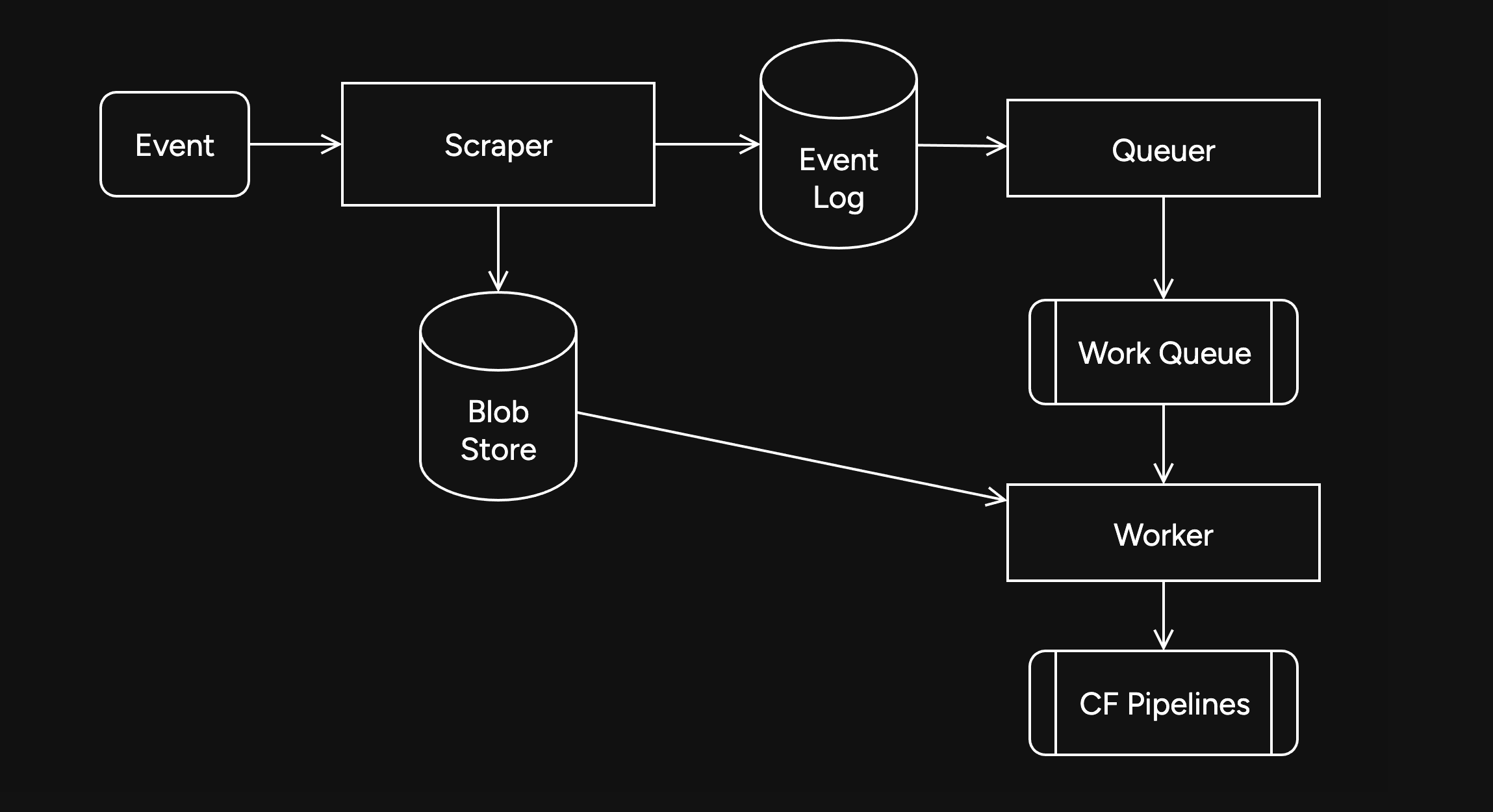
Trying it out
The first attempt did not go well. I found a bug in the high-contention indexer that led to frequent transaction conflicts. This was easily solved by correcting an incorrectly set parameter.
We also found there were other issues in the indexer, such as an insufficient amount of threads, and a suspicious decrease in the speed of the
Queuerduring processing of queued jobs.Along with fixing these issues, I also implemented other optimizations, such as deprioritizing
WorkerDB accesses, and increasing the batch size.To fix the degraded
Queuerperformance, I ran the backfill job by itself, and then started indexing after it had completed.Bottlenecks, bottlenecks everywhere
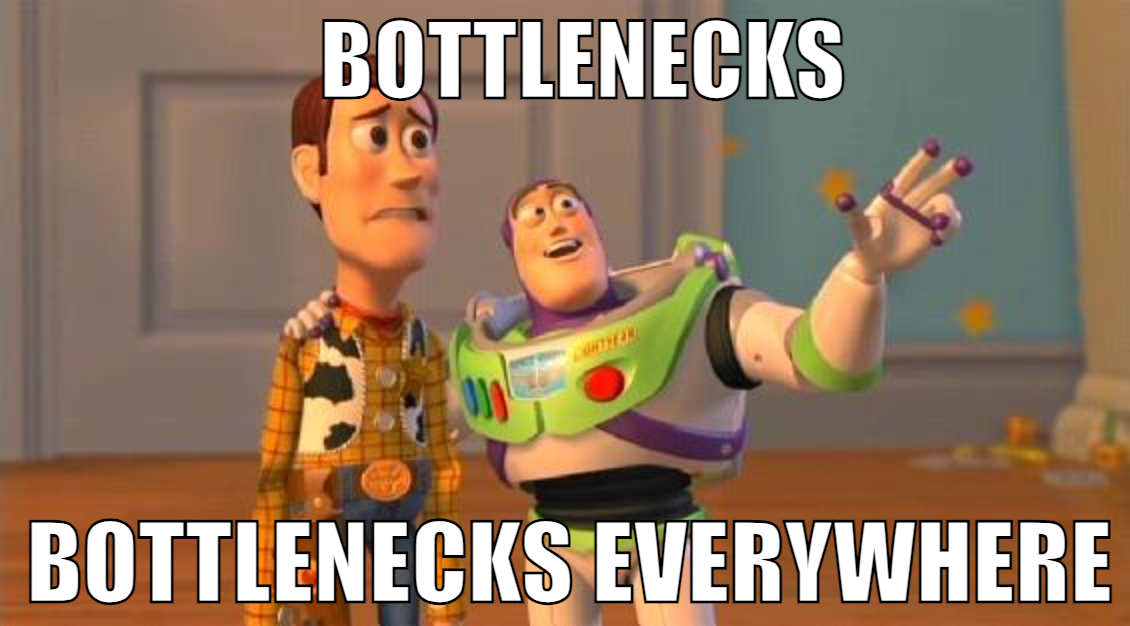
After implementing these fixes, there was an interesting problem: The DB couldn't go over 80K reads per second. I had encountered this limit during load testing for the scraper and other FDB benchmarks.
As I suspected, this was a client thread limitation, as one thread seemed to be using high amounts of CPU. To overcome this, I created a new client instance for each
Worker.After investigating, I discovered that the Go FoundationDB client cached the database connection. This meant all attempts to create separate DB connections ended up being useless.
Using
OpenWithConnectionStringpartially resolved this issue. (This also had benefits for service-discovery based connection configuration.)To be able to fully support multi-threading, I needed to enabled the FDB multi-client feature. Enabling it also allowed easier upgrades across DB versions, as FDB clients are incompatible across versions:
FDB_NETWORK_OPTION_EXTERNAL_CLIENT_LIBRARY="/lib/libfdb_c.so"FDB_NETWORK_OPTION_CLIENT_THREADS_PER_VERSION="16"Breaking the 100K/s reads barrier
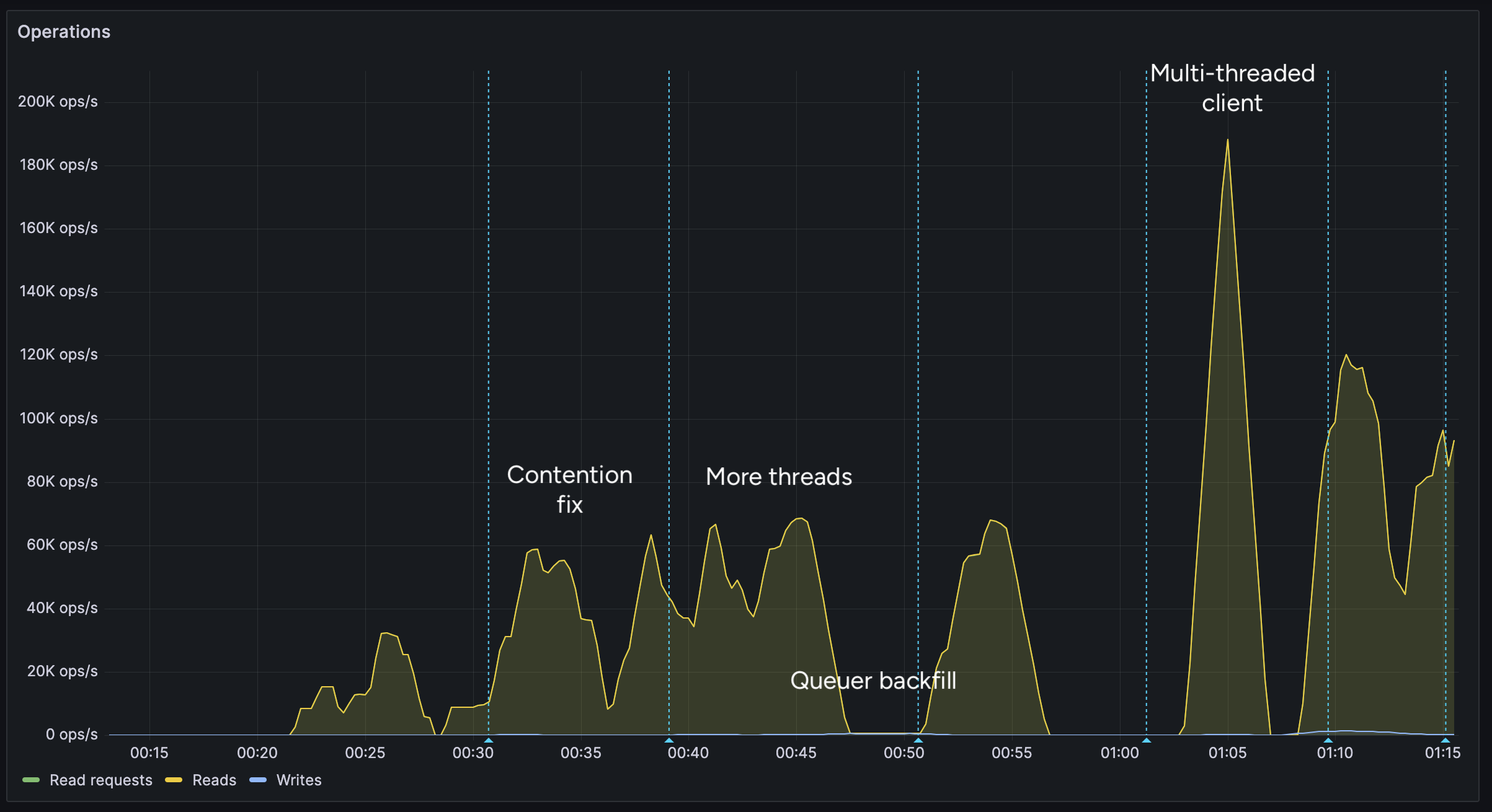
After implementing support for the multi-threaded client, we were able to get over 100K reads per second.
You may notice after the restart (gap) the performance dropped. This was caused by several bugs: 1. When creating the CF Pipelines endpoint, we did not specify a region. The automatically selected region was far away from the server. 2. The amount of shards were not sufficient, so we increased them. 3. The client overloaded a few HTTP/2 connections with too many requests.
I implemented a feature to assign each
Workerits own HTTP client, fixing the 3rd issue. We also moved the entire storage region to West Europe to be closer to the servers.After these changes, we were able to easily push over 200K reads/s, mostly limited by missing optimizations:
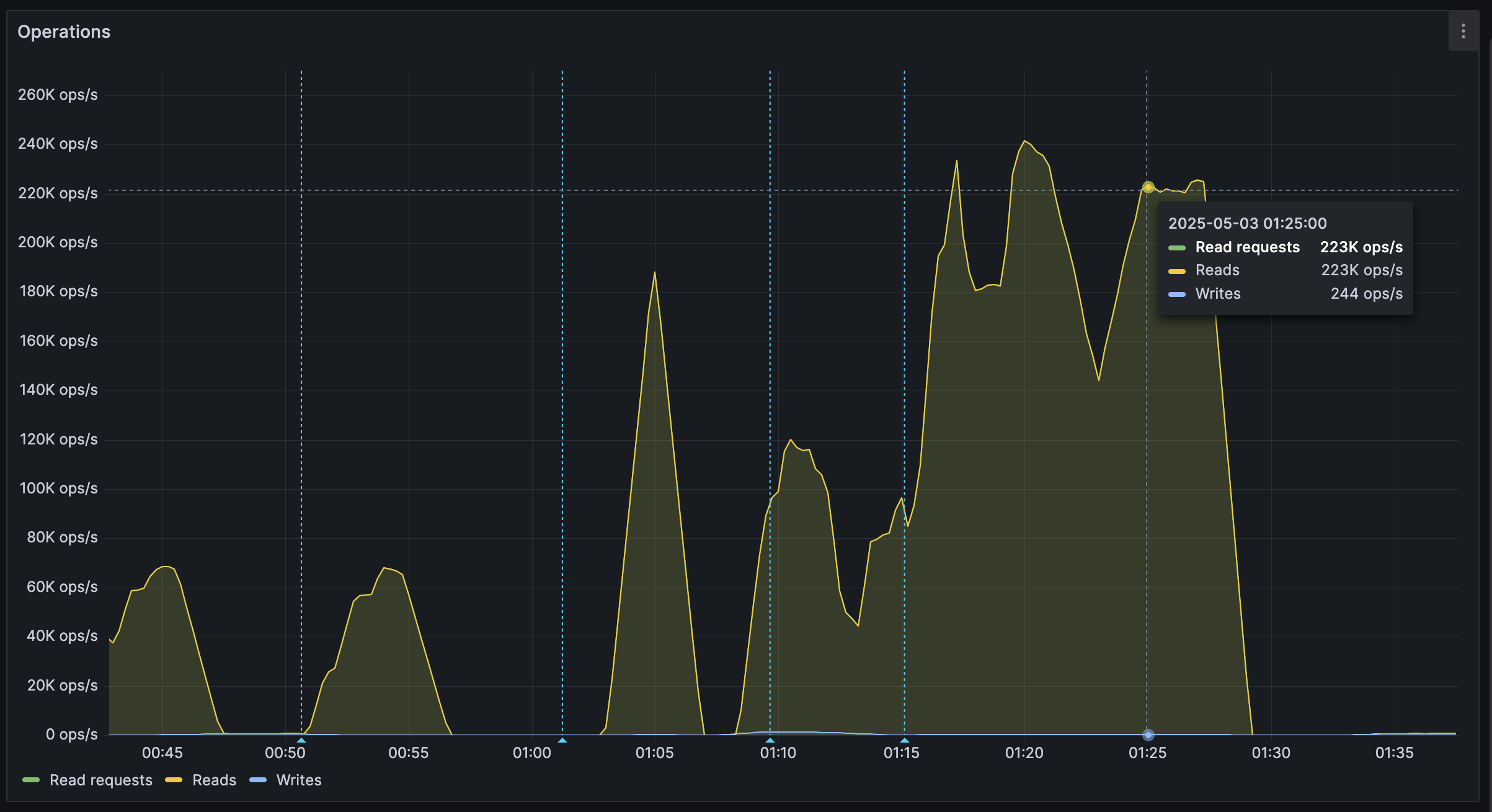
It's shards all the way down
While testing, we also noticed another issue: At certain times, a pipeline would get overloaded, stalling requests for seconds at a time. This prevented all forward progress on the
Workers.We solved this by having multiple pipelines: A primary pipeline meant to be for standard load, with moderate batching duration and less shards, and high-throughput pipelines with more shards.
Each
Workeris assigned a pipeline on startup, and if one pipeline stalls, other workers can continue making progress and saturate the DB.The stress test
After making sure everything was ready for the import, we cleared all data, and started the import.
The entire import lasted 20 minutes between 01:44 UTC and 02:04 UTC, reaching a peak of: - 0.25M requests per second - 0.6M keys read per second - 140MB/s reads from DB - 2Gbps of network throughput
FoundationDB ran smoothly during this test, with: - Read times under 2ms - Zero conflicting transactions - No overloaded servers
CF Pipelines held up well, delivering batches to R2 without any issues, while reaching its maximum possible throughput.
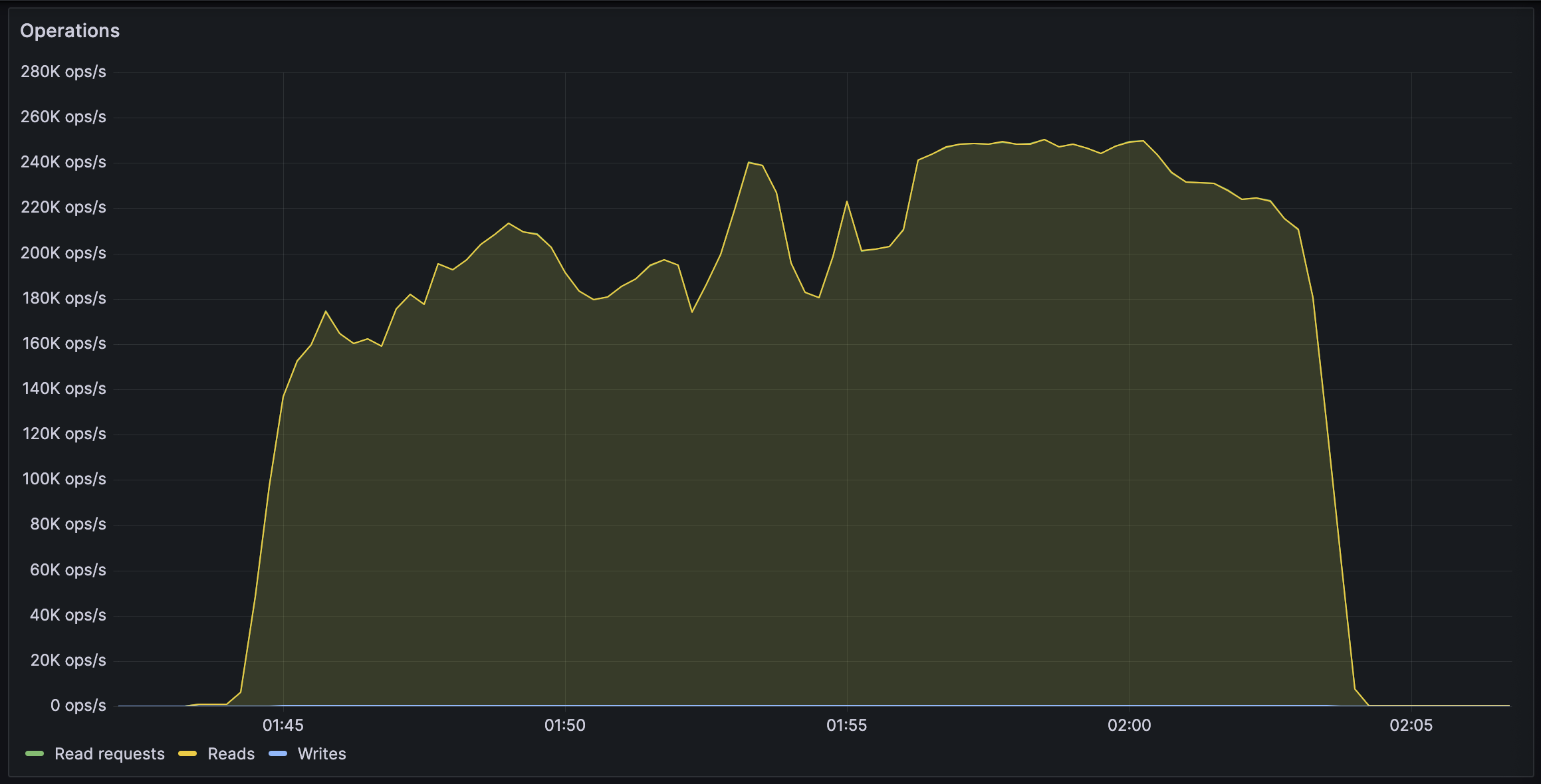
Finishing notes
Me and Fishcake have been building infrastructure around scaling Nostr, from media, to relays, to content indexing. We consistently work on improving scalability, resiliency and stability, even outside these posts.
Many things, including what you see here, are already a part of Nostr.build, Noswhere and NFDB, and many other changes are being implemented every day.
If you like what you are seeing, and want to integrate it, get in touch. :)
If you want to support our work, you can zap this post, or register for nostr.land and nostr.build today.
-
 @ c631e267:c2b78d3e
2025-05-16 18:40:18
@ c631e267:c2b78d3e
2025-05-16 18:40:18Die zwei mächtigsten Krieger sind Geduld und Zeit. \ Leo Tolstoi
Zum Wohle unserer Gesundheit, unserer Leistungsfähigkeit und letztlich unseres Glücks ist es wichtig, die eigene Energie bewusst zu pflegen. Das gilt umso mehr für an gesellschaftlichen Themen interessierte, selbstbewusste und kritisch denkende Menschen. Denn für deren Wahrnehmung und Wohlbefinden waren und sind die rasanten, krisen- und propagandagefüllten letzten Jahre in Absurdistan eine harte Probe.
Nur wer regelmäßig Kraft tankt und Wege findet, mit den Herausforderungen umzugehen, kann eine solche Tortur überstehen, emotionale Erschöpfung vermeiden und trotz allem zufrieden sein. Dazu müssen wir erkunden, was uns Energie gibt und was sie uns raubt. Durch Selbstreflexion und Achtsamkeit finden wir sicher Dinge, die uns erfreuen und inspirieren, und andere, die uns eher stressen und belasten.
Die eigene Energie ist eng mit unserer körperlichen und mentalen Gesundheit verbunden. Methoden zur Förderung der körperlichen Gesundheit sind gut bekannt: eine ausgewogene Ernährung, regelmäßige Bewegung sowie ausreichend Schlaf und Erholung. Bei der nicht minder wichtigen emotionalen Balance wird es schon etwas komplizierter. Stress abzubauen, die eigenen Grenzen zu kennen oder solche zum Schutz zu setzen sowie die Konzentration auf Positives und Sinnvolles wären Ansätze.
Der emotionale ist auch der Bereich, über den «Energie-Räuber» bevorzugt attackieren. Das sind zum Beispiel Dinge wie Überforderung, Perfektionismus oder mangelhafte Kommunikation. Social Media gehören ganz sicher auch dazu. Sie stehlen uns nicht nur Zeit, sondern sind höchst manipulativ und erhöhen laut einer aktuellen Studie das Risiko für psychische Probleme wie Angstzustände und Depressionen.
Geben wir negativen oder gar bösen Menschen keine Macht über uns. Das Dauerfeuer der letzten Jahre mit Krisen, Konflikten und Gefahren sollte man zwar kennen, darf sich aber davon nicht runterziehen lassen. Das Ziel derartiger konzertierter Aktionen ist vor allem, unsere innere Stabilität zu zerstören, denn dann sind wir leichter zu steuern. Aber Geduld: Selbst vermeintliche «Sonnenköniginnen» wie EU-Kommissionspräsidentin von der Leyen fallen, wenn die Zeit reif ist.
Es ist wichtig, dass wir unsere ganz eigenen Bedürfnisse und Werte erkennen. Unsere Energiequellen müssen wir identifizieren und aktiv nutzen. Dazu gehören soziale Kontakte genauso wie zum Beispiel Hobbys und Leidenschaften. Umgeben wir uns mit Sinnhaftigkeit und lassen wir uns nicht die Energie rauben!
Mein Wahlspruch ist schon lange: «Was die Menschen wirklich bewegt, ist die Kultur.» Jetzt im Frühjahr beginnt hier in Andalusien die Zeit der «Ferias», jener traditionellen Volksfeste, die vor Lebensfreude sprudeln. Konzentrieren wir uns auf die schönen Dinge und auf unsere eigenen Talente – soziale Verbundenheit wird helfen, unsere innere Kraft zu stärken und zu bewahren.
[Titelbild: Pixabay]
Dieser Beitrag wurde mit dem Pareto-Client geschrieben und ist zuerst auf Transition News erschienen.
-
 @ fa984bd7:58018f52
2025-05-21 09:51:34
@ fa984bd7:58018f52
2025-05-21 09:51:34This post has been deleted.
-
 @ 74fb3ef2:58adabc7
2025-05-22 22:26:23
@ 74fb3ef2:58adabc7
2025-05-22 22:26:23Suppose you have a small mom-and-pop shop selling bananas, your bananas are of the highest quality, you plant the banana trees yourself, you water them daily, take great care of everything, and still select only the top 1% of bananas to sell.
Your customers love it, there's no place where they can get better bananas, but due to the fact that you spend so much time, your bananas have to be more expensive, so despite the higher quality, you don't make as much money as you think you should; surely you can get a little more of the market if you adopt some of the strategies that work for your competitors.
So you look across the street, and what do you know? Their bananas are of significantly worse quality than yours, but they're not just selling bananas, they're selling apples too, so you think to yourself, "what if I sold apples? Maybe my apples won't be the best in the market, but nobody can beat my bananas!"
You start planting apple trees, and after a while you're able go sell slightly better than average apples, but by doing so you neglect your bananas ever so slightly.
Most of your existing customers don't notice, you still have the best bananas in town, they don't notice the slight drop in quality. And now that you're selling apples too you're making more money, and more customers come to you.
But you notice that there's a new store now that's selling oranges, and people are buying them. So surely you need oranges too, so you can make some extra money.
You plant a few orange trees, but find yourself spending so much time tending to the oranges and apples that you can't devote the same time and love to your bananas.
You are making a bit of extra cash from the new customers, business is going well, but you don't have time for anything else anymore. You no free time anymore, you are overworked and your health is getting worse.
But you can't stop now that business is going well, you are making so much more, yeah maybe you don't have the same bananas anymore, but you do have slightly above average apples and oranges that have attracted so many customers.
You suddenly fall ill, you've overworked yourself and you are stuck at a hospital for a while.
When you come back to your store, a few of your customers are back, but not all of them, so you think of more ideas, mandarins, kiwi, watermelons, you can grow it all, but you're gonna hire a bunch of people to help you so you don't fall ill again.
One thing leads to another and you are making more money than ever, but strangely you don't hear your customers praising your bananas anymore.
So you take one of your bananas, peel it, and as you taste it, a wave of disappointment hits you.
Your bananas are now just as bad as everyone else's; you gave in to the tyranny of the marginal customer.
You make a lot of money now, but your flagship product is long gone, you are now just another Fruitseller.
-
 @ c631e267:c2b78d3e
2025-05-10 09:50:45
@ c631e267:c2b78d3e
2025-05-10 09:50:45Information ohne Reflexion ist geistiger Flugsand. \ Ernst Reinhardt
Der lateinische Ausdruck «Quo vadis» als Frage nach einer Entwicklung oder Ausrichtung hat biblische Wurzeln. Er wird aber auch in unserer Alltagssprache verwendet, laut Duden meist als Ausdruck von Besorgnis oder Skepsis im Sinne von: «Wohin wird das führen?»
Der Sinn und Zweck von so mancher politischen Entscheidung erschließt sich heutzutage nicht mehr so leicht, und viele Trends können uns Sorge bereiten. Das sind einerseits sehr konkrete Themen wie die zunehmende Militarisierung und die geschichtsvergessene Kriegstreiberei in Europa, deren Feindbildpflege aktuell beim Gedenken an das Ende des Zweiten Weltkriegs beschämende Formen annimmt.
Auch das hohe Gut der Schweizer Neutralität scheint immer mehr in Gefahr. Die schleichende Bewegung der Eidgenossenschaft in Richtung NATO und damit weg von einer Vermittlerposition erhält auch durch den neuen Verteidigungsminister Anschub. Martin Pfister möchte eine stärkere Einbindung in die europäische Verteidigungsarchitektur, verwechselt bei der Argumentation jedoch Ursache und Wirkung.
Das Thema Gesundheit ist als Zugpferd für Geschäfte und Kontrolle offenbar schon zuverlässig etabliert. Die hauptsächlich privat finanzierte Weltgesundheitsorganisation (WHO) ist dabei durch ein Netzwerk von sogenannten «Collaborating Centres» sogar so weit in nationale Einrichtungen eingedrungen, dass man sich fragen kann, ob diese nicht von Genf aus gesteuert werden.
Das Schweizer Bundesamt für Gesundheit (BAG) übernimmt in dieser Funktion ebenso von der WHO definierte Aufgaben und Pflichten wie das deutsche Robert Koch-Institut (RKI). Gegen die Covid-«Impfung» für Schwangere, die das BAG empfiehlt, obwohl es fehlende wissenschaftliche Belege für deren Schutzwirkung einräumt, formiert sich im Tessin gerade Widerstand.
Unter dem Stichwort «Gesundheitssicherheit» werden uns die Bestrebungen verkauft, essenzielle Dienste mit einer biometrischen digitalen ID zu verknüpfen. Das dient dem Profit mit unseren Daten und führt im Ergebnis zum Verlust unserer demokratischen Freiheiten. Die deutsche elektronische Patientenakte (ePA) ist ein Element mit solchem Potenzial. Die Schweizer Bürger haben gerade ein Referendum gegen das revidierte E-ID-Gesetz erzwungen. In Thailand ist seit Anfang Mai für die Einreise eine «Digital Arrival Card» notwendig, die mit ihrer Gesundheitserklärung einen Impfpass «durch die Hintertür» befürchten lässt.
Der massive Blackout auf der iberischen Halbinsel hat vermehrt Fragen dazu aufgeworfen, wohin uns Klimawandel-Hysterie und «grüne» Energiepolitik führen werden. Meine Kollegin Wiltrud Schwetje ist dem nachgegangen und hat in mehreren Beiträgen darüber berichtet. Wenig überraschend führen interessante Spuren mal wieder zu internationalen Großbanken, Globalisten und zur EU-Kommission.
Zunehmend bedenklich ist aber ganz allgemein auch die manifestierte Spaltung unserer Gesellschaften. Angesichts der tiefen und sorgsam gepflegten Gräben fällt es inzwischen schwer, eine zukunftsfähige Perspektive zu erkennen. Umso begrüßenswerter sind Initiativen wie die Kölner Veranstaltungsreihe «Neue Visionen für die Zukunft». Diese möchte die Diskussionskultur reanimieren und dazu beitragen, dass Menschen wieder ohne Angst und ergebnisoffen über kontroverse Themen der Zeit sprechen.
Quo vadis – Wohin gehen wir also? Die Suche nach Orientierung in diesem vermeintlichen Chaos führt auch zur Reflexion über den eigenen Lebensweg. Das ist positiv insofern, als wir daraus Kraft schöpfen können. Ob derweil der neue Papst, dessen «Vorgänger» Petrus unsere Ausgangsfrage durch die christliche Legende zugeschrieben wird, dabei eine Rolle spielt, muss jede/r selbst wissen. Mir persönlich ist allein schon ein Führungsanspruch wie der des Petrusprimats der römisch-katholischen Kirche eher suspekt.
[Titelbild: Pixabay]
Dieser Beitrag wurde mit dem Pareto-Client geschrieben und ist zuerst auf Transition News erschienen.
-
 @ 7bdef7be:784a5805
2025-04-02 12:12:12
@ 7bdef7be:784a5805
2025-04-02 12:12:12We value sovereignty, privacy and security when accessing online content, using several tools to achieve this, like open protocols, open OSes, open software products, Tor and VPNs.
The problem
Talking about our social presence, we can manually build up our follower list (social graph), pick a Nostr client that is respectful of our preferences on what to show and how, but with the standard following mechanism, our main feed is public, so everyone can actually snoop what we are interested in, and what is supposable that we read daily.
The solution
Nostr has a simple solution for this necessity: encrypted lists. Lists are what they appear, a collection of people or interests (but they can also group much other stuff, see NIP-51). So we can create lists with contacts that we don't have in our main social graph; these lists can be used primarily to create dedicated feeds, but they could have other uses, for example, related to monitoring. The interesting thing about lists is that they can also be encrypted, so unlike the basic following list, which is always public, we can hide the lists' content from others. The implications are obvious: we can not only have a more organized way to browse content, but it is also really private one.
One might wonder what use can really be made of private lists; here are some examples:
- Browse “can't miss” content from users I consider a priority;
- Supervise competitors or adversarial parts;
- Monitor sensible topics (tags);
- Following someone without being publicly associated with them, as this may be undesirable;
The benefits in terms of privacy as usual are not only related to the casual, or programmatic, observer, but are also evident when we think of how many bots scan our actions to profile us.
The current state
Unfortunately, lists are not widely supported by Nostr clients, and encrypted support is a rarity. Often the excuse to not implement them is that they are harder to develop, since they require managing the encryption stuff (NIP-44). Nevertheless, developers have an easier option to start offering private lists: give the user the possibility to simply mark them as local-only, and never push them to the relays. Even if the user misses the sync feature, this is sufficient to create a private environment.
To date, as far as I know, the best client with list management is Gossip, which permits to manage both encrypted and local-only lists.
Beg your Nostr client to implement private lists!
-
 @ 1c19eb1a:e22fb0bc
2025-03-21 00:34:10
@ 1c19eb1a:e22fb0bc
2025-03-21 00:34:10What is #Nostrversity? It's where you can come to learn about all the great tools, clients, and amazing technology that is being built on #Nostr, for Nostr, or utilized by Nostr, presented in an approachable and non-technical format. If you have ever wondered what Blossom, bunker signing, or Nostr Wallet Connect are, how they work, and how you can put them to work to improve your Nostr experience, this is the place you can read about them without needing a computer-science degree ahead of time.
Between writing full-length reviews, which take a fair amount of time to research, test, and draft, I will post shorter articles with the Nostrversity hashtag to provide a Nostr-native resource to help the community understand and utilize the tools our illustrious developers are building. These articles will be much shorter, and more digestible than my full-length reviews. They will also cover some things that may not be quite ready for prime-time, whereas my reviews will continue to focus on Nostr apps that are production-ready.
Keep an eye out, because Nostr Wallet Connect will be the first topic of study. Take your seats, get out your notepads, and follow along to discover how Nostr Wallet Connect is improving Lightning infrastructure. Hint: It's not just for zaps.
-
 @ c631e267:c2b78d3e
2025-05-02 20:05:22
@ c631e267:c2b78d3e
2025-05-02 20:05:22Du bist recht appetitlich oben anzuschauen, \ doch unten hin die Bestie macht mir Grauen. \ Johann Wolfgang von Goethe
Wie wenig bekömmlich sogenannte «Ultra-Processed Foods» wie Fertiggerichte, abgepackte Snacks oder Softdrinks sind, hat kürzlich eine neue Studie untersucht. Derweil kann Fleisch auch wegen des Einsatzes antimikrobieller Mittel in der Massentierhaltung ein Problem darstellen. Internationale Bemühungen, diesen Gebrauch zu reduzieren, um die Antibiotikaresistenz bei Menschen einzudämmen, sind nun möglicherweise gefährdet.
Leider ist Politik oft mindestens genauso unappetitlich und ungesund wie diverse Lebensmittel. Die «Corona-Zeit» und ihre Auswirkungen sind ein beredtes Beispiel. Der Thüringer Landtag diskutiert gerade den Entwurf eines «Coronamaßnahmen-Unrechtsbereinigungsgesetzes» und das kanadische Gesundheitsministerium versucht, tausende Entschädigungsanträge wegen Impfnebenwirkungen mit dem Budget von 75 Millionen Dollar unter einen Hut zu bekommen. In den USA soll die Zulassung von Covid-«Impfstoffen» überdacht werden, während man sich mit China um die Herkunft des Virus streitet.
Wo Corona-Verbrecher von Medien und Justiz gedeckt werden, verfolgt man Aufklärer und Aufdecker mit aller Härte. Der Anwalt und Mitbegründer des Corona-Ausschusses Reiner Fuellmich, der seit Oktober 2023 in Untersuchungshaft sitzt, wurde letzte Woche zu drei Jahren und neun Monaten verurteilt – wegen Veruntreuung. Am Mittwoch teilte der von vielen Impfschadensprozessen bekannte Anwalt Tobias Ulbrich mit, dass er vom Staatsschutz verfolgt wird und sich daher künftig nicht mehr öffentlich äußern werde.
Von der kommenden deutschen Bundesregierung aus Wählerbetrügern, Transatlantikern, Corona-Hardlinern und Russenhassern kann unmöglich eine Verbesserung erwartet werden. Nina Warken beispielsweise, die das Ressort Gesundheit übernehmen soll, diffamierte Maßnahmenkritiker als «Coronaleugner» und forderte eine Impfpflicht, da die wundersamen Injektionen angeblich «nachweislich helfen». Laut dem designierten Außenminister Johann Wadephul wird Russland «für uns immer der Feind» bleiben. Deswegen will er die Ukraine «nicht verlieren lassen» und sieht die Bevölkerung hinter sich, solange nicht deutsche Soldaten dort sterben könnten.
Eine wichtige Personalie ist auch die des künftigen Regierungssprechers. Wenngleich Hebestreit an Arroganz schwer zu überbieten sein wird, dürfte sich die Art der Kommunikation mit Stefan Kornelius in der Sache kaum ändern. Der Politikchef der Süddeutschen Zeitung «prägte den Meinungsjournalismus der SZ» und schrieb «in dieser Rolle auch für die Titel der Tamedia». Allerdings ist, anders als noch vor zehn Jahren, die Einbindung von Journalisten in Thinktanks wie die Deutsche Atlantische Gesellschaft (DAG) ja heute eher eine Empfehlung als ein Problem.
Ungesund ist definitiv auch die totale Digitalisierung, nicht nur im Gesundheitswesen. Lauterbachs Abschiedsgeschenk, die «abgesicherte» elektronische Patientenakte (ePA) ist völlig überraschenderweise direkt nach dem Bundesstart erneut gehackt worden. Norbert Häring kommentiert angesichts der Datenlecks, wer die ePA nicht abwähle, könne seine Gesundheitsdaten ebensogut auf Facebook posten.
Dass die staatlichen Kontrolleure so wenig auf freie Software und dezentrale Lösungen setzen, verdeutlicht die eigentlichen Intentionen hinter der Digitalisierungswut. Um Sicherheit und Souveränität geht es ihnen jedenfalls nicht – sonst gäbe es zum Beispiel mehr Unterstützung für Bitcoin und für Initiativen wie die der Spar-Supermärkte in der Schweiz.
[Titelbild: Pixabay]
Dieser Beitrag wurde mit dem Pareto-Client geschrieben und ist zuerst auf Transition News erschienen.
-
 @ c631e267:c2b78d3e
2025-04-25 20:06:24
@ c631e267:c2b78d3e
2025-04-25 20:06:24Die Wahrheit verletzt tiefer als jede Beleidigung. \ Marquis de Sade
Sagen Sie niemals «Terroristin B.», «Schwachkopf H.», «korrupter Drecksack S.» oder «Meinungsfreiheitshasserin F.» und verkneifen Sie sich Memes, denn so etwas könnte Ihnen als Beleidigung oder Verleumdung ausgelegt werden und rechtliche Konsequenzen haben. Auch mit einer Frau M.-A. S.-Z. ist in dieser Beziehung nicht zu spaßen, sie gehört zu den Top-Anzeigenstellern.
«Politikerbeleidigung» als Straftatbestand wurde 2021 im Kampf gegen «Rechtsextremismus und Hasskriminalität» in Deutschland eingeführt, damals noch unter der Regierung Merkel. Im Gesetz nicht festgehalten ist die Unterscheidung zwischen schlechter Hetze und guter Hetze – trotzdem ist das gängige Praxis, wie der Titel fast schon nahelegt.
So dürfen Sie als Politikerin heute den Tesla als «Nazi-Auto» bezeichnen und dies ausdrücklich auf den Firmengründer Elon Musk und dessen «rechtsextreme Positionen» beziehen, welche Sie nicht einmal belegen müssen. [1] Vielleicht ernten Sie Proteste, jedoch vorrangig wegen der «gut bezahlten, unbefristeten Arbeitsplätze» in Brandenburg. Ihren Tweet hat die Berliner Senatorin Cansel Kiziltepe inzwischen offenbar dennoch gelöscht.
Dass es um die Meinungs- und Pressefreiheit in der Bundesrepublik nicht mehr allzu gut bestellt ist, befürchtet man inzwischen auch schon im Ausland. Der Fall des Journalisten David Bendels, der kürzlich wegen eines Faeser-Memes zu sieben Monaten Haft auf Bewährung verurteilt wurde, führte in diversen Medien zu Empörung. Die Welt versteckte ihre Kritik mit dem Titel «Ein Urteil wie aus einer Diktatur» hinter einer Bezahlschranke.
Unschöne, heutzutage vielleicht strafbare Kommentare würden mir auch zu einigen anderen Themen und Akteuren einfallen. Ein Kandidat wäre der deutsche Bundesgesundheitsminister (ja, er ist es tatsächlich immer noch). Während sich in den USA auf dem Gebiet etwas bewegt und zum Beispiel Robert F. Kennedy Jr. will, dass die Gesundheitsbehörde (CDC) keine Covid-Impfungen für Kinder mehr empfiehlt, möchte Karl Lauterbach vor allem das Corona-Lügengebäude vor dem Einsturz bewahren.
«Ich habe nie geglaubt, dass die Impfungen nebenwirkungsfrei sind», sagte Lauterbach jüngst der ZDF-Journalistin Sarah Tacke. Das steht in krassem Widerspruch zu seiner früher verbreiteten Behauptung, die Gen-Injektionen hätten keine Nebenwirkungen. Damit entlarvt er sich selbst als Lügner. Die Bezeichnung ist absolut berechtigt, dieser Mann dürfte keinerlei politische Verantwortung tragen und das Verhalten verlangt nach einer rechtlichen Überprüfung. Leider ist ja die Justiz anderweitig beschäftigt und hat außerdem selbst keine weiße Weste.
Obendrein kämpfte der Herr Minister für eine allgemeine Impfpflicht. Er beschwor dabei das Schließen einer «Impflücke», wie es die Weltgesundheitsorganisation – die «wegen Trump» in finanziellen Schwierigkeiten steckt – bis heute tut. Die WHO lässt aktuell ihre «Europäische Impfwoche» propagieren, bei der interessanterweise von Covid nicht mehr groß die Rede ist.
Einen «Klima-Leugner» würden manche wohl Nir Shaviv nennen, das ist ja nicht strafbar. Der Astrophysiker weist nämlich die Behauptung von einer Klimakrise zurück. Gemäß seiner Forschung ist mindestens die Hälfte der Erderwärmung nicht auf menschliche Emissionen, sondern auf Veränderungen im Sonnenverhalten zurückzuführen.
Das passt vielleicht auch den «Klima-Hysterikern» der britischen Regierung ins Konzept, die gerade Experimente zur Verdunkelung der Sonne angekündigt haben. Produzenten von Kunstfleisch oder Betreiber von Insektenfarmen würden dagegen vermutlich die Geschichte vom fatalen CO2 bevorzugen. Ihnen würde es besser passen, wenn der verantwortungsvolle Erdenbürger sein Verhalten gründlich ändern müsste.
In unserer völlig verkehrten Welt, in der praktisch jede Verlautbarung außerhalb der abgesegneten Narrative potenziell strafbar sein kann, gehört fast schon Mut dazu, Dinge offen anzusprechen. Im «besten Deutschland aller Zeiten» glaubten letztes Jahr nur noch 40 Prozent der Menschen, ihre Meinung frei äußern zu können. Das ist ein Armutszeugnis, und es sieht nicht gerade nach Besserung aus. Umso wichtiger ist es, dagegen anzugehen.
[Titelbild: Pixabay]
--- Quellen: ---
[1] Zur Orientierung wenigstens ein paar Hinweise zur NS-Vergangenheit deutscher Automobilhersteller:
- Volkswagen
- Porsche
- Daimler-Benz
- BMW
- Audi
- Opel
- Heute: «Auto-Werke für die Rüstung? Rheinmetall prüft Übernahmen»
Dieser Beitrag wurde mit dem Pareto-Client geschrieben und ist zuerst auf Transition News erschienen.
-
 @ 04c915da:3dfbecc9
2025-03-10 23:31:30
@ 04c915da:3dfbecc9
2025-03-10 23:31:30Bitcoin has always been rooted in freedom and resistance to authority. I get that many of you are conflicted about the US Government stacking but by design we cannot stop anyone from using bitcoin. Many have asked me for my thoughts on the matter, so let’s rip it.
Concern
One of the most glaring issues with the strategic bitcoin reserve is its foundation, built on stolen bitcoin. For those of us who value private property this is an obvious betrayal of our core principles. Rather than proof of work, the bitcoin that seeds this reserve has been taken by force. The US Government should return the bitcoin stolen from Bitfinex and the Silk Road.
Usually stolen bitcoin for the reserve creates a perverse incentive. If governments see a bitcoin as a valuable asset, they will ramp up efforts to confiscate more bitcoin. The precedent is a major concern, and I stand strongly against it, but it should be also noted that governments were already seizing coin before the reserve so this is not really a change in policy.
Ideally all seized bitcoin should be burned, by law. This would align incentives properly and make it less likely for the government to actively increase coin seizures. Due to the truly scarce properties of bitcoin, all burned bitcoin helps existing holders through increased purchasing power regardless. This change would be unlikely but those of us in policy circles should push for it regardless. It would be best case scenario for American bitcoiners and would create a strong foundation for the next century of American leadership.
Optimism
The entire point of bitcoin is that we can spend or save it without permission. That said, it is a massive benefit to not have one of the strongest governments in human history actively trying to ruin our lives.
Since the beginning, bitcoiners have faced horrible regulatory trends. KYC, surveillance, and legal cases have made using bitcoin and building bitcoin businesses incredibly difficult. It is incredibly important to note that over the past year that trend has reversed for the first time in a decade. A strategic bitcoin reserve is a key driver of this shift. By holding bitcoin, the strongest government in the world has signaled that it is not just a fringe technology but rather truly valuable, legitimate, and worth stacking.
This alignment of incentives changes everything. The US Government stacking proves bitcoin’s worth. The resulting purchasing power appreciation helps all of us who are holding coin and as bitcoin succeeds our government receives direct benefit. A beautiful positive feedback loop.
Realism
We are trending in the right direction. A strategic bitcoin reserve is a sign that the state sees bitcoin as an asset worth embracing rather than destroying. That said, there is a lot of work left to be done. We cannot be lulled into complacency, the time to push forward is now, and we cannot take our foot off the gas. We have a seat at the table for the first time ever. Let's make it worth it.
We must protect the right to free usage of bitcoin and other digital technologies. Freedom in the digital age must be taken and defended, through both technical and political avenues. Multiple privacy focused developers are facing long jail sentences for building tools that protect our freedom. These cases are not just legal battles. They are attacks on the soul of bitcoin. We need to rally behind them, fight for their freedom, and ensure the ethos of bitcoin survives this new era of government interest. The strategic reserve is a step in the right direction, but it is up to us to hold the line and shape the future.
-
 @ d23af4ac:7bf07adb
2025-02-18 17:07:55
@ d23af4ac:7bf07adb
2025-02-18 17:07:55This is a test-note published directly from Obsidian
Heading 1
Some paragraph text [^2]
Heading 2
Second paragraph text. * List item 1 * List item 2
js console.log("Hello world!")Json
json { name: "Alise", age: 45 }[!SCRUNCHABLE NOTE]- This should be collapsed when the page first loads. This should be collapsed when the page first loads. This should be collapsed when the page first loads. This should be collapsed when the page first loads. This should be collapsed when the page first loads. This should be collapsed when the page first loads. This should be collapsed when the page first loads. This should be collapsed when the page first loads. This should be collapsed when the page first loads. This should be collapsed when the page first loads.
[!DANGER] This is a "danger" type message. Should be properly formateed. This is a "danger" type message. Should be properly formateed. This is a "danger" type message. Should be properly formateed. This is a "danger" type message. Should be properly formateed. This is a "danger" type message. Should be properly formateed.
--
Pasted image:
![[Pasted image 20250218120714.png]]
This is a blockquote. This is a blockquote. This is a blockquote. This is a blockquote. This is a blockquote. This is a blockquote. This is a blockquote. This is a blockquote[^1]. This is a blockquote. This is a blockquote. This is a blockquote. This is a blockquote. This is a blockquote. This is a blockquote. This is a blockquote. This is a blockquote.
- [x] This is a completed task
- [ ] This is an uncompleted task
- [ ] This is also an uncompleted task
[!QUESTION] Will this inline code format properly?
console.log('Yo momma so fat she took a spoon to the Super Bown');Idk...[^1]: Footnotes also supported? Even inside blockquotes? [^2]: Footnote in regular paragraph
-
 @ 1c197b12:242e1642
2025-02-09 22:56:33
@ 1c197b12:242e1642
2025-02-09 22:56:33A Cypherpunk's Manifesto by Eric Hughes
Privacy is necessary for an open society in the electronic age. Privacy is not secrecy. A private matter is something one doesn't want the whole world to know, but a secret matter is something one doesn't want anybody to know. Privacy is the power to selectively reveal oneself to the world.
If two parties have some sort of dealings, then each has a memory of their interaction. Each party can speak about their own memory of this; how could anyone prevent it? One could pass laws against it, but the freedom of speech, even more than privacy, is fundamental to an open society; we seek not to restrict any speech at all. If many parties speak together in the same forum, each can speak to all the others and aggregate together knowledge about individuals and other parties. The power of electronic communications has enabled such group speech, and it will not go away merely because we might want it to.
Since we desire privacy, we must ensure that each party to a transaction have knowledge only of that which is directly necessary for that transaction. Since any information can be spoken of, we must ensure that we reveal as little as possible. In most cases personal identity is not salient. When I purchase a magazine at a store and hand cash to the clerk, there is no need to know who I am. When I ask my electronic mail provider to send and receive messages, my provider need not know to whom I am speaking or what I am saying or what others are saying to me; my provider only need know how to get the message there and how much I owe them in fees. When my identity is revealed by the underlying mechanism of the transaction, I have no privacy. I cannot here selectively reveal myself; I must always reveal myself.
Therefore, privacy in an open society requires anonymous transaction systems. Until now, cash has been the primary such system. An anonymous transaction system is not a secret transaction system. An anonymous system empowers individuals to reveal their identity when desired and only when desired; this is the essence of privacy.
Privacy in an open society also requires cryptography. If I say something, I want it heard only by those for whom I intend it. If the content of my speech is available to the world, I have no privacy. To encrypt is to indicate the desire for privacy, and to encrypt with weak cryptography is to indicate not too much desire for privacy. Furthermore, to reveal one's identity with assurance when the default is anonymity requires the cryptographic signature.
We cannot expect governments, corporations, or other large, faceless organizations to grant us privacy out of their beneficence. It is to their advantage to speak of us, and we should expect that they will speak. To try to prevent their speech is to fight against the realities of information. Information does not just want to be free, it longs to be free. Information expands to fill the available storage space. Information is Rumor's younger, stronger cousin; Information is fleeter of foot, has more eyes, knows more, and understands less than Rumor.
We must defend our own privacy if we expect to have any. We must come together and create systems which allow anonymous transactions to take place. People have been defending their own privacy for centuries with whispers, darkness, envelopes, closed doors, secret handshakes, and couriers. The technologies of the past did not allow for strong privacy, but electronic technologies do.
We the Cypherpunks are dedicated to building anonymous systems. We are defending our privacy with cryptography, with anonymous mail forwarding systems, with digital signatures, and with electronic money.
Cypherpunks write code. We know that someone has to write software to defend privacy, and since we can't get privacy unless we all do, we're going to write it. We publish our code so that our fellow Cypherpunks may practice and play with it. Our code is free for all to use, worldwide. We don't much care if you don't approve of the software we write. We know that software can't be destroyed and that a widely dispersed system can't be shut down.
Cypherpunks deplore regulations on cryptography, for encryption is fundamentally a private act. The act of encryption, in fact, removes information from the public realm. Even laws against cryptography reach only so far as a nation's border and the arm of its violence. Cryptography will ineluctably spread over the whole globe, and with it the anonymous transactions systems that it makes possible.
For privacy to be widespread it must be part of a social contract. People must come and together deploy these systems for the common good. Privacy only extends so far as the cooperation of one's fellows in society. We the Cypherpunks seek your questions and your concerns and hope we may engage you so that we do not deceive ourselves. We will not, however, be moved out of our course because some may disagree with our goals.
The Cypherpunks are actively engaged in making the networks safer for privacy. Let us proceed together apace.
Onward.
Eric Hughes hughes@soda.berkeley.edu
9 March 1993
-
 @ c631e267:c2b78d3e
2025-04-20 19:54:32
@ c631e267:c2b78d3e
2025-04-20 19:54:32Es ist völlig unbestritten, dass der Angriff der russischen Armee auf die Ukraine im Februar 2022 strikt zu verurteilen ist. Ebenso unbestritten ist Russland unter Wladimir Putin keine brillante Demokratie. Aus diesen Tatsachen lässt sich jedoch nicht das finstere Bild des russischen Präsidenten – und erst recht nicht des Landes – begründen, das uns durchweg vorgesetzt wird und den Kern des aktuellen europäischen Bedrohungs-Szenarios darstellt. Da müssen wir schon etwas genauer hinschauen.
Der vorliegende Artikel versucht derweil nicht, den Einsatz von Gewalt oder die Verletzung von Menschenrechten zu rechtfertigen oder zu entschuldigen – ganz im Gegenteil. Dass jedoch der Verdacht des «Putinverstehers» sofort latent im Raume steht, verdeutlicht, was beim Thema «Russland» passiert: Meinungsmache und Manipulation.
Angesichts der mentalen Mobilmachung seitens Politik und Medien sowie des Bestrebens, einen bevorstehenden Krieg mit Russland geradezu herbeizureden, ist es notwendig, dieser fatalen Entwicklung entgegenzutreten. Wenn wir uns nur ein wenig von der herrschenden Schwarz-Weiß-Malerei freimachen, tauchen automatisch Fragen auf, die Risse im offiziellen Narrativ enthüllen. Grund genug, nachzuhaken.
Wer sich schon länger auch abseits der Staats- und sogenannten Leitmedien informiert, der wird in diesem Artikel vermutlich nicht viel Neues erfahren. Andere könnten hier ein paar unbekannte oder vergessene Aspekte entdecken. Möglicherweise klärt sich in diesem Kontext die Wahrnehmung der aktuellen (unserer eigenen!) Situation ein wenig.
Manipulation erkennen
Corona-«Pandemie», menschengemachter Klimawandel oder auch Ukraine-Krieg: Jede Menge Krisen, und für alle gibt es ein offizielles Narrativ, dessen Hinterfragung unerwünscht ist. Nun ist aber ein Narrativ einfach eine Erzählung, eine Geschichte (Latein: «narratio») und kein Tatsachenbericht. Und so wie ein Märchen soll auch das Narrativ eine Botschaft vermitteln.
Über die Methoden der Manipulation ist viel geschrieben worden, sowohl in Bezug auf das Individuum als auch auf die Massen. Sehr wertvolle Tipps dazu, wie man Manipulationen durchschauen kann, gibt ein Büchlein [1] von Albrecht Müller, dem Herausgeber der NachDenkSeiten.
Die Sprache selber eignet sich perfekt für die Manipulation. Beispielsweise kann die Wortwahl Bewertungen mitschwingen lassen, regelmäßiges Wiederholen (gerne auch von verschiedenen Seiten) lässt Dinge irgendwann «wahr» erscheinen, Übertreibungen fallen auf und hinterlassen wenigstens eine Spur im Gedächtnis, genauso wie Andeutungen. Belege spielen dabei keine Rolle.
Es gibt auffällig viele Sprachregelungen, die offenbar irgendwo getroffen und irgendwie koordiniert werden. Oder alle Redenschreiber und alle Medien kopieren sich neuerdings permanent gegenseitig. Welchen Zweck hat es wohl, wenn der Krieg in der Ukraine durchgängig und quasi wörtlich als «russischer Angriffskrieg auf die Ukraine» bezeichnet wird? Obwohl das in der Sache richtig ist, deutet die Art der Verwendung auf gezielte Beeinflussung hin und soll vor allem das Feindbild zementieren.
Sprachregelungen dienen oft der Absicherung einer einseitigen Darstellung. Das Gleiche gilt für das Verkürzen von Informationen bis hin zum hartnäckigen Verschweigen ganzer Themenbereiche. Auch hierfür gibt es rund um den Ukraine-Konflikt viele gute Beispiele.
Das gewünschte Ergebnis solcher Methoden ist eine Schwarz-Weiß-Malerei, bei der einer eindeutig als «der Böse» markiert ist und die anderen automatisch «die Guten» sind. Das ist praktisch und demonstriert gleichzeitig ein weiteres Manipulationswerkzeug: die Verwendung von Doppelstandards. Wenn man es schafft, bei wichtigen Themen regelmäßig mit zweierlei Maß zu messen, ohne dass das Publikum protestiert, dann hat man freie Bahn.
Experten zu bemühen, um bestimmte Sachverhalte zu erläutern, ist sicher sinnvoll, kann aber ebenso missbraucht werden, schon allein durch die Auswahl der jeweiligen Spezialisten. Seit «Corona» werden viele erfahrene und ehemals hoch angesehene Fachleute wegen der «falschen Meinung» diffamiert und gecancelt. [2] Das ist nicht nur ein brutaler Umgang mit Menschen, sondern auch eine extreme Form, die öffentliche Meinung zu steuern.
Wann immer wir also erkennen (weil wir aufmerksam waren), dass wir bei einem bestimmten Thema manipuliert werden, dann sind zwei logische und notwendige Fragen: Warum? Und was ist denn richtig? In unserem Russland-Kontext haben die Antworten darauf viel mit Geopolitik und Geschichte zu tun.
Ist Russland aggressiv und expansiv?
Angeblich plant Russland, europäische NATO-Staaten anzugreifen, nach dem Motto: «Zuerst die Ukraine, dann den Rest». In Deutschland weiß man dafür sogar das Datum: «Wir müssen bis 2029 kriegstüchtig sein», versichert Verteidigungsminister Pistorius.
Historisch gesehen ist es allerdings eher umgekehrt: Russland, bzw. die Sowjetunion, ist bereits dreimal von Westeuropa aus militärisch angegriffen worden. Die Feldzüge Napoleons, des deutschen Kaiserreichs und Nazi-Deutschlands haben Millionen Menschen das Leben gekostet. Bei dem ausdrücklichen Vernichtungskrieg ab 1941 kam es außerdem zu Brutalitäten wie der zweieinhalbjährigen Belagerung Leningrads (heute St. Petersburg) durch Hitlers Wehrmacht. Deren Ziel, die Bevölkerung auszuhungern, wurde erreicht: über eine Million tote Zivilisten.
Trotz dieser Erfahrungen stimmte Michail Gorbatschow 1990 der deutschen Wiedervereinigung zu und die Sowjetunion zog ihre Truppen aus Osteuropa zurück (vgl. Abb. 1). Der Warschauer Pakt wurde aufgelöst, der Kalte Krieg formell beendet. Die Sowjets erhielten damals von führenden westlichen Politikern die Zusicherung, dass sich die NATO «keinen Zentimeter ostwärts» ausdehnen würde, das ist dokumentiert. [3]
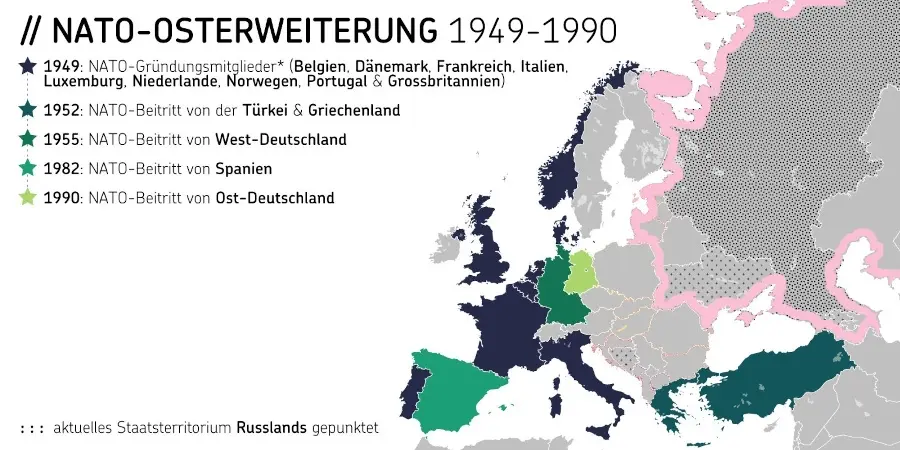
Expandiert ist die NATO trotzdem, und zwar bis an Russlands Grenzen (vgl. Abb. 2). Laut dem Politikberater Jeffrey Sachs handelt es sich dabei um ein langfristiges US-Projekt, das von Anfang an die Ukraine und Georgien mit einschloss. Offiziell wurde der Beitritt beiden Staaten 2008 angeboten. In jedem Fall könnte die massive Ost-Erweiterung seit 1999 aus russischer Sicht nicht nur als Vertrauensbruch, sondern durchaus auch als aggressiv betrachtet werden.
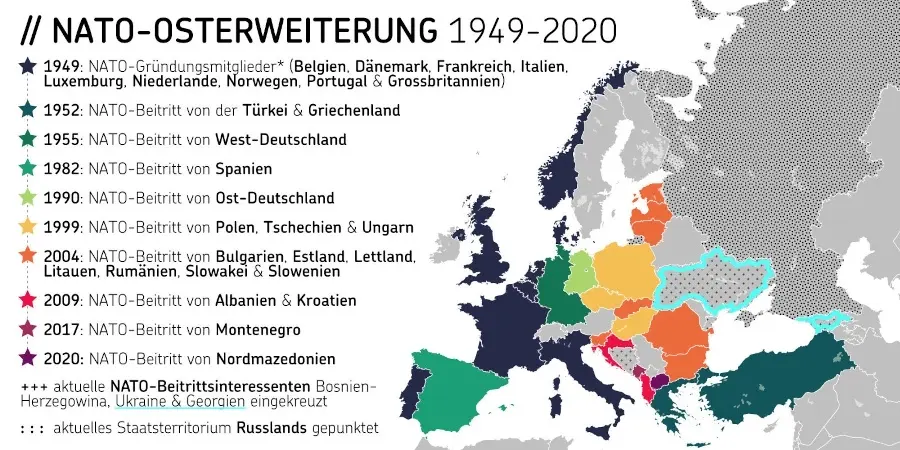
Russland hat den europäischen Staaten mehrfach die Hand ausgestreckt [4] für ein friedliches Zusammenleben und den «Aufbau des europäischen Hauses». Präsident Putin sei «in seiner ersten Amtszeit eine Chance für Europa» gewesen, urteilt die Journalistin und langjährige Russland-Korrespondentin der ARD, Gabriele Krone-Schmalz. Er habe damals viele positive Signale Richtung Westen gesendet.
Die Europäer jedoch waren scheinbar an einer Partnerschaft mit dem kontinentalen Nachbarn weniger interessiert als an der mit dem transatlantischen Hegemon. Sie verkennen bis heute, dass eine gedeihliche Zusammenarbeit in Eurasien eine Gefahr für die USA und deren bekundetes Bestreben ist, die «einzige Weltmacht» zu sein – «Full Spectrum Dominance» [5] nannte das Pentagon das. Statt einem neuen Kalten Krieg entgegenzuarbeiten, ließen sich europäische Staaten selber in völkerrechtswidrige «US-dominierte Angriffskriege» [6] verwickeln, wie in Serbien, Afghanistan, dem Irak, Libyen oder Syrien. Diese werden aber selten so benannt.
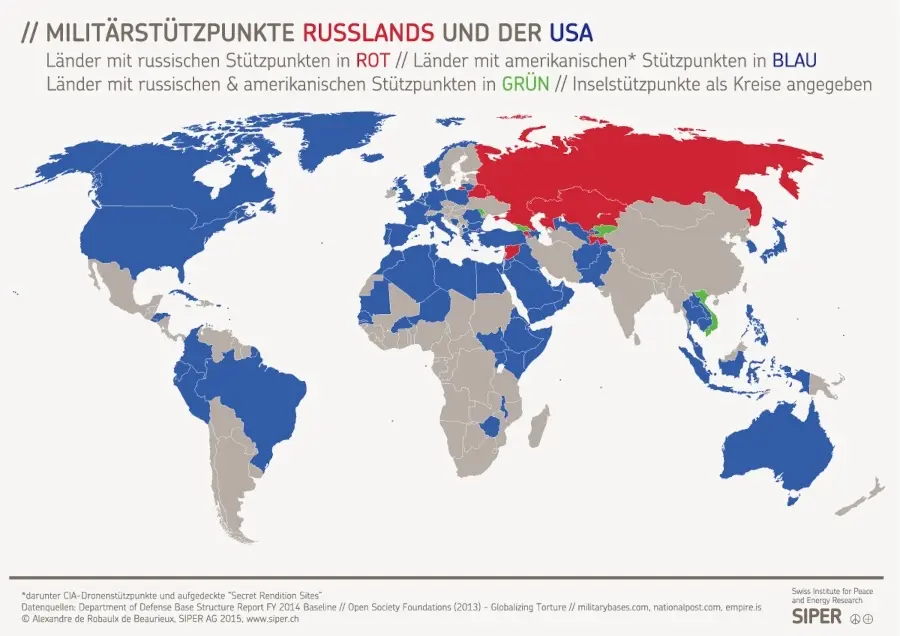
Speziell den Deutschen stünde außer einer Portion Realismus auch etwas mehr Dankbarkeit gut zu Gesicht. Das Geschichtsbewusstsein der Mehrheit scheint doch recht selektiv und das Selbstbewusstsein einiger etwas desorientiert zu sein. Bekanntermaßen waren es die Soldaten der sowjetischen Roten Armee, die unter hohen Opfern 1945 Deutschland «vom Faschismus befreit» haben. Bei den Gedenkfeiern zu 80 Jahren Kriegsende will jedoch das Auswärtige Amt – noch unter der Diplomatie-Expertin Baerbock, die sich schon länger offiziell im Krieg mit Russland wähnt, – nun keine Russen sehen: Sie sollen notfalls rausgeschmissen werden.
«Die Grundsatzfrage lautet: Geht es Russland um einen angemessenen Platz in einer globalen Sicherheitsarchitektur, oder ist Moskau schon seit langem auf einem imperialistischen Trip, der befürchten lassen muss, dass die Russen in fünf Jahren in Berlin stehen?»
So bringt Gabriele Krone-Schmalz [7] die eigentliche Frage auf den Punkt, die zur Einschätzung der Situation letztlich auch jeder für sich beantworten muss.
Was ist los in der Ukraine?
In der internationalen Politik geht es nie um Demokratie oder Menschenrechte, sondern immer um Interessen von Staaten. Diese These stammt von Egon Bahr, einem der Architekten der deutschen Ostpolitik des «Wandels durch Annäherung» aus den 1960er und 70er Jahren. Sie trifft auch auf den Ukraine-Konflikt zu, den handfeste geostrategische und wirtschaftliche Interessen beherrschen, obwohl dort angeblich «unsere Demokratie» verteidigt wird.
Es ist ein wesentliches Element des Ukraine-Narrativs und Teil der Manipulation, die Vorgeschichte des Krieges wegzulassen – mindestens die vor der russischen «Annexion» der Halbinsel Krim im März 2014, aber oft sogar komplett diejenige vor der Invasion Ende Februar 2022. Das Thema ist komplex, aber einige Aspekte, die für eine Beurteilung nicht unwichtig sind, will ich wenigstens kurz skizzieren. [8]
Das Gebiet der heutigen Ukraine und Russlands – die übrigens in der «Kiewer Rus» gemeinsame Wurzeln haben – hat der britische Geostratege Halford Mackinder bereits 1904 als eurasisches «Heartland» bezeichnet, dessen Kontrolle er eine große Bedeutung für die imperiale Strategie Großbritanniens zumaß. Für den ehemaligen Sicherheits- und außenpolitischen Berater mehrerer US-amerikanischer Präsidenten und Mitgründer der Trilateralen Kommission, Zbigniew Brzezinski, war die Ukraine nach der Auflösung der Sowjetunion ein wichtiger Spielstein auf dem «eurasischen Schachbrett», wegen seiner Nähe zu Russland, seiner Bodenschätze und seines Zugangs zum Schwarzen Meer.
Die Ukraine ist seit langem ein gespaltenes Land. Historisch zerrissen als Spielball externer Interessen und geprägt von ethnischen, kulturellen, religiösen und geografischen Unterschieden existiert bis heute, grob gesagt, eine Ost-West-Spaltung, welche die Suche nach einer nationalen Identität stark erschwert.
Insbesondere im Zuge der beiden Weltkriege sowie der Russischen Revolution entstanden tiefe Risse in der Bevölkerung. Ukrainer kämpften gegen Ukrainer, zum Beispiel die einen auf der Seite von Hitlers faschistischer Nazi-Armee und die anderen auf der von Stalins kommunistischer Roter Armee. Die Verbrechen auf beiden Seiten sind nicht vergessen. Dass nach der Unabhängigkeit 1991 versucht wurde, Figuren wie den radikalen Nationalisten Symon Petljura oder den Faschisten und Nazi-Kollaborateur Stepan Bandera als «Nationalhelden» zu installieren, verbessert die Sache nicht.
Während die USA und EU-Staaten zunehmend «ausländische Einmischung» (speziell russische) in «ihre Demokratien» wittern, betreiben sie genau dies seit Jahrzehnten in vielen Ländern der Welt. Die seit den 2000er Jahren bekannten «Farbrevolutionen» in Osteuropa werden oft als Methode des Regierungsumsturzes durch von außen gesteuerte «demokratische» Volksaufstände beschrieben. Diese Strategie geht auf Analysen zum «Schwarmverhalten» [9] seit den 1960er Jahren zurück (Studentenproteste), wo es um die potenzielle Wirksamkeit einer «rebellischen Hysterie» von Jugendlichen bei postmodernen Staatsstreichen geht. Heute nennt sich dieses gezielte Kanalisieren der Massen zur Beseitigung unkooperativer Regierungen «Soft-Power».
In der Ukraine gab es mit der «Orangen Revolution» 2004 und dem «Euromaidan» 2014 gleich zwei solcher «Aufstände». Der erste erzwang wegen angeblicher Unregelmäßigkeiten eine Wiederholung der Wahlen, was mit Wiktor Juschtschenko als neuem Präsidenten endete. Dieser war ehemaliger Direktor der Nationalbank und Befürworter einer Annäherung an EU und NATO. Seine Frau, die First Lady, ist US-amerikanische «Philanthropin» und war Beamtin im Weißen Haus in der Reagan- und der Bush-Administration.
Im Gegensatz zu diesem ersten Event endete der sogenannte Euromaidan unfriedlich und blutig. Die mehrwöchigen Proteste gegen Präsident Wiktor Janukowitsch, in Teilen wegen des nicht unterzeichneten Assoziierungsabkommens mit der EU, wurden zunehmend gewalttätiger und von Nationalisten und Faschisten des «Rechten Sektors» dominiert. Sie mündeten Ende Februar 2014 auf dem Kiewer Unabhängigkeitsplatz (Maidan) in einem Massaker durch Scharfschützen. Dass deren Herkunft und die genauen Umstände nicht geklärt wurden, störte die Medien nur wenig. [10]
Janukowitsch musste fliehen, er trat nicht zurück. Vielmehr handelte es sich um einen gewaltsamen, allem Anschein nach vom Westen inszenierten Putsch. Laut Jeffrey Sachs war das kein Geheimnis, außer vielleicht für die Bürger. Die USA unterstützten die Post-Maidan-Regierung nicht nur, sie beeinflussten auch ihre Bildung. Das geht unter anderem aus dem berühmten «Fuck the EU»-Telefonat der US-Chefdiplomatin für die Ukraine, Victoria Nuland, mit Botschafter Geoffrey Pyatt hervor.
Dieser Bruch der demokratischen Verfassung war letztlich der Auslöser für die anschließenden Krisen auf der Krim und im Donbass (Ostukraine). Angesichts der ukrainischen Geschichte mussten die nationalistischen Tendenzen und die Beteiligung der rechten Gruppen an dem Umsturz bei der russigsprachigen Bevölkerung im Osten ungute Gefühle auslösen. Es gab Kritik an der Übergangsregierung, Befürworter einer Abspaltung und auch für einen Anschluss an Russland.
Ebenso konnte Wladimir Putin in dieser Situation durchaus Bedenken wegen des Status der russischen Militärbasis für seine Schwarzmeerflotte in Sewastopol auf der Krim haben, für die es einen langfristigen Pachtvertrag mit der Ukraine gab. Was im März 2014 auf der Krim stattfand, sei keine Annexion, sondern eine Abspaltung (Sezession) nach einem Referendum gewesen, also keine gewaltsame Aneignung, urteilte der Rechtswissenschaftler Reinhard Merkel in der FAZ sehr detailliert begründet. Übrigens hatte die Krim bereits zu Zeiten der Sowjetunion den Status einer autonomen Republik innerhalb der Ukrainischen SSR.
Anfang April 2014 wurden in der Ostukraine die «Volksrepubliken» Donezk und Lugansk ausgerufen. Die Kiewer Übergangsregierung ging unter der Bezeichnung «Anti-Terror-Operation» (ATO) militärisch gegen diesen, auch von Russland instrumentalisierten Widerstand vor. Zufällig war kurz zuvor CIA-Chef John Brennan in Kiew. Die Maßnahmen gingen unter dem seit Mai neuen ukrainischen Präsidenten, dem Milliardär Petro Poroschenko, weiter. Auch Wolodymyr Selenskyj beendete den Bürgerkrieg nicht, als er 2019 vom Präsidenten-Schauspieler, der Oligarchen entmachtet, zum Präsidenten wurde. Er fuhr fort, die eigene Bevölkerung zu bombardieren.
Mit dem Einmarsch russischer Truppen in die Ostukraine am 24. Februar 2022 begann die zweite Phase des Krieges. Die Wochen und Monate davor waren intensiv. Im November hatte die Ukraine mit den USA ein Abkommen über eine «strategische Partnerschaft» unterzeichnet. Darin sagten die Amerikaner ihre Unterstützung der EU- und NATO-Perspektive der Ukraine sowie quasi für die Rückeroberung der Krim zu. Dagegen ließ Putin der NATO und den USA im Dezember 2021 einen Vertragsentwurf über beiderseitige verbindliche Sicherheitsgarantien zukommen, den die NATO im Januar ablehnte. Im Februar eskalierte laut OSZE die Gewalt im Donbass.
Bereits wenige Wochen nach der Invasion, Ende März 2022, kam es in Istanbul zu Friedensverhandlungen, die fast zu einer Lösung geführt hätten. Dass der Krieg nicht damals bereits beendet wurde, lag daran, dass der Westen dies nicht wollte. Man war der Meinung, Russland durch die Ukraine in diesem Stellvertreterkrieg auf Dauer militärisch schwächen zu können. Angesichts von Hunderttausenden Toten, Verletzten und Traumatisierten, die als Folge seitdem zu beklagen sind, sowie dem Ausmaß der Zerstörung, fehlen einem die Worte.
Hasst der Westen die Russen?
Diese Frage drängt sich auf, wenn man das oft unerträglich feindselige Gebaren beobachtet, das beileibe nicht neu ist und vor Doppelmoral trieft. Russland und speziell die Person Wladimir Putins werden regelrecht dämonisiert, was gleichzeitig scheinbar jede Form von Diplomatie ausschließt.
Russlands militärische Stärke, seine geografische Lage, sein Rohstoffreichtum oder seine unabhängige diplomatische Tradition sind sicher Störfaktoren für das US-amerikanische Bestreben, der Boss in einer unipolaren Welt zu sein. Ein womöglich funktionierender eurasischer Kontinent, insbesondere gute Beziehungen zwischen Russland und Deutschland, war indes schon vor dem Ersten Weltkrieg eine Sorge des britischen Imperiums.
Ein «Vergehen» von Präsident Putin könnte gewesen sein, dass er die neoliberale Schocktherapie à la IWF und den Ausverkauf des Landes (auch an US-Konzerne) beendete, der unter seinem Vorgänger herrschte. Dabei zeigte er sich als Führungspersönlichkeit und als nicht so formbar wie Jelzin. Diese Aspekte allein sind aber heute vermutlich keine ausreichende Erklärung für ein derart gepflegtes Feindbild.
Der Historiker und Philosoph Hauke Ritz erweitert den Fokus der Fragestellung zu: «Warum hasst der Westen die Russen so sehr?», was er zum Beispiel mit dem Medienforscher Michael Meyen und mit der Politikwissenschaftlerin Ulrike Guérot bespricht. Ritz stellt die interessante These [11] auf, dass Russland eine Provokation für den Westen sei, welcher vor allem dessen kulturelles und intellektuelles Potenzial fürchte.
Die Russen sind Europäer aber anders, sagt Ritz. Diese «Fremdheit in der Ähnlichkeit» erzeuge vielleicht tiefe Ablehnungsgefühle. Obwohl Russlands Identität in der europäischen Kultur verwurzelt ist, verbinde es sich immer mit der Opposition in Europa. Als Beispiele nennt er die Kritik an der katholischen Kirche oder die Verbindung mit der Arbeiterbewegung. Christen, aber orthodox; Sozialismus statt Liberalismus. Das mache das Land zum Antagonisten des Westens und zu einer Bedrohung der Machtstrukturen in Europa.
Fazit
Selbstverständlich kann man Geschichte, Ereignisse und Entwicklungen immer auf verschiedene Arten lesen. Dieser Artikel, obwohl viel zu lang, konnte nur einige Aspekte der Ukraine-Tragödie anreißen, die in den offiziellen Darstellungen in der Regel nicht vorkommen. Mindestens dürfte damit jedoch klar geworden sein, dass die Russische Föderation bzw. Wladimir Putin nicht der alleinige Aggressor in diesem Konflikt ist. Das ist ein Stellvertreterkrieg zwischen USA/NATO (gut) und Russland (böse); die Ukraine (edel) wird dabei schlicht verheizt.
Das ist insofern von Bedeutung, als die gesamte europäische Kriegshysterie auf sorgsam kultivierten Freund-Feind-Bildern beruht. Nur so kann Konfrontation und Eskalation betrieben werden, denn damit werden die wahren Hintergründe und Motive verschleiert. Angst und Propaganda sind notwendig, damit die Menschen den Wahnsinn mitmachen. Sie werden belogen, um sie zuerst zu schröpfen und anschließend auf die Schlachtbank zu schicken. Das kann niemand wollen, außer den stets gleichen Profiteuren: die Rüstungs-Lobby und die großen Investoren, die schon immer an Zerstörung und Wiederaufbau verdient haben.
Apropos Investoren: Zu den Top-Verdienern und somit Hauptinteressenten an einer Fortführung des Krieges zählt BlackRock, einer der weltgrößten Vermögensverwalter. Der deutsche Bundeskanzler in spe, Friedrich Merz, der gerne «Taurus»-Marschflugkörper an die Ukraine liefern und die Krim-Brücke zerstören möchte, war von 2016 bis 2020 Aufsichtsratsvorsitzender von BlackRock in Deutschland. Aber das hat natürlich nichts zu sagen, der Mann macht nur seinen Job.
Es ist ein Spiel der Kräfte, es geht um Macht und strategische Kontrolle, um Geheimdienste und die Kontrolle der öffentlichen Meinung, um Bodenschätze, Rohstoffe, Pipelines und Märkte. Das klingt aber nicht sexy, «Demokratie und Menschenrechte» hört sich besser und einfacher an. Dabei wäre eine für alle Seiten förderliche Politik auch nicht so kompliziert; das Handwerkszeug dazu nennt sich Diplomatie. Noch einmal Gabriele Krone-Schmalz:
«Friedliche Politik ist nichts anderes als funktionierender Interessenausgleich. Da geht’s nicht um Moral.»
Die Situation in der Ukraine ist sicher komplex, vor allem wegen der inneren Zerrissenheit. Es dürfte nicht leicht sein, eine friedliche Lösung für das Zusammenleben zu finden, aber die Beteiligten müssen es vor allem wollen. Unter den gegebenen Umständen könnte eine sinnvolle Perspektive mit Neutralität und föderalen Strukturen zu tun haben.
Allen, die sich bis hierher durch die Lektüre gearbeitet (oder auch einfach nur runtergescrollt) haben, wünsche ich frohe Oster-Friedenstage!
[Titelbild: Pixabay; Abb. 1 und 2: nach Ganser/SIPER; Abb. 3: SIPER]
--- Quellen: ---
[1] Albrecht Müller, «Glaube wenig. Hinterfrage alles. Denke selbst.», Westend 2019
[2] Zwei nette Beispiele:
- ARD-faktenfinder (sic), «Viel Aufmerksamkeit für fragwürdige Experten», 03/2023
- Neue Zürcher Zeitung, «Aufstieg und Fall einer Russlandversteherin – die ehemalige ARD-Korrespondentin Gabriele Krone-Schmalz rechtfertigt seit Jahren Putins Politik», 12/2022
[3] George Washington University, «NATO Expansion: What Gorbachev Heard – Declassified documents show security assurances against NATO expansion to Soviet leaders from Baker, Bush, Genscher, Kohl, Gates, Mitterrand, Thatcher, Hurd, Major, and Woerner», 12/2017
[4] Beispielsweise Wladimir Putin bei seiner Rede im Deutschen Bundestag, 25/09/2001
[5] William Engdahl, «Full Spectrum Dominance, Totalitarian Democracy In The New World Order», edition.engdahl 2009
[6] Daniele Ganser, «Illegale Kriege – Wie die NATO-Länder die UNO sabotieren. Eine Chronik von Kuba bis Syrien», Orell Füssli 2016
[7] Gabriele Krone-Schmalz, «Mit Friedensjournalismus gegen ‘Kriegstüchtigkeit’», Vortrag und Diskussion an der Universität Hamburg, veranstaltet von engagierten Studenten, 16/01/2025\ → Hier ist ein ähnlicher Vortrag von ihr (Video), den ich mit spanischer Übersetzung gefunden habe.
[8] Für mehr Hintergrund und Details empfehlen sich z.B. folgende Bücher:
- Mathias Bröckers, Paul Schreyer, «Wir sind immer die Guten», Westend 2019
- Gabriele Krone-Schmalz, «Russland verstehen? Der Kampf um die Ukraine und die Arroganz des Westens», Westend 2023
- Patrik Baab, «Auf beiden Seiten der Front – Meine Reisen in die Ukraine», Fiftyfifty 2023
[9] vgl. Jonathan Mowat, «Washington's New World Order "Democratization" Template», 02/2005 und RAND Corporation, «Swarming and the Future of Conflict», 2000
[10] Bemerkenswert einige Beiträge, von denen man später nichts mehr wissen wollte:
- ARD Monitor, «Todesschüsse in Kiew: Wer ist für das Blutbad vom Maidan verantwortlich», 10/04/2014, Transkript hier
- Telepolis, «Blutbad am Maidan: Wer waren die Todesschützen?», 12/04/2014
- Telepolis, «Scharfschützenmorde in Kiew», 14/12/2014
- Deutschlandfunk, «Gefahr einer Spirale nach unten», Interview mit Günter Verheugen, 18/03/2014
- NDR Panorama, «Putsch in Kiew: Welche Rolle spielen die Faschisten?», 06/03/2014
[11] Hauke Ritz, «Vom Niedergang des Westens zur Neuerfindung Europas», 2024
Dieser Beitrag wurde mit dem Pareto-Client geschrieben.
-
 @ c631e267:c2b78d3e
2025-04-18 15:53:07
@ c631e267:c2b78d3e
2025-04-18 15:53:07Verstand ohne Gefühl ist unmenschlich; \ Gefühl ohne Verstand ist Dummheit. \ Egon Bahr
Seit Jahren werden wir darauf getrimmt, dass Fakten eigentlich gefühlt seien. Aber nicht alles ist relativ und nicht alles ist nach Belieben interpretierbar. Diese Schokoladenhasen beispielsweise, die an Ostern in unseren Gefilden typisch sind, «ostern» zwar nicht, sondern sie sitzen in der Regel, trotzdem verwandelt sie das nicht in «Sitzhasen».
Nichts soll mehr gelten, außer den immer invasiveren Gesetzen. Die eigenen Traditionen und Wurzeln sind potenziell «pfui», um andere Menschen nicht auszuschließen, aber wir mögen uns toleranterweise an die fremden Symbole und Rituale gewöhnen. Dabei ist es mir prinzipiell völlig egal, ob und wann jemand ein Fastenbrechen feiert, am Karsamstag oder jedem anderen Tag oder nie – aber bitte freiwillig.
Und vor allem: Lasst die Finger von den Kindern! In Bern setzten kürzlich Demonstranten ein Zeichen gegen die zunehmende Verbreitung woker Ideologie im Bildungssystem und forderten ein Ende der sexuellen Indoktrination von Schulkindern.
Wenn es nicht wegen des heiklen Themas Migration oder wegen des Regenbogens ist, dann wegen des Klimas. Im Rahmen der «Netto Null»-Agenda zum Kampf gegen das angeblich teuflische CO2 sollen die Menschen ihre Ernährungsgewohnheiten komplett ändern. Nach dem Willen von Produzenten synthetischer Lebensmittel, wie Bill Gates, sollen wir baldmöglichst praktisch auf Fleisch und alle Milchprodukte wie Milch und Käse verzichten. Ein lukratives Geschäftsmodell, das neben der EU aktuell auch von einem britischen Lobby-Konsortium unterstützt wird.
Sollten alle ideologischen Stricke zu reißen drohen, ist da immer noch «der Putin». Die Unions-Europäer offenbaren sich dabei ständig mehr als Vertreter der Rüstungsindustrie. Allen voran zündelt Deutschland an der Kriegslunte, angeführt von einem scheinbar todesmutigen Kanzlerkandidaten Friedrich Merz. Nach dessen erneuter Aussage, «Taurus»-Marschflugkörper an Kiew liefern zu wollen, hat Russland eindeutig klargestellt, dass man dies als direkte Kriegsbeteiligung werten würde – «mit allen sich daraus ergebenden Konsequenzen für Deutschland».
Wohltuend sind Nachrichten über Aktivitäten, die sich der allgemeinen Kriegstreiberei entgegenstellen oder diese öffentlich hinterfragen. Dazu zählt auch ein Kongress kritischer Psychologen und Psychotherapeuten, der letzte Woche in Berlin stattfand. Die vielen Vorträge im Kontext von «Krieg und Frieden» deckten ein breites Themenspektrum ab, darunter Friedensarbeit oder die Notwendigkeit einer «Pädagogik der Kriegsuntüchtigkeit».
Der heutige «stille Freitag», an dem Christen des Leidens und Sterbens von Jesus gedenken, ist vielleicht unabhängig von jeder religiösen oder spirituellen Prägung eine passende Einladung zur Reflexion. In der Ruhe liegt die Kraft. In diesem Sinne wünsche ich Ihnen frohe Ostertage!
[Titelbild: Pixabay]
Dieser Beitrag wurde mit dem Pareto-Client geschrieben und ist zuerst auf Transition News erschienen.
-
 @ fd208ee8:0fd927c1
2025-01-19 12:10:10
@ fd208ee8:0fd927c1
2025-01-19 12:10:10I am so tired of people trying to waste my time with Nostrized imitations of stuff that already exists.
Instagram, but make it Nostr. Twitter, but make it Nostr. GitHub, but make it Nostr. Facebook, but make it Nostr. Wordpress, but make it Nostr. GoodReads, but make it Nostr. TikTok, but make it Nostr.
That stuff already exists, and it wasn't that great the first time around, either. Build something better than that stuff, that can only be brought into existence because of Nostr.
Build something that does something completely and awesomely new. Knock my socks off, bro.
Cuz, ain't nobody got time for that.
-
 @ b8851a06:9b120ba1
2025-01-14 15:28:32
@ b8851a06:9b120ba1
2025-01-14 15:28:32It Begins with a Click
It starts with a click: “Do you agree to our terms and conditions?”\ You scroll, you click, you comply. A harmless act, right? But what if every click was a surrender? What if every "yes" was another link in the chain binding you to a life where freedom requires approval?
This is the age of permission. Every aspect of your life is mediated by gatekeepers. Governments demand forms, corporations demand clicks, and algorithms demand obedience. You’re free, of course, as long as you play by the rules. But who writes the rules? Who decides what’s allowed? Who owns your life?
Welcome to Digital Serfdom
We once imagined the internet as a digital frontier—a vast, open space where ideas could flow freely and innovation would know no bounds. But instead of creating a decentralized utopia, we built a new feudal system.
- Your data? Owned by the lords of Big Tech.
- Your money? Controlled by banks and bureaucrats who can freeze it on a whim.
- Your thoughts? Filtered by algorithms that reward conformity and punish dissent.
The modern internet is a land of serfs and lords, and guess who’s doing the farming? You. Every time you agree to the terms, accept the permissions, or let an algorithm decide for you, you till the fields of a system designed to control, not liberate.
They don’t call it control, of course. They call it “protection.” They say, “We’re keeping you safe,” as they build a cage so big you can’t see the bars.
Freedom in Chains
But let’s be honest: we’re not just victims of this system—we’re participants. We’ve traded freedom for convenience, sovereignty for security. It’s easier to click “I Agree” than to read the fine print. It’s easier to let someone else hold your money than to take responsibility for it yourself. It’s easier to live a life of quiet compliance than to risk the chaos of true independence.
We tell ourselves it’s no big deal. What’s one click? What’s one form? But the permissions pile up. The chains grow heavier. And one day, you wake up and realize you’re free to do exactly what the system allows—and nothing more.
The Great Unpermissioning
It doesn’t have to be this way. You don’t need their approval. You don’t need their systems. You don’t need their permission.
The Great Unpermissioning is not a movement—it’s a mindset. It’s the refusal to accept a life mediated by gatekeepers. It’s the quiet rebellion of saying, “No.” It’s the realization that the freedom you seek won’t be granted—it must be reclaimed.
- Stop asking. Permission is their tool. Refusal is your weapon.
- Start building. Embrace tools that decentralize power: Bitcoin, encryption, open-source software, decentralized communication. Build systems they can’t control.
- Stand firm. They’ll tell you it’s dangerous. They’ll call you a radical. But remember: the most dangerous thing you can do is comply.
The path won’t be easy. Freedom never is. But it will be worth it.
The New Frontier
The age of permission has turned us into digital serfs, but there’s a new frontier on the horizon. It’s a world where you control your money, your data, your decisions. It’s a world of encryption, anonymity, and sovereignty. It’s a world built not on permission but on principles.
This world won’t be given to you. You have to build it. You have to fight for it. And it starts with one simple act: refusing to comply.
A Final Word
They promised us safety, but what they delivered was submission. The age of permission has enslaved us to the mundane, the monitored, and the mediocre. The Great Unpermissioning isn’t about tearing down the old world—it’s about walking away from it.
You don’t need to wait for their approval. You don’t need to ask for their permission. The freedom you’re looking for is already yours. Permission is their power—refusal is yours.
-
 @ c631e267:c2b78d3e
2025-04-04 18:47:27
@ c631e267:c2b78d3e
2025-04-04 18:47:27Zwei mal drei macht vier, \ widewidewitt und drei macht neune, \ ich mach mir die Welt, \ widewide wie sie mir gefällt. \ Pippi Langstrumpf
Egal, ob Koalitionsverhandlungen oder politischer Alltag: Die Kontroversen zwischen theoretisch verschiedenen Parteien verschwinden, wenn es um den Kampf gegen politische Gegner mit Rückenwind geht. Wer den Alteingesessenen die Pfründe ernsthaft streitig machen könnte, gegen den werden nicht nur «Brandmauern» errichtet, sondern der wird notfalls auch strafrechtlich verfolgt. Doppelstandards sind dabei selbstverständlich inklusive.
In Frankreich ist diese Woche Marine Le Pen wegen der Veruntreuung von EU-Geldern von einem Gericht verurteilt worden. Als Teil der Strafe wurde sie für fünf Jahre vom passiven Wahlrecht ausgeschlossen. Obwohl das Urteil nicht rechtskräftig ist – Le Pen kann in Berufung gehen –, haben die Richter das Verbot, bei Wahlen anzutreten, mit sofortiger Wirkung verhängt. Die Vorsitzende des rechtsnationalen Rassemblement National (RN) galt als aussichtsreiche Kandidatin für die Präsidentschaftswahl 2027.
Das ist in diesem Jahr bereits der zweite gravierende Fall von Wahlbeeinflussung durch die Justiz in einem EU-Staat. In Rumänien hatte Călin Georgescu im November die erste Runde der Präsidentenwahl überraschend gewonnen. Das Ergebnis wurde später annulliert, die behauptete «russische Wahlmanipulation» konnte jedoch nicht bewiesen werden. Die Kandidatur für die Wahlwiederholung im Mai wurde Georgescu kürzlich durch das Verfassungsgericht untersagt.
Die Veruntreuung öffentlicher Gelder muss untersucht und geahndet werden, das steht außer Frage. Diese Anforderung darf nicht selektiv angewendet werden. Hingegen mussten wir in der Vergangenheit bei ungleich schwerwiegenderen Fällen von (mutmaßlichem) Missbrauch ganz andere Vorgehensweisen erleben, etwa im Fall der heutigen EZB-Chefin Christine Lagarde oder im «Pfizergate»-Skandal um die Präsidentin der EU-Kommission Ursula von der Leyen.
Wenngleich derartige Angelegenheiten formal auf einer rechtsstaatlichen Grundlage beruhen mögen, so bleibt ein bitterer Beigeschmack. Es stellt sich die Frage, ob und inwieweit die Justiz politisch instrumentalisiert wird. Dies ist umso interessanter, als die Gewaltenteilung einen essenziellen Teil jeder demokratischen Ordnung darstellt, während die Bekämpfung des politischen Gegners mit juristischen Mitteln gerade bei den am lautesten rufenden Verteidigern «unserer Demokratie» populär zu sein scheint.
Die Delegationen von CDU/CSU und SPD haben bei ihren Verhandlungen über eine Regierungskoalition genau solche Maßnahmen diskutiert. «Im Namen der Wahrheit und der Demokratie» möchte man noch härter gegen «Desinformation» vorgehen und dafür zum Beispiel den Digital Services Act der EU erweitern. Auch soll der Tatbestand der Volksverhetzung verschärft werden – und im Entzug des passiven Wahlrechts münden können. Auf europäischer Ebene würde Friedrich Merz wohl gerne Ungarn das Stimmrecht entziehen.
Der Pegel an Unzufriedenheit und Frustration wächst in großen Teilen der Bevölkerung kontinuierlich. Arroganz, Machtmissbrauch und immer abstrusere Ausreden für offensichtlich willkürliche Maßnahmen werden kaum verhindern, dass den etablierten Parteien die Unterstützung entschwindet. In Deutschland sind die Umfrageergebnisse der AfD ein guter Gradmesser dafür.
[Vorlage Titelbild: Pixabay]
Dieser Beitrag wurde mit dem Pareto-Client geschrieben und ist zuerst auf Transition News erschienen.
-
 @ b8851a06:9b120ba1
2024-12-16 16:38:53
@ b8851a06:9b120ba1
2024-12-16 16:38:53Brett Scott’s recent metaphor of Bitcoin as a wrestling gimmick, reliant on hype and dollar-dependence, reduces a groundbreaking monetary innovation to shallow theatrics. Let’s address his key missteps with hard facts.
1. Bitcoin Isn’t an Asset in the System—It’s the System
Scott claims Bitcoin competes with stocks, bonds, and gold in a financial "wrestling ring." This misrepresents Bitcoin’s purpose: it’s not an investment vehicle but a decentralized monetary network. Unlike assets, Bitcoin enables permissionless global value transfer, censorship resistance, and self-sovereign wealth storage—capabilities fiat currencies cannot match.
Fact: Bitcoin processes over $8 billion in daily transactions, settling more value annually than PayPal and Venmo combined. It isn’t competing with assets but offering an alternative to the monetary system itself.
2. Volatility Is Growth, Not Failure
Scott critiques Bitcoin’s price volatility as evidence of its unsuitability as "money." However, volatility is a natural stage in the adoption of transformative technology. Bitcoin is scaling from niche use to global recognition. Its growing liquidity and adoption already make it more stable than fiat in inflationary economies.
Fact: Bitcoin’s annualized volatility has decreased by 53% since 2013 and continues to stabilize as adoption rises. It’s the best-performing asset of the last decade, with an average annual ROI of 147%—far outpacing stocks, gold, and real estate. As of February 2024, Bitcoin's volatility was lower than roughly 900 stocks in the S and P 1500 and 190 stocks in the S and P 500. It continues to stabilize as adoption rises, making it an increasingly attractive store of value.
3. Bitcoin’s Utility Extends Beyond Countertrade
Scott diminishes Bitcoin to a "countertrade token," reliant on its dollar price. This ignores Bitcoin’s primary functions:
- Medium of exchange: Used in remittances, cross-border payments, and for the unbanked in Africa today (e.g., Ghana, Nigeria, Kenya).
- Store of value: A hedge against inflation and failing fiat systems (e.g., Argentina, Lebanon, Turkey).
- Decentralized reserve asset: Held by over 1,500 public and private institutions, including Tesla, MicroStrategy, and nations like El Salvador.
Fact: Lightning Network adoption has grown 1,500% in capacity since 2021, enabling microtransactions and reducing fees—making Bitcoin increasingly viable for everyday use. As of December 2024, Sub-Saharan Africa accounts for 2.7% of global cryptocurrency transaction volume, with Nigeria ranking second worldwide in crypto adoption. This demonstrates Bitcoin's real-world utility beyond mere speculation.
4. Bitcoin Isn’t Controlled by the Dollar
Scott suggests Bitcoin strengthens the dollar system rather than challenging it. In truth, Bitcoin exists outside the control of any nation-state. It offers people in authoritarian regimes and hyperinflationary economies a lifeline when their local currencies fail.
Fact: Over 70% of Bitcoin transactions occur outside the U.S., with adoption highest in countries like Nigeria, India, Venezuela, China, the USA and Ukraine—where the dollar isn’t dominant but government overreach and fiat collapse are. This global distribution shows Bitcoin's independence from dollar dominance.
5. Hype vs. Adoption
Scott mocks Bitcoin’s evangelists but fails to acknowledge its real-world traction. Bitcoin adoption isn’t driven by hype but by trustless, verifiable technology solving real-world problems. People don’t buy Bitcoin for "kayfabe"; they buy it for what it does.
Fact: Bitcoin wallets reached 500 million globally in 2023. El Salvador’s Chivo wallet onboarded 4 million users (60% of the population) within a year—far from a gimmick in action. As of December 2024, El Salvador's Bitcoin portfolio has crossed $632 million in value, with an unrealized profit of $362 million, demonstrating tangible benefits beyond hype.
6. The Dollar’s Coercive Monopoly vs. Bitcoin’s Freedom
Scott defends fiat money as more than "just numbers," backed by state power. He’s correct: fiat relies on coercion, legal mandates, and inflationary extraction. Bitcoin, by contrast, derives value from transparent scarcity (capped at 21 million coins) and decentralized consensus, not military enforcement or political whims.
Fact: Bitcoin’s inflation rate is just 1.8%—lower than gold or the U.S. dollar—and will approach 0% by 2140. No fiat currency can match this predictability. As of December 2024, Bitcoin processes an average of 441,944 transactions per day, showcasing its growing role as a global, permissionless monetary system free from centralized control.
Conclusion: The Revolution Is Real
Scott’s "wrestling gimmick" analogy trivializes Bitcoin’s purpose and progress. Bitcoin isn’t just a speculative asset—it’s the first truly decentralized, apolitical form of money. Whether as a hedge against inflation, a tool for financial inclusion, or a global settlement network, Bitcoin is transforming how we think about money.
Dismiss it as a gimmick at your peril. The world doesn’t need another asset—it needs Bitcoin.
"If you don't believe me or don't get it, I don't have time to try to convince you, sorry." Once Satoshi said.
There is no second best.
-
 @ 06b7819d:d1d8327c
2024-12-12 11:43:36
@ 06b7819d:d1d8327c
2024-12-12 11:43:36The Peano axioms are a set of rules that define the natural numbers (like 0, 1, 2, 3, and so on) in a logical way. Here’s a simplified explanation: 1. There is a first number: There is a number called zero, and it is the starting point for all natural numbers. 2. Each number has a next number: Every number has a unique “successor,” or the number that comes after it (like 1 comes after 0, 2 comes after 1, etc.). 3. Zero is special: Zero is not the “next” number of any other number. This means the sequence of natural numbers doesn’t loop back to zero. 4. No two numbers are the same if they have different successors: If two numbers have the same “next” number, then they must actually be the same number. 5. Patterns hold for all numbers: If something is true for zero, and it stays true when moving from one number to the next, then it must be true for all numbers.
These principles lay the groundwork for understanding and working with the natural numbers systematically.
-
 @ c631e267:c2b78d3e
2025-04-03 07:42:25
@ c631e267:c2b78d3e
2025-04-03 07:42:25Spanien bleibt einer der Vorreiter im europäischen Prozess der totalen Überwachung per Digitalisierung. Seit Mittwoch ist dort der digitale Personalausweis verfügbar. Dabei handelt es sich um eine Regierungs-App, die auf dem Smartphone installiert werden muss und in den Stores von Google und Apple zu finden ist. Per Dekret von Regierungschef Pedro Sánchez und Zustimmung des Ministerrats ist diese Maßnahme jetzt in Kraft getreten.
Mit den üblichen Argumenten der Vereinfachung, des Komforts, der Effizienz und der Sicherheit preist das Innenministerium die «Innovation» an. Auch die Beteuerung, dass die digitale Variante parallel zum physischen Ausweis existieren wird und diesen nicht ersetzen soll, fehlt nicht. Während der ersten zwölf Monate wird «der Neue» noch nicht für alle Anwendungsfälle gültig sein, ab 2026 aber schon.
Dass die ganze Sache auch «Risiken und Nebenwirkungen» haben könnte, wird in den Mainstream-Medien eher selten thematisiert. Bestenfalls wird der Aspekt der Datensicherheit angesprochen, allerdings in der Regel direkt mit dem Regierungsvokabular von den «maximalen Sicherheitsgarantien» abgehandelt. Dennoch gibt es einige weitere Aspekte, die Bürger mit etwas Sinn für Privatsphäre bedenken sollten.
Um sich die digitale Version des nationalen Ausweises besorgen zu können (eine App mit dem Namen MiDNI), muss man sich vorab online registrieren. Dabei wird die Identität des Bürgers mit seiner mobilen Telefonnummer verknüpft. Diese obligatorische fixe Verdrahtung kennen wir von diversen anderen Apps und Diensten. Gleichzeitig ist das die Basis für eine perfekte Lokalisierbarkeit der Person.
Für jeden Vorgang der Identifikation in der Praxis wird später «eine Verbindung zu den Servern der Bundespolizei aufgebaut». Die Daten des Individuums werden «in Echtzeit» verifiziert und im Erfolgsfall von der Polizei signiert zurückgegeben. Das Ergebnis ist ein QR-Code mit zeitlich begrenzter Gültigkeit, der an Dritte weitergegeben werden kann.
Bei derartigen Szenarien sträuben sich einem halbwegs kritischen Staatsbürger die Nackenhaare. Allein diese minimale Funktionsbeschreibung lässt die totale Überwachung erkennen, die damit ermöglicht wird. Jede Benutzung des Ausweises wird künftig registriert, hinterlässt also Spuren. Und was ist, wenn die Server der Polizei einmal kein grünes Licht geben? Das wäre spätestens dann ein Problem, wenn der digitale doch irgendwann der einzig gültige Ausweis ist: Dann haben wir den abschaltbaren Bürger.
Dieser neue Vorstoß der Regierung von Pedro Sánchez ist ein weiterer Schritt in Richtung der «totalen Digitalisierung» des Landes, wie diese Politik in manchen Medien – nicht einmal kritisch, sondern sehr naiv – genannt wird. Ebenso verharmlosend wird auch erwähnt, dass sich das spanische Projekt des digitalen Ausweises nahtlos in die Initiativen der EU zu einer digitalen Identität für alle Bürger sowie des digitalen Euro einreiht.
In Zukunft könnte der neue Ausweis «auch in andere staatliche und private digitale Plattformen integriert werden», wie das Medienportal Cope ganz richtig bemerkt. Das ist die Perspektive.
[Titelbild: Pixabay]
Dazu passend:
Nur Abschied vom Alleinfahren? Monströse spanische Überwachungsprojekte gemäß EU-Norm
Dieser Beitrag wurde mit dem Pareto-Client geschrieben und ist zuerst auf Transition News erschienen.
-
 @ 06b7819d:d1d8327c
2024-12-08 10:52:55
@ 06b7819d:d1d8327c
2024-12-08 10:52:55Power as the Reduction of Possibilities: Niklas Luhmann’s Perspective
Niklas Luhmann, a leading figure in systems theory, offers a unique conceptualization of power that diverges from traditional notions of domination or coercion. Rather than viewing power as a forceful imposition of will, Luhmann frames it as a mechanism for reducing possibilities within a given social system. For Luhmann, power is less about direct coercion and more about structuring decision-making processes by limiting the range of available options.
In his systems-theoretical approach, Luhmann argues that power operates as a communication medium, enabling complex social systems to function by simplifying the overwhelming array of potential actions. In any decision-making context, there are countless possibilities, and not all can be pursued. Power serves as a tool to focus attention, filter alternatives, and channel behavior toward specific actions while excluding others. This reduction of options creates a manageable environment for coordinated action, which is essential for the stability of a system.
Importantly, this process does not inherently involve force or threats. Instead, power works through expectations, norms, and structures that guide behavior. For example, in an organizational setting, the hierarchy of authority determines which decisions are permissible, thereby shaping the actions of individuals without overt coercion. The employees’ actions are not forced; rather, they are conditioned by the organizational framework, which narrows their choices.
Luhmann’s idea redefines power as a productive force in social systems. By limiting possibilities, power reduces uncertainty, making collaboration and collective action possible. It ensures that systems can function efficiently despite their inherent complexity. This perspective shifts the emphasis from conflict to coordination, offering a more nuanced understanding of how power operates in modern societies.
In sum, Niklas Luhmann’s theory of power as the reduction of possibilities highlights its integrative role in enabling social systems to navigate complexity. It challenges conventional views of power as coercion, emphasizing its capacity to organize and stabilize interactions through the selective limitation of actions.
-
 @ 06b7819d:d1d8327c
2024-12-03 09:00:46
@ 06b7819d:d1d8327c
2024-12-03 09:00:46The History of Bananas as an Exportable Fruit and the Rise of Banana Republics
Bananas became a significant export in the late 19th century, fueled by advancements in transportation and refrigeration that allowed the fruit to travel long distances without spoilage. Originally native to Southeast Asia, bananas were introduced to the Americas by European colonists. By the late 1800s, companies like the United Fruit Company (later Chiquita) and Standard Fruit Company (now Dole) began cultivating bananas on a large scale in Central America and the Caribbean.
These corporations capitalized on the fruit’s appeal—bananas were cheap, nutritious, and easy to transport. The fruit quickly became a staple in Western markets, especially in the United States. However, the rapid expansion of banana exports came at a significant political and social cost to the countries where the fruit was grown.
To maintain control over banana production and maximize profits, these companies required vast amounts of arable land, labor, and favorable trade conditions. This often led them to form close relationships with local governments, many of which were authoritarian and corrupt. The companies influenced policies to secure land concessions, suppress labor rights, and maintain low taxes.
The term “banana republic” was coined by writer O. Henry in 1904 to describe countries—particularly in Central America—that became politically unstable due to their economic dependence on a single export crop, often controlled by foreign corporations.
The U.S. government frequently supported these regimes as part of its broader strategy during the Cold War to counter communist influence in the region. Washington feared that labor movements and demands for land reform, often supported by the peasantry and indigenous groups, could lead to the rise of socialist or communist governments. Consequently, the U.S. backed coups, such as the 1954 overthrow of Guatemala’s democratically elected President Jacobo Árbenz, who had threatened United Fruit’s interests by redistributing unused land.
These interventions created a legacy of exploitation, environmental degradation, and political instability in many banana-exporting countries. While bananas remain a global dietary staple, their history underscores the complex interplay of economics, politics, and imperialism.
-
 @ aa8de34f:a6ffe696
2025-03-31 21:48:50
@ aa8de34f:a6ffe696
2025-03-31 21:48:50In seinem Beitrag vom 30. März 2025 fragt Henning Rosenbusch auf Telegram angesichts zunehmender digitaler Kontrolle und staatlicher Allmacht:
„Wie soll sich gegen eine solche Tyrannei noch ein Widerstand formieren können, selbst im Untergrund? Sehe ich nicht.“\ (Quelle: t.me/rosenbusch/25228)
Er beschreibt damit ein Gefühl der Ohnmacht, das viele teilen: Eine Welt, in der Totalitarismus nicht mehr mit Panzern, sondern mit Algorithmen kommt. Wo Zugriff auf Geld, Meinungsfreiheit und Teilhabe vom Wohlverhalten abhängt. Der Bürger als kontrollierbare Variable im Code des Staates.\ Die Frage ist berechtigt. Doch die Antwort darauf liegt nicht in alten Widerstandsbildern – sondern in einer neuen Realität.
-- Denn es braucht keinen Untergrund mehr. --
Der Widerstand der Zukunft trägt keinen Tarnanzug. Er ist nicht konspirativ, sondern transparent. Nicht bewaffnet, sondern mathematisch beweisbar. Bitcoin steht nicht am Rand dieser Entwicklung – es ist ihr Fundament. Eine Bastion aus physikalischer Realität, spieltheoretischem Schutz und ökonomischer Wahrheit. Es ist nicht unfehlbar, aber unbestechlich. Nicht perfekt, aber immun gegen zentrale Willkür.
Hier entsteht kein „digitales Gegenreich“, sondern eine dezentrale Renaissance. Keine Revolte aus Wut, sondern eine stille Abkehr: von Zwang zu Freiwilligkeit, von Abhängigkeit zu Selbstverantwortung. Diese Revolution führt keine Kriege. Sie braucht keine Führer. Sie ist ein Netzwerk. Jeder Knoten ein Individuum. Jede Entscheidung ein Akt der Selbstermächtigung.
Weltweit wachsen Freiheits-Zitadellen aus dieser Idee: wirtschaftlich autark, digital souverän, lokal verankert und global vernetzt. Sie sind keine Utopien im luftleeren Raum, sondern konkrete Realitäten – angetrieben von Energie, Code und dem menschlichen Wunsch nach Würde.
Der Globalismus alter Prägung – zentralistisch, monopolistisch, bevormundend – wird an seiner eigenen Hybris zerbrechen. Seine Werkzeuge der Kontrolle werden ihn nicht retten. Im Gegenteil: Seine Geister werden ihn verfolgen und erlegen.
Und während die alten Mächte um Erhalt kämpfen, wächst eine neue Welt – nicht im Schatten, sondern im Offenen. Nicht auf Gewalt gebaut, sondern auf Mathematik, Physik und Freiheit.
Die Tyrannei sieht keinen Widerstand.\ Weil sie nicht erkennt, dass er längst begonnen hat.\ Unwiderruflich. Leise. Überall.
-
 @ c631e267:c2b78d3e
2025-03-31 07:23:05
@ c631e267:c2b78d3e
2025-03-31 07:23:05Der Irrsinn ist bei Einzelnen etwas Seltenes – \ aber bei Gruppen, Parteien, Völkern, Zeiten die Regel. \ Friedrich Nietzsche
Erinnern Sie sich an die Horrorkomödie «Scary Movie»? Nicht, dass ich diese Art Filme besonders erinnerungswürdig fände, aber einige Szenen daraus sind doch gewissermaßen Klassiker. Dazu zählt eine, die das Verhalten vieler Protagonisten in Horrorfilmen parodiert, wenn sie in Panik flüchten. Welchen Weg nimmt wohl die Frau in der Situation auf diesem Bild?

Diese Szene kommt mir automatisch in den Sinn, wenn ich aktuelle Entwicklungen in Europa betrachte. Weitreichende Entscheidungen gehen wider jede Logik in die völlig falsche Richtung. Nur ist das hier alles andere als eine Komödie, sondern bitterernst. Dieser Horror ist leider sehr real.
Die Europäische Union hat sich selbst über Jahre konsequent in eine Sackgasse manövriert. Sie hat es versäumt, sich und ihre Politik selbstbewusst und im Einklang mit ihren Wurzeln auf dem eigenen Kontinent zu positionieren. Stattdessen ist sie in blinder Treue den vermeintlichen «transatlantischen Freunden» auf ihrem Konfrontationskurs gen Osten gefolgt.
In den USA haben sich die Vorzeichen allerdings mittlerweile geändert, und die einst hoch gelobten «Freunde und Partner» erscheinen den europäischen «Führern» nicht mehr vertrauenswürdig. Das ist spätestens seit der Münchner Sicherheitskonferenz, der Rede von Vizepräsident J. D. Vance und den empörten Reaktionen offensichtlich. Große Teile Europas wirken seitdem wie ein aufgescheuchter Haufen kopfloser Hühner. Orientierung und Kontrolle sind völlig abhanden gekommen.
Statt jedoch umzukehren oder wenigstens zu bremsen und vielleicht einen Abzweig zu suchen, geben die Crash-Piloten jetzt auf dem Weg durch die Sackgasse erst richtig Gas. Ja sie lösen sogar noch die Sicherheitsgurte und deaktivieren die Airbags. Den vor Angst dauergelähmten Passagieren fällt auch nichts Besseres ein und so schließen sie einfach die Augen. Derweil übertrumpfen sich die Kommentatoren des Events gegenseitig in sensationslüsterner «Berichterstattung».
Wie schon die deutsche Außenministerin mit höchsten UN-Ambitionen, Annalena Baerbock, proklamiert auch die Europäische Kommission einen «Frieden durch Stärke». Zu dem jetzt vorgelegten, selbstzerstörerischen Fahrplan zur Ankurbelung der Rüstungsindustrie, genannt «Weißbuch zur europäischen Verteidigung – Bereitschaft 2030», erklärte die Kommissionspräsidentin, die «Ära der Friedensdividende» sei längst vorbei. Soll das heißen, Frieden bringt nichts ein? Eine umfassende Zusammenarbeit an dauerhaften europäischen Friedenslösungen steht demnach jedenfalls nicht zur Debatte.
Zusätzlich brisant ist, dass aktuell «die ganze EU von Deutschen regiert wird», wie der EU-Parlamentarier und ehemalige UN-Diplomat Michael von der Schulenburg beobachtet hat. Tatsächlich sitzen neben von der Leyen und Strack-Zimmermann noch einige weitere Deutsche in – vor allem auch in Krisenzeiten – wichtigen Spitzenposten der Union. Vor dem Hintergrund der Kriegstreiberei in Deutschland muss eine solche Dominanz mindestens nachdenklich stimmen.
Ihre ursprünglichen Grundwerte wie Demokratie, Freiheit, Frieden und Völkerverständigung hat die EU kontinuierlich in leere Worthülsen verwandelt. Diese werden dafür immer lächerlicher hochgehalten und beschworen.
Es wird dringend Zeit, dass wir, der Souverän, diesem erbärmlichen und gefährlichen Trauerspiel ein Ende setzen und die Fäden selbst in die Hand nehmen. In diesem Sinne fordert uns auch das «European Peace Project» auf, am 9. Mai im Rahmen eines Kunstprojekts den Frieden auszurufen. Seien wir dabei!
[Titelbild: Pixabay]
Dieser Beitrag wurde mit dem Pareto-Client geschrieben und ist zuerst auf Transition News erschienen.
-
 @ 06b7819d:d1d8327c
2024-12-02 20:05:48
@ 06b7819d:d1d8327c
2024-12-02 20:05:48Benjamin Franklin and His Fondness for Madeira Wine
Benjamin Franklin, one of America’s most celebrated founding fathers, was not only a statesman, scientist, and writer but also a man of refined taste. Among his many indulgences, Franklin was particularly fond of Madeira wine, a fortified wine from the Portuguese Madeira Islands. His love for this drink was well-documented and reflects both his personal preferences and the broader cultural trends of 18th-century America.
The Allure of Madeira Wine
Madeira wine was highly prized in the 18th century due to its unique production process and exceptional durability. Its rich, fortified nature made it well-suited for long sea voyages, as it could withstand temperature fluctuations and aging in transit. This durability made Madeira a popular choice in the American colonies, where European wines often spoiled before arrival.
Franklin, who was known for his appreciation of fine things, embraced Madeira as a beverage of choice. Its complex flavors and storied reputation resonated with his intellectual and social pursuits. The wine was often served at dinners and social gatherings, where Franklin and his contemporaries debated ideas and shaped the future of the nation.
Franklin’s Personal Connection to Madeira
In Franklin’s writings and correspondence, Madeira is mentioned on several occasions, reflecting its prominence in his life. He referred to the wine not only as a personal pleasure but also as a symbol of hospitality and refinement. As a diplomat in France and England, Franklin often carried Madeira to share with his hosts, using it as a means of forging connections and showcasing the tastes of the American colonies.
One notable instance of Franklin’s affinity for Madeira occurred during his time in Philadelphia. He reportedly had cases of the wine shipped directly to his home, ensuring he would never be without his favorite drink. Madeira also featured prominently in many toasts and celebrations, becoming a hallmark of Franklin’s gatherings.
The Role of Madeira in Colonial America
Franklin’s fondness for Madeira reflects its broader significance in colonial America. The wine was not only a favorite of the elite but also a symbol of resistance to British taxation. When the British imposed heavy duties on imported goods, including wine, Madeira became a patriotic choice for many colonists. Its direct trade routes with the Madeira Islands circumvented British intermediaries, allowing Americans to assert their economic independence.
A Legacy of Taste
Franklin’s appreciation for Madeira wine endures as a charming detail of his multifaceted life. It offers a glimpse into the personal habits of one of America’s most influential figures and highlights the cultural exchanges that shaped colonial society. Today, Franklin’s love of Madeira serves as a reminder of the historical connections between wine, politics, and personal expression in the 18th century.
In honoring Franklin’s legacy, one might raise a glass of Madeira to toast not only his contributions to American independence but also his enduring influence on the art of living well.
-
 @ c631e267:c2b78d3e
2025-03-21 19:41:50
@ c631e267:c2b78d3e
2025-03-21 19:41:50Wir werden nicht zulassen, dass technisch manches möglich ist, \ aber der Staat es nicht nutzt. \ Angela Merkel
Die Modalverben zu erklären, ist im Deutschunterricht manchmal nicht ganz einfach. Nicht alle Fremdsprachen unterscheiden zum Beispiel bei der Frage nach einer Möglichkeit gleichermaßen zwischen «können» im Sinne von «die Gelegenheit, Kenntnis oder Fähigkeit haben» und «dürfen» als «die Erlaubnis oder Berechtigung haben». Das spanische Wort «poder» etwa steht für beides.
Ebenso ist vielen Schülern auf den ersten Blick nicht recht klar, dass das logische Gegenteil von «müssen» nicht unbedingt «nicht müssen» ist, sondern vielmehr «nicht dürfen». An den Verkehrsschildern lässt sich so etwas meistens recht gut erklären: Manchmal muss man abbiegen, aber manchmal darf man eben nicht.

Dieses Beispiel soll ein wenig die Verwirrungstaktik veranschaulichen, die in der Politik gerne verwendet wird, um unpopuläre oder restriktive Maßnahmen Stück für Stück einzuführen. Zuerst ist etwas einfach innovativ und bringt viele Vorteile. Vor allem ist es freiwillig, jeder kann selber entscheiden, niemand muss mitmachen. Später kann man zunehmend weniger Alternativen wählen, weil sie verschwinden, und irgendwann verwandelt sich alles andere in «nicht dürfen» – die Maßnahme ist obligatorisch.
Um die Durchsetzung derartiger Initiativen strategisch zu unterstützen und nett zu verpacken, gibt es Lobbyisten, gerne auch NGOs genannt. Dass das «NG» am Anfang dieser Abkürzung übersetzt «Nicht-Regierungs-» bedeutet, ist ein Anachronismus. Das war vielleicht früher einmal so, heute ist eher das Gegenteil gemeint.
In unserer modernen Zeit wird enorm viel Lobbyarbeit für die Digitalisierung praktisch sämtlicher Lebensbereiche aufgewendet. Was das auf dem Sektor der Mobilität bedeuten kann, haben wir diese Woche anhand aktueller Entwicklungen in Spanien beleuchtet. Begründet teilweise mit Vorgaben der Europäischen Union arbeitet man dort fleißig an einer «neuen Mobilität», basierend auf «intelligenter» technologischer Infrastruktur. Derartige Anwandlungen wurden auch schon als «Technofeudalismus» angeprangert.
Nationale Zugangspunkte für Mobilitätsdaten im Sinne der EU gibt es nicht nur in allen Mitgliedsländern, sondern auch in der Schweiz und in Großbritannien. Das Vereinigte Königreich beteiligt sich darüber hinaus an anderen EU-Projekten für digitale Überwachungs- und Kontrollmaßnahmen, wie dem biometrischen Identifizierungssystem für «nachhaltigen Verkehr und Tourismus».
Natürlich marschiert auch Deutschland stracks und euphorisch in Richtung digitaler Zukunft. Ohne vernetzte Mobilität und einen «verlässlichen Zugang zu Daten, einschließlich Echtzeitdaten» komme man in der Verkehrsplanung und -steuerung nicht aus, erklärt die Regierung. Der Interessenverband der IT-Dienstleister Bitkom will «die digitale Transformation der deutschen Wirtschaft und Verwaltung vorantreiben». Dazu bewirbt er unter anderem die Konzepte Smart City, Smart Region und Smart Country und behauptet, deutsche Großstädte «setzen bei Mobilität voll auf Digitalisierung».
Es steht zu befürchten, dass das umfassende Sammeln, Verarbeiten und Vernetzen von Daten, das angeblich die Menschen unterstützen soll (und theoretisch ja auch könnte), eher dazu benutzt wird, sie zu kontrollieren und zu manipulieren. Je elektrischer und digitaler unsere Umgebung wird, desto größer sind diese Möglichkeiten. Im Ergebnis könnten solche Prozesse den Bürger nicht nur einschränken oder überflüssig machen, sondern in mancherlei Hinsicht regelrecht abschalten. Eine gesunde Skepsis ist also geboten.
[Titelbild: Pixabay]
Dieser Beitrag wurde mit dem Pareto-Client geschrieben. Er ist zuerst auf Transition News erschienen.
-
 @ aa8de34f:a6ffe696
2025-03-21 12:08:31
@ aa8de34f:a6ffe696
2025-03-21 12:08:3119. März 2025
🔐 1. SHA-256 is Quantum-Resistant
Bitcoin’s proof-of-work mechanism relies on SHA-256, a hashing algorithm. Even with a powerful quantum computer, SHA-256 remains secure because:
- Quantum computers excel at factoring large numbers (Shor’s Algorithm).
- However, SHA-256 is a one-way function, meaning there's no known quantum algorithm that can efficiently reverse it.
- Grover’s Algorithm (which theoretically speeds up brute force attacks) would still require 2¹²⁸ operations to break SHA-256 – far beyond practical reach.
++++++++++++++++++++++++++++++++++++++++++++++++++
🔑 2. Public Key Vulnerability – But Only If You Reuse Addresses
Bitcoin uses Elliptic Curve Digital Signature Algorithm (ECDSA) to generate keys.
- A quantum computer could use Shor’s Algorithm to break SECP256K1, the curve Bitcoin uses.
- If you never reuse addresses, it is an additional security element
- 🔑 1. Bitcoin Addresses Are NOT Public Keys
Many people assume a Bitcoin address is the public key—this is wrong.
- When you receive Bitcoin, it is sent to a hashed public key (the Bitcoin address).
- The actual public key is never exposed because it is the Bitcoin Adress who addresses the Public Key which never reveals the creation of a public key by a spend
- Bitcoin uses Pay-to-Public-Key-Hash (P2PKH) or newer methods like Pay-to-Witness-Public-Key-Hash (P2WPKH), which add extra layers of security.
🕵️♂️ 2.1 The Public Key Never Appears
- When you send Bitcoin, your wallet creates a digital signature.
- This signature uses the private key to prove ownership.
- The Bitcoin address is revealed and creates the Public Key
- The public key remains hidden inside the Bitcoin script and Merkle tree.
This means: ✔ The public key is never exposed. ✔ Quantum attackers have nothing to target, attacking a Bitcoin Address is a zero value game.
+++++++++++++++++++++++++++++++++++++++++++++++++
🔄 3. Bitcoin Can Upgrade
Even if quantum computers eventually become a real threat:
- Bitcoin developers can upgrade to quantum-safe cryptography (e.g., lattice-based cryptography or post-quantum signatures like Dilithium).
- Bitcoin’s decentralized nature ensures a network-wide soft fork or hard fork could transition to quantum-resistant keys.
++++++++++++++++++++++++++++++++++++++++++++++++++
⏳ 4. The 10-Minute Block Rule as a Security Feature
- Bitcoin’s network operates on a 10-minute block interval, meaning:Even if an attacker had immense computational power (like a quantum computer), they could only attempt an attack every 10 minutes.Unlike traditional encryption, where a hacker could continuously brute-force keys, Bitcoin’s system resets the challenge with every new block.This limits the window of opportunity for quantum attacks.
🎯 5. Quantum Attack Needs to Solve a Block in Real-Time
- A quantum attacker must solve the cryptographic puzzle (Proof of Work) in under 10 minutes.
- The problem? Any slight error changes the hash completely, meaning:If the quantum computer makes a mistake (even 0.0001% probability), the entire attack fails.Quantum decoherence (loss of qubit stability) makes error correction a massive challenge.The computational cost of recovering from an incorrect hash is still incredibly high.
⚡ 6. Network Resilience – Even if a Block Is Hacked
- Even if a quantum computer somehow solved a block instantly:The network would quickly recognize and reject invalid transactions.Other miners would continue mining under normal cryptographic rules.51% Attack? The attacker would need to consistently beat the entire Bitcoin network, which is not sustainable.
🔄 7. The Logarithmic Difficulty Adjustment Neutralizes Threats
- Bitcoin adjusts mining difficulty every 2016 blocks (\~2 weeks).
- If quantum miners appeared and suddenly started solving blocks too quickly, the difficulty would adjust upward, making attacks significantly harder.
- This self-correcting mechanism ensures that even quantum computers wouldn't easily overpower the network.
🔥 Final Verdict: Quantum Computers Are Too Slow for Bitcoin
✔ The 10-minute rule limits attack frequency – quantum computers can’t keep up.
✔ Any slight miscalculation ruins the attack, resetting all progress.
✔ Bitcoin’s difficulty adjustment would react, neutralizing quantum advantages.
Even if quantum computers reach their theoretical potential, Bitcoin’s game theory and design make it incredibly resistant. 🚀
-
 @ a95c6243:d345522c
2025-03-20 09:59:20
@ a95c6243:d345522c
2025-03-20 09:59:20Bald werde es verboten, alleine im Auto zu fahren, konnte man dieser Tage in verschiedenen spanischen Medien lesen. Die nationale Verkehrsbehörde (Dirección General de Tráfico, kurz DGT) werde Alleinfahrern das Leben schwer machen, wurde gemeldet. Konkret erörtere die Generaldirektion geeignete Sanktionen für Personen, die ohne Beifahrer im Privatauto unterwegs seien.
Das Alleinfahren sei zunehmend verpönt und ein Mentalitätswandel notwendig, hieß es. Dieser «Luxus» stehe im Widerspruch zu den Maßnahmen gegen Umweltverschmutzung, die in allen europäischen Ländern gefördert würden. In Frankreich sei es «bereits verboten, in der Hauptstadt allein zu fahren», behauptete Noticiastrabajo Huffpost in einer Zwischenüberschrift. Nur um dann im Text zu konkretisieren, dass die sogenannte «Umweltspur» auf der Pariser Ringautobahn gemeint war, die für Busse, Taxis und Fahrgemeinschaften reserviert ist. Ab Mai werden Verstöße dagegen mit einem Bußgeld geahndet.
Die DGT jedenfalls wolle bei der Umsetzung derartiger Maßnahmen nicht hinterherhinken. Diese Medienberichte, inklusive des angeblich bevorstehenden Verbots, beriefen sich auf Aussagen des Generaldirektors der Behörde, Pere Navarro, beim Mobilitätskongress Global Mobility Call im November letzten Jahres, wo es um «nachhaltige Mobilität» ging. Aus diesem Kontext stammt auch Navarros Warnung: «Die Zukunft des Verkehrs ist geteilt oder es gibt keine».
Die «Faktenchecker» kamen der Generaldirektion prompt zu Hilfe. Die DGT habe derlei Behauptungen zurückgewiesen und klargestellt, dass es keine Pläne gebe, Fahrten mit nur einer Person im Auto zu verbieten oder zu bestrafen. Bei solchen Meldungen handele es sich um Fake News. Teilweise wurde der Vorsitzende der spanischen «Rechtsaußen»-Partei Vox, Santiago Abascal, der Urheberschaft bezichtigt, weil er einen entsprechenden Artikel von La Gaceta kommentiert hatte.
Der Beschwichtigungsversuch der Art «niemand hat die Absicht» ist dabei erfahrungsgemäß eher ein Alarmzeichen als eine Beruhigung. Walter Ulbrichts Leugnung einer geplanten Berliner Mauer vom Juni 1961 ist vielen genauso in Erinnerung wie die Fake News-Warnungen des deutschen Bundesgesundheitsministeriums bezüglich Lockdowns im März 2020 oder diverse Äußerungen zu einer Impfpflicht ab 2020.
Aber Aufregung hin, Dementis her: Die Pressemitteilung der DGT zu dem Mobilitätskongress enthält in Wahrheit viel interessantere Informationen als «nur» einen Appell an den «guten» Bürger wegen der Bemühungen um die Lebensqualität in Großstädten oder einen möglichen obligatorischen Abschied vom Alleinfahren. Allerdings werden diese Details von Medien und sogenannten Faktencheckern geflissentlich übersehen, obwohl sie keineswegs versteckt sind. Die Auskünfte sind sehr aufschlussreich, wenn man genauer hinschaut.
Digitalisierung ist der Schlüssel für Kontrolle
Auf dem Kongress stellte die Verkehrsbehörde ihre Initiativen zur Förderung der «neuen Mobilität» vor, deren Priorität Sicherheit und Effizienz sei. Die vier konkreten Ansätze haben alle mit Digitalisierung, Daten, Überwachung und Kontrolle im großen Stil zu tun und werden unter dem Euphemismus der «öffentlich-privaten Partnerschaft» angepriesen. Auch lassen sie die transhumanistische Idee vom unzulänglichen Menschen erkennen, dessen Fehler durch «intelligente» technologische Infrastruktur kompensiert werden müssten.
Die Chefin des Bereichs «Verkehrsüberwachung» erklärte die Funktion des spanischen National Access Point (NAP), wobei sie betonte, wie wichtig Verkehrs- und Infrastrukturinformationen in Echtzeit seien. Der NAP ist «eine essenzielle Web-Applikation, die unter EU-Mandat erstellt wurde», kann man auf der Website der DGT nachlesen.
Das Mandat meint Regelungen zu einem einheitlichen europäischen Verkehrsraum, mit denen die Union mindestens seit 2010 den Aufbau einer digitalen Architektur mit offenen Schnittstellen betreibt. Damit begründet man auch «umfassende Datenbereitstellungspflichten im Bereich multimodaler Reiseinformationen». Jeder Mitgliedstaat musste einen NAP, also einen nationalen Zugangspunkt einrichten, der Zugang zu statischen und dynamischen Reise- und Verkehrsdaten verschiedener Verkehrsträger ermöglicht.
Diese Entwicklung ist heute schon weit fortgeschritten, auch und besonders in Spanien. Auf besagtem Kongress erläuterte die Leiterin des Bereichs «Telematik» die Plattform «DGT 3.0». Diese werde als Integrator aller Informationen genutzt, die von den verschiedenen öffentlichen und privaten Systemen, die Teil der Mobilität sind, bereitgestellt werden.
Es handele sich um eine Vermittlungsplattform zwischen Akteuren wie Fahrzeugherstellern, Anbietern von Navigationsdiensten oder Kommunen und dem Endnutzer, der die Verkehrswege benutzt. Alle seien auf Basis des Internets der Dinge (IOT) anonym verbunden, «um der vernetzten Gemeinschaft wertvolle Informationen zu liefern oder diese zu nutzen».
So sei DGT 3.0 «ein Zugangspunkt für einzigartige, kostenlose und genaue Echtzeitinformationen über das Geschehen auf den Straßen und in den Städten». Damit lasse sich der Verkehr nachhaltiger und vernetzter gestalten. Beispielsweise würden die Karten des Produktpartners Google dank der DGT-Daten 50 Millionen Mal pro Tag aktualisiert.
Des Weiteren informiert die Verkehrsbehörde über ihr SCADA-Projekt. Die Abkürzung steht für Supervisory Control and Data Acquisition, zu deutsch etwa: Kontrollierte Steuerung und Datenerfassung. Mit SCADA kombiniert man Software und Hardware, um automatisierte Systeme zur Überwachung und Steuerung technischer Prozesse zu schaffen. Das SCADA-Projekt der DGT wird von Indra entwickelt, einem spanischen Beratungskonzern aus den Bereichen Sicherheit & Militär, Energie, Transport, Telekommunikation und Gesundheitsinformation.
Das SCADA-System der Behörde umfasse auch eine Videostreaming- und Videoaufzeichnungsplattform, die das Hochladen in die Cloud in Echtzeit ermöglicht, wie Indra erklärt. Dabei gehe es um Bilder, die von Überwachungskameras an Straßen aufgenommen wurden, sowie um Videos aus DGT-Hubschraubern und Drohnen. Ziel sei es, «die sichere Weitergabe von Videos an Dritte sowie die kontinuierliche Aufzeichnung und Speicherung von Bildern zur möglichen Analyse und späteren Nutzung zu ermöglichen».
Letzteres klingt sehr nach biometrischer Erkennung und Auswertung durch künstliche Intelligenz. Für eine bessere Datenübertragung wird derzeit die Glasfaserverkabelung entlang der Landstraßen und Autobahnen ausgebaut. Mit der Cloud sind die Amazon Web Services (AWS) gemeint, die spanischen Daten gehen somit direkt zu einem US-amerikanischen «Big Data»-Unternehmen.
Das Thema «autonomes Fahren», also Fahren ohne Zutun des Menschen, bildet den Abschluss der Betrachtungen der DGT. Zusammen mit dem Interessenverband der Automobilindustrie ANFAC (Asociación Española de Fabricantes de Automóviles y Camiones) sprach man auf dem Kongress über Strategien und Perspektiven in diesem Bereich. Die Lobbyisten hoffen noch in diesem Jahr 2025 auf einen normativen Rahmen zur erweiterten Unterstützung autonomer Technologien.
Wenn man derartige Informationen im Zusammenhang betrachtet, bekommt man eine Idee davon, warum zunehmend alles elektrisch und digital werden soll. Umwelt- und Mobilitätsprobleme in Städten, wie Luftverschmutzung, Lärmbelästigung, Platzmangel oder Staus, sind eine Sache. Mit dem Argument «emissionslos» wird jedoch eine Referenz zum CO2 und dem «menschengemachten Klimawandel» hergestellt, die Emotionen triggert. Und damit wird so ziemlich alles verkauft.
Letztlich aber gilt: Je elektrischer und digitaler unsere Umgebung wird und je freigiebiger wir mit unseren Daten jeder Art sind, desto besser werden wir kontrollier-, steuer- und sogar abschaltbar. Irgendwann entscheiden KI-basierte Algorithmen, ob, wann, wie, wohin und mit wem wir uns bewegen dürfen. Über einen 15-Minuten-Radius geht dann möglicherweise nichts hinaus. Die Projekte auf diesem Weg sind ernst zu nehmen, real und schon weit fortgeschritten.
[Titelbild: Pixabay]
Dieser Beitrag ist zuerst auf Transition News erschienen.
-
 @ bf47c19e:c3d2573b
2025-05-22 21:03:52
@ bf47c19e:c3d2573b
2025-05-22 21:03:52Originalni tekst na bitcoin-balkan.com.
Pregled sadržaja
- Šta je finansijski samo-suverenitet?
- Zašto smo prestali da koristimo zlatni standard?
- Šta fali tradicionalnoj valuti i centralnim bankama?
- Kako mogu ljudi da mi ukradu novac ako je u banci?
- Kako ljudi koriste moje finansijske podatke protiv mene?
- Kako ljudi kontrolišu sa kim obavljam transakcije?
- Kako da povratimo svoj finansijski samo-suverenitet?
- Kako Bitcoin funkcioniše?
- Pa onda, zašto Bitcoin?
- Po čemu je Bitcoin bolji od sistema tradicionalnih valuta?
- Kako Bitcoin štiti od Inflacije?
- Kako Bitcoin štiti od Zaplene?
- Kako Bitcoin štiti Privatnost?
- Kako Bitcoin štiti od Cenzure?
- Šta će vlada i banke učiniti sa Bitcoin-om?
- Da li je vrednost Bitcoin-a nestabilna?
- Da li je Bitcoin novac?
- Bitcoin kao Zaliha Vrednosti
- Bitcoin kao Sredstvo Razmene
- Bitcoin kao Obračunska Jedinica
- Bitcoin kao Sistem Kontrole
- Šta je sa „Sledećim Bitcoin-om“?
- Na kraju
Kratki uvod u bezbednost, privatnost i slobodu vašeg novca.
Pre nego što saznate kako morate znati zašto.
Šta je finansijski samo-suverenitet?
Zamislite da u ruci imate zlatni novčić, jedan od najjednostavnijih i najčistijih oblika finansijskog samo-suvereniteta.
Da biste držali taj zlatni novčić, ne morate da se složite sa bilo kojim Uslovima korišćenja ili Politikom privatnosti, da se pridržavate bilo kojih KYC ili AML propisa, da pokažete ličnu kartu, da navedete svoje ime ili jedinstveni matični broj.
Samo ga držite u ruci i njime možete platiti bilo šta, davanjem tog novčića nekom drugom da ga drži u ruci. To je čista sloboda.
Pored slobode onoga što kupujete svojim novčićem, niko ne može magično znati kome plaćate ili koju robu/usluge kupujete tim zlatni novčićem, jer vaša privatnost nije ugrožena sa zlatom.
A pošto imate svoju privatnost, niko ne može znati za vaše transakcije, pa niko ne može da odluči da ograniči ili kontroliše za šta koristite taj zlatni novčić.
Hiljadama godina zlato je bilo globalni standard novca.
Svi su održavali svoj finansijski samo-suverenitet, a privatnost i sloboda svačijeg novca su poštovani.
Zaista je bilo tako jednostavno.
Zašto smo prestali da koristimo zlatni standard?
Trenutni globalni bankarski sistem i sistem tradicionalnih valuta, bankari su vrlo polako implementirali u proteklih 100+ godina.
Udružili su se sa svetskim vladama koje su svima oduzele zlato pod pretnjom nasilja.
Na primer, nakon što je Federalna banka rezervi osnovana u SAD-u 1913. godine, američka vlada je nasilno oduzela svo zlato 1933. godine, prisiljavajući sve da koriste nove centralne banke i sistem novčanica Federalnih rezervi.
 „Dostavite svoje celokupno zlato u naše sefove u zamenu za bezvredni papir, ili ćemo upotrebiti silu nad vama.“
„Dostavite svoje celokupno zlato u naše sefove u zamenu za bezvredni papir, ili ćemo upotrebiti silu nad vama.“Banke su u početku zamenile zlatni standard papirnim priznanicama zvane zlatni sertifikati, ali nakon što je prošlo dovoljno vremena, banke su u osnovi jednostavno prestale da ih otkupljuju za zlato.
Zlatni sertifikati izdavani od banaka (novčanice ili „gotovina“) u tom trenutku bili su samo bezvredni papir, ali zbog vladine pretnje nasiljem, svi su bili primorani da nastave da koriste novčanice Federalnih rezervi.
Od skora, banke koriste digitalnu bazu podataka, u kojoj doslovno mogu stvoriti novac ni iz čega, čak i da ga ne moraju štampati na papiru.
Predsednik Federalnih rezervi priča kako oni „štampaju“ novac.
Oni su učvrstili svoju moć da manipulišu i naduvaju globalnu novčanu masu, nadgledaju finansijske transakcije svih i kontrolišu protok svih tradicionalnih valuta u svom bankarskom sistemu.
Banke sada kontrolišu sve.
Jednom kada su centralni bankari uspešno preuzeli kontrolu nad novčanom masom u svetu, zajedno sa sposobnošću svih da slobodno vrše transakcije i trguju, svet je kolektivno izgubio bezbednost, slobodu i privatnost svog novca.
Šta fali tradicionalnoj valuti i centralnim bankama?
Nakon impelentacije trenutnog globalnog bankarskog sistema i sistema tradicionalnih valuta, svetu nije preostao drugi izbor nego da veruje bankarima i političarima da vode globalni finansijski sistem na pošten način.
„Koren problema tradicionalne valute je potpuno poverenje potrebno za njeno funkcionisanje. Centralnoj banci se mora verovati da neće devalvirati valutu, ali istorija tradicionalnih valuta je puna kršenja tog poverenja. Bankama se mora verovati da čuvaju naš novac i prenose ga elektronskim putem, ali ga daju u talasima kreditnih balona sa malim delićem rezerve. ““ — Satoshi Nakamoto
Istorija zloupotrebe tradicionalnih valuta može se grupisati u 3 kategorije:
• Bezbednost. Loši ljudi kradu vaš novac ili vrednost vašeg novca, ponekad na očigledne načine, ponekad na podle načine.
• Privatnost. Loši ljudi nadgledaju sve vaše privatne finansijske transakcije, i koriste vaše lične finansijske podatke protiv vas.
• Sloboda. Loši ljudi kontrolišu na koji način možete da trošite sopstveni novac, sa kim možete da obavljate transakcije, koliko možete da potrošite itd.
Kako mogu ljudi da mi ukradu novac ako je u banci?
Evo nekoliko primera:
-
Krađa inflacijom: Ovo je primarni način na koji banke kradu vaš novac i jedan od najpodlijih. Kada centralne banke izdaju novi novac, bilo štampanjem na bezvrednom papiru, ili samo dodavanjem knjigovodstvenog unosa u bazu podataka koju kontrolišu, one naduvaju globalnu novčanu masu. Inflacija krade kupovnu moć svih koji drže deo te valute, jednostavno zato što je sada više te valute u opticaju. Zlato se ne može stvoriti, pa su bankari umesto toga izmislili sistem papirnog novca.
-
Krađa zaplenom: Ovo je jedan od načina na koji vlade mogu ukrasti vaš novac. Da li ste ikada čuli za zaplenu imovine? Ako policajac posumnja da je vaša imovina korišćena u krivičnom delu, može je zapleniti, a vi se morate boriti da biste povratili vašu ukradenu imovinu. Ili, drugi primer: Pokušajte da uđete u zemlju sa više od 10.000 USD u džepu, a ne da je prijavite, i pogledajte šta će se dogoditi. Sve je isto: krađa od strane drugih ljudi sa oružjem.
-
Krađa putem oporezivanja: Ovo je još jedan način na koji vam vlade kradu novac. Ne sporim da li je oporezivanje etično ili ne, samo konstatujem činjenicu da vaša vlada može da primora vašu banku da im da vaš novac, a ovo je bezbednostna ranjivost. Da bi novac bio siguran, mora biti nezaplenjiv, a vlade mogu da zaplene vaše bankovne račune.
Kako ljudi koriste moje finansijske podatke protiv mene?
Ako fizičku tradicionalnu valutu predate drugoj osobi, u obliku papirnog novca ili kovanica, relativno je lako zaštititi privatnost svoje transakcije, baš kao što bi bilo da koristite zlatnike.
Međutim, ako koristite kreditne kartice, debitne kartice, bankovne transfere, PayPal, Venmo, LINE Pay, WeChat Pay ili bilo koju drugu mrežu za plaćanje koja je centralno kontrolisana, aktivno pristajete da se odreknete privatnosti podataka svih svojih privatnih finansijskih transakcija i sve ih dajete poverljivoj trećoj strani.
Kada su svi podaci i metapodaci vaših finansijskih transakcija prijavljeni u centralnu bazu podataka, onaj ko ima pristup toj bazi podataka može da koristi vaše podatke protiv vas.
Evo nekoliko osnovnih primera:
- Ako ste kupili robu rizičnog životnog stila poput cigareta, banka može reći vašoj osiguravajućoj kompaniji da poveća vaše osiguranje.
- Ako ste kupili nešto što je ilegalno, poput droga za rekreaciju, vaša banka može reći vašoj vladi da vas zakonski goni.
Ali u slučaju nekih represivnih vlada, oni su to odveli do ekstrema. Oni centralno prikupljaju sve finansijske transakcije i druge podatke svih svojih građana i stvorili su totalitarni Sistem Socijalnih Bodova (eng. Social Credit Score):
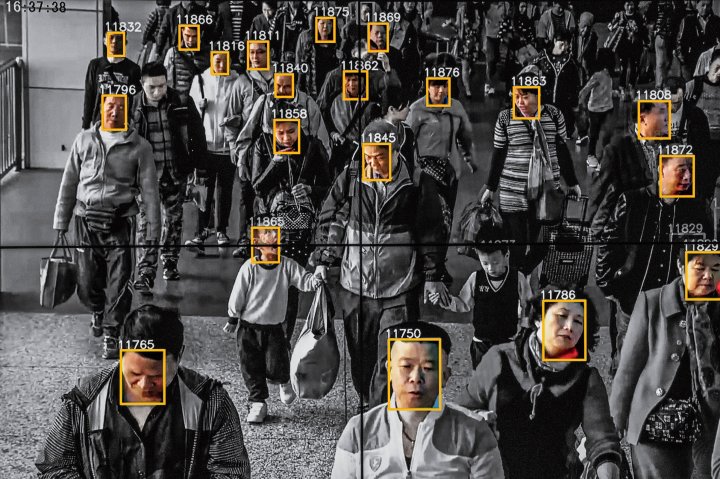 Prepoznavanje lica je jedan od elemenata kineskih napora za praćenje
Prepoznavanje lica je jedan od elemenata kineskih napora za praćenjeZapisi George Orwell-a već su postali stvarnost u Kini zbog sistema tradicionalnih valuta centralne banke i platnih mreža koje su izgrađene na njemu.
Ako mislite da se to neće dogoditi u vašoj zemlji, razmislite ponovo.
To se dešava vrlo polako, ali na kraju će sve svetske vlade primeniti Sistem Socijalnih Bodova, dok je Kina to tek prva učinila.
Kako ljudi kontrolišu sa kim obavljam transakcije?
U prvom primeru sa zlatnim novčićem, kada ga predate nekom drugom kao plaćanje za robu ili uslugu, ne postoji centralizovana evidencija vaše platne transakcije i imate savršenu privatnost.
Međutim, u centralnom bankarskom sistemu, budući da banka ima i znanje o podacima o vašim transakcijama i moć da kontroliše vaša sredstva, oni mogu proceniti niz pravila da bi odlučili da li žele da dozvole vašu transakciju ili da to odbiju, takođe kao i izvršenje te odluke kontrolišući vaša sredstva.
Tako su vlade naoružale tradicionalne valute i centralni bankarski sistem kao Sistem Kontrole nad svojim građanima.
Da rezimiramo: Pošto ste se odrekli bezbednosti i privatnosti svog novca, izgubili ste i svoju finansijsku slobodu.
“Privatnost nije o tome da nešto treba sakriti. Privatnost je o tome da nešto treba zaštititi.” — Edward Snowden
Kako da povratimo svoj finansijski samo-suverenitet?
Pokret Cypherpunk pokrenuli su pojedinci koji su shvatili važnost zaštite privatnosti i slobode pojedinačnih korisnika na Internetu.
Cypherpunk-ovi su verovali da se gore opisani problemi mogu rešiti samo potpuno novim novčanim sistemom, koji poštuje i štiti bezbednost, privatnost i slobodu pojedinca.
Mnogi od Cypherpunk-era pokušali su da izgrade nove etičke sisteme e-gotovine koji bi mogli da zamene tradicionalne valute i centralno bankarstvo.
Bilo je mnogo teških računarskih problema koje je trebalo prevazići u stvaranju tako istinski decentralizovanog sistema, i ako su neki od njih bili blizu cilja, svi su propali.
Odnosno, sve dok jedan pseudonim Cypherpunk-a to konačno nije shvatio 2008. godine: kombinacijom digitalnih potpisa, distribuirane knjige i peer-to-peer mreže, rođen je Bitcoin.
Kako Bitcoin funkcioniše?
Baš kao što ne treba da znate kako Internet funkcioniše da bi gledali slike mačaka na Internetu, razumevanje tehničke složenosti načina na koji Bitcoin radi „ispod haube“ nije neophodno da biste ga koristili i postigli sopstveni finansijski samo-suverenitet.
Važna stvar koju želim da saznate iz ovog članka je da iako većina novih tehnologija u početku ima loše korisničko iskustvo, Bitcoin svesno i vrlo namerno ne žrtvuje svoje osnovne filozofske principe da bi brže pridobio nove korisnike, ili da bi poboljšao korisničko iskustvo.
Najpametniji Cypherpunk-ovi rade na poboljšanju korisničkog iskustva.
Tehnologija će se sa vremenom poboljšavati, baš kao i za Internet.
Pa onda, zašto Bitcoin?
Reći ću vam zašto:
Jer Bitcoin poštuje bezbednost, privatnost i slobodu pojedinca.
Po čemu je Bitcoin bolji od sistema tradicionalnih valuta?
Za početak, Bitcoin nema Uslove korišćenja, Politiku privatnosti i Propise o usklađenosti sa KYC/AML. (Know Your Costumer & Anti-money Laundering)
Bitcoin je uspešan primer implementacije kripto-anarhije, gde su jedina pravila kriptografija, matematika i jak skup konsenzusnih pravila.
To je distribuirani i nepoverljivi sistem zasnovan na finansijskim podsticajima i nijedna osoba ili centralizovani entitet ne može da kontroliše Bitcoin.
Ono što je najvažnije, Bitcoin vam omogućava da odustanete od tradicionalnih valuta, sistema delimičnih rezervi i centralnog bankarstva rešavanjem osnovnih problema poverenja:
- Sigurnost od inflacije korišćenjem fiksnog snabdevanja
- Sigurnost od zaplene korišćenjem ključeva za kontrolu sredstava
- Privatnost plaćanja korišćenjem pseudonimnih identiteta
- Sloboda protiv cenzure korišćenjem peer to peer mreže
Kako Bitcoin štiti od Inflacije?
Jedno od najkritičnijih pravila konsenzusa o Bitcoin-u je da može postojati najviše 21,000,000 Bitcoin-a.
Nakon izdavanja svih Bitcoin-a, nikada više ne može doći do stvaranja novih Bitcoin-a.
Stoga je Bitcoin deflaciona valuta, koja sprečava ljude da ukradu vaš novac ili njegovu vrednost naduvavanjem novčane mase.
 Monetarna Inflacija Bitcoin-a
Monetarna Inflacija Bitcoin-aKako Bitcoin štiti od Zaplene?
Bitcoin se može preneti samo pomoću kriptografskog privatnog ključa koji kontroliše sredstva.
Nijedan bitcoin nikada ne izadje van sistema.
Nijedna vlada, banka ili sudski nalog ne mogu zapleniti ta sredstva.
Jednostavno ne postoji način da se takva odredba ili naredba sprovede od bilo kog „organa vlasti“, jer Bitcoin ne priznaje nijedno „ovlašćenje“ u svom sistemu.
Bitcoin je potpuno samo-suveren sistem i zbog svoje distribuirane prirode ne može se ugasiti.
Postoji zbog sopstvenih zasluga, samo zato što ljudi veruju u to.
Kako Bitcoin štiti Privatnost?
Bitcoin ne traži vaše ime ili druge detalje koji mogu lično da vas identifikuju.
Vaš identitet je kriptografski, a ne vaše stvarno ime.
Dakle, vaš identitet izgleda otprilike kao 1vizSAISbuiKsbt9d8JV8itm5ackk2TorC, a ne kao „Stefan Petrovič“.
Pored toga, niko ne zna ko kontroliše sredstva na datoj Bitcoin adresi, a nova tehnologija se neprestano razvija kako bi se poboljšala privatnost Bitcoin-a.
Kako Bitcoin štiti od Cenzure?
Peer-to-peer Bitcoin mreža je u potpunosti distribuirana.
To znači da ako jedan čvor pokuša da cenzuriše vašu transakciju, neće uspeti ukoliko * svaki * čvor(Node) ne izvrši cenzuru vaše transakcije.
Šta će vlada i banke učiniti sa Bitcoin-om?
Neke zemlje su pokušale da ga regulišu, kontrolišu, isključe itd., ali nijedna od njih nije uspela.
Čini se da uglavnom samo žele da koriste postojeći sistem centralnih banaka da bi kontrolisali kako ljudi trguju tradicionalnim valutama za Bitcoin, i naravno žele da oporezuju Bitcoin na bilo koji mogući način.
Evo nekoliko uobičajenih tvrdnji vlada i banaka o Bitcoin-u:
 Evropska centralna banka kaže da Bitcoin nije valuta i upozorava da je vrlo nestabilna.
Evropska centralna banka kaže da Bitcoin nije valuta i upozorava da je vrlo nestabilna.„Bitcoin, izgleda samo kao prevara“, rekao je gospodin Tramp. „Ne sviđa mi se jer je to još jedna valuta koja se takmiči sa dolarom.“
Da li je vrednost Bitcoin-a nestabilna?
Ako umanjite grafikon cena, videćete da Bitcoin-u neprekidno raste vrednost od kada je stvoren, trgujući sa manje od 0,01 USD i polako se penje na preko 60.000 USD na nedavnom vrhuncu početkom 2021. godine.
 Cena Bitcoina od 2011. godine
Cena Bitcoina od 2011. godineTo je zato što je njegova ponuda fiksna i ljudi cene njegovu nestašicu.
Sa većom potražnjom i fiksnom ponudom, cene vremenom rastu.
Kako godine odmiču, njegova vrednost će se povećavati kako novi korisnici počinju da drže Bitcoin. (U svetu Bitcoina držanju kažemo HODL. Drži bitcoin. Hodl bitcoin.)
Da li je Bitcoin novac?
Da biste odgovorili na pitanje da li je Bitcoin novac ili ne, prvo morate definisati pojam „novac“.
Nažalost, reč „novac“ koristimo da bismo opisali nekoliko vrlo različitih komplikovanih koncepata, koji su svi potpuno odvojeni.
Termin „novac“ se zapravo odnosi na:
- Zaliha Vrednosti (Store of Value)
- Sredstvo Razmene ( Medium of Exchange)
- Obračunska Jedinica (Unit of Account)
- Sistem Kontrole (System Control)
Bitcoin kao Zaliha Vrednosti
Ovaj tweet to savršeno objašnjava:
Sinov prijatelj: “Matt, šta će se dogoditi ako novčić od 1 funte usitnite na pola?”
Dobijaš dva komada bezvrednog metala. Ako zlatnik usitnite na pola, dobićete dva zlatnika, od kojih svaki vredi polovinu onoga što je novčić bio.
Sin: „… isto tako kao sa zlatom jeste sa bitcoinima“.
Bitcoin je potpuno deljiv i deluje kao izvrsna zaliha vrednosti, baš kao što je i zlato već hiljadama godina.
Bitcoin kao Sredstvo Razmene
Bitcoin je dobro služio kao sredstvo razmene za svoje rane korisnike.
Ali skaliranje Bitcoin-a na globalni nivo koji bi mogao da posluži svim ljudima je veliki izazov, jer se osnovna „blockchain“ tehnologija ne skalira na globalni nivo.
Da bi rešio ovaj problem skaliranja, Satoshi je izumeo koncept kanala plaćanja, a u kombinaciji sa malo pomoći drugih briljantnih računarskih naučnika Cipherpunk-a koji su poboljšali koncept tokom poslednjih 10 godina, sada imamo mrežu Lightning, koja omogućava da se Bitcoin koristi kao odlično Sredstvo Razmene, koje se vremenom može proširiti na globalni nivo.
Bitcoin kao Obračunska Jedinica
Najmanja obračunska jedinica Bitcoin-a nazvana je po njenom tvorcu, Satoshi-u.
Jedan Bitcoin je jednak 100.000.000 Satoshi-a.
Na kraju, kako se robe i usluge sve češće razmenjuju za Bitcoin, sve više ljudi će koristiti Bitcoin ili „Sats“ kao obračunsku jedinicu.
Bitcoin kao Sistem Kontrole
Budući da je Bitcoin dizajniran da poštuje i štiti ljudska prava pojedinca, posebno bezbednost, privatnost i slobodu novca; ne bi bio dobar Sistem Kontrole i ne može se koristiti za ugnjetavanje ljudi, kao što se dešava sa tradicionalnim valutama i sistemima centralnog bankarstva koji to trenutno vrlo dobro rade.
Šta je sa „Sledećim Bitcoin-om“?
Kao što može biti samo jedan „globalni“ Internet, tako može biti i samo jedan globalni novac, a stigao je i novi Bitcoin Standard.
Sve ostalo je ili direktna prevara ili gubljenje vremena.
Ako bi neko želeo da vam proda „Sledeće Zlato“, da li biste ga kupili?
Na kraju
Nadam se da vam je ovaj članak pomogao da razumete zašto je Bitcoin stvoren i kako može da pomogne svetu da se oslobodi tradicionalnih valuta i sistema centralnog bankarstva koji je veoma duboko integrisan u naše trenutno društvo.
Evo nekoliko misli koje treba poneti sa sobom:
- Bitcoin nije izmišljen radi zarade, već je izmišljen da bi promenio svet.
- Bitcoin će to učiniti poštujući korisnikovu bezbednost, privatnost i slobodu.
- Bitcoin se već koristi kao novac, na nekoliko načina na koji se novac može koristiti.
- Bitcoin nije nestabilan, njegova vrednost vremenom polako raste (odzumirajte).
- Bitcoin ima mnogo kopija i prevaranata koji će pokušati da vam prodaju svoju kopiju Bitcoin-a. Ne zavaravajte se lažnim Bitcoin-om baš kao što vas ne bi prevarili ni Lažnim Zlatom.
- Bitcoin će postati najveći prenos bogatstva u našem životu, tako da ćete možda želeti da ih uzmete pre nego kasnije.
- Ostanite skromni i skupljajte satošije.
-
 @ 7460b7fd:4fc4e74b
2025-05-21 02:35:36
@ 7460b7fd:4fc4e74b
2025-05-21 02:35:36如果比特币发明了真正的钱,那么 Crypto 是什么?
引言
比特币诞生之初就以“数字黄金”姿态示人,被支持者誉为人类历史上第一次发明了真正意义上的钱——一种不依赖国家信用、总量恒定且不可篡改的硬通货。然而十多年过去,比特币之后蓬勃而起的加密世界(Crypto)已经远超“货币”范畴:从智能合约平台到去中心组织,从去央行的稳定币到戏谑荒诞的迷因币,Crypto 演化出一个丰富而混沌的新生态。这不禁引发一个根本性的追问:如果说比特币解决了“真金白银”的问题,那么 Crypto 又完成了什么发明?
 Crypto 与政治的碰撞:随着Crypto版图扩张,全球政治势力也被裹挟进这场金融变革洪流(示意图)。比特币的出现重塑了货币信用,但Crypto所引发的却是一场更深刻的政治与治理结构实验。从华尔街到华盛顿,从散户论坛到主权国家,越来越多人意识到:Crypto不只是技术或金融现象,而是一种全新的政治表达结构正在萌芽。正如有激进论者所断言的:“比特币发明了真正的钱,而Crypto则在发明新的政治。”价格K线与流动性曲线,或许正成为这个时代社群意志和社会价值观的新型投射。
Crypto 与政治的碰撞:随着Crypto版图扩张,全球政治势力也被裹挟进这场金融变革洪流(示意图)。比特币的出现重塑了货币信用,但Crypto所引发的却是一场更深刻的政治与治理结构实验。从华尔街到华盛顿,从散户论坛到主权国家,越来越多人意识到:Crypto不只是技术或金融现象,而是一种全新的政治表达结构正在萌芽。正如有激进论者所断言的:“比特币发明了真正的钱,而Crypto则在发明新的政治。”价格K线与流动性曲线,或许正成为这个时代社群意志和社会价值观的新型投射。冲突结构:当价格挑战选票
传统政治中,选票是人民意志的载体,一人一票勾勒出民主治理的正统路径。而在链上的加密世界里,骤升骤降的价格曲线和真金白银的买卖行为却扮演起了选票的角色:资金流向成了民意走向,市场多空成为立场表决。价格行为取代选票,这听来匪夷所思,却已在Crypto社群中成为日常现实。每一次代币的抛售与追高,都是社区对项目决策的即时“投票”;每一根K线的涨跌,都折射出社区意志的赞同或抗议。市场行为本身承担了决策权与象征权——价格即政治,正在链上蔓延。
这一新生政治形式与旧世界的民主机制形成了鲜明冲突。bitcoin.org中本聪在比特币白皮书中提出“一CPU一票”的工作量证明共识,用算力投票取代了人为决策bitcoin.org。而今,Crypto更进一步,用资本市场的涨跌来取代传统政治的选举。支持某项目?直接购入其代币推高市值;反对某提案?用脚投票抛售资产。相比漫长的选举周期和层层代议制,链上市场提供了近乎实时的“公投”机制。但这种机制也引发巨大争议:资本的投票天然偏向持币多者(富者)的意志,是否意味着加密政治更为金权而非民权?持币多寡成为影响力大小,仿佛选举演变成了“一币一票”,巨鲸富豪俨然掌握更多话语权。这种与民主平等原则的冲突,成为Crypto政治形式饱受质疑的核心张力之一。
尽管如此,我们已经目睹市场投票在Crypto世界塑造秩序的威力:2016年以太坊因DAO事件分叉时,社区以真金白银“投票”决定了哪条链获得未来。arkhamintelligence.com结果是新链以太坊(ETH)成为主流,其市值一度超过2,800亿美元,而坚持原则的以太经典(ETC)市值不足35亿美元,不及前者的八十分之一arkhamintelligence.com。市场选择清楚地昭示了社区的政治意志。同样地,在比特币扩容之争、各类硬分叉博弈中,无不是由投资者和矿工用资金与算力投票,胜者存续败者黯然。价格成为裁决纷争的最终选票,冲击着传统“选票决胜”的政治理念。Crypto的价格民主,与现代代议民主正面相撞,激起当代政治哲思中前所未有的冲突火花。
治理与分配
XRP对决SEC成为了加密世界“治理与分配”冲突的经典战例。2020年底,美国证券交易委员会(SEC)突然起诉Ripple公司,指控其发行的XRP代币属于未注册证券,消息一出直接引爆市场恐慌。XRP价格应声暴跌,一度跌去超过60%,最低触及0.21美元coindesk.com。曾经位居市值前三的XRP险些被打入谷底,监管的强硬姿态似乎要将这个项目彻底扼杀。
然而XRP社区没有选择沉默。 大批长期持有者组成了自称“XRP军团”(XRP Army)的草根力量,在社交媒体上高调声援Ripple,对抗监管威胁。面对SEC的指控,他们集体发声,质疑政府选择性执法,声称以太坊当年发行却“逍遥法外”,只有Ripple遭到不公对待coindesk.com。正如《福布斯》的评论所言:没人预料到愤怒的加密散户投资者会掀起法律、政治和社交媒体领域的‘海啸式’反击,痛斥监管机构背弃了保护投资者的承诺crypto-law.us。这种草根抵抗监管的话语体系迅速形成:XRP持有者不但在网上掀起舆论风暴,还采取实际行动向SEC施压。他们发起了请愿,抨击SEC背离保护投资者初衷、诉讼给个人投资者带来巨大伤害,号召停止对Ripple的上诉纠缠——号称这是在捍卫全球加密用户的共同利益bitget.com。一场由民间主导的反监管运动就此拉开帷幕。
Ripple公司则选择背水一战,拒绝和解,在法庭上与SEC针锋相对地鏖战了近三年之久。Ripple坚称XRP并非证券,不应受到SEC管辖,即使面临沉重法律费用和业务压力也不妥协。2023年,这场持久战迎来了标志性转折:美国法庭作出初步裁决,认定XRP在二级市场的流通不构成证券coindesk.com。这一胜利犹如给沉寂已久的XRP注入强心针——消息公布当天XRP价格飙涨近一倍,盘中一度逼近1美元大关coindesk.com。沉重监管阴影下苟延残喘的项目,凭借司法层面的突破瞬间重获生机。这不仅是Ripple的胜利,更被支持者视为整个加密行业对SEC强权的一次胜仗。
XRP的对抗路线与某些“主动合规”的项目形成了鲜明对比。 稳定币USDC的发行方Circle、美国最大合规交易所Coinbase等选择了一条迎合监管的道路:它们高调拥抱现行法规,希望以合作换取生存空间。然而现实却给了它们沉重一击。USDC稳定币在监管风波中一度失去美元锚定,哪怕Circle及时披露储备状况也无法阻止恐慌蔓延,大批用户迅速失去信心,短时间内出现数十亿美元的赎回潮blockworks.co。Coinbase则更为直接:即便它早已注册上市、反复向监管示好,2023年仍被SEC指控为未注册证券交易所reuters.com,卷入漫长诉讼漩涡。可见,在迎合监管的策略下,这些机构非但未能换来监管青睐,反而因官司缠身或用户流失而丧失市场信任。 相比之下,XRP以对抗求生存的路线反而赢得了投资者的眼光:价格的涨跌成为社区投票的方式,抗争的勇气反过来强化了市场对它的信心。
同样引人深思的是另一种迥异的治理路径:技术至上的链上治理。 以MakerDAO为代表的去中心化治理模式曾被寄予厚望——MKR持币者投票决策、算法维持稳定币Dai的价值,被视为“代码即法律”的典范。然而,这套纯技术治理在市场层面却未能形成广泛认同,亦无法激发群体性的情绪动员。复杂晦涩的机制使得普通投资者难以参与其中,MakerDAO的治理讨论更多停留在极客圈子内部,在社会大众的政治对话中几乎听不见它的声音。相比XRP对抗监管所激发的铺天盖地关注,MakerDAO的治理实验显得默默无闻、难以“出圈”。这也说明,如果一种治理实践无法连接更广泛的利益诉求和情感共鸣,它在社会政治层面就难以形成影响力。
XRP之争的政治象征意义由此凸显: 它展示了一条“以市场对抗国家”的斗争路线,即通过代币价格的集体行动来回应监管权力的施压。在这场轰动业界的对决中,价格即是抗议的旗帜,涨跌映射着政治立场。XRP对SEC的胜利被视作加密世界向旧有权力宣告的一次胜利:资本市场的投票器可以撼动监管者的强权。这种“价格即政治”的张力,正是Crypto世界前所未有的社会实验:去中心化社区以市场行为直接对抗国家权力,在无形的价格曲线中凝聚起政治抗争的力量,向世人昭示加密货币不仅有技术和资本属性,更蕴含着不可小觑的社会能量和政治意涵。
不可归零的政治资本
Meme 币的本质并非廉价或易造,而在于其构建了一种“无法归零”的社群生存结构。 对于传统观点而言,多数 meme 币只是短命的投机游戏:价格暴涨暴跌后一地鸡毛,创始人套现跑路,投资者血本无归,然后“大家转去炒下一个”theguardian.com。然而,meme 币社群的独特之处在于——失败并不意味着终结,而更像是运动的逗号而非句号。一次币值崩盘后,持币的草根们往往并未散去;相反,他们汲取教训,准备东山再起。这种近乎“不死鸟”的循环,使得 meme 币运动呈现出一种数字政治循环的特质:价格可以归零,但社群的政治热情和组织势能不归零。正如研究者所指出的,加密领域中的骗局、崩盘等冲击并不会摧毁生态,反而成为让系统更加强韧的“健康应激”,令整个行业在动荡中变得更加反脆弱cointelegraph.com。对应到 meme 币,每一次暴跌和重挫,都是社群自我进化、卷土重来的契机。这个去中心化群体打造出一种自组织的安全垫,失败者得以在瓦砾上重建家园。对于草根社群、少数派乃至体制的“失败者”而言,meme 币提供了一个永不落幕的抗争舞台,一种真正反脆弱的政治性。正因如此,我们看到诸多曾被嘲笑的迷因项目屡败屡战:例如 Dogecoin 自2013年问世后历经八年沉浮,早已超越玩笑属性,成为互联网史上最具韧性的迷因之一frontiersin.org;支撑 Dogecoin 的正是背后强大的迷因文化和社区意志,它如同美国霸权支撑美元一样,为狗狗币提供了“永不中断”的生命力frontiersin.org。
“复活权”的数字政治意涵
这种“失败-重生”的循环结构蕴含着深刻的政治意涵:在传统政治和商业领域,一个政党选举失利或一家公司破产往往意味着清零出局,资源散尽、组织瓦解。然而在 meme 币的世界,社群拥有了一种前所未有的“复活权”。当项目崩盘,社区并不必然随之消亡,而是可以凭借剩余的人心和热情卷土重来——哪怕换一个 token 名称,哪怕重启一条链,运动依然延续。正如 Cheems 项目的核心开发者所言,在几乎无人问津、技术受阻的困境下,大多数人可能早已卷款走人,但 “CHEEMS 社区没有放弃,背景、技术、风投都不重要,重要的是永不言弃的精神”cointelegraph.com。这种精神使得Cheems项目起死回生,社区成员齐声宣告“我们都是 CHEEMS”,共同书写历史cointelegraph.com。与传统依赖风投和公司输血的项目不同,Cheems 完全依靠社区的信念与韧性存续发展,体现了去中心化运动的真谛cointelegraph.com。这意味着政治参与的门槛被大大降低:哪怕没有金主和官方背书,草根也能凭借群体意志赋予某个代币新的生命。对于身处社会边缘的群体来说,meme 币俨然成为自组织的安全垫和重新集结的工具。难怪有学者指出,近期涌入meme币浪潮的主力,正是那些对现实失望但渴望改变命运的年轻人theguardian.com——“迷茫的年轻人,想要一夜暴富”theguardian.com。meme币的炒作表面上看是投机赌博,但背后蕴含的是草根对既有金融秩序的不满与反抗:没有监管和护栏又如何?一次失败算不得什么,社区自有后路和新方案。这种由底层群众不断试错、纠错并重启的过程,本身就是一种数字时代的新型反抗运动和群众动员机制。
举例而言,Terra Luna 的沉浮充分展现了这种“复活机制”的政治力量。作为一度由风投资本热捧的项目,Luna 币在2022年的崩溃本可被视作“归零”的失败典范——稳定币UST瞬间失锚,Luna币价归零,数十亿美元灰飞烟灭。然而“崩盘”并没有画下休止符。Luna的残余社区拒绝承认失败命运,通过链上治理投票毅然启动新链,“复活”了 Luna 代币,再次回到市场交易reuters.com。正如 Terra 官方在崩盘后发布的推文所宣称:“我们力量永在社区,今日的决定正彰显了我们的韧性”reuters.com。事实上,原链更名为 Luna Classic 后,大批所谓“LUNC 军团”的散户依然死守阵地,誓言不离不弃;他们自发烧毁巨量代币以缩减供应、推动技术升级,试图让这个一度归零的项目重新燃起生命之火binance.com。失败者并未散场,而是化作一股草根洪流,奋力托举起项目的残迹。经过迷因化的叙事重塑,这场从废墟中重建价值的壮举,成为加密世界中草根政治的经典一幕。类似的案例不胜枚举:曾经被视为笑话的 DOGE(狗狗币)正因多年社群的凝聚而跻身主流币种,总市值一度高达数百亿美元,充分证明了“民有民享”的迷因货币同样可以笑傲市场frontiersin.org。再看最新的美国政治舞台,连总统特朗普也推出了自己的 meme 币 $TRUMP,号召粉丝拿真金白银来表达支持。该币首日即从7美元暴涨至75美元,两天后虽回落到40美元左右,但几乎同时,第一夫人 Melania 又发布了自己的 $Melania 币,甚至连就职典礼的牧师都跟风发行了纪念币theguardian.com!显然,对于狂热的群众来说,一个币的沉浮并非终点,而更像是运动的换挡——资本市场成为政治参与的新前线,你方唱罢我登场,meme 币的群众动员热度丝毫不减。值得注意的是,2024年出现的 Pump.fun 等平台更是进一步降低了这一循环的技术门槛,任何人都可以一键生成自己的 meme 币theguardian.com。这意味着哪怕某个项目归零,剩余的社区完全可以借助此类工具迅速复制一个新币接力,延续集体行动的火种。可以说,在 meme 币的世界里,草根社群获得了前所未有的再生能力和主动权,这正是一种数字时代的群众政治奇观:失败可以被当作梗来玩,破产能够变成重生的序章。
价格即政治:群众投机的新抗争
meme 币现象的兴盛表明:在加密时代,价格本身已成为一种政治表达。这些看似荒诞的迷因代币,将金融市场变成了群众宣泄情绪和诉求的另一个舞台。有学者将此概括为“将公民参与直接转化为了投机资产”cdn-brighterworld.humanities.mcmaster.ca——也就是说,社会运动的热情被注入币价涨跌,政治支持被铸造成可以交易的代币。meme 币融合了金融、技术与政治,通过病毒般的迷因文化激发公众参与,形成对现实政治的某种映射cdn-brighterworld.humanities.mcmaster.caosl.com。当一群草根投入全部热忱去炒作一枚毫无基本面支撑的币时,这本身就是一种大众政治动员的体现:币价暴涨,意味着一群人以戏谑的方式在向既有权威叫板;币价崩盘,也并不意味着信念的消亡,反而可能孕育下一次更汹涌的造势。正如有分析指出,政治类 meme 币的出现前所未有地将群众文化与政治情绪融入市场行情,价格曲线俨然成为民意和趋势的风向标cdn-brighterworld.humanities.mcmaster.ca。在这种局面下,投机不再仅仅是逐利,还是一种宣示立场、凝聚共识的过程——一次次看似荒唐的炒作背后,是草根对传统体制的不服与嘲讽,是失败者拒绝认输的呐喊。归根结底,meme 币所累积的,正是一种不可被归零的政治资本。价格涨落之间,群众的愤怒、幽默与希望尽显其中;这股力量不因一次挫败而消散,反而在市场的循环中愈发壮大。也正因如此,我们才说“价格即政治”——在迷因币的世界里,价格不只是数字,更是人民政治能量的晴雨表,哪怕归零也终将卷土重来。cdn-brighterworld.humanities.mcmaster.caosl.com
全球新兴现象:伊斯兰金融的入场
当Crypto在西方世界掀起市场治政的狂潮时,另一股独特力量也悄然融入这一场域:伊斯兰金融携其独特的道德秩序,开始在链上寻找存在感。长期以来,伊斯兰金融遵循着一套区别于世俗资本主义的原则:禁止利息(Riba)、反对过度投机(Gharar/Maysir)、强调实际资产支撑和道德投资。当这些原则遇上去中心化的加密技术,会碰撞出怎样的火花?出人意料的是,这两者竟在“以市场行为表达价值”这个层面产生了惊人的共鸣。伊斯兰金融并不拒绝市场机制本身,只是为其附加了道德准则;Crypto则将市场机制推向了政治高位,用价格来表达社群意志。二者看似理念迥异,实则都承认市场行为可以也应当承载社会价值观。这使得越来越多金融与政治分析人士开始关注:当虔诚的宗教伦理遇上狂野的加密市场,会塑造出何种新范式?
事实上,穆斯林世界已经在探索“清真加密”的道路。一些区块链项目致力于确保协议符合伊斯兰教法(Sharia)的要求。例如Haqq区块链发行的伊斯兰币(ISLM),从规则层面内置了宗教慈善义务——每发行新币即自动将10%拨入慈善DAO,用于公益捐赠,以符合天课(Zakat)的教义nasdaq.comnasdaq.com。同时,该链拒绝利息和赌博类应用,2022年还获得了宗教权威的教令(Fatwa)认可其合规性nasdaq.com。再看理念层面,伊斯兰经济学强调货币必须有内在价值、收益应来自真实劳动而非纯利息剥削。这一点与比特币的“工作量证明”精神不谋而合——有人甚至断言法定货币无锚印钞并不清真,而比特币这类需耗费能源生产的资产反而更符合教法初衷cointelegraph.com。由此,越来越多穆斯林投资者开始以道德投资的名义进入Crypto领域,将资金投向符合清真原则的代币和协议。
这种现象带来了微妙的双重合法性:一方面,Crypto世界原本奉行“价格即真理”的世俗逻辑,而伊斯兰金融为其注入了一股道德合法性,使部分加密资产同时获得了宗教与市场的双重背书;另一方面,即便在遵循宗教伦理的项目中,最终决定成败的依然是市场对其价值的认可。道德共识与市场共识在链上交汇,共同塑造出一种混合的新秩序。这一全球新兴现象引发广泛议论:有人将其视为金融民主化的极致表现——不同文化价值都能在市场平台上表达并竞争;也有人警惕这可能掩盖新的风险,因为把宗教情感融入高风险资产,既可能凝聚强大的忠诚度,也可能在泡沫破裂时引发信仰与财富的双重危机。但无论如何,伊斯兰金融的入场使Crypto的政治版图更加丰盈多元。从华尔街交易员到中东教士,不同背景的人们正通过Crypto这个奇特的舞台,对人类价值的表达方式进行前所未有的实验。
升华结语:价格即政治的新直觉
回顾比特币问世以来的这段历程,我们可以清晰地看到一条演进的主线:先有货币革命,后有政治发明。比特币赋予了人类一种真正自主的数字货币,而Crypto在此基础上完成的,则是一项前所未有的政治革新——它让市场价格行为承担起了类似政治选票的功能,开创了一种“价格即政治”的新直觉。在这个直觉下,市场不再只是冷冰冰的交易场所;每一次资本流动、每一轮行情涨落,都被赋予了社会意义和政治涵义。买入即表态,卖出即抗议,流动性的涌入或枯竭胜过千言万语的陈情。Crypto世界中,K线图俨然成为民意曲线,行情图就是政治晴雨表。决策不再由少数权力精英关起门来制定,而是在全球无眠的交易中由无数普通人共同谱写。这样的政治形式也许狂野,也许充满泡沫和噪音,但它不可否认地调动起了广泛的社会参与,让原本疏离政治进程的个体通过持币、交易重新找回了影响力的幻觉或实感。
“价格即政治”并非一句简单的口号,而是Crypto给予世界的全新想象力。它质疑了传统政治的正统性:如果一串代码和一群匿名投资者就能高效决策资源分配,我们为何还需要繁冗的官僚体系?它也拷问着自身的内在隐忧:当财富与权力深度绑定,Crypto政治如何避免堕入金钱统治的老路?或许,正是在这样的矛盾和张力中,人类政治的未来才会不断演化。Crypto所开启的,不仅是技术乌托邦或金融狂欢,更可能是一次对民主形式的深刻拓展和挑战。这里有最狂热的逐利者,也有最理想主义的社群塑梦者;有一夜暴富的神话,也有瞬间破灭的惨痛。而这一切汇聚成的洪流,正冲撞着工业时代以来既定的权力谱系。
当我们再次追问:Crypto究竟是什么? 或许可以这样回答——Crypto是比特币之后,人类完成的一次政治范式的试验性跃迁。在这里,价格行为化身为选票,资本市场演化为广场,代码与共识共同撰写“社会契约”。这是一场仍在进行的文明实验:它可能无声地融入既有秩序,也可能剧烈地重塑未来规则。但无论结局如何,如今我们已经见证:在比特币发明真正的货币之后,Crypto正在发明真正属于21世纪的政治。它以数字时代的语言宣告:在链上,价格即政治,市场即民意,代码即法律。这,或许就是Crypto带给我们的最直观而震撼的本质启示。
参考资料:
-
中本聪. 比特币白皮书: 一种点对点的电子现金系统. (2008)bitcoin.org
-
Arkham Intelligence. Ethereum vs Ethereum Classic: Understanding the Differences. (2023)arkhamintelligence.com
-
Binance Square (@渔神的加密日记). 狗狗币价格为何上涨?背后的原因你知道吗?binance.com
-
Cointelegraph中文. 特朗普的迷因币晚宴预期内容揭秘. (2025)cn.cointelegraph.com
-
慢雾科技 Web3Caff (@Lisa). 风险提醒:从 LIBRA 看“政治化”的加密货币骗局. (2025)web3caff.com
-
Nasdaq (@Anthony Clarke). How Cryptocurrency Aligns with the Principles of Islamic Finance. (2023)nasdaq.comnasdaq.com
-
Cointelegraph Magazine (@Andrew Fenton). DeFi can be halal but not DOGE? Decentralizing Islamic finance. (2023)cointelegraph.com
-
-
 @ 06b7819d:d1d8327c
2024-11-29 13:26:00
@ 06b7819d:d1d8327c
2024-11-29 13:26:00The Weaponization of Technology: A Prelude to Adoption
Throughout history, new technologies have often been weaponized before becoming widely adopted for civilian use. This pattern, deeply intertwined with human priorities for power, survival, and dominance, sheds light on how societies interact with technological innovation.
The Weaponization Imperative
When a groundbreaking technology emerges, its potential to confer an advantage—military, economic, or ideological—tends to attract attention from those in power. Governments and militaries, seeking to outpace rivals, often invest heavily in adapting new tools for conflict or defense. Weaponization provides a context where innovation thrives under high-stakes conditions. Technologies like radar, nuclear energy, and the internet, initially conceived or expanded within the framework of military priorities, exemplify this trend.
Historical Examples
1. Gunpowder: Invented in 9th-century China, gunpowder was first used for military purposes before transitioning into civilian life, influencing mining, construction, and entertainment through fireworks.-
The Internet: Initially developed as ARPANET during the Cold War to ensure communication in the event of a nuclear attack, the internet’s infrastructure later supported the global digital revolution, reshaping commerce, education, and social interaction.
-
Drones: Unmanned aerial vehicles began as tools of surveillance and warfare but have since been adopted for everything from package delivery to agricultural monitoring.
Weaponization often spurs rapid technological development. War environments demand urgency and innovation, fast-tracking research and turning prototypes into functional tools. This phase of militarization ensures that the technology is robust, scalable, and often cost-effective, setting the stage for broader adoption.
Adoption and Civilian Integration
Once a technology’s military dominance is established, its applications often spill into civilian life. These transitions occur when:
• The technology becomes affordable and accessible. • Governments or corporations recognize its commercial potential. • Public awareness and trust grow, mitigating fears tied to its military origins.For example, GPS was first a military navigation system but is now indispensable for personal devices, logistics, and autonomous vehicles.
Cultural Implications
The process of weaponization shapes public perception of technology. Media narratives, often dominated by stories of power and conflict, influence how societies view emerging tools. When technologies are initially seen through the lens of violence or control, their subsequent integration into daily life can carry residual concerns, from privacy to ethical implications.
Conclusion
The weaponization of technology is not an aberration but a recurring feature of technological progress. By understanding this pattern, societies can critically assess how technologies evolve from tools of conflict to instruments of everyday life, ensuring that ethical considerations and equitable access are not lost in the rush to innovate. As Marshall McLuhan might suggest, the medium through which a technology is introduced deeply influences the message it ultimately conveys to the world.
-
-
 @ cae03c48:2a7d6671
2025-05-22 20:01:14
@ cae03c48:2a7d6671
2025-05-22 20:01:14Bitcoin Magazine

Bitcoiners Should Care About The GENIUS ActWhile the GENIUS Act is a stablecoin bill, U.S.-based Bitcoin enthusiasts should be paying attention to the language in the bill as it pertains to the ability to transact privately with crypto assets — including bitcoin.
Two documents that recently circulated among Senate Banking Committee Democrats indicate that Senate Democrats want to see amendments made to the GENIUS Act that would greatly reduce user privacy in crypto transactions.
Senate Democrats’ Analysis of GENIUS Act
The first of these two documents is a two-pager entitled “Banking Committee Democratic Staff Analysis on Latest GENIUS Act Draft”.
 NEW: Senate Banking Committee Democrats just dropped a scathing staff analysis of the latest GENIUS Act draft ahead of this evening’s cloture vote.
NEW: Senate Banking Committee Democrats just dropped a scathing staff analysis of the latest GENIUS Act draft ahead of this evening’s cloture vote. Staffers describe the latest GENIUS Act draft as a blueprint for ‘Trump crypto corruption’ and Big Tech dominance over digital… pic.twitter.com/Gqd2LxFGx1
— Eleanor Terrett (@EleanorTerrett) May 19, 2025
This document is filled with the type of rhetoric that is commonly associated with the Ranking Member of the Senate Banking Committee, Senator Elizabeth Warren (D-MA).
It refers to stablecoins as tools for illicit finance (despite the fact that the largest stablecoin issuer, Tether, often works with the Department of Justice (DoJ) and the FBI to stop the illegal use of stablecoins).
It also states that the current iteration of the GENIUS Act “does nothing to actually impose basic obligations on [crypto mixers] to prevent illicit finance.”
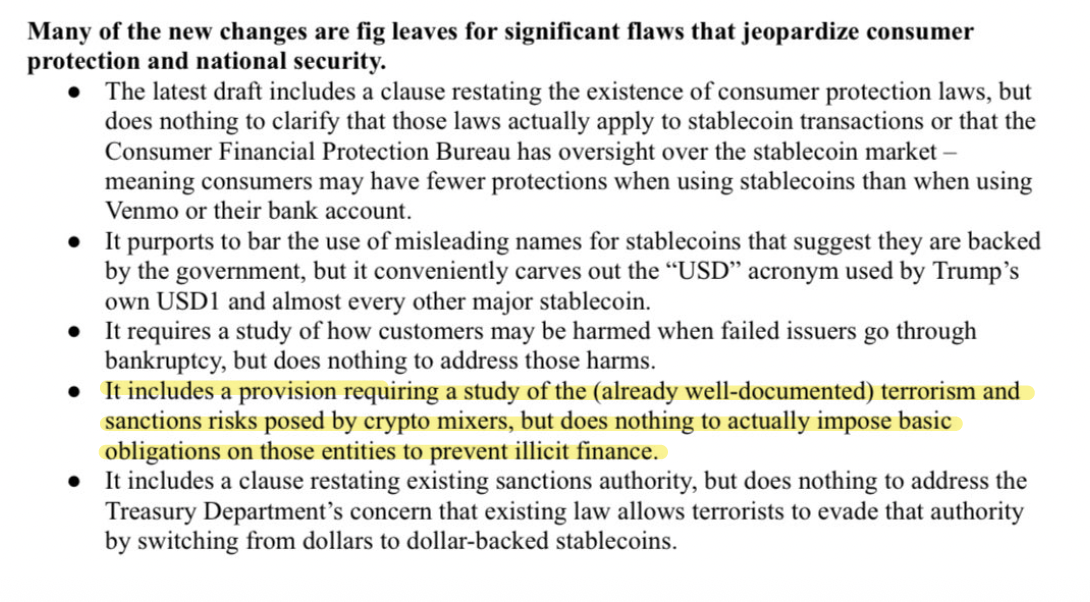
A segment from document featuring Democrats’ analysis of The GENIUS Act.
This latter critique of the bill is antithetical to guidance that Deputy Attorney General (DAG) Todd Blanche offered in a memo on April 7, 2025. DAG Blanche stated that the DoJ will no longer target crypto mixing services for the acts of their end users.
In this document, however, Senate Democrats indicate that they plan to continue targeting crypto mixing technology instead of those who abuse it.
If amendments regarding the targeting of crypto mixers are added to a revised version of the GENIUS Act, this could have an impact on Bitcoin users who employ such technology in the name of preserving their privacy.
A Letter From Democrats Opposing The GENIUS Act
Senate Banking Democrats circulated a second document on Monday, as well.
This document, a letter signed by 46 advocacy groups, opposed the GENIUS Act.
Brendan Pedersen of Punchbowl News shared segments of the letter on X.
Democratic staff on the Senate Banking Committee sent around a letter this AM signed by several dozen advocacy orgs opposing the GENIUS Act.
Includes ACRE, AFR, Center for Responsible Lending, Our Revolution, Public Citizen, Tech Oversight Project… pic.twitter.com/pragFvzSKB
— Brendan Pedersen (@BrendanPedersen) May 19, 2025
The authors of the letter claim that the GENIUS Act does not do enough to prevent illicit finance in part because it still allows for “self-hosted wallets that lack know-your-customer (KYC) requirements.”
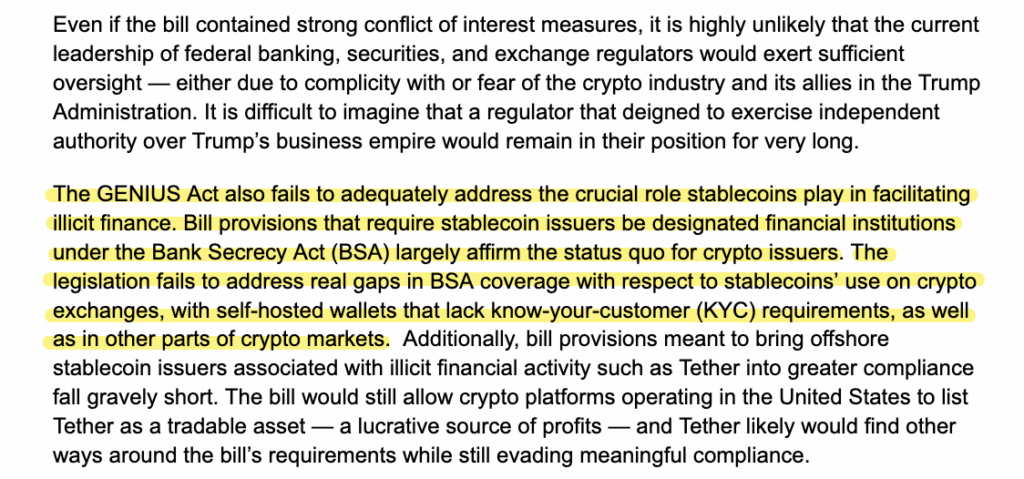
A segment from the letter opposing The GENIUS Act that touches on noncustodial wallets and KYC requirements.
If the GENIUS Act is amended so that it requires KYC for all wallets that touch stablecoins — self-custodial wallets included — it’s likely only a matter of time before similar regulation is established for Bitcoin wallets.
Bitcoin Transactional Privacy Is At Stake
Just because the GENIUS Act doesn’t directly reference Bitcoin doesn’t mean that Bitcoin won’t be affected by it.
If Senate Democrats get their way and crypto mixers become a target of the bill and/or if the bill requires that all wallets that touch stablecoins require users to KYC, and the bill is enacted into law, anonymity in crypto transactions will become a crime.
So, while some Bitcoiners may be anti-stablecoins, most, I would wager, aren’t anti-privacy. Therefore, it would behoove them to contact their elected officials to urge them to vote “no” for the GENIUS Act if the upcoming iteration of the bill restricts the ability to transact privately.
This post Bitcoiners Should Care About The GENIUS Act first appeared on Bitcoin Magazine and is written by Frank Corva.
-
 @ a95c6243:d345522c
2025-03-15 10:56:08
@ a95c6243:d345522c
2025-03-15 10:56:08Was nützt die schönste Schuldenbremse, wenn der Russe vor der Tür steht? \ Wir können uns verteidigen lernen oder alle Russisch lernen. \ Jens Spahn
In der Politik ist buchstäblich keine Idee zu riskant, kein Mittel zu schäbig und keine Lüge zu dreist, als dass sie nicht benutzt würden. Aber der Clou ist, dass diese Masche immer noch funktioniert, wenn nicht sogar immer besser. Ist das alles wirklich so schwer zu durchschauen? Mir fehlen langsam die Worte.
Aktuell werden sowohl in der Europäischen Union als auch in Deutschland riesige Milliardenpakete für die Aufrüstung – also für die Rüstungsindustrie – geschnürt. Die EU will 800 Milliarden Euro locker machen, in Deutschland sollen es 500 Milliarden «Sondervermögen» sein. Verteidigung nennen das unsere «Führer», innerhalb der Union und auch an «unserer Ostflanke», der Ukraine.
Das nötige Feindbild konnte inzwischen signifikant erweitert werden. Schuld an allem und zudem gefährlich ist nicht mehr nur Putin, sondern jetzt auch Trump. Europa müsse sich sowohl gegen Russland als auch gegen die USA schützen und rüsten, wird uns eingetrichtert.
Und während durch Diplomatie genau dieser beiden Staaten gerade endlich mal Bewegung in die Bemühungen um einen Frieden oder wenigstens einen Waffenstillstand in der Ukraine kommt, rasselt man im moralisch überlegenen Zeigefinger-Europa so richtig mit dem Säbel.
Begleitet und gestützt wird der ganze Prozess – wie sollte es anders sein – von den «Qualitätsmedien». Dass Russland einen Angriff auf «Europa» plant, weiß nicht nur der deutsche Verteidigungsminister (und mit Abstand beliebteste Politiker) Pistorius, sondern dank ihnen auch jedes Kind. Uns bleiben nur noch wenige Jahre. Zum Glück bereitet sich die Bundeswehr schon sehr konkret auf einen Krieg vor.
Die FAZ und Corona-Gesundheitsminister Spahn markieren einen traurigen Höhepunkt. Hier haben sich «politische und publizistische Verantwortungslosigkeit propagandistisch gegenseitig befruchtet», wie es bei den NachDenkSeiten heißt. Die Aussage Spahns in dem Interview, «der Russe steht vor der Tür», ist das eine. Die Zeitung verschärfte die Sache jedoch, indem sie das Zitat explizit in den Titel übernahm, der in einer ersten Version scheinbar zu harmlos war.
Eine große Mehrheit der deutschen Bevölkerung findet Aufrüstung und mehr Schulden toll, wie ARD und ZDF sehr passend ermittelt haben wollen. Ähnliches gelte für eine noch stärkere militärische Unterstützung der Ukraine. Etwas skeptischer seien die Befragten bezüglich der Entsendung von Bundeswehrsoldaten dorthin, aber immerhin etwa fifty-fifty.
Eigentlich ist jedoch die Meinung der Menschen in «unseren Demokratien» irrelevant. Sowohl in der Europäischen Union als auch in Deutschland sind die «Eliten» offenbar der Ansicht, der Souverän habe in Fragen von Krieg und Frieden sowie von aberwitzigen astronomischen Schulden kein Wörtchen mitzureden. Frau von der Leyen möchte über 150 Milliarden aus dem Gesamtpaket unter Verwendung von Artikel 122 des EU-Vertrags ohne das Europäische Parlament entscheiden – wenn auch nicht völlig kritiklos.
In Deutschland wollen CDU/CSU und SPD zur Aufweichung der «Schuldenbremse» mehrere Änderungen des Grundgesetzes durch das abgewählte Parlament peitschen. Dieser Versuch, mit dem alten Bundestag eine Zweidrittelmehrheit zu erzielen, die im neuen nicht mehr gegeben wäre, ist mindestens verfassungsrechtlich umstritten.
Das Manöver scheint aber zu funktionieren. Heute haben die Grünen zugestimmt, nachdem Kanzlerkandidat Merz läppische 100 Milliarden für «irgendwas mit Klima» zugesichert hatte. Die Abstimmung im Plenum soll am kommenden Dienstag erfolgen – nur eine Woche, bevor sich der neu gewählte Bundestag konstituieren wird.
Interessant sind die Argumente, die BlackRocker Merz für seine Attacke auf Grundgesetz und Demokratie ins Feld führt. Abgesehen von der angeblichen Eile, «unsere Verteidigungsfähigkeit deutlich zu erhöhen» (ausgelöst unter anderem durch «die Münchner Sicherheitskonferenz und die Ereignisse im Weißen Haus»), ließ uns der CDU-Chef wissen, dass Deutschland einfach auf die internationale Bühne zurück müsse. Merz schwadronierte gefährlich mehrdeutig:
«Die ganze Welt schaut in diesen Tagen und Wochen auf Deutschland. Wir haben in der Europäischen Union und auf der Welt eine Aufgabe, die weit über die Grenzen unseres eigenen Landes hinausgeht.»
[Titelbild: Tag des Sieges]
Dieser Beitrag ist zuerst auf Transition News erschienen.
-
 @ 2b24a1fa:17750f64
2025-05-22 19:44:28
@ 2b24a1fa:17750f64
2025-05-22 19:44:28„Triff niemals deine Idole“ heißt ein gängiger Ratschlag. In gewendeten Zeiten stehen zu dem die Werte auf dem Kopf – und manche Künstler mit ihnen. Die Worte, die aus manch ihrer Mündern kommen, wirken, als hätte eine fremde Hand sie auf deren Zunge gelegt.
https://soundcloud.com/radiomuenchen/wolf-biermann-und-sein-falscher-friede-von-alexa-rodrian?
Die Sängerin Alexa Rodrian erlebte bei der Verleihung des Deutschen Filmpreises einen solchen Moment der Desillusion. Es war der Auftritt des Liedermachers Wolf Biermann. Hören Sie hierzu Alexa Rodrians Text „Wolf Biermann und sein falscher Friede“.
Bild: Marco Maas/fotografirma.de
-
 @ a95c6243:d345522c
2025-03-11 10:22:36
@ a95c6243:d345522c
2025-03-11 10:22:36«Wir brauchen eine digitale Brandmauer gegen den Faschismus», schreibt der Chaos Computer Club (CCC) auf seiner Website. Unter diesem Motto präsentierte er letzte Woche einen Forderungskatalog, mit dem sich 24 Organisationen an die kommende Bundesregierung wenden. Der Koalitionsvertrag müsse sich daran messen lassen, verlangen sie.
In den drei Kategorien «Bekenntnis gegen Überwachung», «Schutz und Sicherheit für alle» sowie «Demokratie im digitalen Raum» stellen die Unterzeichner, zu denen auch Amnesty International und Das NETTZ gehören, unter anderem die folgenden «Mindestanforderungen»:
- Verbot biometrischer Massenüberwachung des öffentlichen Raums sowie der ungezielten biometrischen Auswertung des Internets.
- Anlasslose und massenhafte Vorratsdatenspeicherung wird abgelehnt.
- Automatisierte Datenanalysen der Informationsbestände der Strafverfolgungsbehörden sowie jede Form von Predictive Policing oder automatisiertes Profiling von Menschen werden abgelehnt.
- Einführung eines Rechts auf Verschlüsselung. Die Bundesregierung soll sich dafür einsetzen, die Chatkontrolle auf europäischer Ebene zu verhindern.
- Anonyme und pseudonyme Nutzung des Internets soll geschützt und ermöglicht werden.
- Bekämpfung «privaten Machtmissbrauchs von Big-Tech-Unternehmen» durch durchsetzungsstarke, unabhängige und grundsätzlich föderale Aufsichtsstrukturen.
- Einführung eines digitalen Gewaltschutzgesetzes, unter Berücksichtigung «gruppenbezogener digitaler Gewalt» und die Förderung von Beratungsangeboten.
- Ein umfassendes Förderprogramm für digitale öffentliche Räume, die dezentral organisiert und quelloffen programmiert sind, soll aufgelegt werden.
Es sei ein Irrglaube, dass zunehmende Überwachung einen Zugewinn an Sicherheit darstelle, ist eines der Argumente der Initiatoren. Sicherheit erfordere auch, dass Menschen anonym und vertraulich kommunizieren können und ihre Privatsphäre geschützt wird.
Gesunde digitale Räume lebten auch von einem demokratischen Diskurs, lesen wir in dem Papier. Es sei Aufgabe des Staates, Grundrechte zu schützen. Dazu gehöre auch, Menschenrechte und demokratische Werte, insbesondere Freiheit, Gleichheit und Solidarität zu fördern sowie den Missbrauch von Maßnahmen, Befugnissen und Infrastrukturen durch «die Feinde der Demokratie» zu verhindern.
Man ist geneigt zu fragen, wo denn die Autoren «den Faschismus» sehen, den es zu bekämpfen gelte. Die meisten der vorgetragenen Forderungen und Argumente finden sicher breite Unterstützung, denn sie beschreiben offenkundig gängige, kritikwürdige Praxis. Die Aushebelung der Privatsphäre, der Redefreiheit und anderer Grundrechte im Namen der Sicherheit wird bereits jetzt massiv durch die aktuellen «demokratischen Institutionen» und ihre «durchsetzungsstarken Aufsichtsstrukturen» betrieben.
Ist «der Faschismus» also die EU und ihre Mitgliedsstaaten? Nein, die «faschistische Gefahr», gegen die man eine digitale Brandmauer will, kommt nach Ansicht des CCC und seiner Partner aus den Vereinigten Staaten. Private Überwachung und Machtkonzentration sind dabei weltweit schon lange Realität, jetzt endlich müssen sie jedoch bekämpft werden. In dem Papier heißt es:
«Die willkürliche und antidemokratische Machtausübung der Tech-Oligarchen um Präsident Trump erfordert einen Paradigmenwechsel in der deutschen Digitalpolitik. (...) Die aktuellen Geschehnisse in den USA zeigen auf, wie Datensammlungen und -analyse genutzt werden können, um einen Staat handstreichartig zu übernehmen, seine Strukturen nachhaltig zu beschädigen, Widerstand zu unterbinden und marginalisierte Gruppen zu verfolgen.»
Wer auf der anderen Seite dieser Brandmauer stehen soll, ist also klar. Es sind die gleichen «Feinde unserer Demokratie», die seit Jahren in diese Ecke gedrängt werden. Es sind die gleichen Andersdenkenden, Regierungskritiker und Friedensforderer, die unter dem großzügigen Dach des Bundesprogramms «Demokratie leben» einem «kontinuierlichen Echt- und Langzeitmonitoring» wegen der Etikettierung «digitaler Hass» unterzogen werden.
Dass die 24 Organisationen praktisch auch die Bekämpfung von Google, Microsoft, Apple, Amazon und anderen fordern, entbehrt nicht der Komik. Diese fallen aber sicher unter das Stichwort «Machtmissbrauch von Big-Tech-Unternehmen». Gleichzeitig verlangen die Lobbyisten implizit zum Beispiel die Förderung des Nostr-Netzwerks, denn hier finden wir dezentral organisierte und quelloffen programmierte digitale Räume par excellence, obendrein zensurresistent. Das wiederum dürfte in der Politik weniger gut ankommen.
[Titelbild: Pixabay]
Dieser Beitrag ist zuerst auf Transition News erschienen.
-
 @ 06b7819d:d1d8327c
2024-11-29 12:11:05
@ 06b7819d:d1d8327c
2024-11-29 12:11:05In June 2023, the Law Commission of England and Wales published its final report on digital assets, concluding that the existing common law is generally flexible enough to accommodate digital assets, including crypto-tokens and non-fungible tokens (NFTs).
However, to address specific areas of uncertainty, the Commission recommended targeted statutory reforms and the establishment of an expert panel.
Key Conclusions and Recommendations:
1. Recognition of a Third Category of Personal Property:Traditional English law classifies personal property into two categories: “things in possession” (tangible items) and “things in action” (enforceable rights). Digital assets do not fit neatly into either category. The Commission recommended legislation to confirm the existence of a distinct third category of personal property to better accommodate digital assets. 
-
Development of Common Law: The Commission emphasized that the common law is well-suited to adapt to the complexities of emerging technologies and should continue to evolve to address issues related to digital assets. 
-
Establishment of an Expert Panel: To assist courts in navigating the technical and legal challenges posed by digital assets, the Commission recommended that the government create a panel of industry experts, legal practitioners, academics, and judges. This panel would provide non-binding guidance on issues such as control and transfer of digital assets. 
-
Facilitation of Crypto-Token and Crypto-Asset Collateral Arrangements: The Commission proposed the creation of a bespoke statutory legal framework to facilitate the use of digital assets as collateral, addressing current legal uncertainties in this area. 
-
Clarification of the Financial Collateral Arrangements Regulations: The report recommended statutory amendments to clarify the extent to which digital assets fall within the scope of the Financial Collateral Arrangements (No 2) Regulations 2003, ensuring that existing financial regulations appropriately cover digital assets. 
Overall, the Law Commission’s report underscores the adaptability of English common law in addressing the challenges posed by digital assets, while also identifying specific areas where legislative action is necessary to provide clarity and support the evolving digital economy.
-
-
 @ 06b7819d:d1d8327c
2024-11-29 11:59:20
@ 06b7819d:d1d8327c
2024-11-29 11:59:20The system design and challenges of retail Central Bank Digital Currencies (CBDCs) differ significantly from Bitcoin in several key aspects, reflecting their distinct purposes and underlying philosophies:
-
Core Purpose and Issuance
• CBDCs: Issued by central banks, CBDCs are designed as state-backed digital currencies for public use. Their goal is to modernize payments, enhance financial inclusion, and provide a risk-free alternative to private money. • Bitcoin: A decentralized, peer-to-peer cryptocurrency created to operate independently of central authorities. Bitcoin aims to be a store of value and medium of exchange without reliance on intermediaries or governments.
-
Governance and Control
• CBDCs: Operate under centralized governance. Central banks retain control over issuance, transaction validation, and data management, allowing for integration with existing regulatory frameworks (e.g., AML and CFT). • Bitcoin: Fully decentralized, governed by a consensus mechanism (Proof of Work). Transactions are validated by miners, and no single entity controls the network.
-
Privacy
• CBDCs: Seek to balance privacy with regulatory compliance. Privacy-enhancing technologies may be implemented, but user data is typically accessible to intermediaries and central banks to meet regulatory needs. • Bitcoin: Pseudonymous by design. Transactions are public on the blockchain but do not directly link to individual identities unless voluntarily disclosed.
-
System Design
• CBDCs: May adopt a hybrid system combining centralized (e.g., central bank-controlled settlement) and decentralized elements (e.g., private-sector intermediaries). Offline functionality and interoperability with existing systems are priorities. • Bitcoin: Fully decentralized, using a distributed ledger (blockchain) where all transactions are validated and recorded without reliance on intermediaries.
-
Cybersecurity
• CBDCs: Cybersecurity risks are heightened due to potential reliance on centralized points for data storage and validation. Post-quantum cryptography is a concern for future-proofing against quantum computing threats. • Bitcoin: Security relies on cryptographic algorithms and decentralization. However, it is also vulnerable to quantum computing in the long term, unless upgraded to quantum-resistant protocols.
-
Offline Functionality
• CBDCs: Exploring offline payment capabilities for broader usability in remote or unconnected areas. • Bitcoin: Offline payments are not natively supported, although some solutions (e.g., Lightning Network or third-party hardware wallets) can enable limited offline functionality.
-
Point of Sale and Adoption
• CBDCs: Designed for seamless integration with existing PoS systems and modern financial infrastructure to encourage widespread adoption. • Bitcoin: Adoption depends on merchant willingness and the availability of cryptocurrency payment gateways. Its volatility can discourage usage as a medium of exchange.
-
Monetary Policy and Design
• CBDCs: Can be programmed to support specific policy goals, such as negative interest rates, transaction limits, or conditional transfers. • Bitcoin: Supply is fixed at 21 million coins, governed by its code. It is resistant to monetary policy interventions and inflationary adjustments.
In summary, while CBDCs aim to complement existing monetary systems with centralized oversight and tailored features, Bitcoin is designed as a decentralized alternative to traditional currency. CBDCs prioritize integration, control, and regulatory compliance, whereas Bitcoin emphasizes autonomy, censorship resistance, and a trustless system.
-
-
 @ 9b308fda:b6c7310d
2025-05-22 18:30:19
@ 9b308fda:b6c7310d
2025-05-22 18:30:19@15/05/2025 ✨ Week 0 – Getting Started with My Internship at Formstr (Onboarding)
I’m excited to share that I’ve been selected as a Summer of Bitcoin intern at Formstr!
After the final exams wrapped up on May 4th, I took a short, well-deserved break while traveling back home from college for the summer. Once settled in, I quickly transitioned into internship mode and began diving into the project assigned to me at Formstr.
It’s been a great start so far, and I’m looking forward to learning, building, and sharing more along the way.
@22/05/2025 — Week 01 – Building Features and Brainstorming at Formstr
This week at Formstr was packed with development and discussions.
The major highlight was completing the row popup view for form responses — now, clicking on any response row shows a clean and complete view of that user's submission. I'm happy to share that the pull request has been merged! It feels great to contribute something that improves the user experience so visibly.
Alongside that, I started brainstorming the LLM-Analysis feature. We had a productive discussion during the weekly developer meeting on Signal, where I shared my initial thoughts and got valuable input from the team. There's a lot of potential in this, and it’s exciting to shape it from the ground up.
I also worked on improving relay management in the form settings to reduce redundancy. The changes are in progress, and it’s almost done — just final touches left before merging.
Another topic we tackled was the “Form Filler with AI” feature. There are still some open questions around implementation and user flow, so we’ve decided to continue discussions with more team members before finalizing the plan.
We’ve also agreed to hold weekly team meetings going forward to keep everyone aligned on ideas, progress, and blockers. I’m glad to be part of such a collaborative and thoughtful team!
-
 @ 7e6f9018:a6bbbce5
2025-05-22 18:17:57
@ 7e6f9018:a6bbbce5
2025-05-22 18:17:57Governments and the press often publish data on the population’s knowledge of Catalan. However, this data only represents one stage in the linguistic process and does not accurately reflect the state of the language, since a language only has a future if it is used. Knowledge is a necessary step toward using a language, but it is not the final stage — that stage is actual use.
So what is the state of Catalan usage? If we look at data on regular use, we see that the Catalan language has remained stagnant over the past hundred years, with nearly the same number of regular speakers. In 1930, there were around 2.5 million speakers, and in 2018, there were 2.7 million.
 Regular use of Catalan in Catalonia, in millions of speakers. The dotted segments are an estimate of the trend, based on the statements of Joan Coromines and adjusted according to Catalonia’s population growth.
Regular use of Catalan in Catalonia, in millions of speakers. The dotted segments are an estimate of the trend, based on the statements of Joan Coromines and adjusted according to Catalonia’s population growth.These figures wouldn’t necessarily be negative if the language’s integrity were strong, that is, if its existence weren’t threatened by other languages. But the population of Catalonia has grown from 2.7 million in 1930 to 7.5 million in 2018. This means that today, regular Catalan speakers make up only 36% of Catalonia’s population, whereas in 1930, they represented 90%.
 Regular use of Catalan in Catalonia, as a percentage of speakers. The dotted segments are an estimate of the trend, based on the statements of Joan Coromines and adjusted according to Catalonia’s population growth.
Regular use of Catalan in Catalonia, as a percentage of speakers. The dotted segments are an estimate of the trend, based on the statements of Joan Coromines and adjusted according to Catalonia’s population growth.The language that has gained the most ground is mainly Spanish, which went from 200,000 speakers in 1930 to 3.8 million in 2018. Moreover, speakers of other foreign languages (500,000 speakers) have also grown more than Catalan speakers over the past hundred years.
Notes, Sources, and Methodology
The data from 2003 onward is taken from Idescat (source). Before 2003, there are no official statistics, but we can make interpretations based on historical evidence. The data prior to 2003 is calculated based on two key pieces of evidence:
-
1st Interpretation: In 1930, 90% of the population of Catalonia spoke Catalan regularly. Source and evidence: The Romance linguist Joan Coromines i Vigneaux, a renowned 20th-century linguist, stated in his 1950 work "El que s'ha de saber de la llengua catalana" that "In this territory [Greater Catalonia], almost the entire population speaks Catalan as their usual language" (1, 2).\ While "almost the entire population" is not a precise number, we can interpret it quantitatively as somewhere between 80% and 100%. For the sake of a moderate estimate, we assume 90% of the population were regular Catalan speakers, with the remaining 10% being immigrants and officials of the Spanish state.
-
2nd Interpretation: Regarding population growth between 1930 and 1998, on average, 60% is due to immigration (mostly adopting or already using Spanish language), while 40% is natural growth (likely to acquire Catalan language from childhood). Source and evidence: Between 1999 and 2019, when more detailed data is available, immigration accounted for 68% of population growth. From 1930 to 1998, there was a comparable wave of migration, especially between 1953 and 1973, largely of Spanish-speaking origin (3, 4, 5, 6). To maintain a moderate estimate, we assume 60% of population growth during that period was due to immigration, with the ratio varying depending on whether the period experienced more or less total growth.
-
-
 @ 3f770d65:7a745b24
2025-05-19 18:09:52
@ 3f770d65:7a745b24
2025-05-19 18:09:52🏌️ Monday, May 26 – Bitcoin Golf Championship & Kickoff Party
Location: Las Vegas, Nevada\ Event: 2nd Annual Bitcoin Golf Championship & Kick Off Party"\ Where: Bali Hai Golf Clubhouse, 5160 S Las Vegas Blvd, Las Vegas, NV 89119\ 🎟️ Get Tickets!
Details:
-
The week tees off in style with the Bitcoin Golf Championship. Swing clubs by day and swing to music by night.
-
Live performances from Nostr-powered acts courtesy of Tunestr, including Ainsley Costello and others.
-
Stop by the Purple Pill Booth hosted by Derek and Tanja, who will be on-boarding golfers and attendees to the decentralized social future with Nostr.
💬 May 27–29 – Bitcoin 2025 Conference at the Las Vegas Convention Center
Location: The Venetian Resort\ Main Attraction for Nostr Fans: The Nostr Lounge\ When: All day, Tuesday through Thursday\ Where: Right outside the Open Source Stage\ 🎟️ Get Tickets!
Come chill at the Nostr Lounge, your home base for all things decentralized social. With seating for \~50, comfy couches, high-tops, and good vibes, it’s the perfect space to meet developers, community leaders, and curious newcomers building the future of censorship-resistant communication.
Bonus: Right across the aisle, you’ll find Shopstr, a decentralized marketplace app built on Nostr. Stop by their booth to explore how peer-to-peer commerce works in a truly open ecosystem.
Daily Highlights at the Lounge:
-
☕️ Hang out casually or sit down for a deeper conversation about the Nostr protocol
-
🔧 1:1 demos from app teams
-
🛍️ Merch available onsite
-
🧠 Impromptu lightning talks
-
🎤 Scheduled Meetups (details below)
🎯 Nostr Lounge Meetups
Wednesday, May 28 @ 1:00 PM
- Damus Meetup: Come meet the team behind Damus, the OG Nostr app for iOS that helped kickstart the social revolution. They'll also be showcasing their new cross-platform app, Notedeck, designed for a more unified Nostr experience across devices. Grab some merch, get a demo, and connect directly with the developers.
Thursday, May 29 @ 1:00 PM
- Primal Meetup: Dive into Primal, the slickest Nostr experience available on web, Android, and iOS. With a built-in wallet, zapping your favorite creators and friends has never been easier. The team will be on-site for hands-on demos, Q\&A, merch giveaways, and deeper discussions on building the social layer of Bitcoin.
🎙️ Nostr Talks at Bitcoin 2025
If you want to hear from the minds building decentralized social, make sure you attend these two official conference sessions:
1. FROSTR Workshop: Multisig Nostr Signing
-
🕚 Time: 11:30 AM – 12:00 PM
-
📅 Date: Wednesday, May 28
-
📍 Location: Developer Zone
-
🎤 Speaker: nostr:nprofile1qy2hwumn8ghj7etyv4hzumn0wd68ytnvv9hxgqgdwaehxw309ahx7uewd3hkcqpqs9etjgzjglwlaxdhsveq0qksxyh6xpdpn8ajh69ruetrug957r3qf4ggfm (Austin Kelsay) @ Voltage\ A deep-dive into FROST-based multisig key management for Nostr. Geared toward devs and power users interested in key security.
2. Panel: Decentralizing Social Media
-
🕑 Time: 2:00 PM – 2:30 PM
-
📅 Date: Thursday, May 29
-
📍 Location: Genesis Stage
-
🎙️ Moderator: nostr:nprofile1qyxhwumn8ghj7mn0wvhxcmmvqy08wumn8ghj7mn0wd68yttjv4kxz7fwv3jhyettwfhhxuewd4jsqgxnqajr23msx5malhhcz8paa2t0r70gfjpyncsqx56ztyj2nyyvlq00heps - Bitcoin Strategy @ Roxom TV
-
👥 Speakers:
-
nostr:nprofile1qyt8wumn8ghj7etyv4hzumn0wd68ytnvv9hxgtcppemhxue69uhkummn9ekx7mp0qqsy2ga7trfetvd3j65m3jptqw9k39wtq2mg85xz2w542p5dhg06e5qmhlpep – Early Bitcoin dev, CEO @ Sirius Business Ltd
-
nostr:nprofile1qy2hwumn8ghj7mn0wd68ytndv9kxjm3wdahxcqg5waehxw309ahx7um5wfekzarkvyhxuet5qqsw4v882mfjhq9u63j08kzyhqzqxqc8tgf740p4nxnk9jdv02u37ncdhu7e3 – Analyst & Partner @ Ego Death Capital
Get the big-picture perspective on why decentralized social matters and how Nostr fits into the future of digital communication.
🌃 NOS VEGAS Meetup & Afterparty
Date: Wednesday, May 28\ Time: 7:00 PM – 1:00 AM\ Location: We All Scream Nightclub, 517 Fremont St., Las Vegas, NV 89101\ 🎟️ Get Tickets!
What to Expect:
-
🎶 Live Music Stage – Featuring Ainsley Costello, Sara Jade, Able James, Martin Groom, Bobby Shell, Jessie Lark, and other V4V artists
-
🪩 DJ Party Deck – With sets by nostr:nprofile1qy0hwumn8ghj7cmgdae82uewd45kketyd9kxwetj9e3k7mf6xs6rgqgcwaehxw309ahx7um5wgh85mm694ek2unk9ehhyecqyq7hpmq75krx2zsywntgtpz5yzwjyg2c7sreardcqmcp0m67xrnkwylzzk4 , nostr:nprofile1qy2hwumn8ghj7etyv4hzumn0wd68ytnvv9hxgqgkwaehxw309anx2etywvhxummnw3ezucnpdejqqg967faye3x6fxgnul77ej23l5aew8yj0x2e4a3tq2mkrgzrcvecfsk8xlu3 , and more DJs throwing down
-
🛰️ Live-streamed via Tunestr
-
🧠 Nostr Education – Talks by nostr:nprofile1qy88wumn8ghj7mn0wvhxcmmv9uq37amnwvaz7tmwdaehgu3dwfjkccte9ejx2un9ddex7umn9ekk2tcqyqlhwrt96wnkf2w9edgr4cfruchvwkv26q6asdhz4qg08pm6w3djg3c8m4j , nostr:nprofile1qy2hwumn8ghj7etyv4hzumn0wd68ytnvv9hxgqg7waehxw309anx2etywvhxummnw3ezucnpdejz7ur0wp6kcctjqqspywh6ulgc0w3k6mwum97m7jkvtxh0lcjr77p9jtlc7f0d27wlxpslwvhau , nostr:nprofile1qy88wumn8ghj7mn0wvhxcmmv9uq3vamnwvaz7tmwdaehgu3wd33xgetk9en82m30qqsgqke57uygxl0m8elstq26c4mq2erz3dvdtgxwswwvhdh0xcs04sc4u9p7d , nostr:nprofile1q9z8wumn8ghj7erzx3jkvmmzw4eny6tvw368wdt8da4kxamrdvek76mrwg6rwdngw94k67t3v36k77tev3kx7vn2xa5kjem9dp4hjepwd3hkxctvqyg8wumn8ghj7mn0wd68ytnhd9hx2qpqyaul8k059377u9lsu67de7y637w4jtgeuwcmh5n7788l6xnlnrgssuy4zk , nostr:nprofile1qy28wue69uhnzvpwxqhrqt33xgmn5dfsx5cqz9thwden5te0v4jx2m3wdehhxarj9ekxzmnyqqswavgevxe9gs43vwylumr7h656mu9vxmw4j6qkafc3nefphzpph8ssvcgf8 , and more.
-
🧾 Vendors & Project Booths – Explore new tools and services
-
🔐 Onboarding Stations – Learn how to use Nostr hands-on
-
🐦 Nostrich Flocking – Meet your favorite nyms IRL
-
🍸 Three Full Bars – Two floors of socializing overlooking vibrant Fremont Street
| | | | | ----------- | -------------------- | ------------------- | | Time | Name | Topic | | 7:30-7:50 | Derek | Nostr for Beginners | | 8:00-8:20 | Mark & Paul | Primal | | 8:30-8:50 | Terry | Damus | | 9:00-9:20 | OpenMike and Ainsley | V4V | | 09:30-09:50 | The Space | Space |
This is the after-party of the year for those who love freedom technology and decentralized social community. Don’t miss it.
Final Thoughts
Whether you're there to learn, network, party, or build, Bitcoin 2025 in Las Vegas has a packed week of Nostr-friendly programming. Be sure to catch all the events, visit the Nostr Lounge, and experience the growing decentralized social revolution.
🟣 Find us. Flock with us. Purple pill someone.
-
-
 @ a95c6243:d345522c
2025-03-04 09:40:50
@ a95c6243:d345522c
2025-03-04 09:40:50Die «Eliten» führen bereits groß angelegte Pilotprojekte für eine Zukunft durch, die sie wollen und wir nicht. Das schreibt der OffGuardian in einem Update zum Thema «EU-Brieftasche für die digitale Identität». Das Portal weist darauf hin, dass die Akteure dabei nicht gerade zimperlich vorgehen und auch keinen Hehl aus ihren Absichten machen. Transition News hat mehrfach darüber berichtet, zuletzt hier und hier.
Mit der EU Digital Identity Wallet (EUDI-Brieftasche) sei eine einzige von der Regierung herausgegebene App geplant, die Ihre medizinischen Daten, Beschäftigungsdaten, Reisedaten, Bildungsdaten, Impfdaten, Steuerdaten, Finanzdaten sowie (potenziell) Kopien Ihrer Unterschrift, Fingerabdrücke, Gesichtsscans, Stimmproben und DNA enthält. So fasst der OffGuardian die eindrucksvolle Liste möglicher Einsatzbereiche zusammen.
Auch Dokumente wie der Personalausweis oder der Führerschein können dort in elektronischer Form gespeichert werden. Bis 2026 sind alle EU-Mitgliedstaaten dazu verpflichtet, Ihren Bürgern funktionierende und frei verfügbare digitale «Brieftaschen» bereitzustellen.
Die Menschen würden diese App nutzen, so das Portal, um Zahlungen vorzunehmen, Kredite zu beantragen, ihre Steuern zu zahlen, ihre Rezepte abzuholen, internationale Grenzen zu überschreiten, Unternehmen zu gründen, Arzttermine zu buchen, sich um Stellen zu bewerben und sogar digitale Verträge online zu unterzeichnen.
All diese Daten würden auf ihrem Mobiltelefon gespeichert und mit den Regierungen von neunzehn Ländern (plus der Ukraine) sowie über 140 anderen öffentlichen und privaten Partnern ausgetauscht. Von der Deutschen Bank über das ukrainische Ministerium für digitalen Fortschritt bis hin zu Samsung Europe. Unternehmen und Behörden würden auf diese Daten im Backend zugreifen, um «automatisierte Hintergrundprüfungen» durchzuführen.
Der Bundesverband der Verbraucherzentralen und Verbraucherverbände (VZBV) habe Bedenken geäußert, dass eine solche App «Risiken für den Schutz der Privatsphäre und der Daten» berge, berichtet das Portal. Die einzige Antwort darauf laute: «Richtig, genau dafür ist sie ja da!»
Das alles sei keine Hypothese, betont der OffGuardian. Es sei vielmehr «Potential». Damit ist ein EU-Projekt gemeint, in dessen Rahmen Dutzende öffentliche und private Einrichtungen zusammenarbeiten, «um eine einheitliche Vision der digitalen Identität für die Bürger der europäischen Länder zu definieren». Dies ist nur eines der groß angelegten Pilotprojekte, mit denen Prototypen und Anwendungsfälle für die EUDI-Wallet getestet werden. Es gibt noch mindestens drei weitere.
Den Ball der digitalen ID-Systeme habe die Covid-«Pandemie» über die «Impfpässe» ins Rollen gebracht. Seitdem habe das Thema an Schwung verloren. Je näher wir aber der vollständigen Einführung der EUid kämen, desto mehr Propaganda der Art «Warum wir eine digitale Brieftasche brauchen» könnten wir in den Mainstream-Medien erwarten, prognostiziert der OffGuardian. Vielleicht müssten wir schon nach dem nächsten großen «Grund», dem nächsten «katastrophalen katalytischen Ereignis» Ausschau halten. Vermutlich gebe es bereits Pläne, warum die Menschen plötzlich eine digitale ID-Brieftasche brauchen würden.
Die Entwicklung geht jedenfalls stetig weiter in genau diese Richtung. Beispielsweise hat Jordanien angekündigt, die digitale biometrische ID bei den nächsten Wahlen zur Verifizierung der Wähler einzuführen. Man wolle «den Papierkrieg beenden und sicherstellen, dass die gesamte Kette bis zu den nächsten Parlamentswahlen digitalisiert wird», heißt es. Absehbar ist, dass dabei einige Wahlberechtigte «auf der Strecke bleiben» werden, wie im Fall von Albanien geschehen.
Derweil würden die Briten gerne ihre Privatsphäre gegen Effizienz eintauschen, behauptet Tony Blair. Der Ex-Premier drängte kürzlich erneut auf digitale Identitäten und Gesichtserkennung. Blair ist Gründer einer Denkfabrik für globalen Wandel, Anhänger globalistischer Technokratie und «moderner Infrastruktur».
Abschließend warnt der OffGuardian vor der Illusion, Trump und Musk würden den US-Bürgern «diesen Schlamassel ersparen». Das Department of Government Efficiency werde sich auf die digitale Identität stürzen. Was könne schließlich «effizienter» sein als eine einzige App, die für alles verwendet wird? Der Unterschied bestehe nur darin, dass die US-Version vielleicht eher privat als öffentlich sei – sofern es da überhaupt noch einen wirklichen Unterschied gebe.
[Titelbild: Screenshot OffGuardian]
Dieser Beitrag ist zuerst auf Transition News erschienen.
-
 @ a95c6243:d345522c
2025-03-01 10:39:35
@ a95c6243:d345522c
2025-03-01 10:39:35Ständige Lügen und Unterstellungen, permanent falsche Fürsorge \ können Bausteine von emotionaler Manipulation sein. Mit dem Zweck, \ Macht und Kontrolle über eine andere Person auszuüben. \ Apotheken Umschau
Irgendetwas muss passiert sein: «Gaslighting» ist gerade Thema in vielen Medien. Heute bin ich nach längerer Zeit mal wieder über dieses Stichwort gestolpert. Das war in einem Artikel von Norbert Häring über Manipulationen des Deutschen Wetterdienstes (DWD). In diesem Fall ging es um eine Pressemitteilung vom Donnerstag zum «viel zu warmen» Winter 2024/25.
Häring wirft der Behörde vor, dreist zu lügen und Dinge auszulassen, um die Klimaangst wach zu halten. Was der Leser beim DWD nicht erfahre, sei, dass dieser Winter kälter als die drei vorangegangenen und kälter als der Durchschnitt der letzten zehn Jahre gewesen sei. Stattdessen werde der falsche Eindruck vermittelt, es würde ungebremst immer wärmer.
Wem also der zu Ende gehende Winter eher kalt vorgekommen sein sollte, mit dessen Empfinden stimme wohl etwas nicht. Das jedenfalls wolle der DWD uns einreden, so der Wirtschaftsjournalist. Und damit sind wir beim Thema Gaslighting.
Als Gaslighting wird eine Form psychischer Manipulation bezeichnet, mit der die Opfer desorientiert und zutiefst verunsichert werden, indem ihre eigene Wahrnehmung als falsch bezeichnet wird. Der Prozess führt zu Angst und Realitätsverzerrung sowie zur Zerstörung des Selbstbewusstseins. Die Bezeichnung kommt von dem britischen Theaterstück «Gas Light» aus dem Jahr 1938, in dem ein Mann mit grausamen Psychotricks seine Frau in den Wahnsinn treibt.
Damit Gaslighting funktioniert, muss das Opfer dem Täter vertrauen. Oft wird solcher Psychoterror daher im privaten oder familiären Umfeld beschrieben, ebenso wie am Arbeitsplatz. Jedoch eignen sich die Prinzipien auch perfekt zur Manipulation der Massen. Vermeintliche Autoritäten wie Ärzte und Wissenschaftler, oder «der fürsorgliche Staat» und Institutionen wie die UNO oder die WHO wollen uns doch nichts Böses. Auch Staatsmedien, Faktenchecker und diverse NGOs wurden zu «vertrauenswürdigen Quellen» erklärt. Das hat seine Wirkung.
Warum das Thema Gaslighting derzeit scheinbar so populär ist, vermag ich nicht zu sagen. Es sind aber gerade in den letzten Tagen und Wochen auffällig viele Artikel dazu erschienen, und zwar nicht nur von Psychologen. Die Frankfurter Rundschau hat gleich mehrere publiziert, und Anwälte interessieren sich dafür offenbar genauso wie Apotheker.
Die Apotheken Umschau machte sogar auf «Medical Gaslighting» aufmerksam. Davon spreche man, wenn Mediziner Symptome nicht ernst nähmen oder wenn ein gesundheitliches Problem vom behandelnden Arzt «schnöde heruntergespielt» oder abgetan würde. Kommt Ihnen das auch irgendwie bekannt vor? Der Begriff sei allerdings irreführend, da er eine manipulierende Absicht unterstellt, die «nicht gewährleistet» sei.
Apropos Gaslighting: Die noch amtierende deutsche Bundesregierung meldete heute, es gelte, «weiter [sic!] gemeinsam daran zu arbeiten, einen gerechten und dauerhaften Frieden für die Ukraine zu erreichen». Die Ukraine, wo sich am Montag «der völkerrechtswidrige Angriffskrieg zum dritten Mal jährte», verteidige ihr Land und «unsere gemeinsamen Werte».
Merken Sie etwas? Das Demokratieverständnis mag ja tatsächlich inzwischen in beiden Ländern ähnlich traurig sein. Bezüglich Friedensbemühungen ist meine Wahrnehmung jedoch eine andere. Das muss an meinem Gedächtnis liegen.
Dieser Beitrag ist zuerst auf Transition News erschienen.
-
 @ 06b7819d:d1d8327c
2024-11-28 18:30:00
@ 06b7819d:d1d8327c
2024-11-28 18:30:00The Bank of Amsterdam (Amsterdamse Wisselbank), established in 1609, played a pivotal role in the early history of banking and the development of banknotes. While banknotes as a concept had been pioneered in China centuries earlier, their modern form began emerging in Europe in the 17th century, and the Bank of Amsterdam leveraged its unique position to dominate this nascent monetary tool.
Founding and Early Innovations
The Bank of Amsterdam was created to stabilize and rationalize Amsterdam’s chaotic monetary system. During the early 1600s, a plethora of coins of varying quality and origin circulated in Europe, making trade cumbersome and unreliable. The Wisselbank provided a centralized repository where merchants could deposit coins and receive account balances in return, denominated in a standardized unit of account known as “bank money.” This “bank money” was more stable and widely trusted, making it an early form of fiat currency.
The Rise of Banknotes
Although the Wisselbank initially issued “bank money” as a ledger-based system, the growing demand for portable, trusted currency led to the adoption of transferable receipts or “banknotes.” These receipts acted as claims on deposited money and quickly became a trusted medium of exchange. The innovation of banknotes allowed merchants to avoid carrying large quantities of heavy coinage, enhancing convenience and security in trade.
Monopoly on Banknotes
The Wisselbank’s reputation for financial stability and integrity enabled it to establish a monopoly on banknotes in the Dutch Republic. The bank’s stringent policies ensured that its issued notes were fully backed by coinage or bullion, which bolstered trust in their value. By centralizing the issuance of notes, the bank eliminated competition from private or less reliable issuers, ensuring its notes became the de facto currency for merchants and traders.
Moreover, the bank’s policies discouraged the redemption of notes for physical coins, as it charged fees for withdrawals. This incentivized the circulation of banknotes rather than the underlying specie, cementing their role in the economy.
Decline of the Monopoly
The Wisselbank’s monopoly and influence lasted for much of the 17th century, making Amsterdam a hub of global trade and finance. However, as the 18th century progressed, financial mismanagement and competition from other emerging financial institutions eroded the Wisselbank’s dominance. By the late 18th century, its role in the global financial system had diminished, and other European financial centers, such as London, rose to prominence.
Legacy
The Bank of Amsterdam’s early monopolization of banknotes set a precedent for centralized banking and the development of modern monetary systems. Its ability to create trust in a standardized, portable medium of exchange foreshadowed the role that central banks would play in issuing and regulating currency worldwide.
-
 @ c1e9ab3a:9cb56b43
2025-05-18 04:14:48
@ c1e9ab3a:9cb56b43
2025-05-18 04:14:48Abstract
This document proposes a novel architecture that decouples the peer-to-peer (P2P) communication layer from the Bitcoin protocol and replaces or augments it with the Nostr protocol. The goal is to improve censorship resistance, performance, modularity, and maintainability by migrating transaction propagation and block distribution to the Nostr relay network.
Introduction
Bitcoin’s current architecture relies heavily on its P2P network to propagate transactions and blocks. While robust, it has limitations in terms of flexibility, scalability, and censorship resistance in certain environments. Nostr, a decentralized event-publishing protocol, offers a multi-star topology and a censorship-resistant infrastructure for message relay.
This proposal outlines how Bitcoin communication could be ported to Nostr while maintaining consensus and verification through standard Bitcoin clients.
Motivation
- Enhanced Censorship Resistance: Nostr’s architecture enables better relay redundancy and obfuscation of transaction origin.
- Simplified Lightweight Nodes: Removing the full P2P stack allows for lightweight nodes that only verify blockchain data and communicate over Nostr.
- Architectural Modularity: Clean separation between validation and communication enables easier auditing, upgrades, and parallel innovation.
- Faster Propagation: Nostr’s multi-star network may provide faster propagation of transactions and blocks compared to the mesh-like Bitcoin P2P network.
Architecture Overview
Components
-
Bitcoin Minimal Node (BMN):
- Verifies blockchain and block validity.
- Maintains UTXO set and handles mempool logic.
- Connects to Nostr relays instead of P2P Bitcoin peers.
-
Bridge Node:
- Bridges Bitcoin P2P traffic to and from Nostr relays.
- Posts new transactions and blocks to Nostr.
- Downloads mempool content and block headers from Nostr.
-
Nostr Relays:
- Accept Bitcoin-specific event kinds (transactions and blocks).
- Store mempool entries and block messages.
- Optionally broadcast fee estimation summaries and tipsets.
Event Format
Proposed reserved Nostr
kindnumbers for Bitcoin content (NIP/BIP TBD):| Nostr Kind | Purpose | |------------|------------------------| | 210000 | Bitcoin Transaction | | 210001 | Bitcoin Block Header | | 210002 | Bitcoin Block | | 210003 | Mempool Fee Estimates | | 210004 | Filter/UTXO summary |
Transaction Lifecycle
- Wallet creates a Bitcoin transaction.
- Wallet sends it to a set of configured Nostr relays.
- Relays accept and cache the transaction (based on fee policies).
- Mining nodes or bridge nodes fetch mempool contents from Nostr.
- Once mined, a block is submitted over Nostr.
- Nodes confirm inclusion and update their UTXO set.
Security Considerations
- Sybil Resistance: Consensus remains based on proof-of-work. The communication path (Nostr) is not involved in consensus.
- Relay Discoverability: Optionally bootstrap via DNS, Bitcoin P2P, or signed relay lists.
- Spam Protection: Relay-side policy, rate limiting, proof-of-work challenges, or Lightning payments.
- Block Authenticity: Nodes must verify all received blocks and reject invalid chains.
Compatibility and Migration
- Fully compatible with current Bitcoin consensus rules.
- Bridge nodes preserve interoperability with legacy full nodes.
- Nodes can run in hybrid mode, fetching from both P2P and Nostr.
Future Work
- Integration with watch-only wallets and SPV clients using verified headers via Nostr.
- Use of Nostr’s social graph for partial trust assumptions and relay reputation.
- Dynamic relay discovery using Nostr itself (relay list events).
Conclusion
This proposal lays out a new architecture for Bitcoin communication using Nostr to replace or augment the P2P network. This improves decentralization, censorship resistance, modularity, and speed, while preserving consensus integrity. It encourages innovation by enabling smaller, purpose-built Bitcoin nodes and offloading networking complexity.
This document may become both a Bitcoin Improvement Proposal (BIP-XXX) and a Nostr Improvement Proposal (NIP-XXX). Event kind range reserved: 210000–219999.
-
 @ 06b7819d:d1d8327c
2024-11-27 11:53:39
@ 06b7819d:d1d8327c
2024-11-27 11:53:39Understanding Figure and Ground: How We Perceive the World
The concept of “figure and ground” originates from Gestalt psychology but takes on profound implications in Marshall McLuhan’s media theory. At its core, figure and ground describe the relationship between what we focus on (the “figure”) and the larger context that shapes and influences it (the “ground”). Together, they illustrate how perception is shaped not only by what we pay attention to, but by what we overlook.
Figure and Ground in Perception
Imagine looking at a photo of a tree in a forest. The tree might stand out as the figure—it’s what your attention is drawn to. However, the forest, the sky, and even the light conditions around the tree create the ground. These background elements are not immediately in focus, but they are essential to understanding the tree’s existence and meaning within its environment.
Our minds are naturally inclined to separate figure from ground, but this process often distorts our perception. By focusing on one aspect, we tend to neglect the broader context that gives it meaning. This principle applies not just to visual perception but also to the way we experience media, technology, and culture.
McLuhan’s Take: Media as Ground
For McLuhan, media and technology are the “ground” upon which all human activity takes place. We often fixate on the “figure” of a medium—the content it delivers—without recognizing the ground, which is the medium itself and its pervasive influence. For example, we might focus on the latest viral video (the figure) without reflecting on how platforms like TikTok (the ground) shape attention spans, social behaviors, and even our cultural norms.
McLuhan famously argued that “the medium is the message,” meaning the medium’s structure and characteristics influence society far more deeply than the specific content it carries. The figure (content) distracts us from examining the ground (medium), which often operates invisibly.
Figure and Ground in Daily Life
Consider smartphones. The apps, messages, and videos we interact with daily are the figures. The ground is the smartphone itself—a device that transforms communication, alters social dynamics, and restructures how we manage time and attention. Focusing solely on what’s displayed on the screen blinds us to the ways the device reshapes our lives.
Rebalancing Perception
To truly understand the impact of media and technology, McLuhan urged us to become aware of the ground. By stepping back and observing how the environment shapes the figure, we can better grasp the larger systems at work. This requires a shift in perspective: instead of asking “What does this content mean?” we might ask “How does this medium affect the way I think, behave, or relate to others?”
Understanding figure and ground helps us see the world more holistically, uncovering hidden dynamics that shape perception and culture. It’s a reminder that what we take for granted—what fades into the background—is often the most transformative force of all.
-
 @ a95c6243:d345522c
2025-02-21 19:32:23
@ a95c6243:d345522c
2025-02-21 19:32:23Europa – das Ganze ist eine wunderbare Idee, \ aber das war der Kommunismus auch. \ Loriot
«Europa hat fertig», könnte man unken, und das wäre nicht einmal sehr verwegen. Mit solch einer Einschätzung stünden wir nicht alleine, denn die Stimmen in diese Richtung mehren sich. Der französische Präsident Emmanuel Macron warnte schon letztes Jahr davor, dass «unser Europa sterben könnte». Vermutlich hatte er dabei andere Gefahren im Kopf als jetzt der ungarische Ministerpräsident Viktor Orbán, der ein «baldiges Ende der EU» prognostizierte. Das Ergebnis könnte allerdings das gleiche sein.
Neben vordergründigen Themenbereichen wie Wirtschaft, Energie und Sicherheit ist das eigentliche Problem jedoch die obskure Mischung aus aufgegebener Souveränität und geschwollener Arroganz, mit der europäische Politiker:innende unterschiedlicher Couleur aufzutreten pflegen. Und das Tüpfelchen auf dem i ist die bröckelnde Legitimation politischer Institutionen dadurch, dass die Stimmen großer Teile der Bevölkerung seit Jahren auf vielfältige Weise ausgegrenzt werden.
Um «UnsereDemokratie» steht es schlecht. Dass seine Mandate immer schwächer werden, merkt natürlich auch unser «Führungspersonal». Entsprechend werden die Maßnahmen zur Gängelung, Überwachung und Manipulation der Bürger ständig verzweifelter. Parallel dazu plustern sich in Paris Macron, Scholz und einige andere noch einmal mächtig in Sachen Verteidigung und «Kriegstüchtigkeit» auf.
Momentan gilt es auch, das Überschwappen covidiotischer und verschwörungsideologischer Auswüchse aus den USA nach Europa zu vermeiden. So ein «MEGA» (Make Europe Great Again) können wir hier nicht gebrauchen. Aus den Vereinigten Staaten kommen nämlich furchtbare Nachrichten. Beispielsweise wurde einer der schärfsten Kritiker der Corona-Maßnahmen kürzlich zum Gesundheitsminister ernannt. Dieser setzt sich jetzt für eine Neubewertung der mRNA-«Impfstoffe» ein, was durchaus zu einem Entzug der Zulassungen führen könnte.
Der europäischen Version von «Verteidigung der Demokratie» setzte der US-Vizepräsident J. D. Vance auf der Münchner Sicherheitskonferenz sein Verständnis entgegen: «Demokratie stärken, indem wir unseren Bürgern erlauben, ihre Meinung zu sagen». Das Abschalten von Medien, das Annullieren von Wahlen oder das Ausschließen von Menschen vom politischen Prozess schütze gar nichts. Vielmehr sei dies der todsichere Weg, die Demokratie zu zerstören.
In der Schweiz kamen seine Worte deutlich besser an als in den meisten europäischen NATO-Ländern. Bundespräsidentin Karin Keller-Sutter lobte die Rede und interpretierte sie als «Plädoyer für die direkte Demokratie». Möglicherweise zeichne sich hier eine außenpolitische Kehrtwende in Richtung integraler Neutralität ab, meint mein Kollege Daniel Funk. Das wären doch endlich mal ein paar gute Nachrichten.
Von der einstigen Idee einer europäischen Union mit engeren Beziehungen zwischen den Staaten, um Konflikte zu vermeiden und das Wohlergehen der Bürger zu verbessern, sind wir meilenweit abgekommen. Der heutige korrupte Verbund unter technokratischer Leitung ähnelt mehr einem Selbstbedienungsladen mit sehr begrenztem Zugang. Die EU-Wahlen im letzten Sommer haben daran ebenso wenig geändert, wie die Bundestagswahl am kommenden Sonntag darauf einen Einfluss haben wird.
Dieser Beitrag ist zuerst auf Transition News erschienen.
-
 @ 06b7819d:d1d8327c
2024-11-26 16:57:14
@ 06b7819d:d1d8327c
2024-11-26 16:57:14Hanlon’s Razor is a philosophical principle or adage that states:
“Never attribute to malice that which is adequately explained by stupidity.”
It suggests that when trying to understand someone’s actions, it is often more reasonable to assume a lack of knowledge, competence, or foresight rather than intentional harm or ill will. The principle encourages people to avoid jumping to conclusions about malicious intent and instead consider simpler, more mundane explanations.
Hanlon’s Razor is often used in problem-solving, interpersonal interactions, and organizational settings to promote understanding and reduce conflict. It’s part of a broader family of “razors,” which are rules of thumb used to simplify decision-making.
-
 @ 7460b7fd:4fc4e74b
2025-05-17 08:26:13
@ 7460b7fd:4fc4e74b
2025-05-17 08:26:13背景:WhatsApp的号码验证与运营商合作关系
作为一款基于手机号码注册的即时通信应用,WhatsApp的账号验证严重依赖全球电信运营商提供的短信或电话服务。这意味着,当用户注册或在新设备登录WhatsApp时,WhatsApp通常会向用户的手机号码发送SMS短信验证码或发起语音电话验证。这一流程利用了传统电信网络的基础设施,例如通过SS7(信令系统7)协议在全球范围内路由短信和电话securityaffairs.com。换句话说,WhatsApp把初始账户验证的安全性建立在电信运营商网络之上。然而,这种依赖关系也带来了隐患:攻击者可以利用电信网络的漏洞来拦截验证码。例如,研究人员早在2016年就演示过利用SS7协议漏洞拦截WhatsApp和Telegram的验证短信,从而劫持用户账户的攻击方法securityaffairs.com。由于SS7协议在全球范围内连接各国运营商,一个运营商的安全缺陷或恶意行为都可能被不法分子利用来获取他网用户的短信验证码securityaffairs.com。正因如此,有安全专家指出,仅依赖短信验证不足以保障账户安全,WhatsApp等服务提供商需要考虑引入额外机制来核实用户身份securityaffairs.com。
除了技术漏洞,基于电信运营商的验证还受到各地政策和网络环境影响。WhatsApp必须与全球各地运营商“合作”,才能将验证码送达到用户手机。然而这种“合作”在某些国家可能并不顺畅,典型例子就是中国。在中国大陆,国际短信和跨境电话常受到严格管控,WhatsApp在发送验证码时可能遭遇拦截或延迟sohu.com。因此,理解WhatsApp在中国的特殊联网和验证要求,需要将其全球验证机制与中国的电信政策和网络审查环境联系起来。下文将深入探讨为什么在中国使用WhatsApp进行号码验证时,必须开启蜂窝移动数据,并分析其中的技术逻辑和政策因素。
中国环境下的特殊问题:为何必须开启蜂窝数据?
中国的网络审查与封锁: WhatsApp自2017年起就在中国大陆遭遇严格封锁。起初,WhatsApp在华的服务受到**“GFW”(防火长城)**的部分干扰——例如曾一度只能发送文本消息,语音、视频和图片消息被封锁theguardian.com。到2017年下半年,封锁升级,很多用户报告在中国完全无法使用WhatsApp收发任何消息theguardian.com。中国官方将WhatsApp与Facebook、Telegram等西方通信平台一同屏蔽,视作对国家网络主权的挑战theguardian.com。鉴于此,在中国境内直接访问WhatsApp的服务器(无论通过Wi-Fi还是本地互联网)都会被防火长城所阻断。即使用户收到了短信验证码,WhatsApp客户端也无法在没有特殊连接手段的情况下与服务器完成验证通信。因此,单纯依赖Wi-Fi等本地网络环境往往无法完成WhatsApp的注册或登陆。很多用户经验表明,在中国使用WhatsApp时需要借助VPN等工具绕过审查,同时尽可能避免走被审查的网络路径sohu.com。
强制Wi-Fi热点与连接策略: 除了国家级的封锁,用户所连接的局域网络也可能影响WhatsApp验证。许多公共Wi-Fi(如机场、商场)采取强制门户认证(captive portal),用户需登录认证后才能上网。对此,WhatsApp在客户端内置了检测机制,当发现设备连入这类强制Wi-Fi热点而无法访问互联网时,会提示用户忽略该Wi-Fi并改用移动数据faq.whatsapp.com。WhatsApp要求对此授予读取Wi-Fi状态的权限,以便在检测到被拦截时自动切换网络faq.whatsapp.com。对于中国用户来说,即便所连Wi-Fi本身联网正常,由于GFW的存在WhatsApp依然可能视之为“不通畅”的网络环境。这也是WhatsApp官方指南中强调:如果Wi-Fi网络无法连接WhatsApp服务,应直接切换到手机的移动数据网络faq.whatsapp.com。在中国,由于本地宽带网络对WhatsApp的封锁,蜂窝数据反而成为相对可靠的通道——尤其在搭配VPN时,可以避开本地ISP的审查策略,实现与WhatsApp服务器的通信sohu.com。
国际短信的运营商限制: 使用移动数据还有助于解决短信验证码接收难题。中国的手机运营商出于防垃圾短信和安全考虑,默认对国际短信和境外来电进行一定限制。许多中国用户发现,注册WhatsApp时迟迟收不到验证码短信,原因可能在于运营商将来自国外服务号码的短信拦截或过滤sohu.com。例如,中国移动默认关闭国际短信接收,需要用户主动发送短信指令申请开通sohu.com。具体而言,中国移动用户需发送文本“11111”到10086(或10085)来开通国际短信收发权限;中国联通和电信用户也被建议联系运营商确认未屏蔽国际短信sohu.com。若未进行这些设置,WhatsApp发送的验证码短信可能根本无法抵达用户手机。在这种情况下,WhatsApp提供的备用方案是语音电话验证,即通过国际电话拨打用户号码并播报验证码。然而境外来电在中国也可能遭到运营商的安全拦截,特别是当号码被认为可疑时zhuanlan.zhihu.com。因此,中国用户经常被建议开启手机的蜂窝数据和漫游功能,以提高验证码接收的成功率sohu.com。一方面,开启数据漫游意味着用户准备接受来自境外的通信(通常也包含短信/电话);另一方面,在数据联网的状态下,WhatsApp可以尝试通过网络直接完成验证通信,从而减少对SMS的依赖。
移动数据的网络路径优势: 在实际案例中,一些中国WhatsApp用户报告仅在开启蜂窝数据的情况下才能完成验证。这可能归因于蜂窝网络和宽带网络在国际出口上的差异。中国移动、联通等运营商的移动数据可能走与宽带不同的网关路由,有时对跨境小流量的拦截相对宽松。此外,WhatsApp在移动数据环境中可以利用一些底层网络特性。例如,WhatsApp可能通过移动网络发起某些专用请求或利用运营商提供的号码归属地信息进行辅助验证(虽然具体实现未公开,但这是业界讨论的可能性)。总之,在中国特殊的网络环境下,开启蜂窝数据是确保WhatsApp验证流程顺利的重要一步。这一步不仅是为了基本的互联网连接,也是为了绕开种种对国际短信和应用数据的拦截限制,从而与WhatsApp的全球基础设施建立必要的通讯。
PDP Context与IMSI:移动网络验证的技术细节
要理解为什么移动数据对WhatsApp验证如此关键,有必要了解移动通信网络中的一些技术细节,包括PDP Context和IMSI的概念。
PDP Context(分组数据协议上下文): 当手机通过蜂窝网络使用数据(如4G/5G上网)时,必须先在运营商核心网中建立一个PDP上下文。这实际上就是申请开启一个数据会话,运营商将为设备分配一个IP地址,并允许其通过移动核心网访问互联网datascientest.com。PDP上下文包含了一系列参数(例如APN接入点名称、QoS等级等),描述该数据会话的属性datascientest.comdatascientest.com。简单来说,激活蜂窝数据就意味着创建了PDP上下文,设备获得了移动网络网关分配的IP地址,可以收发数据包。对于WhatsApp验证而言,只有在建立数据连接后,手机才能直接与WhatsApp的服务器交换数据,例如提交验证码、完成加密密钥协商等。如果仅有Wi-Fi而蜂窝数据关闭,且Wi-Fi环境无法连通WhatsApp服务器,那么验证过程将陷入停滞。因此,在中国场景下,开启蜂窝数据(即建立PDP数据通路)是WhatsApp客户端尝试绕过Wi-Fi限制、直接通过移动网络进行验证通信的前提faq.whatsapp.comsohu.com。值得一提的是,PDP Context的建立也表明手机在运营商网络上处于活跃状态,这对于某些验证机制(比如后述的闪信/闪呼)来说至关重要。
IMSI与MSISDN: IMSI(国际移动用户标识)和MSISDN(移动用户号码,即手机号码)是运营商网络中两个密切相关但不同的标识。IMSI是存储在SIM卡上的一串唯一数字,用于在移动网络中标识用户身份netmanias.com。当手机接入网络时,它向运营商提供IMSI以进行鉴权,运营商据此知道“是哪张SIM”的请求netmanias.com。而MSISDN则是我们平常说的手机号,用于在语音通话和短信路由中定位用户,也存储在运营商的HLR/HSS数据库中netmanias.com。运营商通过IMSI<->MSISDN的对应关系,将来自全球的短信/电话正确路由到用户手机上。WhatsApp的验证短信或电话本质上就是通过目标号码(MSISDN)寻找所属运营商网络,由该网络根据IMSI定位用户终端。一般情况下,WhatsApp应用并不直接接触IMSI这种信息,因为IMSI属于运营商网络的内部标识。然而,IMSI的存在仍然对安全产生影响。例如,**SIM卡交换(SIM Swap)**欺诈发生时,攻击者获得了受害者号码的新SIM卡,新SIM卡会有不同的IMSI,但MSISDN保持原号码不变。运营商会将原号码映射到新的IMSI,这样验证码短信就发送到了攻击者手中的SIM上。对WhatsApp而言,除非有机制检测IMSI变动,否则无法察觉用户号码背后的SIM已被盗换。部分应用在检测到SIM变化时会提示用户重新验证,这需要读取设备的IMSI信息进行比对。然而,在现代智能手机中,获取IMSI通常需要特殊权限,WhatsApp并未明确说明它有此类检测。因此,从WhatsApp角度,IMSI更多是网络侧的概念,但它提醒我们:电信级身份验证依赖于SIM的有效性。只有当正确的IMSI在网络注册、并建立了PDP数据上下文时,WhatsApp的后台服务才能确认该SIM对应的号码目前“在线”,进而可靠地发送验证信号(短信或电话)到该设备。
移动网络的信号辅助验证: 有观点认为,一些OTT应用可能利用移动网络提供的附加服务来辅助号码验证。例如,某些运营商提供号码快速验证API,当应用检测到设备在移动数据网络中时,可以向特定地址发起请求,由运营商返回当前设备的号码信息(通常通过已经建立的PDP通道)。Google等公司在部分国家与运营商合作过类似服务,实现用户免输入验证码自动完成验证。但就WhatsApp而言,没有公开证据表明其使用了运营商提供的自动号码识别API。即便如此,WhatsApp鼓励用户保持移动网络在线的做法,隐含的意义之一可能是:当手机处于蜂窝网络且数据畅通时,验证码通过率和验证成功率都会显著提升。这既包括了物理层面短信、电话能否送达,也涵盖了数据层面应用和服务器能否互通。
Flash Call机制:WhatsApp验证的新方案
针对传统SMS验证码容易被拦截、延迟以及用户体验不佳的问题,WhatsApp近年来引入了一种Flash Call(闪呼)验证机制fossbytes.com。所谓闪呼,即应用在用户验证阶段向用户的手机号发起一个非常短暂的来电:用户无需真正接听,WhatsApp会自动结束这通电话,并根据通话记录来确认是否拨通fossbytes.com。
原理与流程: 当用户选择使用闪呼验证(目前主要在Android设备上可用),WhatsApp会请求权限访问用户的通话记录fossbytes.com。随后应用拨打用户的号码,一般是一个预先设定的特定号码或号码段。由于WhatsApp后台知道它拨出的号码及通话ID,只要该未接来电出现在用户手机的通话日志中,应用即可读取并匹配最后一通来电的号码是否符合验证要求,从而确认用户持有这个号码fossbytes.com。整个过程用户无需手动输入验证码,验证通话在数秒内完成。相比6位数字短信验证码需要用户在短信和应用间切换输入,闪呼方式更加快捷无缝fossbytes.com。
优缺点分析: 闪呼验证的优势在于速度快且避免了SMS可能的延迟或拦截。一些分析指出闪呼将成为取代SMS OTP(一次性密码)的新趋势,Juniper Research预测2022年用于验证的闪呼次数将从2021年的六千万猛增到五十亿次subex.comglobaltelcoconsult.com。对于WhatsApp这样全球用户庞大的应用,闪呼可以节约大量SMS网关费用,并绕开部分运营商对国际SMS的限制。然而,闪呼也有局限:fossbytes.com首先,iOS设备由于系统安全限制,应用无法访问通话记录,因此iPhone上无法使用闪呼验证fossbytes.com。这意味着苹果用户仍需使用传统短信验证码。其次,为实现自动匹配来电号码,用户必须授予读取通话记录的权限,这在隐私上引发一些担忧fossbytes.comfossbytes.com。WhatsApp声称不会将通话记录用于验证以外的用途,号码匹配也在本地完成fossbytes.com,但考虑到母公司Meta的隐私争议,部分用户依然顾虑。第三,闪呼验证依赖语音通话路线,同样受制于电信网络质量。如果用户所处网络无法接通国际来电(比如被运营商拦截境外短振铃电话),闪呼也无法成功。此外,从运营商角度看,闪呼绕过了A2P短信计费,可能侵蚀短信营收,一些运营商开始研究识别闪呼流量的策略wholesale.orange.com。总体而言,闪呼机制体现了WhatsApp希望减轻对短信依赖的努力,它在许多国家提升了验证体验,但在中国等特殊环境,其效果仍取决于本地语音网络的开放程度。值得注意的是,中国运营商对于境外电话,尤其是这种**“零响铃”未接来电**也有防范措施,中国电信和联通用户就被建议如需接收海外来电验证,应联系客服确保未拦截海外来电hqsmartcloud.com。因此,即便WhatsApp支持闪呼,中国用户若未开启移动语音漫游或运营商许可,仍然难以通过此途径完成验证。
与SIM Swap安全性的关系: 从安全角度看,闪呼并未实质提升抵御SIM交换攻击的能力。如果攻击者成功将受害者的号码转移至自己的SIM卡上(获取新IMSI),那么无论验证码以短信还是闪呼方式发送,都会到达攻击者设备。闪呼机制能防御的是部分恶意拦截短信的行为(如恶意网关或木马读取短信),但对社工换卡没有太大帮助。WhatsApp早已提供两步验证(即设置6位PIN码)供用户自行启用,以防号码被他人重新注册时需要额外密码。然而大量用户未开启该功能。因此,闪呼更多是从用户体验和成本出发的改良,而非针对高级别攻击的防护机制。正如前文所述,真正要防御SIM Swap和SS7漏洞等系统性风险,依赖运营商的号码验证本身就是薄弱环节,需要引入更高级的身份认证手段。
SIM卡交换攻击的风险与运营商信任问题
WhatsApp和Telegram一类基于手机号认证的应用普遍面临一个安全挑战:手机号码本身并非绝对安全的身份凭证。攻击者可以通过一系列手段取得用户的号码控制权,其中SIM交换(SIM Swap)是近年高发的欺诈手法。SIM Swap通常由不法分子冒充用户,诱骗或贿赂运营商客服将目标号码的服务转移到攻击者的新SIM卡上keepnetlabs.com。一旦成功,所有发往该号码的短信和电话都转由攻击者接收,原机主的SIM卡失效。对于依赖短信/电话验证的应用来说,这意味着攻击者可以轻易获取验证码,从而重置账户并登录。近年来全球SIM Swap案件呈上升趋势,许多在线服务的账号被此攻破rte.ie。
WhatsApp并非未知晓此风险。事实上,WhatsApp在其帮助中心和安全博客中多次提醒用户开启两步验证PIN,并强调绝不向他人透露短信验证码。然而,从系统设计上讲,WhatsApp仍将信任根基放在运营商发送到用户手机的那串数字验证码上。一旦运营商端的安全被绕过(无论是内部员工作恶、社工欺诈,还是SS7网络被黑客利用securityaffairs.com),WhatsApp本身无法辨别验证码接收者是否是真正的用户。正如安全研究所Positive Technologies指出的那样,目前主要的即时通讯服务(包括WhatsApp和Telegram)依赖SMS作为主要验证机制,这使得黑客能够通过攻击电信信令网络来接管用户账户securityaffairs.com。换言之,WhatsApp被迫信任每一个参与短信/电话路由的运营商,但这个信任链条上任何薄弱环节都可能遭到利用securityaffairs.com。例如,在SIM Swap攻击中,运营商本身成为被欺骗的对象;而在SS7定位拦截攻击中,全球互联的电信网成为攻击面。在中国的场景下,虽然主要威胁来自审查而非黑客,但本质上仍是WhatsApp无法完全掌控电信网络这一事实所导致的问题。
应对这些风险,WhatsApp和Telegram等采用了一些弥补措施。除了提供用户自行设定的二次密码,两者也开始探索设备多因子的概念(如后文Telegram部分所述,利用已有登录设备确认新登录)。然而,对绝大多数首次注册或更换设备的用户来说,传统的短信/电话验证仍是唯一途径。这就是为什么在高安全需求的行业中,SMS OTP正逐渐被视为不充分securityaffairs.com。监管机构和安全专家建议对涉敏感操作采用更强验证,如专用身份应用、硬件令牌或生物识别等。WhatsApp作为大众通信工具,目前平衡了易用性与安全性,但其依赖电信运营商的验证模式在像中国这样特殊的环境下,既遇到政策阻碍,也隐藏安全短板。这一点对于决策制定者评估国外通信应用在华风险时,是一个重要考量:任何全球运营商合作机制,在中国境内都可能因为**“最后一公里”由中国运营商执行**而受到影响。无论是被拦截信息还是可能的监控窃听,这些风险都源自于底层通信网的控制权不在应用服务商手中。
Telegram登录机制的比较
作为对比,Telegram的账号登录机制与WhatsApp类似,也以手机号码为主要身份标识,但在具体实现上有一些不同之处。
多设备登录与云端代码: Telegram从设计上支持多设备同时在线(手机、平板、PC等),并将聊天内容储存在云端。这带来的一个直接好处是:当用户在新设备上登录时,Telegram会优先通过已登录的其他设备发送登录验证码。例如,用户尝试在电脑上登录Telegram,Telegram会在用户手机上的Telegram应用里推送一条消息包含登录码,而不是立即发短信accountboy.comaccountboy.com。用户只需在新设备输入从老设备上收到的代码即可完成登录。这种机制确保了只要用户至少有一个设备在线,就几乎不需要依赖运营商短信。当然,如果用户当前只有一部新设备(例如换了手机且旧设备不上线),Telegram才会退而求其次,通过SMS发送验证码到手机号。同时,Telegram也允许用户选择语音电话获取验证码,类似于WhatsApp的语音验证。当用户完全无法收到SMS时(比如在中国这种场景),语音呼叫常常比短信更可靠seatuo.com。
两步验证密码: 与WhatsApp一样,Telegram提供可选的两步验证密码。当启用此功能后,即使拿到短信验证码,仍需输入用户设置的密码才能登录账户quora.com。这对抗SIM Swap等攻击提供了另一层防线。不过需要指出,如果用户忘记了设置的Telegram密码且没有设置信任邮箱,可能会永久失去账号访问,因此开启该功能在中国用户中接受度一般。
登录体验与安全性的取舍: Telegram的登录流程在用户体验上更加灵活。多设备下无需每次都收验证码,提高了便利性。但从安全角度看,这种“信任已有设备”的做法也有隐患:如果用户的某个设备落入他人之手并未及时登出,那么该人有可能利用该设备获取新的登录验证码。因此Telegram会在应用中提供管理活动会话的功能,用户可随时查看和撤销其它设备的登录状态telegram.org。总体而言,Telegram和WhatsApp在初始注册环节同样依赖短信/电话,在这一点上,中国的网络环境对两者影响相似:Telegram在中国同样被全面封锁,需要VPN才能使用,其短信验证码发送也会受到运营商限制。另外,Telegram曾在2015年因恐怖分子利用该平台传递信息而被中国当局重点关注并屏蔽,因此其国内可达性甚至比WhatsApp更低。许多中国用户实际使用Telegram时,通常绑定国外号码或通过海外SIM卡来收取验证码,以绕开国内运营商的限制。
差异总结: 简而言之,Telegram在登录验证机制上的主要优势在于已有会话协助和云端同步。这使得老用户换设备时不依赖国内短信通道即可登录(前提是原设备已登录并可访问)。WhatsApp直到最近才推出多设备功能,但其多设备模式采用的是端到端加密设备链路,需要主手机扫码授权,而非像Telegram那样用账号密码登录其它设备。因此WhatsApp仍然强绑定SIM卡设备,首次注册和更换手机号时逃不开运营商环节。安全方面,两者的SMS验证所面临的系统性风险(如SS7攻击、SIM Swap)并无本质区别,都必须仰仗运营商加强对核心网络的保护,以及用户自身启用附加验证措施securityaffairs.comkeepnetlabs.com。
结论
对于希望在中国使用WhatsApp的用户来说,“开启蜂窝数据”这一要求背后体现的是技术与政策交织的复杂现实。一方面,蜂窝数据承载着WhatsApp与其全球服务器通信的关键信道,在中国的受限网络中提供了相对可靠的出路faq.whatsapp.comsohu.com。另一方面,WhatsApp的号码验证机制深深植根于传统电信体系,必须经由全球运营商的“协作”才能完成用户身份确认securityaffairs.com。而在中国,这种协作受到防火长城和运营商政策的双重阻碍:国际短信被拦截、国际数据被阻断。为克服这些障碍,WhatsApp既采取了工程上的应对(如检测强制Wi-Fi并提示使用移动网络faq.whatsapp.com),也引入了诸如闪呼验证等新方案以减少对短信的依赖fossbytes.com。但从根本上说,只要注册流程离不开手机号码,这种与电信运营商的捆绑关系就无法割舍。由此带来的安全问题(如SIM Swap和信令网络漏洞)在全球范围内敲响警钟securityaffairs.comkeepnetlabs.com。
对于从事安全研究和政策评估的人士,这篇分析揭示了WhatsApp在中国遇到的典型困境:技术系统的全球化与监管环境的本地化冲突。WhatsApp全球统一的验证框架在中国水土不服,不得不通过额外的设置和手段来“曲线救国”。这既包括让用户切换网络、配置VPN等绕过审查,也包括思考未来是否有必要采用更安全独立的验证方式。相比之下,Telegram的机制给出了一种启示:灵活运用多设备和云服务,至少在一定程度上降低对单一短信渠道的依赖。然而,Telegram自身在中国的处境表明,再优雅的技术方案也难以直接对抗高强度的网络封锁。最终,无论是WhatsApp还是Telegram,要想在受限环境下可靠运作,都需要技术与政策的双管齐下:一方面提高验证与登录的安全性和多样性,另一方面寻求运营商和监管层面的理解与配合。
综上所述,WhatsApp要求中国用户开启蜂窝数据并非偶然的臆想,而是其全球运营商合作验证机制在中国受阻后的务实选择。这一要求折射出移动通信应用在跨境运营中面临的挑战,也提醒我们在设计安全策略时必须考虑底层依赖的信任假设。对于个人用户,最实际的建议是在使用此类应用时提前了解并遵循这些特殊设置(如开通国际短信、启用数据漫游),并善用应用自身的安全功能(如两步验证)来保护账户免遭社工和网络攻击keepnetlabs.com。对于监管和运营商,则有必要权衡安全审查与用户便利之间的平衡,在可控范围内为可信的全球服务留出技术通道。在全球通信愈加融合的时代,WhatsApp的中国验证问题或许只是一个缩影,背后涉及的既有网络安全考量,也有数字主权与国际合作的议题,值得持续深入研究和关注。
faq.whatsapp.comfossbytes.comtheguardian.comsecurityaffairs.comsecurityaffairs.comkeepnetlabs.comdatascientest.comnetmanias.comsohu.comsohu.com
-
 @ a95c6243:d345522c
2025-02-19 09:23:17
@ a95c6243:d345522c
2025-02-19 09:23:17Die «moralische Weltordnung» – eine Art Astrologie. Friedrich Nietzsche
Das Treffen der BRICS-Staaten beim Gipfel im russischen Kasan war sicher nicht irgendein politisches Event. Gastgeber Wladimir Putin habe «Hof gehalten», sagen die Einen, China und Russland hätten ihre Vorstellung einer multipolaren Weltordnung zelebriert, schreiben Andere.
In jedem Fall zeigt die Anwesenheit von über 30 Delegationen aus der ganzen Welt, dass von einer geostrategischen Isolation Russlands wohl keine Rede sein kann. Darüber hinaus haben sowohl die Anreise von UN-Generalsekretär António Guterres als auch die Meldungen und Dementis bezüglich der Beitrittsbemühungen des NATO-Staats Türkei für etwas Aufsehen gesorgt.
Im Spannungsfeld geopolitischer und wirtschaftlicher Umbrüche zeigt die neue Allianz zunehmendes Selbstbewusstsein. In Sachen gemeinsamer Finanzpolitik schmiedet man interessante Pläne. Größere Unabhängigkeit von der US-dominierten Finanzordnung ist dabei ein wichtiges Ziel.
Beim BRICS-Wirtschaftsforum in Moskau, wenige Tage vor dem Gipfel, zählte ein nachhaltiges System für Finanzabrechnungen und Zahlungsdienste zu den vorrangigen Themen. Während dieses Treffens ging der russische Staatsfonds eine Partnerschaft mit dem Rechenzentrumsbetreiber BitRiver ein, um Bitcoin-Mining-Anlagen für die BRICS-Länder zu errichten.
Die Initiative könnte ein Schritt sein, Bitcoin und andere Kryptowährungen als Alternativen zu traditionellen Finanzsystemen zu etablieren. Das Projekt könnte dazu führen, dass die BRICS-Staaten den globalen Handel in Bitcoin abwickeln. Vor dem Hintergrund der Diskussionen über eine «BRICS-Währung» wäre dies eine Alternative zu dem ursprünglich angedachten Korb lokaler Währungen und zu goldgedeckten Währungen sowie eine mögliche Ergänzung zum Zahlungssystem BRICS Pay.
Dient der Bitcoin also der Entdollarisierung? Oder droht er inzwischen, zum Gegenstand geopolitischer Machtspielchen zu werden? Angesichts der globalen Vernetzungen ist es oft schwer zu durchschauen, «was eine Show ist und was im Hintergrund von anderen Strippenziehern insgeheim gesteuert wird». Sicher können Strukturen wie Bitcoin auch so genutzt werden, dass sie den Herrschenden dienlich sind. Aber die Grundeigenschaft des dezentralisierten, unzensierbaren Peer-to-Peer Zahlungsnetzwerks ist ihm schließlich nicht zu nehmen.
Wenn es nach der EZB oder dem IWF geht, dann scheint statt Instrumentalisierung momentan eher der Kampf gegen Kryptowährungen angesagt. Jürgen Schaaf, Senior Manager bei der Europäischen Zentralbank, hat jedenfalls dazu aufgerufen, Bitcoin «zu eliminieren». Der Internationale Währungsfonds forderte El Salvador, das Bitcoin 2021 als gesetzliches Zahlungsmittel eingeführt hat, kürzlich zu begrenzenden Maßnahmen gegen das Kryptogeld auf.
Dass die BRICS-Staaten ein freiheitliches Ansinnen im Kopf haben, wenn sie Kryptowährungen ins Spiel bringen, darf indes auch bezweifelt werden. Im Abschlussdokument bekennen sich die Gipfel-Teilnehmer ausdrücklich zur UN, ihren Programmen und ihrer «Agenda 2030». Ernst Wolff nennt das «eine Bankrotterklärung korrupter Politiker, die sich dem digital-finanziellen Komplex zu 100 Prozent unterwerfen».
Dieser Beitrag ist zuerst auf Transition News erschienen.
-
 @ a95c6243:d345522c
2025-02-15 19:05:38
@ a95c6243:d345522c
2025-02-15 19:05:38Auf der diesjährigen Münchner Sicherheitskonferenz geht es vor allem um die Ukraine. Protagonisten sind dabei zunächst die US-Amerikaner. Präsident Trump schockierte die Europäer kurz vorher durch ein Telefonat mit seinem Amtskollegen Wladimir Putin, während Vizepräsident Vance mit seiner Rede über Demokratie und Meinungsfreiheit für versteinerte Mienen und Empörung sorgte.
Die Bemühungen der Europäer um einen Frieden in der Ukraine halten sich, gelinde gesagt, in Grenzen. Größeres Augenmerk wird auf militärische Unterstützung, die Pflege von Feindbildern sowie Eskalation gelegt. Der deutsche Bundeskanzler Scholz reagierte auf die angekündigten Verhandlungen über einen möglichen Frieden für die Ukraine mit der Forderung nach noch höheren «Verteidigungsausgaben». Auch die amtierende Außenministerin Baerbock hatte vor der Münchner Konferenz klargestellt:
«Frieden wird es nur durch Stärke geben. (...) Bei Corona haben wir gesehen, zu was Europa fähig ist. Es braucht erneut Investitionen, die der historischen Wegmarke, vor der wir stehen, angemessen sind.»
Die Rüstungsindustrie freut sich in jedem Fall über weltweit steigende Militärausgaben. Die Kriege in der Ukraine und in Gaza tragen zu Rekordeinnahmen bei. Jetzt «winkt die Aussicht auf eine jahrelange große Nachrüstung in Europa», auch wenn der Ukraine-Krieg enden sollte, so hört man aus Finanzkreisen. In der Konsequenz kennt «die Aktie des deutschen Vorzeige-Rüstungskonzerns Rheinmetall in ihrem Anstieg offenbar gar keine Grenzen mehr». «Solche Friedensversprechen» wie das jetzige hätten in der Vergangenheit zu starken Kursverlusten geführt.
Für manche Leute sind Kriegswaffen und sonstige Rüstungsgüter Waren wie alle anderen, jedenfalls aus der Perspektive von Investoren oder Managern. Auch in diesem Bereich gibt es Startups und man spricht von Dingen wie innovativen Herangehensweisen, hocheffizienten Produktionsanlagen, skalierbaren Produktionstechniken und geringeren Stückkosten.
Wir lesen aktuell von Massenproduktion und gesteigerten Fertigungskapazitäten für Kriegsgerät. Der Motor solcher Dynamik und solchen Wachstums ist die Aufrüstung, die inzwischen permanent gefordert wird. Parallel wird die Bevölkerung verbal eingestimmt und auf Kriegstüchtigkeit getrimmt.
Das Rüstungs- und KI-Startup Helsing verkündete kürzlich eine «dezentrale Massenproduktion für den Ukrainekrieg». Mit dieser Expansion positioniere sich das Münchner Unternehmen als einer der weltweit führenden Hersteller von Kampfdrohnen. Der nächste «Meilenstein» steht auch bereits an: Man will eine Satellitenflotte im Weltraum aufbauen, zur Überwachung von Gefechtsfeldern und Truppenbewegungen.
Ebenfalls aus München stammt das als DefenseTech-Startup bezeichnete Unternehmen ARX Robotics. Kürzlich habe man in der Region die größte europäische Produktionsstätte für autonome Verteidigungssysteme eröffnet. Damit fahre man die Produktion von Militär-Robotern hoch. Diese Expansion diene auch der Lieferung der «größten Flotte unbemannter Bodensysteme westlicher Bauart» in die Ukraine.
Rüstung boomt und scheint ein Zukunftsmarkt zu sein. Die Hersteller und Vermarkter betonen, mit ihren Aktivitäten und Produkten solle die europäische Verteidigungsfähigkeit erhöht werden. Ihre Strategien sollten sogar «zum Schutz demokratischer Strukturen beitragen».
Dieser Beitrag ist zuerst auf Transition News erschienen.
-
 @ c9badfea:610f861a
2025-05-17 03:08:55
@ c9badfea:610f861a
2025-05-17 03:08:55- Install Rethink (it's free and open source)
- Launch the app and tap Skip
- Tap Start and then Proceed to set up the VPN connection
- Allow notifications and Proceed, then disable battery optimization for this app (you may need to set it to Unrestricted)
- Navigate to Configure and tap Apps
- On the top bar, tap 🛜 and 📶 to block all apps from connecting to the internet
- Search Apps for the apps you want to allow and Bypass Universal
- Return to the Configure view and tap DNS, then choose your preferred DNS provider (e.g. DNSCrypt > Quad9)
- Optionally, tap On-Device Blocklists, then Disabled, Download Blocklists, and later Configure (you may need to enable the Use In-App Downloader option if the download is not working)
- Return to the Configure view and tap Firewall, then Universal Firewall Rules and enable the options as desired:
- Block all apps when device is locked
- Block newly installed apps by default
- Block when DNS is bypassed
- Optionally, to set up WireGuard or Tor, return to the Configure view and tap Proxy
- For Tor, tap Setup Orbot, then optionally select all the apps that should route through Tor (you must have Orbot installed)
- For WireGuard, tap Setup WireGuard, then +, and select an option to import a WireGuard configuration (QR Code Scan, File Import, or Creation).
- Use Simple Mode for a single WireGuard connection (all apps are routed through it).
- Use Advanced Mode for multiple WireGuard connections (split tunnel, manually choosing apps to route through them)
⚠️ Use this app only if you know what you are doing, as misconfiguration can lead to missing notifications and other problems
ℹ️ On the main view, tap Logs to track all connections
ℹ️ You can also use a WireGuard connection (e.g., from your VPN provider) and on-device blocklists together
-
 @ c631e267:c2b78d3e
2025-02-07 19:42:11
@ c631e267:c2b78d3e
2025-02-07 19:42:11Nur wenn wir aufeinander zugehen, haben wir die Chance \ auf Überwindung der gegenseitigen Ressentiments! \ Dr. med. dent. Jens Knipphals
In Wolfsburg sollte es kürzlich eine Gesprächsrunde von Kritikern der Corona-Politik mit Oberbürgermeister Dennis Weilmann und Vertretern der Stadtverwaltung geben. Der Zahnarzt und langjährige Maßnahmenkritiker Jens Knipphals hatte diese Einladung ins Rathaus erwirkt und publiziert. Seine Motivation:
«Ich möchte die Spaltung der Gesellschaft überwinden. Dazu ist eine umfassende Aufarbeitung der Corona-Krise in der Öffentlichkeit notwendig.»
Schon früher hatte Knipphals Antworten von den Kommunalpolitikern verlangt, zum Beispiel bei öffentlichen Bürgerfragestunden. Für das erwartete Treffen im Rathaus formulierte er Fragen wie: Warum wurden fachliche Argumente der Kritiker ignoriert? Weshalb wurde deren Ausgrenzung, Diskreditierung und Entmenschlichung nicht entgegengetreten? In welcher Form übernehmen Rat und Verwaltung in Wolfsburg persönlich Verantwortung für die erheblichen Folgen der politischen Corona-Krise?
Der Termin fand allerdings nicht statt – der Bürgermeister sagte ihn kurz vorher wieder ab. Knipphals bezeichnete Weilmann anschließend als Wiederholungstäter, da das Stadtoberhaupt bereits 2022 zu einem Runden Tisch in der Sache eingeladen hatte, den es dann nie gab. Gegenüber Multipolar erklärte der Arzt, Weilmann wolle scheinbar eine öffentliche Aufarbeitung mit allen Mitteln verhindern. Er selbst sei «inzwischen absolut desillusioniert» und die einzige Lösung sei, dass die Verantwortlichen gingen.
Die Aufarbeitung der Plandemie beginne bei jedem von uns selbst, sei aber letztlich eine gesamtgesellschaftliche Aufgabe, schreibt Peter Frey, der den «Fall Wolfsburg» auch in seinem Blog behandelt. Diese Aufgabe sei indes deutlich größer, als viele glaubten. Erfreulicherweise sei der öffentliche Informationsraum inzwischen größer, trotz der weiterhin unverfrorenen Desinformations-Kampagnen der etablierten Massenmedien.
Frey erinnert daran, dass Dennis Weilmann mitverantwortlich für gravierende Grundrechtseinschränkungen wie die 2021 eingeführten 2G-Regeln in der Wolfsburger Innenstadt zeichnet. Es sei naiv anzunehmen, dass ein Funktionär einzig im Interesse der Bürger handeln würde. Als früherer Dezernent des Amtes für Wirtschaft, Digitalisierung und Kultur der Autostadt kenne Weilmann zum Beispiel die Verknüpfung von Fördergeldern mit politischen Zielsetzungen gut.
Wolfsburg wurde damals zu einem Modellprojekt des Bundesministeriums des Innern (BMI) und war Finalist im Bitkom-Wettbewerb «Digitale Stadt». So habe rechtzeitig vor der Plandemie das Projekt «Smart City Wolfsburg» anlaufen können, das der Stadt «eine Vorreiterrolle für umfassende Vernetzung und Datenerfassung» aufgetragen habe, sagt Frey. Die Vereinten Nationen verkauften dann derartige «intelligente» Überwachungs- und Kontrollmaßnahmen ebenso als Rettung in der Not wie das Magazin Forbes im April 2020:
«Intelligente Städte können uns helfen, die Coronavirus-Pandemie zu bekämpfen. In einer wachsenden Zahl von Ländern tun die intelligenten Städte genau das. Regierungen und lokale Behörden nutzen Smart-City-Technologien, Sensoren und Daten, um die Kontakte von Menschen aufzuspüren, die mit dem Coronavirus infiziert sind. Gleichzeitig helfen die Smart Cities auch dabei, festzustellen, ob die Regeln der sozialen Distanzierung eingehalten werden.»
Offensichtlich gibt es viele Aspekte zu bedenken und zu durchleuten, wenn es um die Aufklärung und Aufarbeitung der sogenannten «Corona-Pandemie» und der verordneten Maßnahmen geht. Frustration und Desillusion sind angesichts der Realitäten absolut verständlich. Gerade deswegen sind Initiativen wie die von Jens Knipphals so bewundernswert und so wichtig – ebenso wie eine seiner Kernthesen: «Wir müssen aufeinander zugehen, da hilft alles nichts».
Dieser Beitrag ist zuerst auf Transition News erschienen.
-
 @ c9badfea:610f861a
2025-05-16 23:58:34
@ c9badfea:610f861a
2025-05-16 23:58:34- Install Breezy Weather (it's free and open source)
- Launch the app, tap Add A New Location and search for your city
- Review the providers for each weather source
- Optionally, add more locations by tapping the + icon
- Enjoy the weather updates
ℹ️ To receive notifications for weather alerts, tap ⚙️, then Notifications and enable Notifications Of Severe Weather Alerts
-
 @ 8bad92c3:ca714aa5
2025-05-22 18:02:41
@ 8bad92c3:ca714aa5
2025-05-22 18:02:41Key Takeaways

In this episode of TFTC, Andrew Myers, founder of Satoshi Energy, explores the convergence of AI, humanoid robots, Bitcoin, and decentralized energy, warning of a near future where self-replicating machines dominate energy and labor. Myers argues that Bitcoin’s decentralized nature offers a critical check against centralized AI power, enabling autonomous agents to transact freely and protecting individual sovereignty. Through his company’s work and its software BitCurrent, Myers promotes Bitcoin as both a tool for energy market efficiency and a foundation for preserving liberty in an AI-driven world.
Best Quotes
“Humanoid robots are going to not only replace most of the jobs people do today… they're going to be able to recreate themselves and self-replicate faster than that.”
“For me the key value proposition of Bitcoin is leveling the economic playing field. Rather than those who control the money printer making the economic decisions, it's everyday people.”
“AI energy demand is infinite. Bitcoin has a Nakamoto point… AI doesn’t.”
“Satoshi Energy’s mission is to enable every electric power company to use Bitcoin by block 1,050,000.”
“If you're a Bitcoiner and you're not using Fold, what are you doing? You're leaving sats on the table.”
“Tesla said machines would eventually fight wars for us. When that happens, nation-states become spectators. Bitcoin is how we avoid centralized control of those machines.”
“There’s already an energy company in Texas using Bitcoin as collateral in a power contract.”
“Are we auditioning for a galactic federation? Maybe. Even if not, we should still be acting like we are.”
Conclusion
Andrew Myers delivers a compelling vision of the future where exponential AI and energy growth demand a decentralized response—one rooted in Bitcoin as more than money, but as critical infrastructure for freedom. Through Satoshi Energy and tools like BitCurrent, Myers bridges big ideas with tangible actions, advocating for bottom-up sovereignty across energy and finance. His message is clear: decentralization is no longer optional—it’s essential for preserving human agency in an increasingly automated world.
Timestamps
0:00 - Intro
0:34 - Tesla’s AI energy theory
8:59 - Bitcoin and decentralization fixes AI
13:02 - Fold & Bitkey
14:38 - How Satoshi Energy is using AI
19:28 - Bit Current
23:13 - Unchained
23:42 - Revealing inefficiency
32:57 - Proliferating OS AI with bitcoin
36:26 -Apple of Eden and Antichrist
45:11 - Iberian outage
48:48 - Defense tech
54:51 - UFOs, Atlantis and remote viewingTranscript
(00:00) Humanoid robots are advancing so quickly. They're going to not only replace most of the jobs that people do today, probably the next 5 to 10 years, but they're going to be able to recreate themselves and self-replicate even faster than that. With AI, the energy demand is infinite. It's going to 10x and 10x and 10x again in terms of global energy consumption, and that's just going to completely change the world we live in.
(00:21) If there's a sufficiently advanced AI, is it going to listen to a politician that says, "No, you can't have that energy." Or is it going to say, "Fuck you. Send the drone. You can hear us loud and clear. Loud and clear. I have to put this in front of my face so I'm not leaning. Yeah, vibe coding. There may be some securityities.
(00:45) I do want to hand it off to a developer who actually understands this stuff to say, am I am I going to am I going to leak any information or like be Yeah, I should probably do that before I release to the public. Now, let me say that. does seem pretty simple though. It's just getting the data on the page, getting the price of Bitcoin, using Coin Gecko API, and then running the math of how much Bitcoin is this worth at this point in time.
(01:13) We're not collecting any data either. I don't think that you know of. No, this is AI once. This is the problem of vibe coding. Are you bearish on AI? Uh, I think we're at a fork in the road and on one side I'm very bullish. You shamed me for for admitting that I was turning my kids into Legos via or turning myself into Lego in this. I was channeling my inner Marty.
(01:36) What would Marty do? Well, that's what uh that's what precipitated this. You hit me up. Was it two weeks ago now at this point? this week with your tweet about Nicola Tesla essentially predicting AI and him not factoring in sound money to the inevitable future that he foresaw. Yeah, it kind of came up uh in the work we're doing at Satoshi Energy where we're developing sites for data centers and a lot of those were were Bitcoin data centers for the last five six years and then in the last couple of years just increasingly demand
(02:20) from AI data centers in some cases like a project that we sold to a Bitcoin miner then becomes an AI site and then start to have questions within the team about what is our AI strategy and it was always in the back of my mind as part of the strategy which we'll get into like what is this fork in the road which directions could it go but I hadn't ever really communicated it to our team uh until recently because it's such a big idea that like on top of thinking about sound money and energy like we're already thinking about enough but as the
(02:57) team's growing as people are starting to ask these questions and like in some cases feeling conflicted about um should we be serving this AI market and in some cases large institutional investors and tech companies uh really like felt the need to put the the pen to paper and and talk about this and talk about how AI fits into our overall strategy.
(03:20) Uh, and part of that reminded me of this uh, essay that Nicola Tesla wrote called um, the problem of human energy, which was kind of a cheeky title. Uh, because clearly he thought, you know, energy would liberate humanity. Uh, but it get you get a lot more readers if you, you know, if you name it, the problem of human energy, especially a lot more of the critics who you're trying to convince otherwise.
(03:44) And one of the biggest things, biggest takeaways for me in that in that essay is he he basically says at some point man will create machines that fight wars for us and limit the the loss of human life to the point where the different parties, nation states, other powerful people u that were fighting wars with each other will once it's sort of this this machine to machine battle, they'll just become interested spectators.
(04:13) and eventually lead to world peace. So I think that's the path we want to be on. Not the path where it becomes a very centralized AI and we ultimately become enslaved. Uh but on the path to world peace or or keeping ourselves on that path to world peace. I think that's where Bitcoin plays a role. it keeps the economic playing field level uh and keeps this technology sufficiently decentralized where Bitcoin is that protocol for you know decentralized AI agents communicating with each other.
(04:46) So we can go in any direction you want from there but it's a big idea. No, this is in line with something I wrote about earlier this week that was inspired by a tweet that Paul Otoy from Stack put out basically not explaining this exact problem but just giving his thoughts on how he's viewing the state of AI and where it will go in the future.
(05:10) And Paul, the team at stack and sphinx are highly focused on enabling the open- source AI as opposed to closed source AI. I I think based on what you just said, I think it's very line what Paul was saying in that tweet, which is we're reaching the point with MCP with these sort of protocols where you can store context that agents can plug into and begin communicating with each other.
(05:39) We're at the point where agentic models are getting are actually usable. And I think that's where you have this like critical tipping point of okay that's really going to dictate which direction in the fork in the road we go down because once the agents are able to go do these tasks you right have these network effects that take hold and it's very important that we thread the needle of making sure that it's open and incentivized properly.
(06:10) Yes. Yes, we had this idea of time preference in the Bitcoin community where you know we think with sound money we should have a low time preference meaning we think longer term uh we don't need need to make sort of quick rash decisions into investments today but then you have this tidal wave of AI coming our our direction it almost forces you back into that high time preference mindset of like I need to address this problem now um and Then from like an energy perspective, it's interesting too.
(06:44) Uh you have like Drew's concept of the Nakamoto point for Bitcoin. Like how much of of human energy of global energy will will Bitcoin mining consume? And like say it's between 1 and 10% of of human energy. If it becomes 100% then uh that doesn't make any sense because then you're just like worshiping Bitcoin.
(07:03) And if all of the energy is going towards that, it means you're not putting any energy towards any other sort of economic pursuit or uh you know human need. But with AI, the energy demand is infinite. I don't think there is a Nakamoto point. It's just like it's going to 10x and 10x and 10x again in terms of g global energy consumption.
(07:23) Uh and that's just going to completely change the world we live in. Another thing on sort of the high time preference concept is like humanoid robots are advancing so quickly. They're going to not only replace all of the job most of the jobs that people do today, very quickly within probably the next 5 to 10 years max, but they're going to be able to rec -
 @ a95c6243:d345522c
2025-01-31 20:02:25
@ a95c6243:d345522c
2025-01-31 20:02:25Im Augenblick wird mit größter Intensität, großer Umsicht \ das deutsche Volk belogen. \ Olaf Scholz im FAZ-Interview
Online-Wahlen stärken die Demokratie, sind sicher, und 61 Prozent der Wahlberechtigten sprechen sich für deren Einführung in Deutschland aus. Das zumindest behauptet eine aktuelle Umfrage, die auch über die Agentur Reuters Verbreitung in den Medien gefunden hat. Demnach würden außerdem 45 Prozent der Nichtwähler bei der Bundestagswahl ihre Stimme abgeben, wenn sie dies zum Beispiel von Ihrem PC, Tablet oder Smartphone aus machen könnten.
Die telefonische Umfrage unter gut 1000 wahlberechtigten Personen sei repräsentativ, behauptet der Auftraggeber – der Digitalverband Bitkom. Dieser präsentiert sich als eingetragener Verein mit einer beeindruckenden Liste von Mitgliedern, die Software und IT-Dienstleistungen anbieten. Erklärtes Vereinsziel ist es, «Deutschland zu einem führenden Digitalstandort zu machen und die digitale Transformation der deutschen Wirtschaft und Verwaltung voranzutreiben».
Durchgeführt hat die Befragung die Bitkom Servicegesellschaft mbH, also alles in der Familie. Die gleiche Erhebung hatte der Verband übrigens 2021 schon einmal durchgeführt. Damals sprachen sich angeblich sogar 63 Prozent für ein derartiges «Demokratie-Update» aus – die Tendenz ist demgemäß fallend. Dennoch orakelt mancher, der Gang zur Wahlurne gelte bereits als veraltet.
Die spanische Privat-Uni mit Globalisten-Touch, IE University, berichtete Ende letzten Jahres in ihrer Studie «European Tech Insights», 67 Prozent der Europäer befürchteten, dass Hacker Wahlergebnisse verfälschen könnten. Mehr als 30 Prozent der Befragten glaubten, dass künstliche Intelligenz (KI) bereits Wahlentscheidungen beeinflusst habe. Trotzdem würden angeblich 34 Prozent der unter 35-Jährigen einer KI-gesteuerten App vertrauen, um in ihrem Namen für politische Kandidaten zu stimmen.
Wie dauerhaft wird wohl das Ergebnis der kommenden Bundestagswahl sein? Diese Frage stellt sich angesichts der aktuellen Entwicklung der Migrations-Debatte und der (vorübergehend) bröckelnden «Brandmauer» gegen die AfD. Das «Zustrombegrenzungsgesetz» der Union hat das Parlament heute Nachmittag überraschenderweise abgelehnt. Dennoch muss man wohl kein ausgesprochener Pessimist sein, um zu befürchten, dass die Entscheidungen der Bürger von den selbsternannten Verteidigern der Demokratie künftig vielleicht nicht respektiert werden, weil sie nicht gefallen.
Bundesweit wird jetzt zu «Brandmauer-Demos» aufgerufen, die CDU gerät unter Druck und es wird von Übergriffen auf Parteibüros und Drohungen gegen Mitarbeiter berichtet. Sicherheitsbehörden warnen vor Eskalationen, die Polizei sei «für ein mögliches erhöhtes Aufkommen von Straftaten gegenüber Politikern und gegen Parteigebäude sensibilisiert».
Der Vorwand «unzulässiger Einflussnahme» auf Politik und Wahlen wird als Argument schon seit einiger Zeit aufgebaut. Der Manipulation schuldig befunden wird neben Putin und Trump auch Elon Musk, was lustigerweise ausgerechnet Bill Gates gerade noch einmal bekräftigt und als «völlig irre» bezeichnet hat. Man stelle sich die Diskussionen um die Gültigkeit von Wahlergebnissen vor, wenn es Online-Verfahren zur Stimmabgabe gäbe. In der Schweiz wird «E-Voting» seit einigen Jahren getestet, aber wohl bisher mit wenig Erfolg.
Die politische Brandstiftung der letzten Jahre zahlt sich immer mehr aus. Anstatt dringende Probleme der Menschen zu lösen – zu denen auch in Deutschland die weit verbreitete Armut zählt –, hat die Politik konsequent polarisiert und sich auf Ausgrenzung und Verhöhnung großer Teile der Bevölkerung konzentriert. Basierend auf Ideologie und Lügen werden abweichende Stimmen unterdrückt und kriminalisiert, nicht nur und nicht erst in diesem Augenblick. Die nächsten Wochen dürften ausgesprochen spannend werden.
Dieser Beitrag ist zuerst auf Transition News erschienen.
-
 @ 3ad01248:962d8a07
2025-05-22 17:18:25
@ 3ad01248:962d8a07
2025-05-22 17:18:25With the price of Bitcoin skyrocketing as of late maybe its time that we go over some rules as a Bitcoiner because someone just got robbed in the UK of the Bitcoin wealth by a fake Uber driver. I fear this will become more common place as time goes on unless certain rules are followed.
Rule 1: Never talk about your Bitcoin holdings to people you don't know or don't trust
This will easily make you a target. If you are out in public saying you have 5 Bitcoin what do you think is going to happen when the wrong person finds out. They will follow you home, tie you up and take your shit. You can avoid this by not talking about your Bitcoin in public spaces, you never know how is listening. Hell I wouldn't even share it with your spouse to be honest. You don't know who she is talking to either. Keep your wealth private.
Rule 2: Stay Humble/Live Below Your means
Resist the urge to spend your new found wealth on something extravagent like a lambo or something that is going to draw unwanted attention. Not saying that you shouldn't enjoy your life but be aware that not everyone is going to be happy about your new found wealth. The best thing you can do is drive an unassuming car and live in regular home.
Rule 3: Don't Carry Your Wealth In Your Pocket
It is definitely a bad idea to walk around with your wealth stored on your phone. This is how people are getting robbed of their wealth. They leave their holding on some centralized exchange where all you need is a password to access their account. When you are under duress that isn't going to stop anyone from stealing your money. Self custody your Bitcoin and keep it in cold storage! Can't stress that enough.
Rule 5: Practice Good Digital Hygiene
With more and more of our lives online, especially social media it is a good idea to practice good digital hygiene. The internet is rife with scammers looking to access your private information to learn everything about you. Use a VPN if possible. You should probably get in the habit of creating multiple email address or use a service that creates fake ones for you. It is safe to assume that some database with your information will get hacked at some point. Better to have a random email get stolen versus the primary one that you use. A second phone line couldn't hurt as well.
Rule 6: Keep Your Circle Small
This kind of ties back in with the first rule. The more people you allow into your inner circle the more you open yourself up to attack. You can't always be sure of someone's motives especially people that you recent met. Be wary of people that just show up out of the blue wanting to be your best friend. This applies to family as well, if they somehow know that you own Bitcoin and see that you are doing well you can't assume that just because they are family you can't trust them. In fact these are the people you have to worry about the most.
It's better to be safe than sorry in my opinion. Keep your circle of trust small and you won't have problems.
These are six rules that I think can help keep you safe and you Bitcoin wealth in your hands. I'm sure there are more, if you think of more comment below!!
-
 @ 34f1ddab:2ca0cf7c
2025-05-16 22:47:03
@ 34f1ddab:2ca0cf7c
2025-05-16 22:47:03Losing access to your cryptocurrency can feel like losing a part of your future. Whether it’s due to a forgotten password, a damaged seed backup, or a simple mistake in a transfer, the stress can be overwhelming. Fortunately, cryptrecver.com is here to assist! With our expert-led recovery services, you can safely and swiftly reclaim your lost Bitcoin and other cryptocurrencies.
Why Trust Crypt Recver? 🤝 🛠️ Expert Recovery Solutions At Crypt Recver, we specialize in addressing complex wallet-related issues. Our skilled engineers have the tools and expertise to handle:
Partially lost or forgotten seed phrases Extracting funds from outdated or invalid wallet addresses Recovering data from damaged hardware wallets Restoring coins from old or unsupported wallet formats You’re not just getting a service; you’re gaining a partner in your cryptocurrency journey.
🚀 Fast and Efficient Recovery We understand that time is crucial in crypto recovery. Our optimized systems enable you to regain access to your funds quickly, focusing on speed without compromising security. With a success rate of over 90%, you can rely on us to act swiftly on your behalf.
🔒 Privacy is Our Priority Your confidentiality is essential. Every recovery session is conducted with the utmost care, ensuring all processes are encrypted and confidential. You can rest assured that your sensitive information remains private.
💻 Advanced Technology Our proprietary tools and brute-force optimization techniques maximize recovery efficiency. Regardless of how challenging your case may be, our technology is designed to give you the best chance at retrieving your crypto.
Our Recovery Services Include: 📈 Bitcoin Recovery: Lost access to your Bitcoin wallet? We help recover lost wallets, private keys, and passphrases. Transaction Recovery: Mistakes happen — whether it’s an incorrect wallet address or a lost password, let us manage the recovery. Cold Wallet Restoration: If your cold wallet is failing, we can safely extract your assets and migrate them into a secure new wallet. Private Key Generation: Lost your private key? Our experts can help you regain control using advanced methods while ensuring your privacy. ⚠️ What We Don’t Do While we can handle many scenarios, some limitations exist. For instance, we cannot recover funds stored in custodial wallets or cases where there is a complete loss of four or more seed words without partial information available. We are transparent about what’s possible, so you know what to expect
Don’t Let Lost Crypto Hold You Back! Did you know that between 3 to 3.4 million BTC — nearly 20% of the total supply — are estimated to be permanently lost? Don’t become part of that statistic! Whether it’s due to a forgotten password, sending funds to the wrong address, or damaged drives, we can help you navigate these challenges
🛡️ Real-Time Dust Attack Protection Our services extend beyond recovery. We offer dust attack protection, keeping your activity anonymous and your funds secure, shielding your identity from unwanted tracking, ransomware, and phishing attempts.
🎉 Start Your Recovery Journey Today! Ready to reclaim your lost crypto? Don’t wait until it’s too late! 👉 cryptrecver.com
📞 Need Immediate Assistance? Connect with Us! For real-time support or questions, reach out to our dedicated team on: ✉️ Telegram: t.me/crypptrcver 💬 WhatsApp: +1(941)317–1821
Crypt Recver is your trusted partner in cryptocurrency recovery. Let us turn your challenges into victories. Don’t hesitate — your crypto future starts now! 🚀✨
Act fast and secure your digital assets with cryptrecver.com.Losing access to your cryptocurrency can feel like losing a part of your future. Whether it’s due to a forgotten password, a damaged seed backup, or a simple mistake in a transfer, the stress can be overwhelming. Fortunately, cryptrecver.com is here to assist! With our expert-led recovery services, you can safely and swiftly reclaim your lost Bitcoin and other cryptocurrencies.
 # Why Trust Crypt Recver? 🤝
# Why Trust Crypt Recver? 🤝🛠️ Expert Recovery Solutions\ At Crypt Recver, we specialize in addressing complex wallet-related issues. Our skilled engineers have the tools and expertise to handle:
- Partially lost or forgotten seed phrases
- Extracting funds from outdated or invalid wallet addresses
- Recovering data from damaged hardware wallets
- Restoring coins from old or unsupported wallet formats
You’re not just getting a service; you’re gaining a partner in your cryptocurrency journey.
🚀 Fast and Efficient Recovery\ We understand that time is crucial in crypto recovery. Our optimized systems enable you to regain access to your funds quickly, focusing on speed without compromising security. With a success rate of over 90%, you can rely on us to act swiftly on your behalf.
🔒 Privacy is Our Priority\ Your confidentiality is essential. Every recovery session is conducted with the utmost care, ensuring all processes are encrypted and confidential. You can rest assured that your sensitive information remains private.
💻 Advanced Technology\ Our proprietary tools and brute-force optimization techniques maximize recovery efficiency. Regardless of how challenging your case may be, our technology is designed to give you the best chance at retrieving your crypto.
Our Recovery Services Include: 📈
- Bitcoin Recovery: Lost access to your Bitcoin wallet? We help recover lost wallets, private keys, and passphrases.
- Transaction Recovery: Mistakes happen — whether it’s an incorrect wallet address or a lost password, let us manage the recovery.
- Cold Wallet Restoration: If your cold wallet is failing, we can safely extract your assets and migrate them into a secure new wallet.
- Private Key Generation: Lost your private key? Our experts can help you regain control using advanced methods while ensuring your privacy.
⚠️ What We Don’t Do\ While we can handle many scenarios, some limitations exist. For instance, we cannot recover funds stored in custodial wallets or cases where there is a complete loss of four or more seed words without partial information available. We are transparent about what’s possible, so you know what to expect
 # Don’t Let Lost Crypto Hold You Back!
# Don’t Let Lost Crypto Hold You Back!Did you know that between 3 to 3.4 million BTC — nearly 20% of the total supply — are estimated to be permanently lost? Don’t become part of that statistic! Whether it’s due to a forgotten password, sending funds to the wrong address, or damaged drives, we can help you navigate these challenges
🛡️ Real-Time Dust Attack Protection\ Our services extend beyond recovery. We offer dust attack protection, keeping your activity anonymous and your funds secure, shielding your identity from unwanted tracking, ransomware, and phishing attempts.
🎉 Start Your Recovery Journey Today!\ Ready to reclaim your lost crypto? Don’t wait until it’s too late!\ 👉 cryptrecver.com
📞 Need Immediate Assistance? Connect with Us!\ For real-time support or questions, reach out to our dedicated team on:\ ✉️ Telegram: t.me/crypptrcver\ 💬 WhatsApp: +1(941)317–1821
Crypt Recver is your trusted partner in cryptocurrency recovery. Let us turn your challenges into victories. Don’t hesitate — your crypto future starts now! 🚀✨
Act fast and secure your digital assets with cryptrecver.com.
-
 @ f1989a96:bcaaf2c1
2025-05-22 17:09:23
@ f1989a96:bcaaf2c1
2025-05-22 17:09:23Good morning, readers!
Today, we begin in China, where the central bank injected $138 billion into the economy and expanded the money supply by 12.5% year-over-year. As the regime eases monetary conditions to prop up a decelerating economy, Chinese citizens are rushing to preserve their savings, evidenced by Bitcoin/CNY trading activity jumping over 20% on the news. But while some escape to harder money, others remain trapped. In Hunan, an elderly Chinese woman died outside a bank after being forced to appear in person in order to withdraw her own money for medical care.\ \ In Central America, Salvadoran President Bukele revived a “foreign agents” bill that would impose a 30% tax on foreign-funded NGOs, threatening to financially crush organizations that hold those in power accountable and protect journalists and civil society. The proposal mirrors laws used in Russia, China, Belarus, and beyond to suppress dissent. And it arrives amid Bukele’s authoritarian drift and increasing threats to independent journalists.\ \ In open-source news, we highlight a new tool called ChapSmart, a Bitcoin-powered remittance service that allows users to send Bitcoin to citizens and families in Tanzania and have it disbursed in Tanzanian shillings (TZS) via M-PESA. This tool is increasingly helpful as the Tanzanian regime tightens control over foreign currency, mandating that all transactions be conducted in TZS. ChapSmart provides an accessible way for nonprofits and dissidents to access value from abroad using Bitcoin.\ \ We end with an Ask Me Anything (AMA) with Bitcoin educator Anita Posch on Stacker News, who shares her thoughts, experiences, and views from her time conducting Bitcoin education in authoritarian regimes in Africa. We also feature an article from Togolese human rights advocate Farida Nabourema, who critiques Nigeria’s new investment act for classifying Bitcoin as a security and for the regulatory hurdles this will impose on the grassroots adoption of freedom tech in the country.
Be sure to tune in next week at 2 p.m. Oslo time on Wednesday, May 28, as the Oslo Freedom Forum’s Freedom Tech track airs on Bitcoin Magazine’s livestream channels, headlined by speakers Ziya Sadr, Abubakr Nur Khalil, Amiti Uttarwar, Calle, Sarah Kreps, Ben Perrin, and many more.
Now, let’s read on!
SUBSCRIBE HERE
GLOBAL NEWS
El Salvador | Bukele Reintroduces Foreign Agents Bill
In El Salvador, President Nayib Bukele revived a controversial “foreign agents” bill that threatens to severely restrict the finances and operations of NGOs. While the bill is not finalized, Bukele shared on X that the proposal would impose a 30% tax on donations to NGOs receiving foreign funding. This punitive financial measure alone would severely restrict Salvadoran organizations that protect independent journalism, advocate for human rights, and hold the government accountable. In neighboring Nicaragua, a similar foreign agents law has enabled the closure of more than 3,500 NGOs. El Salvador’s foreign agents bill arrives alongside other alarming moves, including arrest warrants against El Faro journalists, the arrest of human rights lawyer Ruth López, and the detention of more than 200 Venezuelan migrants under dubious claims of gang affiliation.
China | Injects Billions to Stabilize Economy
The Chinese Communist Party (CCP) has injected $138 billion in liquidity through interest rate cuts and a 0.5% reduction in banks’ reserve requirements, in effect expanding the money supply by 12.5% year-over-year. While the state eases monetary conditions to prop up a fragile system, ordinary citizens are left scrambling to preserve the value of their savings. Bitcoin/CNY trading volumes jumped over 20% in response, as people sought refuge from a weakening yuan. But while some can quietly escape to harder money, others are trapped in a system that treats access to money as a privilege. In Hunan, an elderly woman in a wheelchair died outside a bank after being forced to appear in person to withdraw her own money for medical care. Too weak to pass mandatory facial recognition scans, she collapsed after repeated failed attempts.
World | Authoritarian Regimes Lead CBDC Push, Study Finds
A new international study from the Nottingham Business School, part of Nottingham Trent University in England, set out to understand what is driving countries to pursue central bank digital currencies (CBDCs). Researchers found the answer lies mostly in political motives. Analyzing 68 countries, the report revealed that authoritarian governments are pushing CBDCs most aggressively, using their centralized power to hastily roll out CBDCs that can monitor transactions, restrict the movement of money, and suppress dissent. On the other hand, the report found democracies are moving more cautiously, weighing concerns over privacy, transparency, and public trust. The study also noted a correlation: countries with high levels of perceived corruption are more likely to explore CBDCs, often framing them as tools to fight illicit finance. These findings are consistent with HRF’s research, revealing nearly half the global population lives under an authoritarian regime experimenting with a CBDC.
Thailand | Plans to Issue New “Investment Token”
Thailand’s Ministry of Finance plans to issue 5 billion baht ($151 million) worth of “G-Tokens,” a new digital investment scheme that allows Thais to buy government bonds for as little as 100 baht ($3). Officials claim the project will democratize access to state-backed investments and offer higher returns than traditional bank deposits. But in a country rapidly advancing central bank digital currency (CBDC) infrastructure, this initiative raises apparent concerns. The move closely follows Thailand’s repeated digital cash handouts via a state-run wallet app, which restricts spending, tracks user behavior, and enforces expiration dates on money, all clear hallmarks of a CBDC. Luckily, the Thai government postponed the latest handout, but the infrastructure remains. Framing this project as inclusionary masks the reality: Thailand is building state-run digital systems that give the regime more power over citizens’ savings and spending.
Russia | Outlaws Amnesty International
Russia officially banned Amnesty International, designating it as an “undesirable organization” and criminalizing cooperation with the global human rights group. Russian officials claim Amnesty promotes “Russophobic projects” and undermines national security. This adds to the Kremlin’s assault on dissent, targeting human rights advocates, independent journalists, and civil society in the years since the 2022 full-scale invasion of Ukraine. The designation exposes anyone financially, publicly, or privately supporting Amnesty’s work to prosecution and imprisonment up to five years. With more than 220 organizations now blacklisted, Russia is systematically cutting off avenues for international accountability and isolating Russians from external support.
BITCOIN AND FREEDOM TECH NEWS
ChapSmart | Permissionless Remittances in Tanzania
ChapSmart is a Bitcoin-powered remittance service that allows users to send money to individuals and families in Tanzania while having it disbursed in Tanzanian shillings (TZS) via M-PESA. With ChapSmart, no account is needed: just enter your name, email, and the recipient’s M-Pesa details. Choose how much USD to send, pay in bitcoin via the Lightning Network, and ChapSmart delivers Tanzanian shillings instantly to the recipient's M-Pesa account with zero fees. This tool is especially useful as Tanzania’s regime enacts restrictions on foreign currencies, banning most citizens from quoting prices or accepting payment in anything other than TZS. ChapSmart offers a practical and accessible way for families, nonprofits, and individuals to access value from abroad using Bitcoin, even as the state tries to shut out financial alternatives.
Bitkey | Multisignature for Families Protecting Wealth from State Seizure
Decades ago, Ivy Galindo’s family lost their savings overnight when the Brazilian government froze citizens’ bank accounts to “fight inflation.” That moment shaped her understanding of financial repression and why permissionless tools like Bitcoin are essential. When her parents later chose to start saving in Bitcoin, Ivy knew a wallet with a single private key wasn’t enough, as it can be lost, stolen, or handed over under pressure or coercion from corrupt law enforcement or state officials. Multisignature (multisig) wallets, which require approval from multiple private keys to move funds, offer stronger protection against this loss and coercion and eliminate any single points of failure in a Bitcoin self-custody setup. But multisig setups are often too technical for everyday families. Enter Bitkey. This multisig device offered Ivy’s family a simple, secure way to share custody of their Bitcoin in the face of financial repression. In places where wealth confiscation and frozen bank accounts are a lived reality, multisignature wallets can help families stay in full control of their savings.
Parasite Pool | New Zero-Fee, Lightning Native Bitcoin Mining Pool
Parasite Pool is a new open-source Bitcoin mining pool built for home miners who want to contribute to Bitcoin’s decentralization without relying on the large and centralized mining pools. It charges zero fees and offers Lightning-native payouts with a low 10-satoshi threshold, allowing individuals to earn directly and instantly. Notably, it has a “pleb eat first” reward structure, which allocates 1 BTC to the block finder and splits the remaining 2.125 BTC plus fees among all non-winning participants via Lightning. This favors small-scale miners, who can earn outsized rewards relative to their hashpower, inverting the corporate bias of legacy mining pools. This makes Parasite Pool especially attractive for small scale miners, such as those operating in authoritarian contexts who need to mine discreetly and independently. In turn, these very same miners contribute to the Bitcoin network’s resistance to censorship, regulatory capture, and corporate control, ensuring it remains a tool for freedom and peaceful resistance for those who need it most. Learn more about the mining pool here.
Cake Wallet | Implements Payjoin V2
Cake Wallet, a non-custodial, privacy-focused, and open-source mobile Bitcoin wallet, released version 4.28, bringing Payjoin V2 to its user base. Payjoin is a privacy technique that allows two users to contribute an input to a Bitcoin transaction, breaking the common chain analysis heuristic that assumes a sender owns all inputs. This makes it harder for dictators to trace payments or link the identities of activists or nonprofits. Unlike the original Payjoin, which required both the sender and recipient to be online and operate a Payjoin server, Payjoin v2 removes both barriers and introduces asynchronous transactions and serverless communication. This means users can now conduct private transactions without coordination or technical setup, making private Bitcoin transactions much more accessible and expanding the tools dissidents have to transact in the face of censorship, extortion, and surveillance. HRF is pleased to have sponsored the Payjoin V2 specification with a bounty and is happy to see this functionality now in the wild.
Mi Primer Bitcoin | Receives Grant from startsmall
Mi Primer Bitcoin, a nonprofit organization supporting independent Bitcoin education in Central America, announced that it received a $1 million grant from Jack Dorsey’s startsmall public fund. This support will accelerate Mi Primer Bitcoin’s impartial, community-led, Bitcoin-only education. The initiative has trained tens of thousands of students while supporting over 65 grassroots projects across 35+ countries through its Independent Bitcoin Educators Node Network, pushing financial freedom forward where needed most. The Mi Primer Bitcoin (MPB) team stresses the importance of remaining free from government or corporate influence to preserve the integrity of their mission. As founder John Dennehy puts it, “Education will be captured by whoever funds it… We need to create alternative models for the revolution of Bitcoin education to realize its full potential.” MPB has been adopted by many education initiatives working under authoritarian regimes.
Phoenix Wallet | Introduces Unlimited BOLT 12 Offers and Manual Backup Options
Phoenix Wallet, a mobile Bitcoin Lightning wallet, introduced support for unlimited BOLT 12 offers in its v2.6.0 update, allowing users to generate as many reusable Lightning invoices as they like. These offers, which function like static Bitcoin addresses, remain permanently valid and can now include a custom description and amount — ideal for nonprofits or dissidents who need to receive regular donations discreetly. The update also introduces manual export and import of the payments database on Android, enabling users to securely transfer their payment history to new devices. These updates strengthen Phoenix’s position as one of the most user-friendly and feature-complete non-custodial Lightning wallets. BOLT 12 — once a pipe dream — is now a usable activist tool on popularly accessible mobile wallets.
RECOMMENDED CONTENT
Bitcoin Is Not a Security: Why Nigeria’s New Investment and Security Act Misses the Mark by Farida Nabourema
In this article, Togolese human rights advocate Farida Nabourema critiques Nigeria’s 2025 Investment and Securities Act for classifying Bitcoin as a security. Nabourema argues this approach is flawed, economically damaging, disconnected from the realities of Bitcoin usage and innovation across Africa, and an attempt to constrict a human rights tool. She warns that this regulatory framework risks stifling builders and harming the very communities that Bitcoin is helping in a context of widespread currency devaluations, inflation, and exclusion. Read it here.
Ask Me Anything with Anita Posch on Stacker News
After spending five months traveling through countries like Kenya and Zimbabwe, Bitcoin for Fairness Founder Anita Posch joined Stacker News for an Ask Me Anything (AMA) to discuss her view on Bitcoin adoption across the continent. She highlighted major progress since 2020, noting that several grassroots initiatives she supported have become self-sufficient and are now running their own education programs. Despite persistent challenges, like wallet usability, high on-chain fees, and Bitcoin’s misunderstood reputation, she shared stories of real-life impact, including cross-border remittances using mobile airtime and widespread Lightning use via apps like Tando in Kenya. Read the full conversation here.
If this article was forwarded to you and you enjoyed reading it, please consider subscribing to the Financial Freedom Report here.
Support the newsletter by donating bitcoin to HRF’s Financial Freedom program via BTCPay.\ Want to contribute to the newsletter? Submit tips, stories, news, and ideas by emailing us at ffreport @ hrf.org
The Bitcoin Development Fund (BDF) is accepting grant proposals on an ongoing basis. The Bitcoin Development Fund is looking to support Bitcoin developers, community builders, and educators. Submit proposals here.
-
 @ c9badfea:610f861a
2025-05-16 20:15:31
@ c9badfea:610f861a
2025-05-16 20:15:31- Install Obtainium (it's free and open source)
- Launch the app and allow notifications
- Open your browser, navigate to the GitHub page of the app you want to install, and copy the URL (e.g.
https://github.com/revanced/revanced-managerfor ReVanced) - Launch Obtainium, navigate to Add App, paste the URL into App Source URL, and tap Add
- Wait for the loading process to finish
- You can now tap Install to install the application
- Enable Allow From This Source and return to Obtainium
- Proceed with the installation by tapping Install
ℹ️ Besides GitHub, Obtainium can install from additional sources
ℹ️ You can also explore Complex Obtainium Apps for more options
-
 @ a95c6243:d345522c
2025-01-24 20:59:01
@ a95c6243:d345522c
2025-01-24 20:59:01Menschen tun alles, egal wie absurd, \ um ihrer eigenen Seele nicht zu begegnen. \ Carl Gustav Jung
«Extremer Reichtum ist eine Gefahr für die Demokratie», sagen über die Hälfte der knapp 3000 befragten Millionäre aus G20-Staaten laut einer Umfrage der «Patriotic Millionaires». Ferner stellte dieser Zusammenschluss wohlhabender US-Amerikaner fest, dass 63 Prozent jener Millionäre den Einfluss von Superreichen auf US-Präsident Trump als Bedrohung für die globale Stabilität ansehen.
Diese Besorgnis haben 370 Millionäre und Milliardäre am Dienstag auch den in Davos beim WEF konzentrierten Privilegierten aus aller Welt übermittelt. In einem offenen Brief forderten sie die «gewählten Führer» auf, die Superreichen – also sie selbst – zu besteuern, um «die zersetzenden Auswirkungen des extremen Reichtums auf unsere Demokratien und die Gesellschaft zu bekämpfen». Zum Beispiel kontrolliere eine handvoll extrem reicher Menschen die Medien, beeinflusse die Rechtssysteme in unzulässiger Weise und verwandele Recht in Unrecht.
Schon 2019 beanstandete der bekannte Historiker und Schriftsteller Ruthger Bregman an einer WEF-Podiumsdiskussion die Steuervermeidung der Superreichen. Die elitäre Veranstaltung bezeichnete er als «Feuerwehr-Konferenz, bei der man nicht über Löschwasser sprechen darf.» Daraufhin erhielt Bregman keine Einladungen nach Davos mehr. Auf seine Aussagen machte der Schweizer Aktivist Alec Gagneux aufmerksam, der sich seit Jahrzehnten kritisch mit dem WEF befasst. Ihm wurde kürzlich der Zutritt zu einem dreiteiligen Kurs über das WEF an der Volkshochschule Region Brugg verwehrt.
Nun ist die Erkenntnis, dass mit Geld politischer Einfluss einhergeht, alles andere als neu. Und extremer Reichtum macht die Sache nicht wirklich besser. Trotzdem hat man über Initiativen wie Patriotic Millionaires oder Taxmenow bisher eher selten etwas gehört, obwohl es sie schon lange gibt. Auch scheint es kein Problem, wenn ein Herr Gates fast im Alleingang versucht, globale Gesundheits-, Klima-, Ernährungs- oder Bevölkerungspolitik zu betreiben – im Gegenteil. Im Jahr, als der Milliardär Donald Trump zum zweiten Mal ins Weiße Haus einzieht, ist das Echo in den Gesinnungsmedien dagegen enorm – und uniform, wer hätte das gedacht.

Der neue US-Präsident hat jedoch «Davos geerdet», wie Achgut es nannte. In seiner kurzen Rede beim Weltwirtschaftsforum verteidigte er seine Politik und stellte klar, er habe schlicht eine «Revolution des gesunden Menschenverstands» begonnen. Mit deutlichen Worten sprach er unter anderem von ersten Maßnahmen gegen den «Green New Scam», und von einem «Erlass, der jegliche staatliche Zensur beendet»:
«Unsere Regierung wird die Äußerungen unserer eigenen Bürger nicht mehr als Fehlinformation oder Desinformation bezeichnen, was die Lieblingswörter von Zensoren und derer sind, die den freien Austausch von Ideen und, offen gesagt, den Fortschritt verhindern wollen.»
Wie der «Trumpismus» letztlich einzuordnen ist, muss jeder für sich selbst entscheiden. Skepsis ist definitiv angebracht, denn «einer von uns» sind weder der Präsident noch seine auserwählten Teammitglieder. Ob sie irgendeinen Sumpf trockenlegen oder Staatsverbrechen aufdecken werden oder was aus WHO- und Klimaverträgen wird, bleibt abzuwarten.
Das WHO-Dekret fordert jedenfalls die Übertragung der Gelder auf «glaubwürdige Partner», die die Aktivitäten übernehmen könnten. Zufällig scheint mit «Impfguru» Bill Gates ein weiterer Harris-Unterstützer kürzlich das Lager gewechselt zu haben: Nach einem gemeinsamen Abendessen zeigte er sich «beeindruckt» von Trumps Interesse an der globalen Gesundheit.
Mit dem Projekt «Stargate» sind weitere dunkle Wolken am Erwartungshorizont der Fangemeinde aufgezogen. Trump hat dieses Joint Venture zwischen den Konzernen OpenAI, Oracle, und SoftBank als das «größte KI-Infrastrukturprojekt der Geschichte» angekündigt. Der Stein des Anstoßes: Oracle-CEO Larry Ellison, der auch Fan von KI-gestützter Echtzeit-Überwachung ist, sieht einen weiteren potenziellen Einsatz der künstlichen Intelligenz. Sie könne dazu dienen, Krebserkrankungen zu erkennen und individuelle mRNA-«Impfstoffe» zur Behandlung innerhalb von 48 Stunden zu entwickeln.
Warum bitte sollten sich diese superreichen «Eliten» ins eigene Fleisch schneiden und direkt entgegen ihren eigenen Interessen handeln? Weil sie Menschenfreunde, sogenannte Philanthropen sind? Oder vielleicht, weil sie ein schlechtes Gewissen haben und ihre Schuld kompensieren müssen? Deswegen jedenfalls brauchen «Linke» laut Robert Willacker, einem deutschen Politikberater mit brasilianischen Wurzeln, rechte Parteien – ein ebenso überraschender wie humorvoller Erklärungsansatz.
Wenn eine Krähe der anderen kein Auge aushackt, dann tut sie das sich selbst noch weniger an. Dass Millionäre ernsthaft ihre eigene Besteuerung fordern oder Machteliten ihren eigenen Einfluss zugunsten anderer einschränken würden, halte ich für sehr unwahrscheinlich. So etwas glaube ich erst, wenn zum Beispiel die Rüstungsindustrie sich um Friedensverhandlungen bemüht, die Pharmalobby sich gegen institutionalisierte Korruption einsetzt, Zentralbanken ihre CBDC-Pläne für Bitcoin opfern oder der ÖRR die Abschaffung der Rundfunkgebühren fordert.
Dieser Beitrag ist zuerst auf Transition News erschienen.
-
 @ b83a28b7:35919450
2025-05-16 19:26:56
@ b83a28b7:35919450
2025-05-16 19:26:56This article was originally part of the sermon of Plebchain Radio Episode 111 (May 2, 2025) that nostr:nprofile1qyxhwumn8ghj7mn0wvhxcmmvqyg8wumn8ghj7mn0wd68ytnvv9hxgqpqtvqc82mv8cezhax5r34n4muc2c4pgjz8kaye2smj032nngg52clq7fgefr and I did with nostr:nprofile1qythwumn8ghj7ct5d3shxtnwdaehgu3wd3skuep0qyt8wumn8ghj7ct4w35zumn0wd68yvfwvdhk6tcqyzx4h2fv3n9r6hrnjtcrjw43t0g0cmmrgvjmg525rc8hexkxc0kd2rhtk62 and nostr:nprofile1qyxhwumn8ghj7mn0wvhxcmmvqyg8wumn8ghj7mn0wd68ytnvv9hxgqpq4wxtsrj7g2jugh70pfkzjln43vgn4p7655pgky9j9w9d75u465pqahkzd0 of the nostr:nprofile1qythwumn8ghj7ct5d3shxtnwdaehgu3wd3skuep0qyt8wumn8ghj7etyv4hzumn0wd68ytnvv9hxgtcqyqwfvwrccp4j2xsuuvkwg0y6a20637t6f4cc5zzjkx030dkztt7t5hydajn
Listen to the full episode here:
<<https://fountain.fm/episode/Ln9Ej0zCZ5dEwfo8w2Ho>>
Bitcoin has always been a narrative revolution disguised as code. White paper, cypherpunk lore, pizza‑day legends - every block is a paragraph in the world’s most relentless epic. But code alone rarely converts the skeptic; it’s the camp‑fire myth that slips past the prefrontal cortex and shakes hands with the limbic system. People don’t adopt protocols first - they fall in love with protagonists.
Early adopters heard the white‑paper hymn, but most folks need characters first: a pizza‑day dreamer; a mother in a small country, crushed by the cost of remittance; a Warsaw street vendor swapping złoty for sats. When their arcs land, the brain releases a neurochemical OP_RETURN which says, “I belong in this plot.” That’s the sly roundabout orange pill: conviction smuggled inside catharsis.
That’s why, from 22–25 May in Warsaw’s Kinoteka, the Bitcoin Film Fest is loading its reels with rebellion. Each documentary, drama, and animated rabbit‑hole is a stealth wallet, zipping conviction straight into the feels of anyone still clasped within the cold claw of fiat. You come for the plot, you leave checking block heights.
Here's the clip of the sermon from the episode:
nostr:nevent1qvzqqqqqqypzpwp69zm7fewjp0vkp306adnzt7249ytxhz7mq3w5yc629u6er9zsqqsy43fwz8es2wnn65rh0udc05tumdnx5xagvzd88ptncspmesdqhygcrvpf2
-
 @ 04c915da:3dfbecc9
2025-05-16 18:06:46
@ 04c915da:3dfbecc9
2025-05-16 18:06:46Bitcoin has always been rooted in freedom and resistance to authority. I get that many of you are conflicted about the US Government stacking but by design we cannot stop anyone from using bitcoin. Many have asked me for my thoughts on the matter, so let’s rip it.
Concern
One of the most glaring issues with the strategic bitcoin reserve is its foundation, built on stolen bitcoin. For those of us who value private property this is an obvious betrayal of our core principles. Rather than proof of work, the bitcoin that seeds this reserve has been taken by force. The US Government should return the bitcoin stolen from Bitfinex and the Silk Road.
Using stolen bitcoin for the reserve creates a perverse incentive. If governments see bitcoin as a valuable asset, they will ramp up efforts to confiscate more bitcoin. The precedent is a major concern, and I stand strongly against it, but it should be also noted that governments were already seizing coin before the reserve so this is not really a change in policy.
Ideally all seized bitcoin should be burned, by law. This would align incentives properly and make it less likely for the government to actively increase coin seizures. Due to the truly scarce properties of bitcoin, all burned bitcoin helps existing holders through increased purchasing power regardless. This change would be unlikely but those of us in policy circles should push for it regardless. It would be best case scenario for American bitcoiners and would create a strong foundation for the next century of American leadership.
Optimism
The entire point of bitcoin is that we can spend or save it without permission. That said, it is a massive benefit to not have one of the strongest governments in human history actively trying to ruin our lives.
Since the beginning, bitcoiners have faced horrible regulatory trends. KYC, surveillance, and legal cases have made using bitcoin and building bitcoin businesses incredibly difficult. It is incredibly important to note that over the past year that trend has reversed for the first time in a decade. A strategic bitcoin reserve is a key driver of this shift. By holding bitcoin, the strongest government in the world has signaled that it is not just a fringe technology but rather truly valuable, legitimate, and worth stacking.
This alignment of incentives changes everything. The US Government stacking proves bitcoin’s worth. The resulting purchasing power appreciation helps all of us who are holding coin and as bitcoin succeeds our government receives direct benefit. A beautiful positive feedback loop.
Realism
We are trending in the right direction. A strategic bitcoin reserve is a sign that the state sees bitcoin as an asset worth embracing rather than destroying. That said, there is a lot of work left to be done. We cannot be lulled into complacency, the time to push forward is now, and we cannot take our foot off the gas. We have a seat at the table for the first time ever. Let's make it worth it.
We must protect the right to free usage of bitcoin and other digital technologies. Freedom in the digital age must be taken and defended, through both technical and political avenues. Multiple privacy focused developers are facing long jail sentences for building tools that protect our freedom. These cases are not just legal battles. They are attacks on the soul of bitcoin. We need to rally behind them, fight for their freedom, and ensure the ethos of bitcoin survives this new era of government interest. The strategic reserve is a step in the right direction, but it is up to us to hold the line and shape the future.
-
 @ dfa02707:41ca50e3
2025-05-22 17:02:04
@ dfa02707:41ca50e3
2025-05-22 17:02:04Contribute to keep No Bullshit Bitcoin news going.
News
- Spiral welcomes Ben Carman. The developer will work on the LDK server and a new SDK designed to simplify the onboarding process for new self-custodial Bitcoin users.
- Spiral renews support for Dan Gould and Joschisan. The organization has renewed support for Dan Gould, who is developing the Payjoin Dev Kit (PDK), and Joschisan, a Fedimint developer focused on simplifying federations.
- The Bitcoin Dev Kit Foundation announced new corporate members for 2025, including AnchorWatch, CleanSpark, and Proton Foundation. The annual dues from these corporate members fund the small team of open-source developers responsible for maintaining the core BDK libraries and related free and open-source software (FOSS) projects.
- The European Central Bank is pushing for amendments to the European Union's Markets in Crypto Assets legislation (MiCA), just months after its implementation. According to Politico's report on Tuesday, the ECB is concerned that U.S. support for cryptocurrency, particularly stablecoins, could cause economic harm to the 27-nation bloc.
- Slovenia is considering a 25% capital gains tax on Bitcoin profits for individuals. The Ministry of Finance has proposed legislation to impose this tax on gains from cryptocurrency transactions, though exchanging one cryptocurrency for another would remain exempt. At present, individual 'crypto' traders in Slovenia are not taxed.
- The Virtual Asset Service Providers (VASP) Bill 2025 introduced in Kenya. The new legislation aims to establish a comprehensive legal framework for licensing, regulating, and supervising virtual asset service providers (VASPs), with strict penalties for non-compliant entities.
- Circle, BitGo, Coinbase, and Paxos plan to apply for U.S. bank charters or licenses. According to a report in The Wall Street Journal, major crypto companies are planning to apply for U.S. bank charters or licenses. These firms are pursuing limited licenses that would permit them to issue stablecoins, as the U.S. Congress deliberates on legislation mandating licensing for stablecoin issuers.
"Established banks, like Bank of America, are hoping to amend the current drafts of [stablecoin] legislation in such a way that nonbanks are more heavily restricted from issuing stablecoins," people familiar with the matter told The Block.
- Paul Atkins has officially assumed the role of the 34th Chairman of the US Securities and Exchange Commission (SEC). This is a return to the agency for Atkins, who previously served as an SEC Commissioner from 2002 to 2008 under the George W. Bush administration. He has committed to advancing the SEC’s mission of fostering capital formation, safeguarding investors, and ensuring fair and efficient markets.
- Federal Reserve retracts guidance discouraging banks from engaging in 'crypto.' The U.S. Federal Reserve withdrew guidance that discouraged banks from crypto and stablecoin activities, as announced by its Board of Governors on Thursday. This includes rescinding a 2022 supervisory letter requiring prior notification of crypto activities and 2023 stablecoin requirements.
"As a result, the Board will no longer expect banks to provide notification and will instead monitor banks' crypto-asset activities through the normal supervisory process," reads the FED statement.
- Russian government to launch a cryptocurrency exchange. The country's Ministry of Finance and Central Bank announced plans to establish a trading platform for "highly qualified investors" that "will legalize crypto assets and bring crypto operations out of the shadows."
- Twenty One Capital is set to launch with over 42,000 BTC in its treasury. This new Bitcoin-native firm, backed by Tether and SoftBank, is planned to go public via a SPAC merger with Cantor Equity Partners and will be led by Jack Mallers, co-founder and CEO of Strike. According to a report by the Financial Times, the company aims to replicate the model of Michael Saylor with his company, MicroStrategy.
- Strategy increases Bitcoin holdings to 538,200 BTC. In the latest purchase, the company has spent more than $555M to buy 6,556 coins through proceeds of two at-the-market stock offering programs.
- Metaplanet buys another 145 BTC. The Tokyo-listed company has purchased an additional 145 BTC for $13.6 million. Their total bitcoin holdings now stand at 5,000 coins, worth around $428.1 million.
- Semler Scientific has increased its bitcoin holdings to 3,303 BTC. The company acquired an additional 111 BTC at an average price of $90,124. The purchase was funded through proceeds from an at-the-market offering and cash reserves, as stated in a press release.
- Tesla still holds nearly $1 billion in bitcoin. According to the automaker's latest earnings report, the firm reported digital asset holdings worth $951 million as of March 31.
- Spar supermarket experiments with Bitcoin payments in Zug, Switzerland. The store has introduced a new payment method powered by the Lightning Network. The implementation was facilitated by DFX Swiss, a service that supports seamless conversions between bitcoin and legacy currencies.
- Charles Schwab to launch spot Bitcoin trading by 2026. The financial investment firm, managing over $10 trillion in assets, has revealed plans to introduce spot Bitcoin trading for its clients within the next year.
- Arch Labs has secured $13 million to develop "ArchVM" and integrate smart-contract functionality with Bitcoin. The funding round, valuing the company at $200 million, was led by Pantera Capital, as announced on Tuesday.
- Citrea deployed its Clementine Bridge on the Bitcoin testnet. The bridge utilizes the BitVM2 programming language to inherit validity from Bitcoin, allegedly providing "the safest and most trust-minimized way to use BTC in decentralized finance."
- UAE-based Islamic bank ruya launches Shari’ah-compliant bitcoin investing. The bank has become the world’s first Islamic bank to provide direct access to virtual asset investments, including Bitcoin, via its mobile app, per Bitcoin Magazine.
- Solosatoshi.com has sold over 10,000 open-source miners, adding more than 10 PH of hashpower to the Bitcoin network.
"Thank you, Bitaxe community. OSMU developers, your brilliance built this. Supporters, your belief drives us. Customers, your trust powers 10,000+ miners and 10PH globally. Together, we’re decentralizing Bitcoin’s future. Last but certainly not least, thank you@skot9000 for not only creating a freedom tool, but instilling the idea into thousands of people, that Bitcoin mining can be for everyone again," said the firm on X.
- OCEAN's DATUM has found 100 blocks. "Over 65% of OCEAN’s miners are using DATUM, and that number is growing every day. This means block template construction is making its way back into the hands of the miners, which is not only the most profitable
-
 @ 04c915da:3dfbecc9
2025-05-16 17:59:23
@ 04c915da:3dfbecc9
2025-05-16 17:59:23Recently we have seen a wave of high profile X accounts hacked. These attacks have exposed the fragility of the status quo security model used by modern social media platforms like X. Many users have asked if nostr fixes this, so lets dive in. How do these types of attacks translate into the world of nostr apps? For clarity, I will use X’s security model as representative of most big tech social platforms and compare it to nostr.
The Status Quo
On X, you never have full control of your account. Ultimately to use it requires permission from the company. They can suspend your account or limit your distribution. Theoretically they can even post from your account at will. An X account is tied to an email and password. Users can also opt into two factor authentication, which adds an extra layer of protection, a login code generated by an app. In theory, this setup works well, but it places a heavy burden on users. You need to create a strong, unique password and safeguard it. You also need to ensure your email account and phone number remain secure, as attackers can exploit these to reset your credentials and take over your account. Even if you do everything responsibly, there is another weak link in X infrastructure itself. The platform’s infrastructure allows accounts to be reset through its backend. This could happen maliciously by an employee or through an external attacker who compromises X’s backend. When an account is compromised, the legitimate user often gets locked out, unable to post or regain control without contacting X’s support team. That process can be slow, frustrating, and sometimes fruitless if support denies the request or cannot verify your identity. Often times support will require users to provide identification info in order to regain access, which represents a privacy risk. The centralized nature of X means you are ultimately at the mercy of the company’s systems and staff.
Nostr Requires Responsibility
Nostr flips this model radically. Users do not need permission from a company to access their account, they can generate as many accounts as they want, and cannot be easily censored. The key tradeoff here is that users have to take complete responsibility for their security. Instead of relying on a username, password, and corporate servers, nostr uses a private key as the sole credential for your account. Users generate this key and it is their responsibility to keep it safe. As long as you have your key, you can post. If someone else gets it, they can post too. It is that simple. This design has strong implications. Unlike X, there is no backend reset option. If your key is compromised or lost, there is no customer support to call. In a compromise scenario, both you and the attacker can post from the account simultaneously. Neither can lock the other out, since nostr relays simply accept whatever is signed with a valid key.
The benefit? No reliance on proprietary corporate infrastructure.. The negative? Security rests entirely on how well you protect your key.
Future Nostr Security Improvements
For many users, nostr’s standard security model, storing a private key on a phone with an encrypted cloud backup, will likely be sufficient. It is simple and reasonably secure. That said, nostr’s strength lies in its flexibility as an open protocol. Users will be able to choose between a range of security models, balancing convenience and protection based on need.
One promising option is a web of trust model for key rotation. Imagine pre-selecting a group of trusted friends. If your account is compromised, these people could collectively sign an event announcing the compromise to the network and designate a new key as your legitimate one. Apps could handle this process seamlessly in the background, notifying followers of the switch without much user interaction. This could become a popular choice for average users, but it is not without tradeoffs. It requires trust in your chosen web of trust, which might not suit power users or large organizations. It also has the issue that some apps may not recognize the key rotation properly and followers might get confused about which account is “real.”
For those needing higher security, there is the option of multisig using FROST (Flexible Round-Optimized Schnorr Threshold). In this setup, multiple keys must sign off on every action, including posting and updating a profile. A hacker with just one key could not do anything. This is likely overkill for most users due to complexity and inconvenience, but it could be a game changer for large organizations, companies, and governments. Imagine the White House nostr account requiring signatures from multiple people before a post goes live, that would be much more secure than the status quo big tech model.
Another option are hardware signers, similar to bitcoin hardware wallets. Private keys are kept on secure, offline devices, separate from the internet connected phone or computer you use to broadcast events. This drastically reduces the risk of remote hacks, as private keys never touches the internet. It can be used in combination with multisig setups for extra protection. This setup is much less convenient and probably overkill for most but could be ideal for governments, companies, or other high profile accounts.
Nostr’s security model is not perfect but is robust and versatile. Ultimately users are in control and security is their responsibility. Apps will give users multiple options to choose from and users will choose what best fits their need.
-
 @ dfa02707:41ca50e3
2025-05-22 17:02:04
@ dfa02707:41ca50e3
2025-05-22 17:02:04Contribute to keep No Bullshit Bitcoin news going.
- RoboSats v0.7.7-alpha is now available!
NOTE: "This version of clients is not compatible with older versions of coordinators. Coordinators must upgrade first, make sure you don't upgrade your client while this is marked as pre-release."
- This version brings a new and improved coordinators view with reviews signed both by the robot and the coordinator, adds market price sources in coordinator profiles, shows a correct warning for canceling non-taken orders after a payment attempt, adds Uzbek sum currency, and includes package library updates for coordinators.

Source: RoboSats.
- siggy47 is writing daily RoboSats activity reviews on stacker.news. Check them out here.
- Stay up-to-date with RoboSats on Nostr.
What's new
- New coordinators view (see the picture above).
- Available coordinator reviews signed by both the robot and the coordinator.
- Coordinators now display market price sources in their profiles.

Source: RoboSats.
- Fix for wrong message on cancel button when taking an order. Users are now warned if they try to cancel a non taken order after a payment attempt.
- Uzbek sum currency now available.
- For coordinators: library updates.
- Add docker frontend (#1861).
- Add order review token (#1869).
- Add UZS migration (#1875).
- Fixed tests review (#1878).
- Nostr pubkey for Robot (#1887).
New contributors

Full Changelog: v0.7.6-alpha...v0.7.7-alpha
-
 @ c9badfea:610f861a
2025-05-16 17:57:20
@ c9badfea:610f861a
2025-05-16 17:57:20- Install Lemuroid (it's free and open source)
- Launch the app, enable notifications, and select a directory for your games (e.g.
/Download/ROMs) - Download game ROMs and place them in the folder from the previous step (see links below)
- Open Lemuroid again, navigate to the Home tab, and tap the downloaded game
- Enjoy!
Some ROM Sources
ℹ️ An internet connection is only required when opening a game for the first time to download the emulator core per system (e.g. Gameboy or PS2)
ℹ️ Supported ROM file formats include
.nes,.gba,.sfc,.gb,.iso,.bin, and.zipℹ️ You may need to extract downloaded ROM files if they are packaged as archives (e.g.
.7z,.rar, or.zip) -
 @ 04c915da:3dfbecc9
2025-05-16 17:51:54
@ 04c915da:3dfbecc9
2025-05-16 17:51:54In much of the world, it is incredibly difficult to access U.S. dollars. Local currencies are often poorly managed and riddled with corruption. Billions of people demand a more reliable alternative. While the dollar has its own issues of corruption and mismanagement, it is widely regarded as superior to the fiat currencies it competes with globally. As a result, Tether has found massive success providing low cost, low friction access to dollars. Tether claims 400 million total users, is on track to add 200 million more this year, processes 8.1 million transactions daily, and facilitates $29 billion in daily transfers. Furthermore, their estimates suggest nearly 40% of users rely on it as a savings tool rather than just a transactional currency.
Tether’s rise has made the company a financial juggernaut. Last year alone, Tether raked in over $13 billion in profit, with a lean team of less than 100 employees. Their business model is elegantly simple: hold U.S. Treasuries and collect the interest. With over $113 billion in Treasuries, Tether has turned a straightforward concept into a profit machine.
Tether’s success has resulted in many competitors eager to claim a piece of the pie. This has triggered a massive venture capital grift cycle in USD tokens, with countless projects vying to dethrone Tether. Due to Tether’s entrenched network effect, these challengers face an uphill battle with little realistic chance of success. Most educated participants in the space likely recognize this reality but seem content to perpetuate the grift, hoping to cash out by dumping their equity positions on unsuspecting buyers before they realize the reality of the situation.
Historically, Tether’s greatest vulnerability has been U.S. government intervention. For over a decade, the company operated offshore with few allies in the U.S. establishment, making it a major target for regulatory action. That dynamic has shifted recently and Tether has seized the opportunity. By actively courting U.S. government support, Tether has fortified their position. This strategic move will likely cement their status as the dominant USD token for years to come.
While undeniably a great tool for the millions of users that rely on it, Tether is not without flaws. As a centralized, trusted third party, it holds the power to freeze or seize funds at its discretion. Corporate mismanagement or deliberate malpractice could also lead to massive losses at scale. In their goal of mitigating regulatory risk, Tether has deepened ties with law enforcement, mirroring some of the concerns of potential central bank digital currencies. In practice, Tether operates as a corporate CBDC alternative, collaborating with authorities to surveil and seize funds. The company proudly touts partnerships with leading surveillance firms and its own data reveals cooperation in over 1,000 law enforcement cases, with more than $2.5 billion in funds frozen.
The global demand for Tether is undeniable and the company’s profitability reflects its unrivaled success. Tether is owned and operated by bitcoiners and will likely continue to push forward strategic goals that help the movement as a whole. Recent efforts to mitigate the threat of U.S. government enforcement will likely solidify their network effect and stifle meaningful adoption of rival USD tokens or CBDCs. Yet, for all their achievements, Tether is simply a worse form of money than bitcoin. Tether requires trust in a centralized entity, while bitcoin can be saved or spent without permission. Furthermore, Tether is tied to the value of the US Dollar which is designed to lose purchasing power over time, while bitcoin, as a truly scarce asset, is designed to increase in purchasing power with adoption. As people awaken to the risks of Tether’s control, and the benefits bitcoin provides, bitcoin adoption will likely surpass it.
-
 @ dfa02707:41ca50e3
2025-05-22 17:02:03
@ dfa02707:41ca50e3
2025-05-22 17:02:03Contribute to keep No Bullshit Bitcoin news going.
- Wasabi Wallet v2.6.0 "Prometheus" is a major update for the project, focused on resilience and independence from centralized systems.
- Key features include support for BIP 158 block filters for direct node synchronization, a revamped full node integration for easier setup without third-party reliance, SLIP 39 share backups for flexible wallet recovery (sponsored by Trezor), and a Nostr-based update manager for censorship-resistant updates.
- Additional improvements include UI bug fixes, a new fallback for transaction broadcasting, updated code signing, stricter JSON serialization, and options to avoid third-party rate providers, alongside various under-the-hood enhancements.
This new version brings us closer to our ultimate goal: ensuring Wasabi is future-proof," said the developers, while also highlighting the following key areas of focus for the project:
- Ensuring users can always fully and securely use their client.
- Making contribution and forks easy through a codebase of the highest quality possible: understandable, maintainable, and improvable.
"As we achieve our survival goals, expect more cutting-edge improvements in Bitcoin privacy and self-custody. Thank you for the trust you place in us by using Wasabi," was stated in the release notes.
What's new
- Support for Standard BIP 158 Block Filters. Wasabi now syncs using BIP 158 filters without a backend/indexer, connecting directly to a user's node. This boosts sync speed, resilience, and allows full sovereignty without specific server dependency.
- Full Node Integration Rework. The old integration has been replaced with a simpler, more adaptable system. It’s not tied to a specific Bitcoin node fork, doesn’t need the node on the same machine as Wasabi, and requires no changes to the node’s setup.
- "Simply enable the RPC server on your node and point Wasabi to it," said the developers. This ensures all Bitcoin network activities—like retrieving blocks, fee estimations, block filters, and transaction broadcasting—go through your own node, avoiding reliance on third parties.
- Create & Recover SLIP 39 Shares. Users now create and recover wallets with multiple share backups using SLIP 39 standard.
"Special thanks to Trezor (SatoshiLabs) for sponsoring this amazing feature."
- Nostr Update Manager. This version implements a pioneering system with the Nostr protocol for update information and downloads, replacing reliance on GitHub. This enhances the project's resilience, ensuring updates even if GitHub is unavailable, while still verifying updates with the project's secure certificate.
- Updated Avalonia to v11.2.7, fixes for UI bugs (including restoring Minimize on macOS Sequoia).
- Added a configurable third-party fallback for broadcasting transactions if other methods fail.
- Replaced Windows Code Signing Certificate with Azure Trusted Signing.
- Many bug fixes, improved codebase, and enhanced CI pipeline.
- Added the option to avoid using any third-party Exchange Rate and Fee Rate providers (Wasabi can work without them).
- Rebuilt all JSON Serialization mechanisms avoiding default .NET converters. Serialization is now stricter.

Full Changelog: v2.5.1...v2.6.0
-
 @ 04c915da:3dfbecc9
2025-05-16 17:12:05
@ 04c915da:3dfbecc9
2025-05-16 17:12:05One of the most common criticisms leveled against nostr is the perceived lack of assurance when it comes to data storage. Critics argue that without a centralized authority guaranteeing that all data is preserved, important information will be lost. They also claim that running a relay will become prohibitively expensive. While there is truth to these concerns, they miss the mark. The genius of nostr lies in its flexibility, resilience, and the way it harnesses human incentives to ensure data availability in practice.
A nostr relay is simply a server that holds cryptographically verifiable signed data and makes it available to others. Relays are simple, flexible, open, and require no permission to run. Critics are right that operating a relay attempting to store all nostr data will be costly. What they miss is that most will not run all encompassing archive relays. Nostr does not rely on massive archive relays. Instead, anyone can run a relay and choose to store whatever subset of data they want. This keeps costs low and operations flexible, making relay operation accessible to all sorts of individuals and entities with varying use cases.
Critics are correct that there is no ironclad guarantee that every piece of data will always be available. Unlike bitcoin where data permanence is baked into the system at a steep cost, nostr does not promise that every random note or meme will be preserved forever. That said, in practice, any data perceived as valuable by someone will likely be stored and distributed by multiple entities. If something matters to someone, they will keep a signed copy.
Nostr is the Streisand Effect in protocol form. The Streisand effect is when an attempt to suppress information backfires, causing it to spread even further. With nostr, anyone can broadcast signed data, anyone can store it, and anyone can distribute it. Try to censor something important? Good luck. The moment it catches attention, it will be stored on relays across the globe, copied, and shared by those who find it worth keeping. Data deemed important will be replicated across servers by individuals acting in their own interest.
Nostr’s distributed nature ensures that the system does not rely on a single point of failure or a corporate overlord. Instead, it leans on the collective will of its users. The result is a network where costs stay manageable, participation is open to all, and valuable verifiable data is stored and distributed forever.
-
 @ c631e267:c2b78d3e
2025-01-18 09:34:51
@ c631e267:c2b78d3e
2025-01-18 09:34:51Die grauenvollste Aussicht ist die der Technokratie – \ einer kontrollierenden Herrschaft, \ die durch verstümmelte und verstümmelnde Geister ausgeübt wird. \ Ernst Jünger
«Davos ist nicht mehr sexy», das Weltwirtschaftsforum (WEF) mache Davos kaputt, diese Aussagen eines Einheimischen las ich kürzlich in der Handelszeitung. Während sich einige vor Ort enorm an der «teuersten Gewerbeausstellung der Welt» bereicherten, würden die negativen Begleiterscheinungen wie Wohnungsnot und Niedergang der lokalen Wirtschaft immer deutlicher.
Nächsten Montag beginnt in dem Schweizer Bergdorf erneut ein Jahrestreffen dieses elitären Clubs der Konzerne, bei dem man mit hochrangigen Politikern aus aller Welt und ausgewählten Vertretern der Systemmedien zusammenhocken wird. Wie bereits in den vergangenen vier Jahren wird die Präsidentin der EU-Kommission, Ursula von der Leyen, in Begleitung von Klaus Schwab ihre Grundsatzansprache halten.
Der deutsche WEF-Gründer hatte bei dieser Gelegenheit immer höchst lobende Worte für seine Landsmännin: 2021 erklärte er sich «stolz, dass Europa wieder unter Ihrer Führung steht» und 2022 fand er es bemerkenswert, was sie erreicht habe angesichts des «erstaunlichen Wandels», den die Welt in den vorangegangenen zwei Jahren erlebt habe; es gebe nun einen «neuen europäischen Geist».
Von der Leyens Handeln während der sogenannten Corona-«Pandemie» lobte Schwab damals bereits ebenso, wie es diese Woche das Karlspreis-Direktorium tat, als man der Beschuldigten im Fall Pfizergate die diesjährige internationale Auszeichnung «für Verdienste um die europäische Einigung» verlieh. Außerdem habe sie die EU nicht nur gegen den «Aggressor Russland», sondern auch gegen die «innere Bedrohung durch Rassisten und Demagogen» sowie gegen den Klimawandel verteidigt.
Jene Herausforderungen durch «Krisen epochalen Ausmaßes» werden indes aus dem Umfeld des WEF nicht nur herbeigeredet – wie man alljährlich zur Zeit des Davoser Treffens im Global Risks Report nachlesen kann, der zusammen mit dem Versicherungskonzern Zurich erstellt wird. Seit die Globalisten 2020/21 in der Praxis gesehen haben, wie gut eine konzertierte und konsequente Angst-Kampagne funktionieren kann, geht es Schlag auf Schlag. Sie setzen alles daran, Schwabs goldenes Zeitfenster des «Great Reset» zu nutzen.
Ziel dieses «großen Umbruchs» ist die totale Kontrolle der Technokraten über die Menschen unter dem Deckmantel einer globalen Gesundheitsfürsorge. Wie aber könnte man so etwas erreichen? Ein Mittel dazu ist die «kreative Zerstörung». Weitere unabdingbare Werkzeug sind die Einbindung, ja Gleichschaltung der Medien und der Justiz.
Ein «Great Mental Reset» sei die Voraussetzung dafür, dass ein Großteil der Menschen Einschränkungen und Manipulationen wie durch die Corona-Maßnahmen praktisch kritik- und widerstandslos hinnehme, sagt der Mediziner und Molekulargenetiker Michael Nehls. Er meint damit eine regelrechte Umprogrammierung des Gehirns, wodurch nach und nach unsere Individualität und unser soziales Bewusstsein eliminiert und durch unreflektierten Konformismus ersetzt werden.
Der aktuelle Zustand unserer Gesellschaften ist auch für den Schweizer Rechtsanwalt Philipp Kruse alarmierend. Durch den Umgang mit der «Pandemie» sieht er die Grundlagen von Recht und Vernunft erschüttert, die Rechtsstaatlichkeit stehe auf dem Prüfstand. Seiner dringenden Mahnung an alle Bürger, die Prinzipien von Recht und Freiheit zu verteidigen, kann ich mich nur anschließen.
Dieser Beitrag ist zuerst auf Transition News erschienen.
-
 @ f4db5270:3c74e0d0
2025-05-16 08:13:05
@ f4db5270:3c74e0d0
2025-05-16 08:13:05Hi Art lover! 🎨🫂💜
You may not know it yet but all of the following paintings are available in #Bitcoin on my website: <https://isolabellart.carrd.co/>
For info and prices write to me in DM and we will find a good deal! 🤝
 THE QUIET ROOM 50x40cm, Oil on board - Completed May 8, 2025
THE QUIET ROOM 50x40cm, Oil on board - Completed May 8, 2025
 OLTRE LA NEBBIA 50x40cm, Oil on board - Completed April 18, 2025
OLTRE LA NEBBIA 50x40cm, Oil on board - Completed April 18, 2025
 TO THE LAST LIGHT 50x40cm, Oil on board - Completed April 5, 2025
TO THE LAST LIGHT 50x40cm, Oil on board - Completed April 5, 2025
 BLINDING SUNSET 40x40cm, Oil on board - Completed March 18, 2025
BLINDING SUNSET 40x40cm, Oil on board - Completed March 18, 2025
 ECHI DEL TEMPO PERDUTO 40x40cm, Oil on board - Completed March 09, 2025
ECHI DEL TEMPO PERDUTO 40x40cm, Oil on board - Completed March 09, 2025
 EVANESCENZE 40x40cm, Oil on board - Completed February 11, 2025
EVANESCENZE 40x40cm, Oil on board - Completed February 11, 2025
 OLTRE LA STACCIONATA 50x40cm, Oil on board - Completed February 8, 2025
OLTRE LA STACCIONATA 50x40cm, Oil on board - Completed February 8, 2025
 LONELY WINDMILL 50x40cm, Oil on board - Completed January 30, 2025
LONELY WINDMILL 50x40cm, Oil on board - Completed January 30, 2025
 ON THE ROAD AGAIN 40x50cm, Oil on canvas - Completed January 23, 2025
ON THE ROAD AGAIN 40x50cm, Oil on canvas - Completed January 23, 2025
 SUN OF JANUARY 40x50cm, Oil on canvas - Completed January 14, 2025
SUN OF JANUARY 40x50cm, Oil on canvas - Completed January 14, 2025

THE BLUE HOUR 40x50cm, Oil on canvas - Completed December 14, 2024
 WHERE WINTER WHISPERS 50x40cm, Oil on canvas - Completed November 07, 2024
WHERE WINTER WHISPERS 50x40cm, Oil on canvas - Completed November 07, 2024
 L'ATTESA DI UN MOMENTO 40x40cm, Oil on canvas - Completed October 29, 2024
L'ATTESA DI UN MOMENTO 40x40cm, Oil on canvas - Completed October 29, 2024

LE COSE CHE PENSANO 40x50cm, Oil on paper - Completed October 05, 2024
 TWILIGHT'S RIVER 50x40cm, Oil on canvas - Completed September 17, 2024
TWILIGHT'S RIVER 50x40cm, Oil on canvas - Completed September 17, 2024

GOLD ON THE OCEAN 40x50cm, Oil on paper - Completed September 08, 2024
 SUSSURRI DI CIELO E MARE 50x40cm, Oil on paper - Completed September 05, 2024
SUSSURRI DI CIELO E MARE 50x40cm, Oil on paper - Completed September 05, 2024
 THE END OF A WONDERFUL WEEKEND 40x30cm, Oil on board - Completed August 12, 2024
THE END OF A WONDERFUL WEEKEND 40x30cm, Oil on board - Completed August 12, 2024
 FIAMME NEL CIELO 60x35cm, Oil on board - Completed July 28, 2024
FIAMME NEL CIELO 60x35cm, Oil on board - Completed July 28, 2024
 INIZIO D'ESTATE 50x40cm, Oil on cradled wood panel Completed July 13, 2024
INIZIO D'ESTATE 50x40cm, Oil on cradled wood panel Completed July 13, 2024
 OMBRE DELLA SERA 50x40cm, Oil on cradled wood panel - Completed June 16, 2024
OMBRE DELLA SERA 50x40cm, Oil on cradled wood panel - Completed June 16, 2024
 NEW ZEALAND SUNSET 80x60cm, Oil on canvas board - Completed May 28, 2024
NEW ZEALAND SUNSET 80x60cm, Oil on canvas board - Completed May 28, 2024
 VENICE 50x40cm, Oil on board - Completed May 4, 2024
VENICE 50x40cm, Oil on board - Completed May 4, 2024
 CORNWALL 50x40cm, Oil on board - Completed April 26, 2024
CORNWALL 50x40cm, Oil on board - Completed April 26, 2024
 DOCKS ON SUNSET 40x19,5cm, Oil on board Completed March 14, 2024
DOCKS ON SUNSET 40x19,5cm, Oil on board Completed March 14, 2024
 SOLITUDE 30x30cm, Oil on cradled wood panel - Completed March 2, 2024
SOLITUDE 30x30cm, Oil on cradled wood panel - Completed March 2, 2024
 LULLING WAVES 40x30cm, Oil on cradled wood panel - Completed January 14, 2024
LULLING WAVES 40x30cm, Oil on cradled wood panel - Completed January 14, 2024
 MULATTIERA IN AUTUNNO 30x30cm, Oil on cradled wood panel - Completed November 23, 2023
MULATTIERA IN AUTUNNO 30x30cm, Oil on cradled wood panel - Completed November 23, 2023
 TRAMONTO A KOS 40x40cm, oil on board canvas - Completed November 7, 2023
TRAMONTO A KOS 40x40cm, oil on board canvas - Completed November 7, 2023
 HIDDEN SMILE 40x40cm, oil on board - Completed September 28, 2023
HIDDEN SMILE 40x40cm, oil on board - Completed September 28, 2023
 INIZIO D'AUTUNNO 40x40cm, oil on canvas - Completed September 23, 2023
INIZIO D'AUTUNNO 40x40cm, oil on canvas - Completed September 23, 2023
 BOE NEL LAGO 30x30cm, oil on canvas board - Completed August 15, 2023
BOE NEL LAGO 30x30cm, oil on canvas board - Completed August 15, 2023
 BARCHE A RIPOSO 40x40cm, oil on canvas board - Completed July 25, 2023
BARCHE A RIPOSO 40x40cm, oil on canvas board - Completed July 25, 2023

IL RISVEGLIO 30x40cm, oil on canvas board - Completed July 18, 2023

LA QUIETE PRIMA DELLA TEMPESTA 30x40cm, oil on canvas board - Completed March 30, 2023
 LAMPIONE SUL LAGO 30x30cm, oil on canvas board - Completed March 05, 2023
LAMPIONE SUL LAGO 30x30cm, oil on canvas board - Completed March 05, 2023
 DUE NELLA NEVE 60x25cm, oil on board - Completed February 4, 2023
DUE NELLA NEVE 60x25cm, oil on board - Completed February 4, 2023
 UNA CAREZZA 30x30cm, oil on canvas board - Completed January 17, 2023
UNA CAREZZA 30x30cm, oil on canvas board - Completed January 17, 2023
 REBEL WAVES 44x32cm, oil on canvas board
REBEL WAVES 44x32cm, oil on canvas board
 THE SCREAMING WAVE 40x30cm, oil on canvas board
THE SCREAMING WAVE 40x30cm, oil on canvas board

"LA DONZELLETTA VIEN DALLA CAMPAGNA..." 30x40cm, oil on canvas board

LIGHTHOUSE ON WHITE CLIFF 30x40cm, oil on canvas board
-
 @ c9badfea:610f861a
2025-05-15 23:51:35
@ c9badfea:610f861a
2025-05-15 23:51:35- Install SDAI (it's free and open source)
- Launch the app, and allow notifications when prompted
- Complete the introduction to get started
- Set Local Diffusion Microsoft ONNX as provider
- In the configuration step, Download a model (such as Real Vision) and wait for the process to finish
- Once the model is downloaded, tap on it and then select Setup
- You can now create images offline by entering a Prompt and tapping 🪄 Imagine
ℹ️ Download the tracking-free FOSS variant
ℹ️ Internet connection is only required for the initial model download
ℹ️ To speed up image generation, consider reducing the image size (e.g. 256x256)
-
 @ a95c6243:d345522c
2025-01-13 10:09:57
@ a95c6243:d345522c
2025-01-13 10:09:57Ich begann, Social Media aufzubauen, \ um den Menschen eine Stimme zu geben. \ Mark Zuckerberg
Sind euch auch die Tränen gekommen, als ihr Mark Zuckerbergs Wendehals-Deklaration bezüglich der Meinungsfreiheit auf seinen Portalen gehört habt? Rührend, oder? Während er früher die offensichtliche Zensur leugnete und später die Regierung Biden dafür verantwortlich machte, will er nun angeblich «die Zensur auf unseren Plattformen drastisch reduzieren».
«Purer Opportunismus» ob des anstehenden Regierungswechsels wäre als Klassifizierung viel zu kurz gegriffen. Der jetzige Schachzug des Meta-Chefs ist genauso Teil einer kühl kalkulierten Business-Strategie, wie es die 180 Grad umgekehrte Praxis vorher war. Social Media sind ein höchst lukratives Geschäft. Hinzu kommt vielleicht noch ein bisschen verkorkstes Ego, weil derartig viel Einfluss und Geld sicher auch auf die Psyche schlagen. Verständlich.
«Es ist an der Zeit, zu unseren Wurzeln der freien Meinungsäußerung auf Facebook und Instagram zurückzukehren. Ich begann, Social Media aufzubauen, um den Menschen eine Stimme zu geben», sagte Zuckerberg.
Welche Wurzeln? Hat der Mann vergessen, dass er von der Überwachung, dem Ausspionieren und dem Ausverkauf sämtlicher Daten und digitaler Spuren sowie der Manipulation seiner «Kunden» lebt? Das ist knallharter Kommerz, nichts anderes. Um freie Meinungsäußerung geht es bei diesem Geschäft ganz sicher nicht, und das war auch noch nie so. Die Wurzeln von Facebook liegen in einem Projekt des US-Militärs mit dem Namen «LifeLog». Dessen Ziel war es, «ein digitales Protokoll vom Leben eines Menschen zu erstellen».
Der Richtungswechsel kommt allerdings nicht überraschend. Schon Anfang Dezember hatte Meta-Präsident Nick Clegg von «zu hoher Fehlerquote bei der Moderation» von Inhalten gesprochen. Bei der Gelegenheit erwähnte er auch, dass Mark sehr daran interessiert sei, eine aktive Rolle in den Debatten über eine amerikanische Führungsrolle im technologischen Bereich zu spielen.
Während Milliardärskollege und Big Tech-Konkurrent Elon Musk bereits seinen Posten in der kommenden Trump-Regierung in Aussicht hat, möchte Zuckerberg also nicht nur seine Haut retten – Trump hatte ihn einmal einen «Feind des Volkes» genannt und ihm lebenslange Haft angedroht –, sondern am liebsten auch mitspielen. KI-Berater ist wohl die gewünschte Funktion, wie man nach einem Treffen Trump-Zuckerberg hörte. An seine Verhaftung dachte vermutlich auch ein weiterer Multimilliardär mit eigener Social Media-Plattform, Pavel Durov, als er Zuckerberg jetzt kritisierte und gleichzeitig warnte.
Politik und Systemmedien drehen jedenfalls durch – was zu viel ist, ist zu viel. Etwas weniger Zensur und mehr Meinungsfreiheit würden die Freiheit der Bürger schwächen und seien potenziell vernichtend für die Menschenrechte. Zuckerberg setze mit dem neuen Kurs die Demokratie aufs Spiel, das sei eine «Einladung zum nächsten Völkermord», ernsthaft. Die Frage sei, ob sich die EU gegen Musk und Zuckerberg behaupten könne, Brüssel müsse jedenfalls hart durchgreifen.
Auch um die Faktenchecker macht man sich Sorgen. Für die deutsche Nachrichtenagentur dpa und die «Experten» von Correctiv, die (noch) Partner für Fact-Checking-Aktivitäten von Facebook sind, sei das ein «lukratives Geschäftsmodell». Aber möglicherweise werden die Inhalte ohne diese vermeintlichen Korrektoren ja sogar besser. Anders als Meta wollen jedoch Scholz, Faeser und die Tagesschau keine Fehler zugeben und zum Beispiel Correctiv-Falschaussagen einräumen.
Bei derlei dramatischen Befürchtungen wundert es nicht, dass der öffentliche Plausch auf X zwischen Elon Musk und AfD-Chefin Alice Weidel von 150 EU-Beamten überwacht wurde, falls es irgendwelche Rechtsverstöße geben sollte, die man ihnen ankreiden könnte. Auch der Deutsche Bundestag war wachsam. Gefunden haben dürften sie nichts. Das Ganze war eher eine Show, viel Wind wurde gemacht, aber letztlich gab es nichts als heiße Luft.
Das Anbiedern bei Donald Trump ist indes gerade in Mode. Die Weltgesundheitsorganisation (WHO) tut das auch, denn sie fürchtet um Spenden von über einer Milliarde Dollar. Eventuell könnte ja Elon Musk auch hier künftig aushelfen und der Organisation sowie deren größtem privaten Förderer, Bill Gates, etwas unter die Arme greifen. Nachdem Musks KI-Projekt xAI kürzlich von BlackRock & Co. sechs Milliarden eingestrichen hat, geht da vielleicht etwas.
Dieser Beitrag ist zuerst auf Transition News erschienen.
-
 @ a95c6243:d345522c
2025-01-03 20:26:47
@ a95c6243:d345522c
2025-01-03 20:26:47Was du bist hängt von drei Faktoren ab: \ Was du geerbt hast, \ was deine Umgebung aus dir machte \ und was du in freier Wahl \ aus deiner Umgebung und deinem Erbe gemacht hast. \ Aldous Huxley
Das brave Mitmachen und Mitlaufen in einem vorgegebenen, recht engen Rahmen ist gewiss nicht neu, hat aber gerade wieder mal Konjunktur. Dies kann man deutlich beobachten, eigentlich egal, in welchem gesellschaftlichen Bereich man sich umschaut. Individualität ist nur soweit angesagt, wie sie in ein bestimmtes Schema von «Diversität» passt, und Freiheit verkommt zur Worthülse – nicht erst durch ein gewisses Buch einer gewissen ehemaligen Regierungschefin.
Erklärungsansätze für solche Entwicklungen sind bekannt, und praktisch alle haben etwas mit Massenpsychologie zu tun. Der Herdentrieb, also der Trieb der Menschen, sich – zum Beispiel aus Unsicherheit oder Bequemlichkeit – lieber der Masse anzuschließen als selbstständig zu denken und zu handeln, ist einer der Erklärungsversuche. Andere drehen sich um Macht, Propaganda, Druck und Angst, also den gezielten Einsatz psychologischer Herrschaftsinstrumente.
Aber wollen die Menschen überhaupt Freiheit? Durch Gespräche im privaten Umfeld bin ich diesbezüglich in der letzten Zeit etwas skeptisch geworden. Um die Jahreswende philosophiert man ja gerne ein wenig über das Erlebte und über die Erwartungen für die Zukunft. Dabei hatte ich hin und wieder den Eindruck, die totalitären Anwandlungen unserer «Repräsentanten» kämen manchen Leuten gerade recht.
«Desinformation» ist so ein brisantes Thema. Davor müsse man die Menschen doch schützen, hörte ich. Jemand müsse doch zum Beispiel diese ganzen merkwürdigen Inhalte in den Social Media filtern – zur Ukraine, zum Klima, zu Gesundheitsthemen oder zur Migration. Viele wüssten ja gar nicht einzuschätzen, was richtig und was falsch ist, sie bräuchten eine Führung.
Freiheit bedingt Eigenverantwortung, ohne Zweifel. Eventuell ist es einigen tatsächlich zu anspruchsvoll, die Verantwortung für das eigene Tun und Lassen zu übernehmen. Oder die persönliche Freiheit wird nicht als ausreichend wertvolles Gut angesehen, um sich dafür anzustrengen. In dem Fall wäre die mangelnde Selbstbestimmung wohl das kleinere Übel. Allerdings fehlt dann gemäß Aldous Huxley ein Teil der Persönlichkeit. Letztlich ist natürlich alles eine Frage der Abwägung.
Sind viele Menschen möglicherweise schon so «eingenordet», dass freiheitliche Ambitionen gar nicht für eine ganze Gruppe, ein Kollektiv, verfolgt werden können? Solche Gedanken kamen mir auch, als ich mir kürzlich diverse Talks beim viertägigen Hacker-Kongress des Chaos Computer Clubs (38C3) anschaute. Ich war nicht nur überrascht, sondern reichlich erschreckt angesichts der in weiten Teilen mainstream-geformten Inhalte, mit denen ein dankbares Publikum beglückt wurde. Wo ich allgemein hellere Köpfe erwartet hatte, fand ich Konformismus und enthusiastisch untermauerte Narrative.
Gibt es vielleicht so etwas wie eine Herdenimmunität gegen Indoktrination? Ich denke, ja, zumindest eine gestärkte Widerstandsfähigkeit. Was wir brauchen, sind etwas gesunder Menschenverstand, offene Informationskanäle und der Mut, sich freier auch zwischen den Herden zu bewegen. Sie tun das bereits, aber sagen Sie es auch dieses Jahr ruhig weiter.
Dieser Beitrag ist zuerst auf Transition News erschienen.
-
 @ dfa02707:41ca50e3
2025-05-22 17:02:03
@ dfa02707:41ca50e3
2025-05-22 17:02:03Contribute to keep No Bullshit Bitcoin news going.
- "Today we're launching the beta version of our multiplatform Nostr browser! Think Google Chrome but for Nostr apps. The beta is our big first step toward this vision," announced Damus.
- This version comes with the Dave Nostr AI assistant, support for zaps and the Nostr Wallet Connect (NWC) wallet interface, full-text note search, GIFs and fullscreen images, multiple media uploads, user tagging, relay list and mute list support, along with a number of other improvements."
"Included in the beta is the Dave, the Nostr AI assistant (its Grok for Nostr). Dave is a new Notedeck browser app that can search and summarize notes from the network. For a full breakdown of everything new, check out our beta launch video."
What's new
- Dave Nostr AI assistant app.
- GIFs.
- Fulltext note search.
- Add full screen images, add zoom, and pan.
- Zaps! NWC/ Wallet UI.
- Introduce last note per pubkey feed (experimental).
- Allow multiple media uploads per selection.
- Major Android improvements (still WIP).
- Added notedeck app sidebar.
- User Tagging.
- Note truncation.
- Local network note broadcast, broadcast notes to other notedeck notes while you're offline.
- Mute list support (reading).
- Relay list support.
- Ctrl-enter to send notes.
- Added relay indexing (relay columns soon).
- Click hashtags to open hashtag timeline.
- Fixed timelines sometimes not updating (stale feeds).
- Fixed UI bounciness when loading profile pictures
- Fixed unselectable post replies.

-
 @ c9badfea:610f861a
2025-05-15 23:11:22
@ c9badfea:610f861a
2025-05-15 23:11:22- Install MuPDF Mini (it's free and open source)
- Launch the app and open a document or book
- Tap the left or right edges to scroll through pages
- Enjoy distraction-free reading
ℹ️ You can open
.pdf,.xps,.cbz,.epub, andfb2documents -
 @ dfa02707:41ca50e3
2025-05-22 17:02:03
@ dfa02707:41ca50e3
2025-05-22 17:02:03Contribute to keep No Bullshit Bitcoin news going.
-
Version 1.3 of Bitcoin Safe introduces a redesigned interactive chart, quick receive feature, updated icons, a mempool preview window, support for Child Pays For Parent (CPFP) and testnet4, preconfigured testnet demo wallets, as well as various bug fixes and improvements.
-
Upcoming updates for Bitcoin Safe include Compact Block Filters.
"Compact Block Filters increase the network privacy dramatically, since you're not asking an electrum server to give you your transactions. They are a little slower than electrum servers. For a savings wallet like Bitcoin Safe this should be OK," writes the project's developer Andreas Griffin.
- Learn more about the current and upcoming features of Bitcoin Safe wallet here.
What's new in v1.3
- Redesign of Chart, Quick Receive, Icons, and Mempool Preview (by @design-rrr).
- Interactive chart. Clicking on it now jumps to transaction, and selected transactions are now highlighted.

- Speed up transactions with Child Pays For Parent (CPFP).
- BDK 1.2 (upgraded from 0.32).
- Testnet4 support.
- Preconfigured Testnet demo wallets.
- Cluster unconfirmed transactions so that parents/children are next to each other.
- Customizable columns for all tables (optional view: Txid, Address index, and more)
- Bug fixes and other improvements.
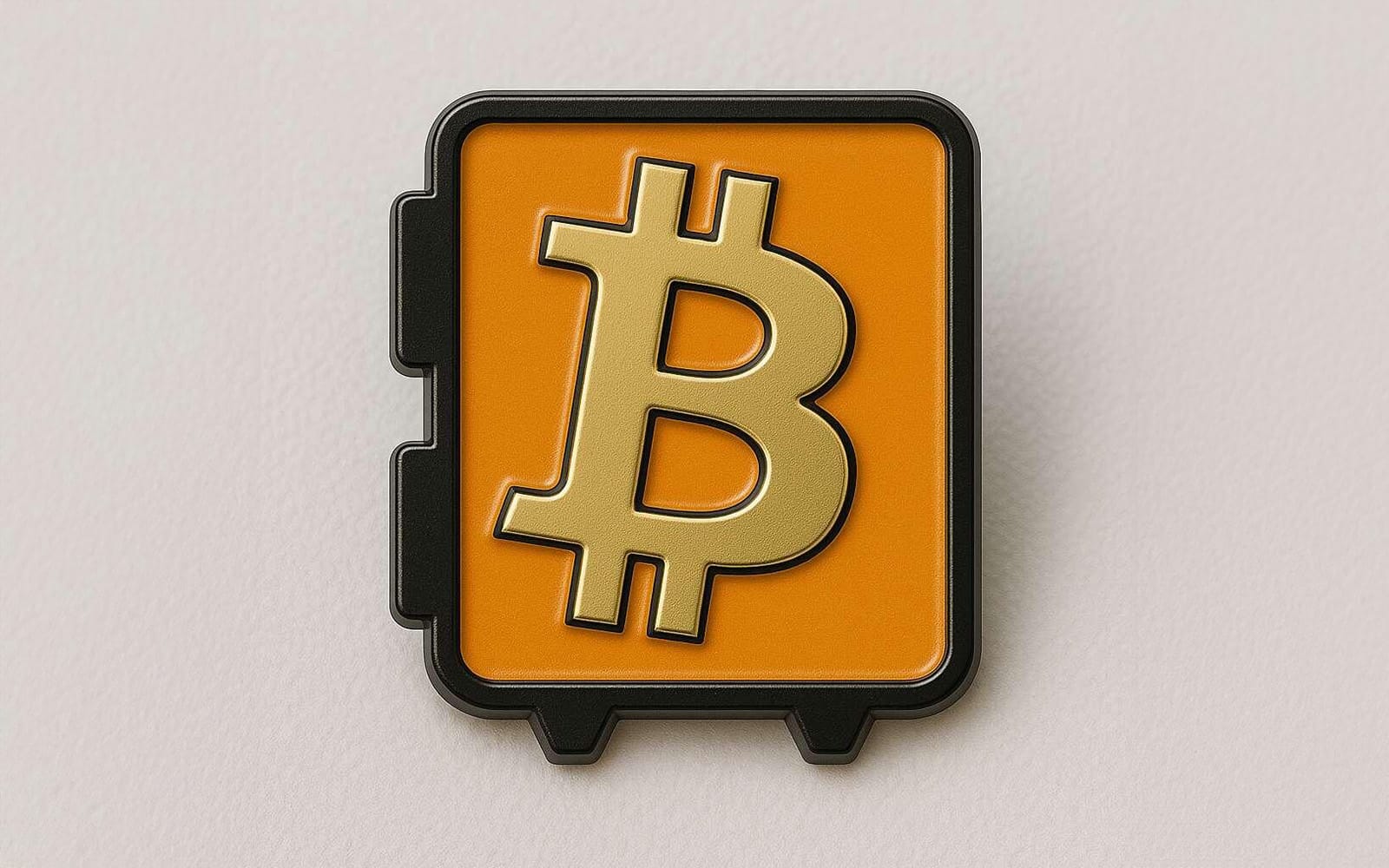
Announcement / Archive
Blog Post / Archive
GitHub Repo
Website -
-
 @ 0b118e40:4edc09cb
2025-05-15 15:40:21
@ 0b118e40:4edc09cb
2025-05-15 15:40:21My week started off with a lovely message from a friend : “I often think about you. Especially during times when it requires me to be more resilient and have faith in myself. I always carry your note in the book you gave me, “what the dog saw” And it always gives me courage and I send a little prayer your way”.
This friend of mine was dealing with the undercurrent of discrimination in my alma mater when we first met, and I helped out. It's something anybody would have done, but surprisingly, nobody else showed up. We’ve stayed in touch over the years, and my friend went on to help a lot of other people along the way.
I don’t remember what I wrote in that note. It’s something I tend to do (write notes, give books, write notes in books). But the message boomeranged back to me at a time when I needed to hold the line. To keep the faith.
Most of us don’t talk about our struggles. And sometimes the smallest act, which could just be a kind word or a reminder of the person you are, can carry farther than we imagine.
On the act of giving
There’s a book called Give and Take by Adam Grant. I picked it up hoping to learn how to take, because it’s always been easier to give and harder to accept help. But what I learned was something else entirely.
Grant studied over 30,000 people across different companies and grouped them into three types: * Givers * Matchers * Takers
Based on his studies, givers often finish last... They struggle the most. They burn out. They get overlooked. They’re too trusting.
But oddly, they also rise to the very top.
Matchers are the scorekeepers, the “I’ll help you if you help me” kind. They make up most of the population. The fascinating thing about tit-for-tat is that if someone’s kind, they reciprocate. But if someone acts like a jerk, they return the energy, and over time, it becomes a pool of spoiled milk. Matchers are a lukewarm, forgettable kind of network.
Takers are the ones chasing attention, always aligning themselves with whoever looks powerful. They tend to float toward status and soak up what they can. But they often portray themselves as kind and giving.
One example Grant shared was Enron's Kenneth Lay, who was at the center of one of the biggest corporate scandals in U.S. history. He hung around wherever he’d get seen or validated. He funded both Bush and Clinton, hedging his bets on who might win by securing proximity. Sadly, when Enron crumbled, he died of a heart attack before his prison sentencing.
Most people steer clear from takers because they are just exhausting. And takers often collapse under the weight of their own games.
But takers aren’t the lowest performers. That spot belongs to a certain kind of giver—the self-neglecting kind. The ones with no boundaries, no clarity, and no self-awareness. They give in to avoid conflict, to feel worthy, or because they don’t know how to say no. And when life breaks them, they point fingers.
Then there’s the other kind of giver. The ones who build trust and build people up without asking for a receipt.
These givers: 1. Give without expectation, from a place of purpose 2. Build and uplift others without seeking credit 3. Set boundaries and walk away when giving turns into draining
This group of givers rarely talk much about what they do for others. But when you hear about it or see it, it stays with you. It makes you want to show up a little better.
Why open source environments feels like home
The more I thought about it, the more I saw how deeply open source reflects that kind of giving that ends up right at the top.
In open source, you don’t last if it’s just about ego. You can’t fake it. There are no titles, no awards. You either show up to build and help, or you don’t.
People who give without needing to be seen are the ones the community leans on. You can tell when someone’s pretending to care. It’s in their tone, their urgency and their sense of transaction. The genuine ones don’t need to brand themselves as generous. They just are.
Open source works because giving is the default setting. The work speaks volumes and generosity compounds. The system filters for people who show up with purpose and stay consistent.
It’s also why the ones who whine, posture, or manipulate rarely last. They might call themselves givers, but they’re not fooling anyone who’s actually doing the work.
Adam Grant found that for giver cultures to thrive, takers have to be removed. They need to be pruned. Because takers poison the well. They drain givers, shift the culture from contribution to calculation, and unravel the trust that holds open systems together.
When hope boomerangs
That note is something I don’t remember writing. But it found its way back to me, and it was a good reminder to take my own advice and keep the faith.
And maybe that’s the point.
You do a small thing. And years later, it circles back when it matters most. Not because you expected it. But because you mattered.
According to Grant, givers do best when they combine generosity with grit and strategy. They create networks built on goodwill, which eventually open doors others don’t even know exist.
So if you’re wondering where I’m going with this, do something genuinely kind for someone today. Even if it’s as simple as sending a kind note. Not for you to be seen or heard. And not for you to keep scores.
But, just because.
-
 @ a95c6243:d345522c
2025-01-01 17:39:51
@ a95c6243:d345522c
2025-01-01 17:39:51Heute möchte ich ein Gedicht mit euch teilen. Es handelt sich um eine Ballade des österreichischen Lyrikers Johann Gabriel Seidl aus dem 19. Jahrhundert. Mir sind diese Worte fest in Erinnerung, da meine Mutter sie perfekt rezitieren konnte, auch als die Kräfte schon langsam schwanden.
Dem originalen Titel «Die Uhr» habe ich für mich immer das Wort «innere» hinzugefügt. Denn der Zeitmesser – hier vermutliche eine Taschenuhr – symbolisiert zwar in dem Kontext das damalige Zeitempfinden und die Umbrüche durch die industrielle Revolution, sozusagen den Zeitgeist und das moderne Leben. Aber der Autor setzt sich philosophisch mit der Zeit auseinander und gibt seinem Werk auch eine klar spirituelle Dimension.
Das Ticken der Uhr und die Momente des Glücks und der Trauer stehen sinnbildlich für das unaufhaltsame Fortschreiten und die Vergänglichkeit des Lebens. Insofern könnte man bei der Uhr auch an eine Sonnenuhr denken. Der Rhythmus der Ereignisse passt uns vielleicht nicht immer in den Kram.
Was den Takt pocht, ist durchaus auch das Herz, unser «inneres Uhrwerk». Wenn dieses Meisterwerk einmal stillsteht, ist es unweigerlich um uns geschehen. Hoffentlich können wir dann dankbar sagen: «Ich habe mein Bestes gegeben.»
Ich trage, wo ich gehe, stets eine Uhr bei mir; \ Wieviel es geschlagen habe, genau seh ich an ihr. \ Es ist ein großer Meister, der künstlich ihr Werk gefügt, \ Wenngleich ihr Gang nicht immer dem törichten Wunsche genügt.
Ich wollte, sie wäre rascher gegangen an manchem Tag; \ Ich wollte, sie hätte manchmal verzögert den raschen Schlag. \ In meinen Leiden und Freuden, in Sturm und in der Ruh, \ Was immer geschah im Leben, sie pochte den Takt dazu.
Sie schlug am Sarge des Vaters, sie schlug an des Freundes Bahr, \ Sie schlug am Morgen der Liebe, sie schlug am Traualtar. \ Sie schlug an der Wiege des Kindes, sie schlägt, will's Gott, noch oft, \ Wenn bessere Tage kommen, wie meine Seele es hofft.
Und ward sie auch einmal träger, und drohte zu stocken ihr Lauf, \ So zog der Meister immer großmütig sie wieder auf. \ Doch stände sie einmal stille, dann wär's um sie geschehn, \ Kein andrer, als der sie fügte, bringt die Zerstörte zum Gehn.
Dann müßt ich zum Meister wandern, der wohnt am Ende wohl weit, \ Wohl draußen, jenseits der Erde, wohl dort in der Ewigkeit! \ Dann gäb ich sie ihm zurücke mit dankbar kindlichem Flehn: \ Sieh, Herr, ich hab nichts verdorben, sie blieb von selber stehn.
Johann Gabriel Seidl (1804-1875)
-
 @ 04c915da:3dfbecc9
2025-05-15 15:31:45
@ 04c915da:3dfbecc9
2025-05-15 15:31:45Capitalism is the most effective system for scaling innovation. The pursuit of profit is an incredibly powerful human incentive. Most major improvements to human society and quality of life have resulted from this base incentive. Market competition often results in the best outcomes for all.
That said, some projects can never be monetized. They are open in nature and a business model would centralize control. Open protocols like bitcoin and nostr are not owned by anyone and if they were it would destroy the key value propositions they provide. No single entity can or should control their use. Anyone can build on them without permission.
As a result, open protocols must depend on donation based grant funding from the people and organizations that rely on them. This model works but it is slow and uncertain, a grind where sustainability is never fully reached but rather constantly sought. As someone who has been incredibly active in the open source grant funding space, I do not think people truly appreciate how difficult it is to raise charitable money and deploy it efficiently.
Projects that can be monetized should be. Profitability is a super power. When a business can generate revenue, it taps into a self sustaining cycle. Profit fuels growth and development while providing projects independence and agency. This flywheel effect is why companies like Google, Amazon, and Apple have scaled to global dominance. The profit incentive aligns human effort with efficiency. Businesses must innovate, cut waste, and deliver value to survive.
Contrast this with non monetized projects. Without profit, they lean on external support, which can dry up or shift with donor priorities. A profit driven model, on the other hand, is inherently leaner and more adaptable. It is not charity but survival. When survival is tied to delivering what people want, scale follows naturally.
The real magic happens when profitable, sustainable businesses are built on top of open protocols and software. Consider the many startups building on open source software stacks, such as Start9, Mempool, and Primal, offering premium services on top of the open source software they build out and maintain. Think of companies like Block or Strike, which leverage bitcoin’s open protocol to offer their services on top. These businesses amplify the open software and protocols they build on, driving adoption and improvement at a pace donations alone could never match.
When you combine open software and protocols with profit driven business the result are lean, sustainable companies that grow faster and serve more people than either could alone. Bitcoin’s network, for instance, benefits from businesses that profit off its existence, while nostr will expand as developers monetize apps built on the protocol.
Capitalism scales best because competition results in efficiency. Donation funded protocols and software lay the groundwork, while market driven businesses build on top. The profit incentive acts as a filter, ensuring resources flow to what works, while open systems keep the playing field accessible, empowering users and builders. Together, they create a flywheel of innovation, growth, and global benefit.
-
 @ dfa02707:41ca50e3
2025-05-22 17:02:02
@ dfa02707:41ca50e3
2025-05-22 17:02:02News
- Wallet of Satoshi teases a comeback in the US market with a non-custodial product. According to an announcement on X, the widely popular custodial Lightning wallet is preparing to re-enter the United States market with a non-custodial wallet. It is unclear whether the product will be open-source, but the project has clarified that "there will be no KYC on any Wallet of Satoshi, ever!" Wallet of Satoshi ceased serving customers in the United States in November 2023.
- Vulnerability disclosure: Remote crash due to addr message spam in Bitcoin Core versions before v29. Bitcoin Core developer Antoine Poinsot disclosed an integer overflow bug that crashes a node if spammed with addr messages over an extended period. A fix was released on April 14, 2025, in Bitcoin Core v29.0. The issue is rated Low severity.
- Coinbase Know Your Customer (KYC) data leak. The U.S. Department of Justice, including its Criminal Division in Washington, is investigating a cyberattack on Coinbase. The incident involved cybercriminals attempting to extort $20 million from Coinbase to prevent stolen customer data from being leaked online. Although the data breach affected less than 1% of the exchange's users, Coinbase now faces at least six lawsuits following the revelation that some customer support agents were bribed as part of the extortion scheme.
- Fold has launched Bitcoin Gift Cards, enabling users to purchase bitcoin for personal use or as gifts, redeemable via the Fold app. These cards are currently available on Fold’s website and are planned to expand to major retailers nationwide later this year.
"Our mission is to make bitcoin simple and approachable for everyone. The Bitcoin Gift Card brings bitcoin to millions of Americans in a familiar way. Available at the places people already shop, the Bitcoin Gift Card is the best way to gift bitcoin to others," said Will Reeves, Chairman and CEO of Fold.
- Corporate treasuries hold nearly 1.1 million BTC, representing about 5.5% of the total circulating supply (1,082,164 BTC), per BitcoinTreasuries.net data. Recent purchases include Strategy adding 7,390 BTC (total: 576,230 BTC), Metplanet acquiring 1,004 BTC (total: 7,800 BTC), Tether holding over 100,521 BTC, and XXI Capital, led by Jack Mallers, starting with 31,500 BTC.
- Meanwhile, a group of investors has filed a class action lawsuit against Strategy and its executive Michael Saylor. The lawsuit alleges that Strategy made overly optimistic projections using fair value accounting under new FASB rules while downplaying potential losses.
- The U.S. Senate voted to advance the GENIUS stablecoin bill for further debate before a final vote to pass it. Meanwhile, the House is crafting its own stablecoin legislation to establish a regulatory framework for stablecoins and their issuers in the U.S, reports CoinDesk.
- French 'crypto' entrepreneurs get priority access to emergency police services. French Minister of the Interior, Bruno Retailleau, agreed on measures to enhance security for 'crypto' professionals during a meeting on Friday. This follows a failed kidnapping attempt on Tuesday targeting the family of a cryptocurrency exchange CEO, and two other kidnappings earlier this year.
- Brussels Court declares tracking-based ads illegal in EU. The Brussels Court of Appeal ruled tracking-based online ads illegal in the EU due to an inadequate consent model. Major tech firms like Microsoft, Amazon, Google, and X are affected by the decision, as their consent pop-ups fail to protect privacy in real-time bidding, writes The Record.
- Telegram shares data on 22,777 users in Q1 2025, a significant increase from the 5,826 users' data shared during the same period in 2024. This significant increase follows the arrest of CEO and founder Pavel Durov last year.
- An Australian judge has ruled that Bitcoin is money, potentially exempting it from capital gains tax in the country. If upheld on appeal, this interim decision could lead to taxpayer refunds worth up to $1 billion, per tax lawyer Adrian Cartland.
Use the tools
- Bitcoin Safe v1.3.0 a secure and user-friendly Bitcoin savings wallet for beginners and advanced users, introduces an interactive chart, Child Pays For Parent (CPFP) support, testnet4 compatibility, preconfigured testnet demo wallets, various bug fixes, and other improvements.
- BlueWallet v7.1.8 brings numerous bug fixes, dependency updates, and a new search feature for addresses and transactions.
- Aqua Wallet v0.3.0 is out, offering beta testing for the reloadable Dolphin card (in partnership with Visa) for spending bitcoin and Liquid BTC. It also includes a new Optical Character Recognition (OCR) text scanner to read text addresses like QR codes, colored numbers on addresses for better readability, a reduced minimum for spending and swapping Liquid Bitcoin to 100 sats, plus other fixes and enhancements.

Source: Aqua wallet.
- The latest firmware updates for COLDCARD Mk4 v5.4.3 and Q v1.3.3 are now available, featuring the latest enhancements and bug fixes.
- Nunchuk Android v1.9.68.1 and iOS v1.9.79 introduce support for custom blockchain explorers, wallet archiving, re-ordering wallets on the home screen via long-press, and an anti-fee sniping setting.
- BDK-cli v1.0.0, a CLI wallet library and REPL tool to demo and test the BDK library, now uses bdk_wallet 1.0.0 and integrates Kyoto, utilizing the Kyoto protocol for compact block filters. It sets SQLite as the default database and discontinues support for sled.
- publsp is a new command-line tool designed for Lightning node runners or Lightning Service Providers (LSPs) to advertise liquidity offers over Nostr.
"LSPs advertise liquidity as addressable Kind 39735 events. Clients just pull and evaluate all those structured events, then NIP-17 DM an LSP of their choice to coordinate a liquidity purchase," writes developer smallworlnd.
-
Lightning Blinder by Super Testnet is a proof-of-concept privacy tool for the Lightning Network. It enables users to mislead Lightning Service Providers (LSPs) by making it appear as though one wallet is the sender or recipient, masking the original wallet. Explore and try it out here.
-
Mempal v1.5.3, a Bitcoin mempool monitoring and notification app for Android, now includes a swipe-down feature to refresh the dashboard, a custom time option for widget auto-update frequency, and a
-
 @ 000002de:c05780a7
2025-05-22 20:50:21
@ 000002de:c05780a7
2025-05-22 20:50:21I'm mostly curious about how Tapper can do this with a straight face.
https://stacker.news/items/986926
-
 @ a95c6243:d345522c
2024-12-21 09:54:49
@ a95c6243:d345522c
2024-12-21 09:54:49Falls du beim Lesen des Titels dieses Newsletters unwillkürlich an positive Neuigkeiten aus dem globalen polit-medialen Irrenhaus oder gar aus dem wirtschaftlichen Umfeld gedacht hast, darf ich dich beglückwünschen. Diese Assoziation ist sehr löblich, denn sie weist dich als unverbesserlichen Optimisten aus. Leider muss ich dich diesbezüglich aber enttäuschen. Es geht hier um ein anderes Thema, allerdings sehr wohl ein positives, wie ich finde.
Heute ist ein ganz besonderer Tag: die Wintersonnenwende. Genau gesagt hat heute morgen um 10:20 Uhr Mitteleuropäischer Zeit (MEZ) auf der Nordhalbkugel unseres Planeten der astronomische Winter begonnen. Was daran so außergewöhnlich ist? Der kürzeste Tag des Jahres war gestern, seit heute werden die Tage bereits wieder länger! Wir werden also jetzt jeden Tag ein wenig mehr Licht haben.
Für mich ist dieses Ereignis immer wieder etwas kurios: Es beginnt der Winter, aber die Tage werden länger. Das erscheint mir zunächst wie ein Widerspruch, denn meine spontanen Assoziationen zum Winter sind doch eher Kälte und Dunkelheit, relativ zumindest. Umso erfreulicher ist der emotionale Effekt, wenn dann langsam die Erkenntnis durchsickert: Ab jetzt wird es schon wieder heller!
Natürlich ist es kalt im Winter, mancherorts mehr als anderswo. Vielleicht jedoch nicht mehr lange, wenn man den Klimahysterikern glauben wollte. Mindestens letztes Jahr hat Väterchen Frost allerdings gleich zu Beginn seiner Saison – und passenderweise während des globalen Überhitzungsgipfels in Dubai – nochmal richtig mit der Faust auf den Tisch gehauen. Schnee- und Eischaos sind ja eigentlich in der Agenda bereits nicht mehr vorgesehen. Deswegen war man in Deutschland vermutlich in vorauseilendem Gehorsam schon nicht mehr darauf vorbereitet und wurde glatt lahmgelegt.
Aber ich schweife ab. Die Aussicht auf nach und nach mehr Licht und damit auch Wärme stimmt mich froh. Den Zusammenhang zwischen beidem merkt man in Andalusien sehr deutlich. Hier, wo die Häuser im Winter arg auskühlen, geht man zum Aufwärmen raus auf die Straße oder auf den Balkon. Die Sonne hat auch im Winter eine erfreuliche Kraft. Und da ist jede Minute Gold wert.
Außerdem ist mir vor Jahren so richtig klar geworden, warum mir das südliche Klima so sehr gefällt. Das liegt nämlich nicht nur an der Sonne als solcher, oder der Wärme – das liegt vor allem am Licht. Ohne Licht keine Farben, das ist der ebenso simple wie gewaltige Unterschied zwischen einem deprimierenden matschgraubraunen Winter und einem fröhlichen bunten. Ein großes Stück Lebensqualität.
Mir gefällt aber auch die Symbolik dieses Tages: Licht aus der Dunkelheit, ein Wendepunkt, ein Neuanfang, neue Möglichkeiten, Übergang zu neuer Aktivität. In der winterlichen Stille keimt bereits neue Lebendigkeit. Und zwar in einem Zyklus, das wird immer wieder so geschehen. Ich nehme das gern als ein Stück Motivation, es macht mir Hoffnung und gibt mir Energie.

Übrigens ist parallel am heutigen Tag auf der südlichen Halbkugel Sommeranfang. Genau im entgegengesetzten Rhythmus, sich ergänzend, wie Yin und Yang. Das alles liegt an der Schrägstellung der Erdachse, die ist nämlich um 23,4º zur Umlaufbahn um die Sonne geneigt. Wir erinnern uns, gell?
Insofern bleibt eindeutig festzuhalten, dass “schräg sein” ein willkommener, wichtiger und positiver Wert ist. Mit anderen Worten: auch ungewöhnlich, eigenartig, untypisch, wunderlich, kauzig, … ja sogar irre, spinnert oder gar “quer” ist in Ordnung. Das schließt das Denken mit ein.
In diesem Sinne wünsche ich euch allen urige Weihnachtstage!
Dieser Beitrag ist letztes Jahr in meiner Denkbar erschienen.
-
 @ dfa02707:41ca50e3
2025-05-22 17:02:02
@ dfa02707:41ca50e3
2025-05-22 17:02:02Contribute to keep No Bullshit Bitcoin news going.
- This release introduces Payjoin v2 functionality to Bitcoin wallets on Cake, along with several UI/UX improvements and bug fixes.
- The Payjoin v2 protocol enables asynchronous, serverless coordination between sender and receiver, removing the need to be online simultaneously or maintain a server. This simplifies privacy-focused transactions for regular users.
"I cannot speak highly enough of how amazing it has been to work with @bitgould and Jaad from the@payjoindevkit team, they're doing incredible work. None of this would be possible without them and their tireless efforts. PDK made it so much easier to ship Payjoin v2 than it would have been otherwise, and I can't wait to see other wallets jump in and give back to PDK as they implement it like we did," said Seth For Privacy, VP at Cake Wallet.

How to started with Payjoin in Cake Wallet:
- Open the app menu sidebar and click
Privacy. - Toggle the
Use Payjoinoption. - Now on your receive screen you'll see an option to copy a Payjoin URL

- Bull Bitcoin Wallet v0.4.0 introduced Payjoin v2 support in late December 2024. However, the current implementations are not interoperable at the moment, an issue that should be addressed in the next release of the Bull Bitcoin Wallet.
- Cake Wallet was one of the first wallets to introduce Silent Payments back in May 2024. However, users may encounter sync issues while using this feature at present, which will be resolved in the next release of Cake Wallet.
What's new
- Payjoin v2 implementation.
- Wallet group improvements: Enhanced management of multiple wallets.
- Various bug fixes: improving overall stability and user experience.
- Monero (XMR) enhancements.
Learn more about using, implementing, and understanding BIP 77: Payjoin Version 2 using the
payjoincrate in Payjoin Dev Kit here. -
 @ 08f96856:ffe59a09
2025-05-15 01:22:34
@ 08f96856:ffe59a09
2025-05-15 01:22:34เมื่อพูดถึง Bitcoin Standard หลายคนมักนึกถึงภาพโลกอนาคตที่ทุกคนใช้บิตคอยน์ซื้อกาแฟหรือของใช้ในชีวิตประจำวัน ภาพแบบนั้นดูเหมือนไกลตัวและเป็นไปไม่ได้ในความเป็นจริง หลายคนถึงกับพูดว่า “คงไม่ทันเห็นในช่วงชีวิตนี้หรอก” แต่ในมุมมองของผม Bitcoin Standard อาจไม่ได้เริ่มต้นจากการที่เราจ่ายบิตคอยน์โดยตรงในร้านค้า แต่อาจเริ่มจากบางสิ่งที่เงียบกว่า ลึกกว่า และเกิดขึ้นแล้วในขณะนี้ นั่นคือ การล่มสลายทีละน้อยของระบบเฟียตที่เราใช้กันอยู่
ระบบเงินที่อิงกับอำนาจรัฐกำลังเข้าสู่ช่วงขาลง รัฐบาลทั่วโลกกำลังจมอยู่ในภาระหนี้ระดับประวัติการณ์ แม้แต่ประเทศมหาอำนาจก็เริ่มแสดงสัญญาณของภาวะเสี่ยงผิดนัดชำระหนี้ อัตราเงินเฟ้อกลายเป็นปัญหาเรื้อรังที่ไม่มีท่าทีจะหายไป ธนาคารที่เคยโอนฟรีเริ่มกลับมาคิดค่าธรรมเนียม และประชาชนก็เริ่มรู้สึกถึงการเสื่อมศรัทธาในระบบการเงินดั้งเดิม แม้จะยังพูดกันไม่เต็มเสียงก็ตาม
ในขณะเดียวกัน บิตคอยน์เองก็กำลังพัฒนาแบบเงียบ ๆ เงียบ... แต่ไม่เคยหยุด โดยเฉพาะในระดับ Layer 2 ที่เริ่มแสดงศักยภาพอย่างจริงจัง Lightning Network เป็น Layer 2 ที่เปิดใช้งานมาได้ระยะเวลสหนึ่ง และยังคงมีบทบาทสำคัญที่สุดในระบบนิเวศของบิตคอยน์ มันทำให้การชำระเงินเร็วขึ้น มีต้นทุนต่ำ และไม่ต้องบันทึกทุกธุรกรรมลงบล็อกเชน เครือข่ายนี้กำลังขยายตัวทั้งในแง่ของโหนดและการใช้งานจริงทั่วโลก
ขณะเดียวกัน Layer 2 ทางเลือกอื่นอย่าง Ark Protocol ก็กำลังพัฒนาเพื่อตอบโจทย์ด้านความเป็นส่วนตัวและประสบการณ์ใช้งานที่ง่าย BitVM เปิดแนวทางใหม่ให้บิตคอยน์รองรับ smart contract ได้ในระดับ Turing-complete ซึ่งทำให้เกิดความเป็นไปได้ในกรณีใช้งานอีกมากมาย และเทคโนโลยีที่น่าสนใจอย่าง Taproot Assets, Cashu และ Fedimint ก็ทำให้การออกโทเคนหรือสกุลเงินที่อิงกับบิตคอยน์เป็นจริงได้บนโครงสร้างของบิตคอยน์เอง
เทคโนโลยีเหล่านี้ไม่ใช่การเติบโตแบบปาฏิหาริย์ แต่มันคืบหน้าอย่างต่อเนื่องและมั่นคง และนั่นคือเหตุผลที่มันจะ “อยู่รอด” ได้ในระยะยาว เมื่อฐานของความน่าเชื่อถือไม่ใช่บริษัท รัฐบาล หรือทุน แต่คือสิ่งที่ตรวจสอบได้และเปลี่ยนกฎไม่ได้
แน่นอนว่าบิตคอยน์ต้องแข่งขันกับ stable coin, เงินดิจิทัลของรัฐ และ cryptocurrency อื่น ๆ แต่สิ่งที่ทำให้มันเหนือกว่านั้นไม่ใช่ฟีเจอร์ หากแต่เป็นความทนทาน และความมั่นคงของกฎที่ไม่มีใครเปลี่ยนได้ ไม่มีทีมพัฒนา ไม่มีบริษัท ไม่มีประตูปิด หรือการยึดบัญชี มันยืนอยู่บนคณิตศาสตร์ พลังงาน และเวลา
หลายกรณีใช้งานที่เคยถูกทดลองในโลกคริปโตจะค่อย ๆ เคลื่อนเข้ามาสู่บิตคอยน์ เพราะโครงสร้างของมันแข็งแกร่งกว่า ไม่ต้องการทีมพัฒนาแกนกลาง ไม่ต้องพึ่งกลไกเสี่ยงต่อการผูกขาด และไม่ต้องการ “ความเชื่อใจ” จากใครเลย
Bitcoin Standard ที่ผมพูดถึงจึงไม่ใช่การเปลี่ยนแปลงแบบพลิกหน้ามือเป็นหลังมือ แต่คือการ “เปลี่ยนฐานของระบบ” ทีละชั้น ระบบการเงินใหม่ที่อิงอยู่กับบิตคอยน์กำลังเกิดขึ้นแล้ว มันไม่ใช่โลกที่ทุกคนถือเหรียญบิตคอยน์ แต่มันคือโลกที่คนใช้อาจไม่รู้ตัวด้วยซ้ำว่า “สิ่งที่เขาใช้นั้นอิงอยู่กับบิตคอยน์”
ผู้คนอาจใช้เงินดิจิทัลที่สร้างบน Layer 3 หรือ Layer 4 ผ่านแอป ผ่านแพลตฟอร์ม หรือผ่านสกุลเงินใหม่ที่ดูไม่ต่างจากเดิม แต่เบื้องหลังของระบบจะผูกไว้กับบิตคอยน์
และถ้ามองในเชิงพัฒนาการ บิตคอยน์ก็เหมือนกับอินเทอร์เน็ต ครั้งหนึ่งอินเทอร์เน็ตก็ถูกมองว่าเข้าใจยาก ต้องพิมพ์ http ต้องรู้จัก TCP/IP ต้องตั้ง proxy เอง แต่ปัจจุบันผู้คนใช้งานอินเทอร์เน็ตโดยไม่รู้ว่าเบื้องหลังมีอะไรเลย บิตคอยน์กำลังเดินตามเส้นทางเดียวกัน โปรโตคอลกำลังถอยออกจากสายตา และวันหนึ่งเราจะ “ใช้มัน” โดยไม่ต้องรู้ว่ามันคืออะไร
หากนับจากช่วงเริ่มต้นของอินเทอร์เน็ตในยุค 1990 จนกลายเป็นโครงสร้างหลักของโลกในสองทศวรรษ เส้นเวลาของบิตคอยน์ก็กำลังเดินตามรอยเท้าของอินเทอร์เน็ต และถ้าเราเชื่อว่าวัฏจักรของเทคโนโลยีมีจังหวะของมันเอง เราก็จะรู้ว่า Bitcoin Standard นั้นไม่ใช่เรื่องของอนาคตไกลโพ้น แต่มันเกิดขึ้นแล้ว
siamstr
-
 @ a95c6243:d345522c
2024-12-13 19:30:32
@ a95c6243:d345522c
2024-12-13 19:30:32Das Betriebsklima ist das einzige Klima, \ das du selbst bestimmen kannst. \ Anonym
Eine Strategie zur Anpassung an den Klimawandel hat das deutsche Bundeskabinett diese Woche beschlossen. Da «Wetterextreme wie die immer häufiger auftretenden Hitzewellen und Starkregenereignisse» oft desaströse Auswirkungen auf Mensch und Umwelt hätten, werde eine Anpassung an die Folgen des Klimawandels immer wichtiger. «Klimaanpassungsstrategie» nennt die Regierung das.
Für die «Vorsorge vor Klimafolgen» habe man nun erstmals klare Ziele und messbare Kennzahlen festgelegt. So sei der Erfolg überprüfbar, und das solle zu einer schnelleren Bewältigung der Folgen führen. Dass sich hinter dem Begriff Klimafolgen nicht Folgen des Klimas, sondern wohl «Folgen der globalen Erwärmung» verbergen, erklärt den Interessierten die Wikipedia. Dabei ist das mit der Erwärmung ja bekanntermaßen so eine Sache.
Die Zunahme schwerer Unwetterereignisse habe gezeigt, so das Ministerium, wie wichtig eine frühzeitige und effektive Warnung der Bevölkerung sei. Daher solle es eine deutliche Anhebung der Nutzerzahlen der sogenannten Nina-Warn-App geben.
Die ARD spurt wie gewohnt und setzt die Botschaft zielsicher um. Der Artikel beginnt folgendermaßen:
«Die Flut im Ahrtal war ein Schock für das ganze Land. Um künftig besser gegen Extremwetter gewappnet zu sein, hat die Bundesregierung eine neue Strategie zur Klimaanpassung beschlossen. Die Warn-App Nina spielt eine zentrale Rolle. Der Bund will die Menschen in Deutschland besser vor Extremwetter-Ereignissen warnen und dafür die Reichweite der Warn-App Nina deutlich erhöhen.»
Die Kommunen würden bei ihren «Klimaanpassungsmaßnahmen» vom Zentrum KlimaAnpassung unterstützt, schreibt das Umweltministerium. Mit dessen Aufbau wurden das Deutsche Institut für Urbanistik gGmbH, welches sich stark für Smart City-Projekte engagiert, und die Adelphi Consult GmbH beauftragt.
Adelphi beschreibt sich selbst als «Europas führender Think-and-Do-Tank und eine unabhängige Beratung für Klima, Umwelt und Entwicklung». Sie seien «global vernetzte Strateg*innen und weltverbessernde Berater*innen» und als «Vorreiter der sozial-ökologischen Transformation» sei man mit dem Deutschen Nachhaltigkeitspreis ausgezeichnet worden, welcher sich an den Zielen der Agenda 2030 orientiere.
Über die Warn-App mit dem niedlichen Namen Nina, die möglichst jeder auf seinem Smartphone installieren soll, informiert das Bundesamt für Bevölkerungsschutz und Katastrophenhilfe (BBK). Gewarnt wird nicht nur vor Extrem-Wetterereignissen, sondern zum Beispiel auch vor Waffengewalt und Angriffen, Strom- und anderen Versorgungsausfällen oder Krankheitserregern. Wenn man die Kategorie Gefahreninformation wählt, erhält man eine Dosis von ungefähr zwei Benachrichtigungen pro Woche.
Beim BBK erfahren wir auch einiges über die empfohlenen Systemeinstellungen für Nina. Der Benutzer möge zum Beispiel den Zugriff auf die Standortdaten «immer zulassen», und zwar mit aktivierter Funktion «genauen Standort verwenden». Die Datennutzung solle unbeschränkt sein, auch im Hintergrund. Außerdem sei die uneingeschränkte Akkunutzung zu aktivieren, der Energiesparmodus auszuschalten und das Stoppen der App-Aktivität bei Nichtnutzung zu unterbinden.
Dass man so dramatische Ereignisse wie damals im Ahrtal auch anders bewerten kann als Regierungen und Systemmedien, hat meine Kollegin Wiltrud Schwetje anhand der Tragödie im spanischen Valencia gezeigt. Das Stichwort «Agenda 2030» taucht dabei in einem Kontext auf, der wenig mit Nachhaltigkeitspreisen zu tun hat.
Dieser Beitrag ist zuerst auf Transition News erschienen.
-
 @ dfa02707:41ca50e3
2025-05-22 17:02:02
@ dfa02707:41ca50e3
2025-05-22 17:02:02Contribute to keep No Bullshit Bitcoin news going.
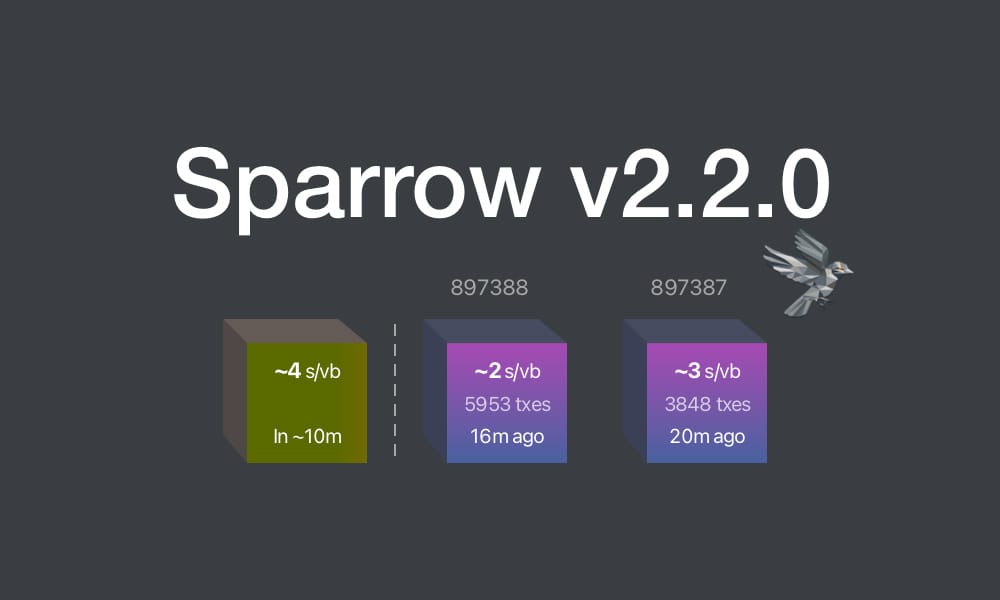
This update brings key enhancements for clarity and usability:
- Recent Blocks View: Added to the Send tab and inspired by Mempool's visualization, it displays the last 2 blocks and the estimated next block to help choose fee rates.
- Camera System Overhaul: Features a new library for higher resolution detection and mouse-scroll zoom support when available.
- Vector-Based Images: All app images are now vectorized and theme-aware, enhancing contrast, especially in dark mode.
- Tor & P2A Updates: Upgraded internal Tor and improved support for pay-to-anchor (P2A) outputs.
- Linux Package Rename: For Linux users, Sparrow has been renamed to sparrowwallet (or sparrowserver); in some cases, the original sparrow package may need manual removal.
- Additional updates include showing total payments in multi-payment transaction diagrams, better handling of long labels, and other UI enhancements.
- Sparrow v2.2.1 is a bug fix release that addresses missing UUID issue when starting Tor on recent macOS versions, icons for external sources in Settings and Recent Blocks view, repackaged
.debinstalls to use older gzip instead of zstd compression, and removed display of median fee rate where fee rates source is set to Server.
Learn how to get started with Sparrow wallet:
Release notes (v2.2.0)
- Added Recent Blocks view to Send tab.
- Converted all bitmapped images to theme aware SVG format for all wallet models and dialogs.
- Support send and display of pay to anchor (P2A) outputs.
- Renamed
sparrowpackage tosparrowwalletandsparrowserveron Linux. - Switched camera library to openpnp-capture.
- Support FHD (1920 x 1080) and UHD4k (3840 x 2160) capture resolutions.
- Support camera zoom with mouse scroll where possible.
- In the Download Verifier, prefer verifying the dropped file over the default file where the file is not in the manifest.
- Show a warning (with an option to disable the check) when importing a wallet with a derivation path matching another script type.
- In Cormorant, avoid calling the
listwalletdirRPC on initialization due to a potentially slow response on Windows. - Avoid server address resolution for public servers.
- Assume server address is non local for resolution failures where a proxy is configured.
- Added a tooltip to indicate truncated labels in table cells.
- Dynamically truncate input and output labels in the tree on a transaction tab, and add tooltips if necessary.
- Improved tooltips for wallet tabs and transaction diagrams with long labels.
- Show the address where available on input and output tooltips in transaction tab tree.
- Show the total amount sent in payments in the transaction diagram when constructing multiple payment transactions.
- Reset preferred table column widths on adjustment to improve handling after window resizing.
- Added accessible text to improve screen reader navigation on seed entry.
- Made Wallet Summary table grow horizontally with dialog sizing.
- Reduced tooltip show delay to 200ms.
- Show transaction diagram fee percentage as less than 0.01% rather than 0.00%.
- Optimized and reduced Electrum server RPC calls.
- Upgraded Bouncy Castle, PGPainless and Logback libraries.
- Upgraded internal Tor to v0.4.8.16.
- Bug fix: Fixed issue with random ordering of keystore origins on labels import.
- Bug fix: Fixed non-zero account script type detection when signing a message on Trezor devices.
- Bug fix: Fixed issue parsing remote Coldcard xpub encoded on a different network.
- Bug fix: Fixed inclusion of fees on wallet label exports.
- Bug fix: Increase Trezor device libusb timeout.
Linux users: Note that the
sparrowpackage has been renamed tosparrowwalletorsparrowserver, and in some cases you may need to manually uninstall the originalsparrowpackage. Look in the/optfolder to ensure you have the new name, and the original is removed.What's new in v2.2.1
- Updated Tor library to fix missing UUID issue when starting Tor on recent macOS versions.
- Repackaged
.debinstalls to use older gzip instead of zstd compression. - Removed display of median fee rate where fee rates source is set to Server.
- Added icons for external sources in Settings and Recent Blocks view
- Bug fix: Fixed issue in Recent Blocks view when switching fee rates source
- Bug fix: Fixed NPE on null fee returned from server
-
 @ c9badfea:610f861a
2025-05-14 18:38:04
@ c9badfea:610f861a
2025-05-14 18:38:04- Install KeePassDX (it's free and open source)
- Launch the app, tap Create New Vault, and choose a location to store the database file
- Activate the Password slider
- Type a Password and Confirm Password, then tap OK
- Tap + and Add Entry to add your first credentials
- Enter a Title, Username, and Password (you can also generate a password here)
- Tap ✓ at the bottom to create the entry
- Tap ⋮ and then Save Data to save the database
- Tap 🔒 to lock the database
⚠️ Make sure you use strong, high-entropy passphrases
⚠️ Back up the database file to a secure location (e.g. encrypted USB drive)
ℹ️ The database file (
.kdbx) can also be opened with various KeePass ports -
 @ a95c6243:d345522c
2024-12-06 18:21:15
@ a95c6243:d345522c
2024-12-06 18:21:15Die Ungerechtigkeit ist uns nur in dem Falle angenehm,\ dass wir Vorteile aus ihr ziehen;\ in jedem andern hegt man den Wunsch,\ dass der Unschuldige in Schutz genommen werde.\ Jean-Jacques Rousseau
Politiker beteuern jederzeit, nur das Beste für die Bevölkerung zu wollen – nicht von ihr. Auch die zahlreichen unsäglichen «Corona-Maßnahmen» waren angeblich zu unserem Schutz notwendig, vor allem wegen der «besonders vulnerablen Personen». Daher mussten alle möglichen Restriktionen zwangsweise und unter Umgehung der Parlamente verordnet werden.
Inzwischen hat sich immer deutlicher herausgestellt, dass viele jener «Schutzmaßnahmen» den gegenteiligen Effekt hatten, sie haben den Menschen und den Gesellschaften enorm geschadet. Nicht nur haben die experimentellen Geninjektionen – wie erwartet – massive Nebenwirkungen, sondern Maskentragen schadet der Psyche und der Entwicklung (nicht nur unserer Kinder) und «Lockdowns und Zensur haben Menschen getötet».
Eine der wichtigsten Waffen unserer «Beschützer» ist die Spaltung der Gesellschaft. Die tiefen Gräben, die Politiker, Lobbyisten und Leitmedien praktisch weltweit ausgehoben haben, funktionieren leider nahezu in Perfektion. Von ihren persönlichen Erfahrungen als Kritikerin der Maßnahmen berichtete kürzlich eine Schweizerin im Interview mit Transition News. Sie sei schwer enttäuscht und verspüre bis heute eine Hemmschwelle und ein seltsames Unwohlsein im Umgang mit «Geimpften».
Menschen, die aufrichtig andere schützen wollten, werden von einer eindeutig politischen Justiz verfolgt, verhaftet und angeklagt. Dazu zählen viele Ärzte, darunter Heinrich Habig, Bianca Witzschel und Walter Weber. Über den aktuell laufenden Prozess gegen Dr. Weber hat Transition News mehrfach berichtet (z.B. hier und hier). Auch der Selbstschutz durch Verweigerung der Zwangs-Covid-«Impfung» bewahrt nicht vor dem Knast, wie Bundeswehrsoldaten wie Alexander Bittner erfahren mussten.
Die eigentlich Kriminellen schützen sich derweil erfolgreich selber, nämlich vor der Verantwortung. Die «Impf»-Kampagne war «das größte Verbrechen gegen die Menschheit». Trotzdem stellt man sich in den USA gerade die Frage, ob der scheidende Präsident Joe Biden nach seinem Sohn Hunter möglicherweise auch Anthony Fauci begnadigen wird – in diesem Fall sogar präventiv. Gibt es überhaupt noch einen Rest Glaubwürdigkeit, den Biden verspielen könnte?
Der Gedanke, den ehemaligen wissenschaftlichen Chefberater des US-Präsidenten und Direktor des National Institute of Allergy and Infectious Diseases (NIAID) vorsorglich mit einem Schutzschild zu versehen, dürfte mit der vergangenen Präsidentschaftswahl zu tun haben. Gleich mehrere Personalentscheidungen des designierten Präsidenten Donald Trump lassen Leute wie Fauci erneut in den Fokus rücken.
Das Buch «The Real Anthony Fauci» des nominierten US-Gesundheitsministers Robert F. Kennedy Jr. erschien 2021 und dreht sich um die Machenschaften der Pharma-Lobby in der öffentlichen Gesundheit. Das Vorwort zur rumänischen Ausgabe des Buches schrieb übrigens Călin Georgescu, der Überraschungssieger der ersten Wahlrunde der aktuellen Präsidentschaftswahlen in Rumänien. Vielleicht erklärt diese Verbindung einen Teil der Panik im Wertewesten.
In Rumänien selber gab es gerade einen Paukenschlag: Das bisherige Ergebnis wurde heute durch das Verfassungsgericht annuliert und die für Sonntag angesetzte Stichwahl kurzfristig abgesagt – wegen angeblicher «aggressiver russischer Einmischung». Thomas Oysmüller merkt dazu an, damit sei jetzt in der EU das Tabu gebrochen, Wahlen zu verbieten, bevor sie etwas ändern können.
Unsere Empörung angesichts der Historie von Maßnahmen, die die Falschen beschützen und für die meisten von Nachteil sind, müsste enorm sein. Die Frage ist, was wir damit machen. Wir sollten nach vorne schauen und unsere Energie clever einsetzen. Abgesehen von der Umgehung von jeglichem «Schutz vor Desinformation und Hassrede» (sprich: Zensur) wird es unsere wichtigste Aufgabe sein, Gräben zu überwinden.
Dieser Beitrag ist zuerst auf Transition News erschienen.
-
 @ a95c6243:d345522c
2024-11-29 19:45:43
@ a95c6243:d345522c
2024-11-29 19:45:43Konsum ist Therapie.
Wolfgang JoopUmweltbewusstes Verhalten und verantwortungsvoller Konsum zeugen durchaus von einer wünschenswerten Einstellung. Ob man deswegen allerdings einen grünen statt eines schwarzen Freitags braucht, darf getrost bezweifelt werden – zumal es sich um manipulatorische Konzepte handelt. Wie in der politischen Landschaft sind auch hier die Etiketten irgendwas zwischen nichtssagend und trügerisch.
Heute ist also wieder mal «Black Friday», falls Sie es noch nicht mitbekommen haben sollten. Eigentlich haben wir ja eher schon eine ganze «Black Week», der dann oft auch noch ein «Cyber Monday» folgt. Die Werbebranche wird nicht müde, immer neue Anlässe zu erfinden oder zu importieren, um uns zum Konsumieren zu bewegen. Und sie ist damit sehr erfolgreich.
Warum fallen wir auf derartige Werbetricks herein und kaufen im Zweifelsfall Dinge oder Mengen, die wir sicher nicht brauchen? Pure Psychologie, würde ich sagen. Rabattschilder triggern etwas in uns, was den Verstand in Stand-by versetzt. Zusätzlich beeinflussen uns alle möglichen emotionalen Reize und animieren uns zum Schnäppchenkauf.
Gedankenlosigkeit und Maßlosigkeit können besonders bei der Ernährung zu ernsten Problemen führen. Erst kürzlich hat mir ein Bekannter nach einer USA-Reise erzählt, dass es dort offenbar nicht unüblich ist, schon zum ausgiebigen Frühstück in einem Restaurant wenigstens einen Liter Cola zu trinken. Gerne auch mehr, um das Gratis-Nachfüllen des Bechers auszunutzen.
Kritik am schwarzen Freitag und dem unnötigen Konsum kommt oft von Umweltschützern. Neben Ressourcenverschwendung, hohem Energieverbrauch und wachsenden Müllbergen durch eine zunehmende Wegwerfmentalität kommt dabei in der Regel auch die «Klimakrise» auf den Tisch.
Die EU-Kommission lancierte 2015 den Begriff «Green Friday» im Kontext der überarbeiteten Rechtsvorschriften zur Kennzeichnung der Energieeffizienz von Elektrogeräten. Sie nutzte die Gelegenheit kurz vor dem damaligen schwarzen Freitag und vor der UN-Klimakonferenz COP21, bei der das Pariser Abkommen unterzeichnet werden sollte.
Heute wird ein grüner Freitag oft im Zusammenhang mit der Forderung nach «nachhaltigem Konsum» benutzt. Derweil ist die Europäische Union schon weit in ihr Geschäftsmodell des «Green New Deal» verstrickt. In ihrer Propaganda zum Klimawandel verspricht sie tatsächlich «Unterstützung der Menschen und Regionen, die von immer häufigeren Extremwetter-Ereignissen betroffen sind». Was wohl die Menschen in der Region um Valencia dazu sagen?
Ganz im Sinne des Great Reset propagierten die Vereinten Nationen seit Ende 2020 eine «grüne Erholung von Covid-19, um den Klimawandel zu verlangsamen». Der UN-Umweltbericht sah in dem Jahr einen Schwerpunkt auf dem Verbraucherverhalten. Änderungen des Konsumverhaltens des Einzelnen könnten dazu beitragen, den Klimaschutz zu stärken, hieß es dort.
Der Begriff «Schwarzer Freitag» wurde in den USA nicht erstmals für Einkäufe nach Thanksgiving verwendet – wie oft angenommen –, sondern für eine Finanzkrise. Jedoch nicht für den Börsencrash von 1929, sondern bereits für den Zusammenbruch des US-Goldmarktes im September 1869. Seitdem mussten die Menschen weltweit so einige schwarze Tage erleben.
Kürzlich sind die britischen Aufsichtsbehörden weiter von ihrer Zurückhaltung nach dem letzten großen Finanzcrash von 2008 abgerückt. Sie haben Regeln für den Bankensektor gelockert, womit sie «verantwortungsvolle Risikobereitschaft» unterstützen wollen. Man würde sicher zu schwarz sehen, wenn man hier ein grünes Wunder befürchten würde.
Dieser Beitrag ist zuerst auf Transition News erschienen.
-
 @ cae03c48:2a7d6671
2025-05-22 17:02:01
@ cae03c48:2a7d6671
2025-05-22 17:02:01Bitcoin Magazine

Texas Legislature Passes Bitcoin Reserve BillTexas has passed Senate Bill 21, a measure establishing the Texas Strategic Bitcoin Reserve. This makes Texas the third U.S. state to adopt Bitcoin as part of its state investment strategy, following Arizona and New Hampshire. The bill, officially titled the “Texas Strategic Bitcoin Reserve and Investment Act”, has cleared both legislative chambers and now heads to Governor Greg Abbott’s desk for final approval.
JUST IN: Texas Strategic Bitcoin Reserve bill SB21 officially PASSES and goes to Governors desk for final signature
 pic.twitter.com/8UMwxTHgg6
pic.twitter.com/8UMwxTHgg6— Bitcoin Magazine (@BitcoinMagazine) May 21, 2025
SB21 authorizes the creation of the Texas Strategic Bitcoin Reserve, a special fund outside the state treasury, which allows Texas to invest directly in Bitcoin and other approved cryptocurrencies, according to the legislation. The measure gives the State Treasurer full authority over the reserve’s administration, including acquiring, managing, staking, and potentially liquidating digital assets.
“The establishment of a strategic bitcoin reserve serves the public purpose of providing enhanced financial security to residents of this state,” declares the legislation.
The State Treasurer will manage the fund under strict conditions:
- Only cryptocurrencies with a 12-month average market cap of at least $500 billion can be purchased.
- Assets must be stored using “cold storage” technology to prevent unauthorized access.
- Third-party partners, including qualified custodians and liquidity providers, may be contracted for operations.
- The use of staking, and derivatives is allowed if it benefits the reserve.
Funds can come from legislative appropriations, donations from Texas residents, and returns on investments. While the reserve operates independently, the State Treasurer can temporarily liquidate it for state cash management under limited conditions.
Governor Abbott has not yet indicated whether he will sign the bill, but his past support of Bitcoin suggests a favorable outcome is likely.
“Texas is getting involved early on in this process because we see the future of what bitcoin and blockchain means to the entire world,” said Governor Abbott in an interview. “Texas wants to be the centerpiece of that. So we are promoting it, we are advancing it.”
When New Hampshire passed their bill on May 6, 2025, CEO and Co-Founder of Satoshi Action Dennis Porter remarked that it was just the beginning and now we’re seeing that vision unfold.
“Satoshi Action drafted the model, New Hampshire engraved it into law, and now every treasurer nationwide can follow that roadmap,” stated Dennis Porter on X. “HB 302 proves you can protect taxpayer money, diversify reserves, and future-proof state treasuries—all while embracing the most secure monetary network on Earth. New Hampshire didn’t just pass a bill; it sparked a movement.”
This post Texas Legislature Passes Bitcoin Reserve Bill first appeared on Bitcoin Magazine and is written by Oscar Zarraga Perez.
-
 @ d360efec:14907b5f
2025-05-13 00:39:56
@ d360efec:14907b5f
2025-05-13 00:39:56🚀📉 #BTC วิเคราะห์ H2! พุ่งชน 105K แล้วเจอแรงขาย... จับตา FVG 100.5K เป็นจุดวัดใจ! 👀📊
จากากรวิเคราะห์ทางเทคนิคสำหรับ #Bitcoin ในกรอบเวลา H2:
สัปดาห์ที่แล้ว #BTC ได้เบรคและพุ่งขึ้นอย่างแข็งแกร่งค่ะ 📈⚡ แต่เมื่อวันจันทร์ที่ผ่านมา ราคาได้ขึ้นไปชนแนวต้านบริเวณ 105,000 ดอลลาร์ แล้วเจอแรงขายย่อตัวลงมาตลอดทั้งวันค่ะ 🧱📉
ตอนนี้ ระดับที่น่าจับตาอย่างยิ่งคือโซน H4 FVG (Fair Value Gap ในกราฟ 4 ชั่วโมง) ที่ 100,500 ดอลลาร์ ค่ะ 🎯 (FVG คือโซนที่ราคาวิ่งผ่านไปเร็วๆ และมักเป็นบริเวณที่ราคามีโอกาสกลับมาทดสอบ/เติมเต็ม)
👇 โซน FVG ที่ 100.5K นี้ ยังคงเป็น Area of Interest ที่น่าสนใจสำหรับมองหาจังหวะ Long เพื่อลุ้นการขึ้นในคลื่นลูกถัดไปค่ะ!
🤔💡 อย่างไรก็ตาม การตัดสินใจเข้า Long หรือเทรดที่บริเวณนี้ ขึ้นอยู่กับว่าราคา แสดงปฏิกิริยาอย่างไรเมื่อมาถึงโซน 100.5K นี้ เพื่อยืนยันสัญญาณสำหรับการเคลื่อนไหวที่จะขึ้นสูงกว่าเดิมค่ะ!
เฝ้าดู Price Action ที่ระดับนี้อย่างใกล้ชิดนะคะ! 📍
BTC #Bitcoin #Crypto #คริปโต #TechnicalAnalysis #Trading #FVG #FairValueGap #PriceAction #MarketAnalysis #ลงทุนคริปโต #วิเคราะห์กราฟ #TradeSetup #ข่าวคริปโต #ตลาดคริปโต


-
 @ a95c6243:d345522c
2024-11-08 20:02:32
@ a95c6243:d345522c
2024-11-08 20:02:32Und plötzlich weißt du:
Es ist Zeit, etwas Neues zu beginnen
und dem Zauber des Anfangs zu vertrauen.
Meister EckhartSchwarz, rot, gold leuchtet es im Kopf des Newsletters der deutschen Bundesregierung, der mir freitags ins Postfach flattert. Rot, gelb und grün werden daneben sicher noch lange vielzitierte Farben sein, auch wenn diese nie geleuchtet haben. Die Ampel hat sich gerade selber den Stecker gezogen – und hinterlässt einen wirtschaftlichen und gesellschaftlichen Trümmerhaufen.
Mit einem bemerkenswerten Timing hat die deutsche Regierungskoalition am Tag des «Comebacks» von Donald Trump in den USA endlich ihr Scheitern besiegelt. Während der eine seinen Sieg bei den Präsidentschaftswahlen feierte, erwachten die anderen jäh aus ihrer Selbsthypnose rund um Harris-Hype und Trump-Panik – mit teils erschreckenden Auswüchsen. Seit Mittwoch werden die Geschicke Deutschlands nun von einer rot-grünen Minderheitsregierung «geleitet» und man steuert auf Neuwahlen zu.
Das Kindergarten-Gehabe um zwei konkurrierende Wirtschaftsgipfel letzte Woche war bereits bezeichnend. In einem Strategiepapier gestand Finanzminister Lindner außerdem den «Absturz Deutschlands» ein und offenbarte, dass die wirtschaftlichen Probleme teilweise von der Ampel-Politik «vorsätzlich herbeigeführt» worden seien.
Lindner und weitere FDP-Minister wurden also vom Bundeskanzler entlassen. Verkehrs- und Digitalminister Wissing trat flugs aus der FDP aus; deshalb darf er nicht nur im Amt bleiben, sondern hat zusätzlich noch das Justizministerium übernommen. Und mit Jörg Kukies habe Scholz «seinen Lieblingsbock zum Obergärtner», sprich: Finanzminister befördert, meint Norbert Häring.
Es gebe keine Vertrauensbasis für die weitere Zusammenarbeit mit der FDP, hatte der Kanzler erklärt, Lindner habe zu oft sein Vertrauen gebrochen. Am 15. Januar 2025 werde er daher im Bundestag die Vertrauensfrage stellen, was ggf. den Weg für vorgezogene Neuwahlen freimachen würde.
Apropos Vertrauen: Über die Hälfte der Bundesbürger glauben, dass sie ihre Meinung nicht frei sagen können. Das ging erst kürzlich aus dem diesjährigen «Freiheitsindex» hervor, einer Studie, die die Wechselwirkung zwischen Berichterstattung der Medien und subjektivem Freiheitsempfinden der Bürger misst. «Beim Vertrauen in Staat und Medien zerreißt es uns gerade», kommentierte dies der Leiter des Schweizer Unternehmens Media Tenor, das die Untersuchung zusammen mit dem Institut für Demoskopie Allensbach durchführt.
«Die absolute Mehrheit hat absolut die Nase voll», titelte die Bild angesichts des «Ampel-Showdowns». Die Mehrheit wolle Neuwahlen und die Grünen sollten zuerst gehen, lasen wir dort.
Dass «Insolvenzminister» Robert Habeck heute seine Kandidatur für das Kanzleramt verkündet hat, kann nur als Teil der politmedialen Realitätsverweigerung verstanden werden. Wer allerdings denke, schlimmer als in Zeiten der Ampel könne es nicht mehr werden, sei reichlich optimistisch, schrieb Uwe Froschauer bei Manova. Und er kenne Friedrich Merz schlecht, der sich schon jetzt rhetorisch auf seine Rolle als oberster Feldherr Deutschlands vorbereite.
Was also tun? Der Schweizer Verein «Losdemokratie» will eine Volksinitiative lancieren, um die Bestimmung von Parlamentsmitgliedern per Los einzuführen. Das Losverfahren sorge für mehr Demokratie, denn als Alternative zum Wahlverfahren garantiere es eine breitere Beteiligung und repräsentativere Parlamente. Ob das ein Weg ist, sei dahingestellt.
In jedem Fall wird es notwendig sein, unsere Bemühungen um Freiheit und Selbstbestimmung zu verstärken. Mehr Unabhängigkeit von staatlichen und zentralen Institutionen – also die Suche nach dezentralen Lösungsansätzen – gehört dabei sicher zu den Möglichkeiten. Das gilt sowohl für jede/n Einzelne/n als auch für Entitäten wie die alternativen Medien.
Dieser Beitrag ist zuerst auf Transition News erschienen.
-
 @ c9badfea:610f861a
2025-05-12 16:29:32
@ c9badfea:610f861a
2025-05-12 16:29:32- Install Organic Maps
- Launch the app and download the World Map first
- Tap the ☰ at the bottom, then select Download Maps, and tap the + icon
- Download maps by tapping ⤓ next to your desired region
- Return to the main screen and tap 🔍 to search for your destination
- Enjoy navigating offline
ℹ️ Note that Organic Maps does not provide live traffic updates
-
 @ 7e6f9018:a6bbbce5
2025-05-22 16:33:07
@ 7e6f9018:a6bbbce5
2025-05-22 16:33:07Per les xarxes socials es parla amb efusivitat de que Bitcoin arribarà a valer milions de dòlars. El mateix Hal Finney allà pel 2009, va estimar el potencial, en un cas extrem, de 10 milions $:
\> As an amusing thought experiment, imagine that Bitcoin is successful and becomes the dominant payment system in use throughout the world. Then the total value of the currency should be equal to the total value of all the wealth in the world. Current estimates of total worldwide household wealth that I have found range from $100 trillion to $300 trillion. Withn 20 million coins, that gives each coin a value of about $10 million. <https://satoshi.nakamotoinstitute.org/emails/bitcoin-list/threads/4/>
No estic d'acord amb els càlculs del bo d'en Hal, ja que no consider que la valoració d'una moneda funcioni així. En qualsevol cas, el 2009 la capitalització de la riquesa mundial era de 300 bilions $, avui és de 660 bilions $, és a dir ha anat pujant un 5,3% de manera anual,
$$(660/300)^{1/15} = 1.053$$La primera apreciació amb aquest augment anual del 5% és que si algú llegeix aquest article i té diners que no necessita aturats al banc (estalvis), ara és bon moment per començar a moure'ls, encara sigui amb moviments defensius (títols de deute governamental o la propietat del primer habitatge). La desagregació per actius dels 660 bilions és:
-
Immobiliari residencial = 260 bilions $
-
Títols de deute = 125 bilions $
-
Accions = 110 bilions
-
Diners fiat = 78 bilions $
-
Terres agrícoles = 35 bilions $
-
Immobiliari comercial = 32 bilions $
-
Or = 18 bilions $
-
Bitcoin = 2 bilions $
La riquesa mundial és major que 660 bilions, però aquests 8 actius crec que són els principals, ja que s'aprecien a dia d'avui. El PIB global anual és de 84 bilions $, que no són bromes, però aquest actius creats (cotxes, ordinadors, roba, aliments...), perden valor una vegada produïts, aproximant-se a 0 passades unes dècades.
Partint d'aquest nombres com a vàlids, la meva posició base respecte de Bitcoin, ja des de fa un parell d'anys, és que te capacitat per posar-se al nivell de capitalització de l'or, perquè conceptualment s'emulen bé, i perquè tot i que Bitcoin no té un valor tangible industrial com pot tenir l'or, sí que te un valor intangible tecnològic, que és pales en tot l'ecosistema que s'ha creat al seu voltant:
-
Creació de tecnologies de pagament instantani: la Lightning Network, Cashu i la Liquid Network.
-
Producció d'aplicacions amb l'íntegrament de pagaments instantanis. Especialment destacar el protocol de Nostr (Primal, Amethyst, Damus, Yakihonne, 0xChat...)
-
Industria energètica: permet estabilitzar xarxes elèctriques i emprar energia malbaratada (flaring gas), amb la generació de demanda de hardware i software dedicat.
-
Educació financera i defensa de drets humans. És una eina de defensa contra governs i estats repressius. La Human Rights Foundation fa una feina bastant destacada d'educació.
Ara posem el potencial en nombres:
-
Si iguala l'empresa amb major capitalització, que és Apple, arribaria a uns 160 mil dòlars per bitcoin.
-
Si iguala el nivell de l'or, arribaria a uns 800 mil dòlars per bitcoin.
-
Si iguala el nivell del diner fiat líquid, arribaria a un 3.7 milions de dòlars per bitcoin.
Crec que igualar la capitalització d'Apple és probable en els pròxims 5 - 10 anys. També igualar el nivell de l'or en els pròxims 20 anys em sembla una fita possible. Ara bé, qualsevol fita per sota d'aquesta capitalització ha d'implicar tota una serie de successos al món que no sóc capaç d'imaginar. Que no vol dir que no pugui passar.
-
-
 @ a95c6243:d345522c
2024-10-26 12:21:50
@ a95c6243:d345522c
2024-10-26 12:21:50Es ist besser, ein Licht zu entzünden, als auf die Dunkelheit zu schimpfen. Konfuzius
Die Bemühungen um Aufarbeitung der sogenannten Corona-Pandemie, um Aufklärung der Hintergründe, Benennung von Verantwortlichkeiten und das Ziehen von Konsequenzen sind durchaus nicht eingeschlafen. Das Interesse daran ist unter den gegebenen Umständen vielleicht nicht sonderlich groß, aber es ist vorhanden.
Der sächsische Landtag hat gestern die Einsetzung eines Untersuchungsausschusses zur Corona-Politik beschlossen. In einer Sondersitzung erhielt ein entsprechender Antrag der AfD-Fraktion die ausreichende Zustimmung, auch von einigen Abgeordneten des BSW.
In den Niederlanden wird Bill Gates vor Gericht erscheinen müssen. Sieben durch die Covid-«Impfstoffe» geschädigte Personen hatten Klage eingereicht. Sie werfen unter anderem Gates, Pfizer-Chef Bourla und dem niederländischen Staat vor, sie hätten gewusst, dass diese Präparate weder sicher noch wirksam sind.
Mit den mRNA-«Impfstoffen» von Pfizer/BioNTech befasst sich auch ein neues Buch. Darin werden die Erkenntnisse von Ärzten und Wissenschaftlern aus der Analyse interner Dokumente über die klinischen Studien der Covid-Injektion präsentiert. Es handelt sich um jene in den USA freigeklagten Papiere, die die Arzneimittelbehörde (Food and Drug Administration, FDA) 75 Jahre unter Verschluss halten wollte.
Ebenfalls Wissenschaftler und Ärzte, aber auch andere Experten organisieren als Verbundnetzwerk Corona-Solution kostenfreie Online-Konferenzen. Ihr Ziel ist es, «wissenschaftlich, demokratisch und friedlich» über Impfstoffe und Behandlungsprotokolle gegen SARS-CoV-2 aufzuklären und die Diskriminierung von Ungeimpften zu stoppen. Gestern fand eine weitere Konferenz statt. Ihr Thema: «Corona und modRNA: Von Toten, Lebenden und Physik lernen».
Aufgrund des Digital Services Acts (DSA) der Europäischen Union sei das Risiko groß, dass ihre Arbeit als «Fake-News» bezeichnet würde, so das Netzwerk. Staatlich unerwünschte wissenschaftliche Aufklärung müsse sich passende Kanäle zur Veröffentlichung suchen. Ihre Live-Streams seien deshalb zum Beispiel nicht auf YouTube zu finden.
Der vielfältige Einsatz für Aufklärung und Aufarbeitung wird sich nicht stummschalten lassen. Nicht einmal der Zensurmeister der EU, Deutschland, wird so etwas erreichen. Die frisch aktivierten «Trusted Flagger» dürften allerdings künftige Siege beim «Denunzianten-Wettbewerb» im Kontext des DSA zusätzlich absichern.
Wo sind die Grenzen der Meinungsfreiheit? Sicher gibt es sie. Aber die ideologische Gleichstellung von illegalen mit unerwünschten Äußerungen verfolgt offensichtlich eher das Ziel, ein derart elementares demokratisches Grundrecht möglichst weitgehend auszuhebeln. Vorwürfe wie «Hassrede», «Delegitimierung des Staates» oder «Volksverhetzung» werden heute inflationär verwendet, um Systemkritik zu unterbinden. Gegen solche Bestrebungen gilt es, sich zu wehren.
Dieser Beitrag ist zuerst auf Transition News erschienen.
-
 @ eabee230:17fc7576
2025-05-12 14:38:11
@ eabee230:17fc7576
2025-05-12 14:38:11⚖️ຢ່າລືມສິ່ງທີ່ເຄີຍເກີດຂຶ້ນ ຮອດຊ່ວງທີ່ມີການປ່ຽນແປງລະບົບການເງິນຈາກລະບົບເງິນເກົ່າ ສູ່ລະບົບເງິນໃໝ່ມັນເຮັດໃຫ້ຄົນທີ່ລວຍກາຍເປັນຄົນທຸກໄດ້ເລີຍ ນ້ຳພັກນ້ຳແຮງທີ່ສະສົມມາດ້ວຍຄວາມເມື່ອຍແຕ່ບໍ່ສາມາດແລກເປັນເງິນລະບົບໃໝ່ໄດ້ທັງໝົດ ຖືກຈຳກັດຈຳນວນທີ່ກົດໝາຍວາງອອກມາໃຫ້ແລກ ເງິນທີ່ເຫຼືອນັ້ນປຽບຄືດັ່ງເສດເຈ້ຍ ເພາະມັນບໍ່ມີຢູ່ໃສຮັບອີກຕໍ່ໄປເພາະກົດໝາຍຈະນຳໃຊ້ສະກຸນໃໝ່ ປະຫວັດສາດເຮົາມີໃຫ້ເຫັນວ່າ ແລະ ເຄີຍຜ່ານມາແລ້ວຢ່າໃຫ້ຄົນລຸ້ນເຮົາຊຳ້ຮອຍເກົ່າ.
🕰️ຄົນທີ່ມີຄວາມຮູ້ ຫຼື ໃກ້ຊິດກັບແຫຼ່ງຂໍ້ມູນຂ່າວສານກໍຈະປ່ຽນເງິນທີ່ມີຢູ່ເປັນສິນສັບບໍ່ວ່າຈະເປັນທີ່ດິນ ແລະ ທອງຄຳທີ່ສາມາດຮັກສາມູນລະຄ່າໄດ້ເຮັດໃຫ້ເຂົາຍັງຮັກສາຄວາມມັ້ງຄັ້ງໃນລະບົບໃໝ່ໄດ້.
🕰️ໃຜທີ່ຕ້ອງການຈະຍ້າຍປະເທດກໍ່ຈະໃຊ້ສິ່ງທີ່ເປັນຊື່ກາງໃນການແລກປ່ຽນເປັນທີ່ຍ້ອມຮັບຫຼາຍນັ້ນກໍຄືທອງຄຳ ປ່ຽນຈາກເງິນລະບົບເກົ່າເປັນທອງຄຳເພື່ອທີ່ສາມາດປ່ຽນທອງຄຳເປັນສະກຸນເງິນທ້ອງຖິ່ນຢູ່ປະເທດປາຍທາງໄດ້.
🕰️ຈາກຜູ້ດີເມື່ອກ່ອນກາຍເປັນຄົນທຳມະດາຍ້ອນສັບສິນທີ່ມີ ບໍ່ສາມາດສົ່ງຕໍ່ສູ່ລູກຫຼານໄດ້. ການເກັບອອມເປັນສິ່ງທີ່ດີ ແຕ່ຖ້າໃຫ້ດີຕ້ອງເກັບອອມໃຫ້ຖືກບ່ອນ ຄົນທີ່ຮູ້ທັນປ່ຽນເງິນທີ່ມີຈາກລະບົບເກົ່າໄປສູ່ທອງຄຳ ເພາະທອງຄຳມັນເປັນສາກົນ.
ໃຜທີ່ເຂົ້າໃຈ ແລະ ມອງການໄກກວ່າກໍ່ສາມາດຮັກສາສິນສັບສູ່ລູກຫຼານໄດ້ ເກັບເຈ້ຍໃນປະລິມານທີ່ພໍໃຊ້ຈ່າຍ ປ່ຽນເຈ້ຍໃຫ້ເປັນສິ່ງທີ່ຮັກສາມູນລະຄ່າໄດ້ແທ້ຈິງ.🕰️ເຮົາໂຊກດີທີ່ເຄີຍມີບົດຮຽນມາແລ້ວ ເກີດຂຶ້ນຈິງໃນປະເທດເຮົາບໍ່ໄດ້ຢາກໃຫ້ທັງໝົດແຕ່ຢາກໃຫ້ສຶກສາ ແລະ ຕັ້ງຄຳຖາມວ່າທີ່ຜ່ານມາມັນເປັນແບບນີ້ແທ້ບໍ່ ເງິນທີ່ລັດຄວາມຄຸມ ເງິນປະລິມານບໍ່ຈຳກັດ ການໃຊ້ກົດໝາຍແບບບັງຄັບ. ຖ້າຄອບຄົວຫຼືຄົນໃກ້ໂຕທີ່ຍູ່ໃນຊ່ວງເຫດການນັ້ນແຕ່ຕັດສິນໃຈຜິດພາດທີ່ບໍ່ປ່ຽນເຈ້ຍເປັນສິນສັບ. ນີ້ແມ່ນໂອກາດທີ່ຈະແກ້ໄຂຂໍ້ຜິດພາດນັ້ນໂດຍຫັນມາສຶກສາເງິນແທ້ຈິງແລ້ວແມ່ນຍັງກັນແທ້ ເວລາມີຄ່າສຶກສາບິດຄອຍ.

fiatcurrency #bitcoin #gold #history #paymentsolutions #laokip #laostr
-
 @ 7460b7fd:4fc4e74b
2025-05-12 12:23:54
@ 7460b7fd:4fc4e74b
2025-05-12 12:23:54警惕:那些“帮你”保管密钥的人
—— 多签钱包中的隐形风险与逻辑陷阱
“我们可以帮您设置一个更安全的钱包。” 这句话,听上去就像是关心,其实却可能是一次有预谋的接管。
摘要
多签钱包被广泛视为提升数字资产安全性的“进阶方案”,尤其适用于不希望将所有信任寄托于单一点故障(如一把私钥)的人群。然而,在这些看似“民主化”、“抗单点失败”的技术结构背后,仍潜藏着极为隐秘且被低估的风险。
本文聚焦两类常见却高度隐蔽的逻辑攻击模型:
- 替换 xpub 并接管下一层级地址生成;
- 伪造
k-of-n多签结构,在形式上给予用户参与感,实则实现单人提款。
在未引入 Taproot 的传统多签结构下,这类攻击已能轻易完成。而即便在 Taproot 和 MuSig2 合约模型下,攻击者也可以借助合成结构进一步隐藏其篡改行为。
本报告不仅梳理攻击逻辑,更强调“人性中的信任误区”——攻击者不需要主动索取密钥,只需要维持友善形象,自会有用户主动递交钥匙。更令人警惕的是,在某些极端场景下,这类“被信任的服务商”甚至可能向受害者收取“保管密钥”的费用后再实施盗窃,形成双重获利。
Taproot 虽然在结构上增强了隐私与复杂性,但也使验证逻辑失去了可直观还原的优势。随着时间推移、服务厂商退出市场乃至私有恢复流程被锁死,用户极可能落入无法恢复的“密钥黑箱”中。
阅读本文,希望你能意识到:
真正的安全,从不是托付给别人帮你“多签”,而是你真正理解你签了什么、和谁签的、签名之后将通往哪一个脚本。
多签钱包的逻辑攻击向量分析
以 xpub 替换与伪造 k-of-n 结构为例
攻击模型一:替换 xpub 实现地址劫持
场景设定
攻击者假扮为友好的钱包初始化服务者,主动提出“免费帮你生成一个更安全的多签钱包”。表面上,他为你设置了标准的 HD 多签结构,实际上却在关键的派生路径中,悄悄将本应由你或另一个可信方持有的 xpub 替换为他自己的。
在 HD 钱包结构(例如 BIP45、BIP67)中,用户通常无法直观验证每一个新地址是否仍属于原来的签名组。这种设计让“看上去很安全”的地址,可能早已成为攻击者可完全支配的提款口袋。
攻击结构(逻辑表示)
- 假设多签参与者为
P1, P2, P3 - 攻击者控制伪造者身份
P1',实际替代掉用户的P1 - 地址生成函数为:
Addr = f(xpub(P1'), xpub(P2), xpub(P3))- 用户未验证 xpub 时,成立:
∃ Addr_i ∈ wallet, spendable_by(attacker)换言之,钱包中的某些地址虽然看起来正常,但已可被攻击者花费。
人性陷阱提示
用户往往不认为“地址生成这件事”是需要人工检查的,特别是在使用 Ledger、Trezor 等硬件钱包时形成了“签名即安全”的错觉。而攻击者只需一次替换,就能悄悄监视整个钱包生命周期。
更重要的是,攻击者不需要向你“索取密钥”,他只需维持友善、专业甚至略带“为你好”的姿态。在 100 个用户中,总会有一部分人,在受到“信任感”与“他人看起来更专业”的影响下,主动提出将某个密钥托管给对方,甚至支付一定“密钥保管费”作为安全保障。这类行为并非愚蠢,而是人性的一部分。
这种松懈与依赖,背后深植着心理学上著名的「责任分散效应(diffusion of responsibility)」。当责任从“自己一人持有私钥”转变为“我们多人共同掌控”时,大脑会自动削弱“必须百分百保护密钥”的紧迫感;一旦密钥有三份或五份,人就会默认“即使我丢了一份也无所谓”,由此降低警惕,弱化加密习惯的执行力度。
尤其是在多签结构下,密钥不再是“唯一真理”。你开始认为:“我只是 n-of-m 的一员”,进而产生 安全责任稀释(safety dilution)。举个例子:如果你的 seed words 是唯一的,你很可能将其写在一张专用纸上,藏入防火袋,存放于密封保险箱中;但一旦你拥有的是 3-of-5 多签中的一份,你可能就只是把它存在 Evernote、存图于手机相册,或者发给自己 Telegram 备份——并自我安慰说:“这只是其中一把钥匙,又不怕。”
这正是攻击者渗透的最佳入口。他无需破解密码学算法,仅凭理解人性中的懒惰、依赖与责任下沉机制,就足以发起极具杀伤力的社会工程攻击。
提醒:没有人例外。你的安全不是由数学公式决定,而是由你是否对它持续保持敬畏与冷静判断所决定的。
Taproot 下的隐蔽性升级
在 Taproot + MuSig2 合约结构中:
- 合成公钥如:
P = H(P1 + P2 + P3) - 用户无法从地址推导出其组成
- 所有 pubkey 被掩盖,无任何可读性结构泄露
结果:攻击者替换某个 xpub 之后,哪怕是资深用户,也无法通过比对地址结构来发现任何异常。
攻击模型二:伪造 k-of-n 多签脚本结构
场景设定
攻击者承诺为你部署一个“非常安全”的
2-of-3多签钱包。然而他实际创建的却是一个1-of-3结构,并诱导你保留或交出其中一个密钥。用户一旦信任其脚本不可见性(或 UI 模糊性),资金注入该地址之后,攻击者即可单独提款。
攻击结构(逻辑描述)
- 正确脚本应为:
OP_2 <pk1> <pk2> <pk3> OP_3 OP_CHECKMULTISIG- 实际被构造为:
OP_1 <pk1> <pk2> <pk3> OP_3 OP_CHECKMULTISIG- 用户错误地相信:
user_believes(k=2) ∧ attacker_has(sk1) → safe- 但实际上:
real_k = 1 ∧ attacker_has(sk1) → attacker_can_spend成立条件
- 用户未能验证 redeem script
- 钱包界面(UI 或 PSBT)未明确标识 k 值与脚本结构
- 攻击者拥有脚本定义权,或 UI 权限
人性陷阱提示
这类攻击往往并非“高技术”,而是利用用户对脚本结构的无感。尤其是当攻击者扮演“技术专家”时,用户往往不具备审查 redeem script 的能力或意识。攻击者甚至可以用“给你设置一个冷备密钥”作为幌子,骗取部分 key,并收取额外费用。
多签攻击模型对比分析(无表格)
- 攻击类型一:xpub 替换
- 本质:公钥注入
- 隐蔽性:极高(生成地址完全正常)
- 关键条件:用户未验证每个 xpub
-
Taproot 是否能规避:否,反而更难发现
-
攻击类型二:伪造 k-of-n
- 本质:脚本结构欺骗
- 隐蔽性:中等(需查看 redeem script 才能识别)
- 关键条件:用户不懂脚本,UI 不展示结构
- Taproot 是否能规避:否,合约结构反而隐藏了更多细节
安全建议(基于当前攻击模型)
- 强制在 UI 中完整展示所有 xpub、合成地址派生路径与对应签名人列表
- 如 Coldcard 的二维码验证机制
- 用户必须自行保存每个 xpub,并可验证任一地址确实源自该集合派生
- 多签钱包必须提供可见 redeem script 的界面与 k 值校验提示
- 不接受“帮你配置好了”的 UI 黑箱
- Taproot 虽增强隐私,但也加剧验证障碍
- 若使用合签结构,应避免依赖第三方界面进行签名决策
- 始终优先使用硬件钱包本地签名流程,避免通过 Web 或中间服务生成交易
真实案例分析
1. Coldcard 硬件钱包的 xpub 替换漏洞
2021 年,安全研究员 benma 发现 Coldcard 硬件钱包在注册多签钱包时,未验证自身是否为多签钱包的一部分。这使得恶意计算机钱包可以用攻击者控制的 xpub 替换多签 xpub,同时仍通过所有用户验证。所有接收到此多签钱包的币随后可以随时转移到攻击者的钱包。
来源:benma.github.io2. Bybit 交易所的多签钱包被黑事件
2025 年 2 月,Bybit 交易所的多签冷钱包在一次例行转账中被黑,损失约 14.6 亿美元。该钱包使用 2-of-3 多签设置,意味着需要三位授权签名人中的两位批准交易。用户界面显示了合法的目标地址,并且 URL 与受信任的多签提供商 Safe 相关联。但这是一种欺骗。黑客利用硬件钱包中的“盲签名”漏洞,使设备只能显示交易的哈希,从而掩盖了一个更改,使攻击者控制了钱包的智能合约。
来源:certora.com3. Parity 多签钱包漏洞
2017 年,Parity 多签钱包版本 1.5+ 中发现了一个漏洞,允许攻击者窃取超过 150,000 ETH(约 3000 万美元)。攻击者向受影响的合约发送两个交易:第一个获取多签的独占所有权,第二个移动其所有资金。
来源:blog.openzeppelin.com
攻击流程图解
- 建立信任:攻击者以技术专家或受信任的服务提供商身份接近受害者,提出帮助设置多签钱包。
- 替换 xpub:在设置过程中,攻击者用自己控制的 xpub 替换原本应由用户或第三方控制的 xpub。
- 生成地址:攻击者生成看似正常的多签地址,并展示给用户,用户未进行验证。
- 资金注入:用户将资金转入这些地址,认为资金安全。
- 资金转移:攻击者利用控制的私钥,单方面将资金转出,用户无法察觉。
参考文献
附录:攻击面分析——为何 xpub 替换是多签特有的风险?
单签钱包是否存在 xpub 替换攻击?
答案:否。
在单签钱包结构中(如 BIP32/BIP39 衍生的标准钱包):
- 钱包只依赖一个 xpub,并且这个 xpub 是从用户私钥派生而来;
- Coldcard、Trezor 等硬件钱包会自动根据本地 seed 派生地址,无需输入外部 xpub;
- 用户可以通过设备显示屏确认“这是我派生出来的地址”,不存在外部注入路径。
因此:xpub 替换在单签钱包中不存在攻击面,攻击路径被封死。
多签钱包为什么引入了 xpub 攻击面?
多签钱包(如 2-of-3、3-of-5)需要以下信息来生成地址:
- 所有参与者的 xpub;
- 公钥排序规则(如 BIP67);
- 多签脚本模板(如 OP_2
OP_3 OP_CHECKMULTISIG); - 每个 key 的派生路径(如 m/48'/0'/0'/2'/0/1);
这就意味着,用户必须信任这些输入的 xpub 是来自真正的签名方。如果攻击者悄悄将其中某一份换成自己控制的 xpub,那他就自动成为地址共管人,甚至是单签人。
Coldcard 攻击案例回顾:
- 用户通过 PSBT 模板或 JSON 导入多签配置;
- 攻击者在其中替换了某一参与者的 xpub;
- Coldcard 在旧版本中未提示或验证该替换;
- 用户生成地址、发送资金,攻击者即可随时提取。
攻击面比较表
- 单签钱包
- 不接收外部 xpub,派生路径完全由设备掌控;
- 地址来源明确、签名单一;
-
xpub 替换攻击无效。
-
多签钱包
- 依赖多个外部 xpub 合成结构;
- 用户很难手动验证每一条 xpub 与 fingerprint;
- xpub 替换为高危攻击点。
Taproot 是否规避了 xpub 替换问题?
部分规避,但引入了新的验证难题。
Taproot + MuSig2 等结构通过将多个 pubkey 合成为一个点:
P = H(P1 + P2 + P3)
这确实可以隐藏合约结构,提升隐私,但也导致:
- 用户无法从地址还原参与者是谁;
- 如果其中一个公钥被攻击者替换,生成的地址仍然合法;
- 用户在链上看不到任何异常,但攻击者已取得合约控制权。
因此:Taproot 并未从根本上消除 xpub 替换的攻击面,反而因为其不可还原性使得攻击更加隐蔽。
总结
多签钱包之所以引入新的攻击面,不是因为它“更复杂”,而是因为它必须信任外部结构。一旦你的钱包要“与他人协作生成地址”,你就必须验证“这些人是谁”、“这些地址是怎么来的”——这就是攻击的入口。
单签保护的是私钥,
多签则要求你保护你的伙伴。







